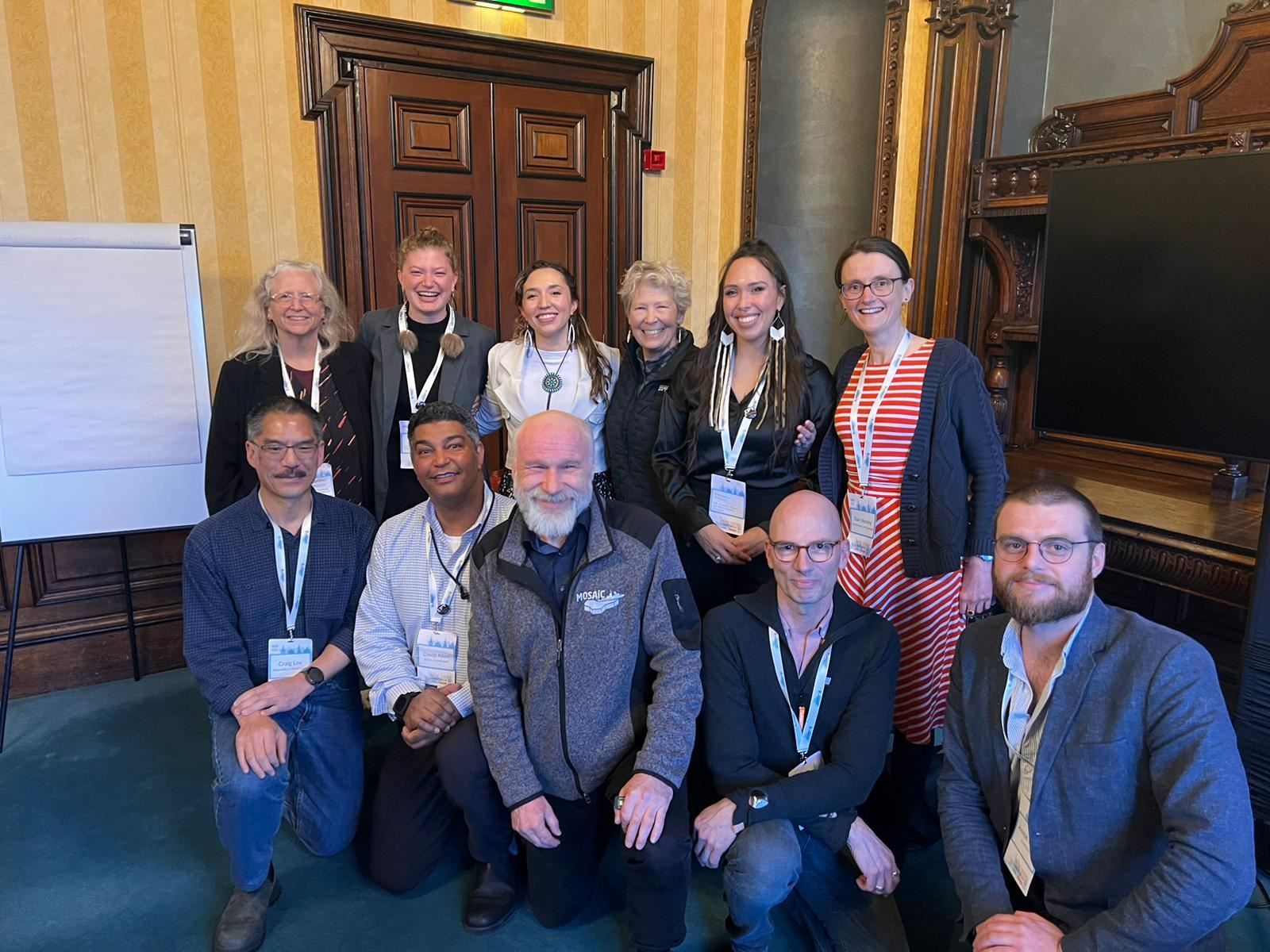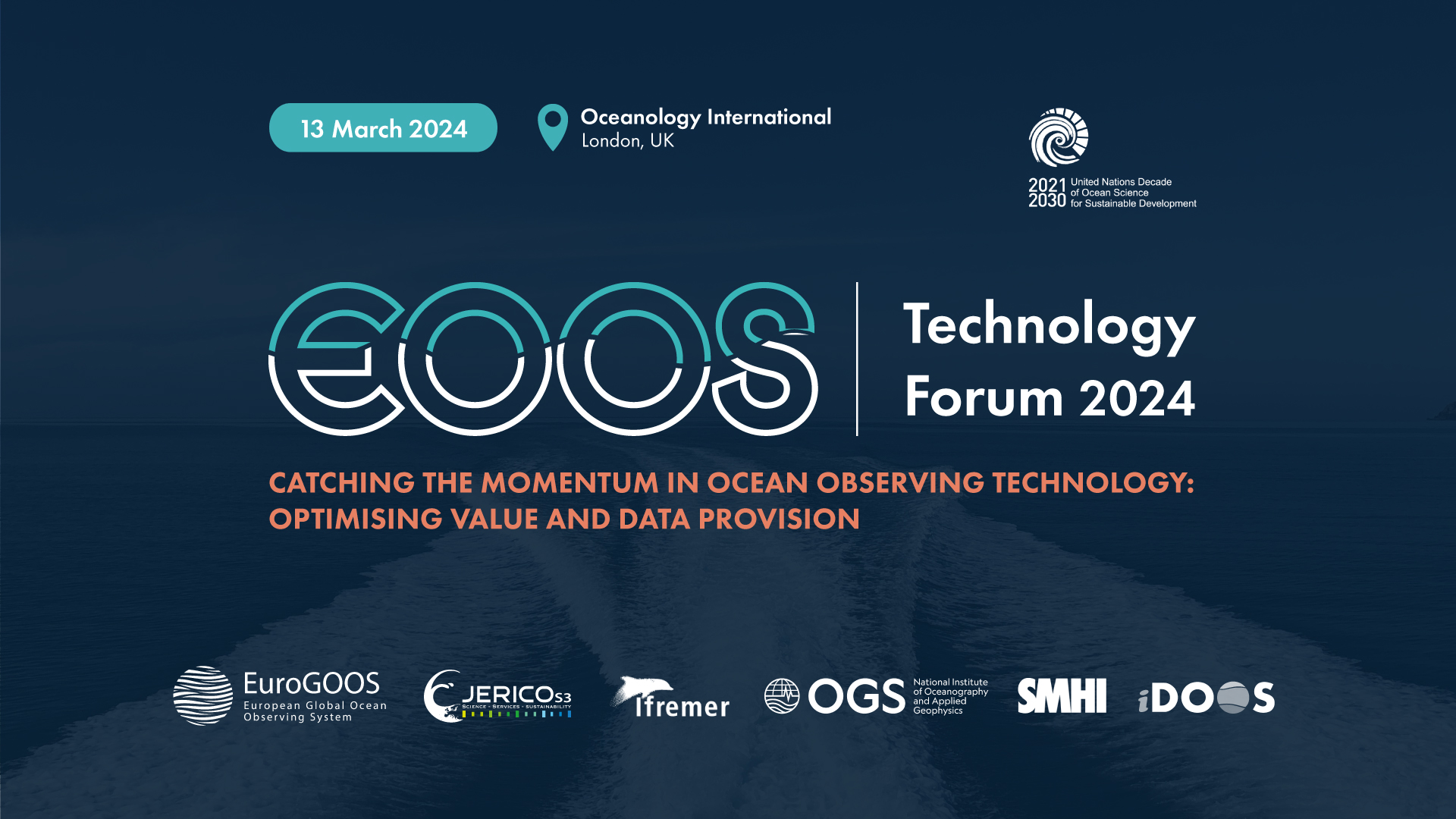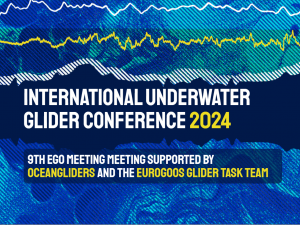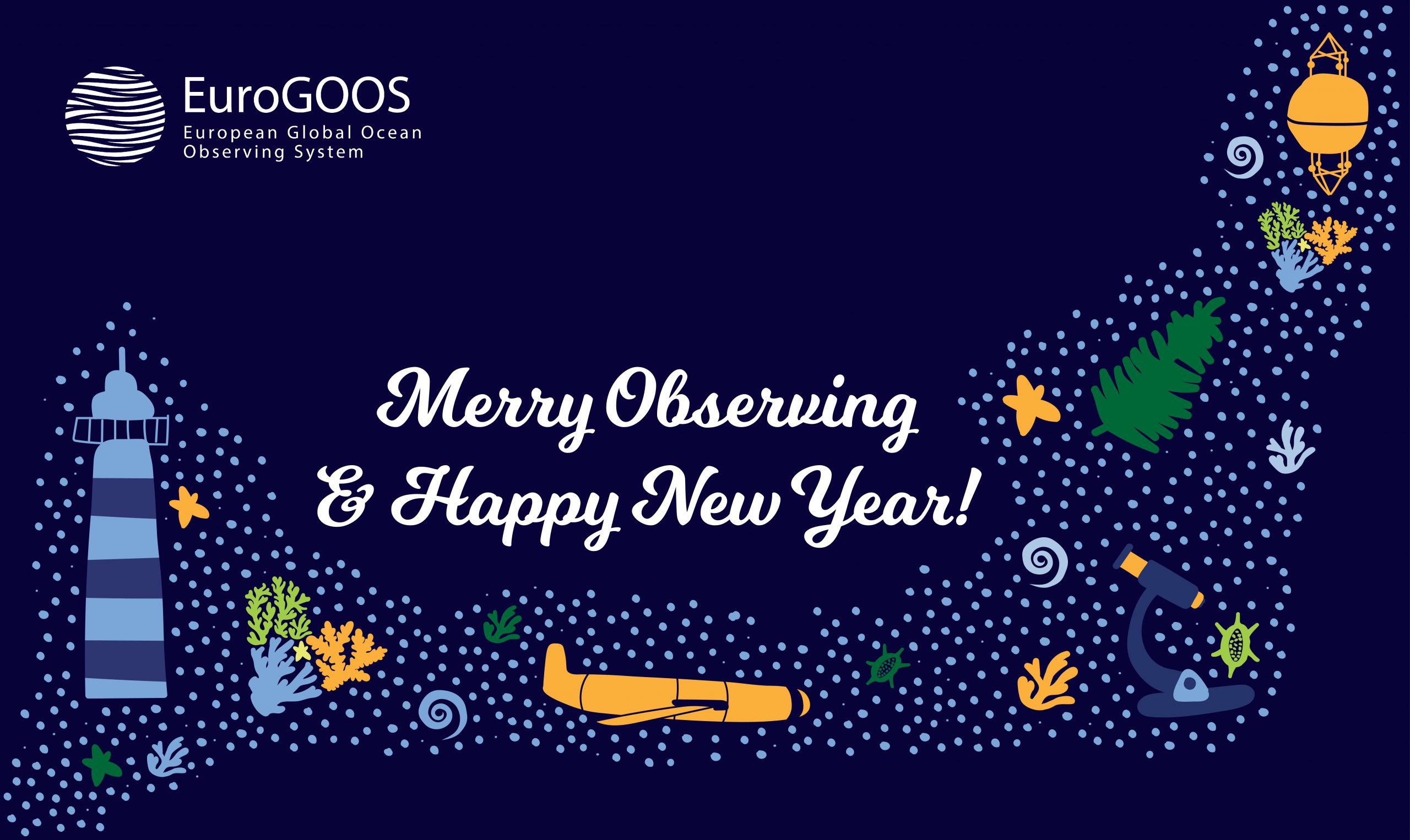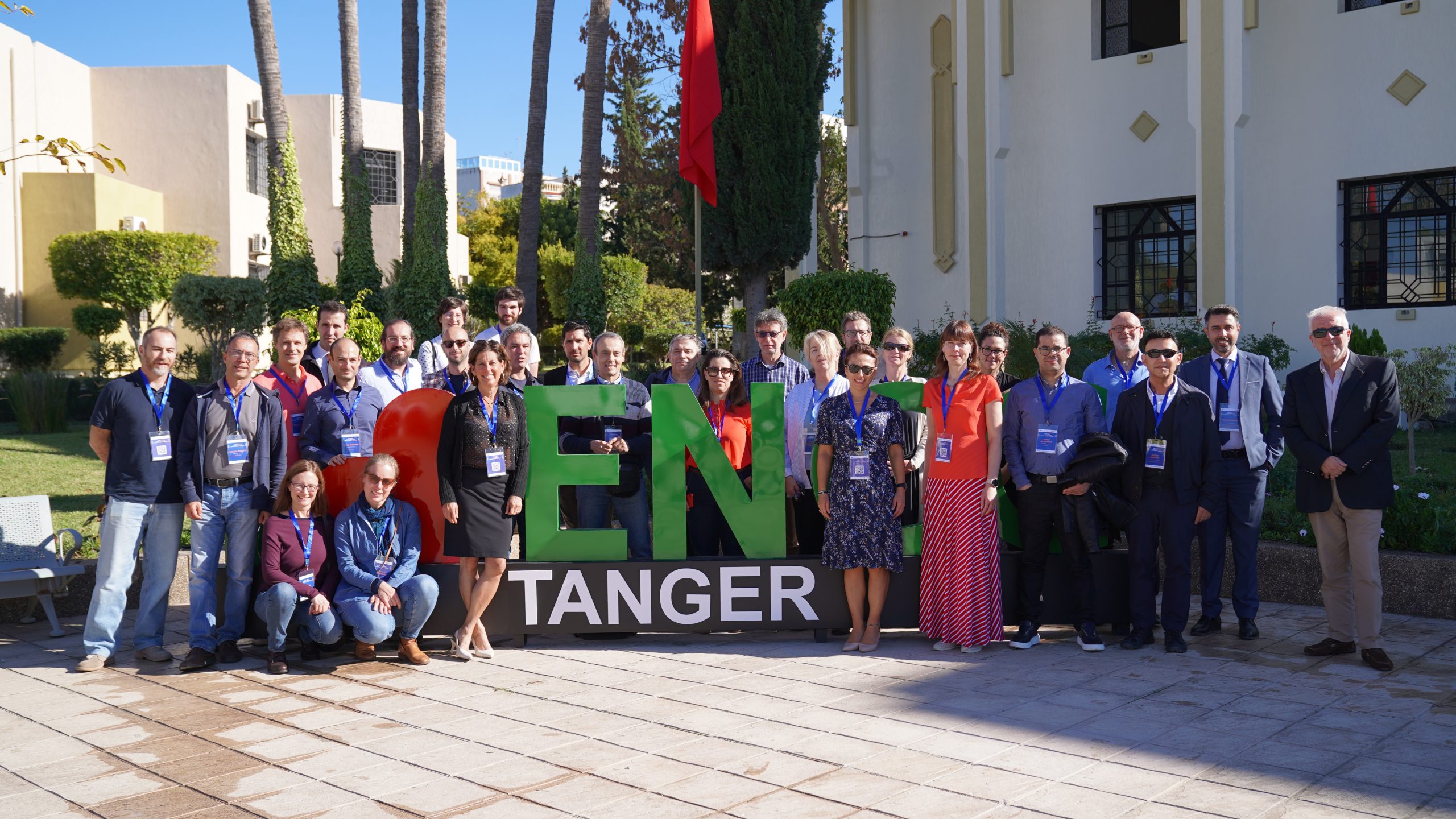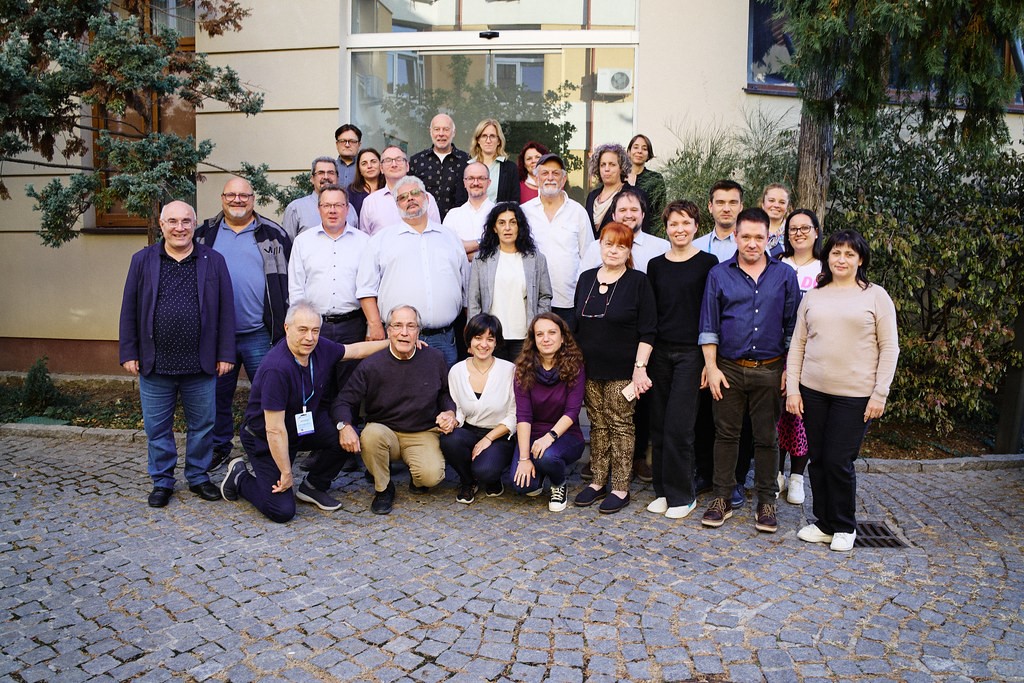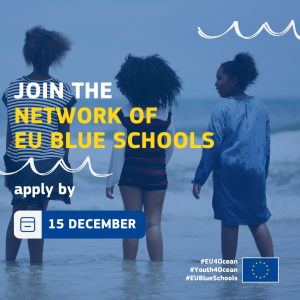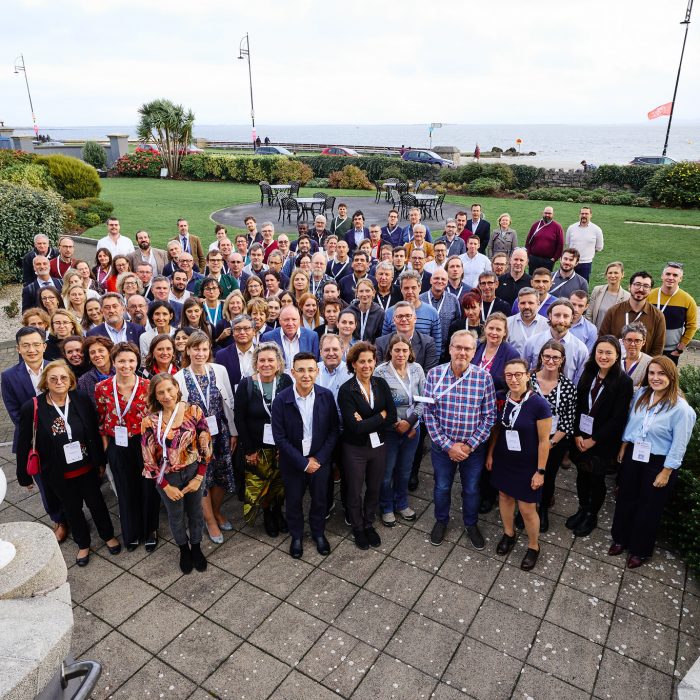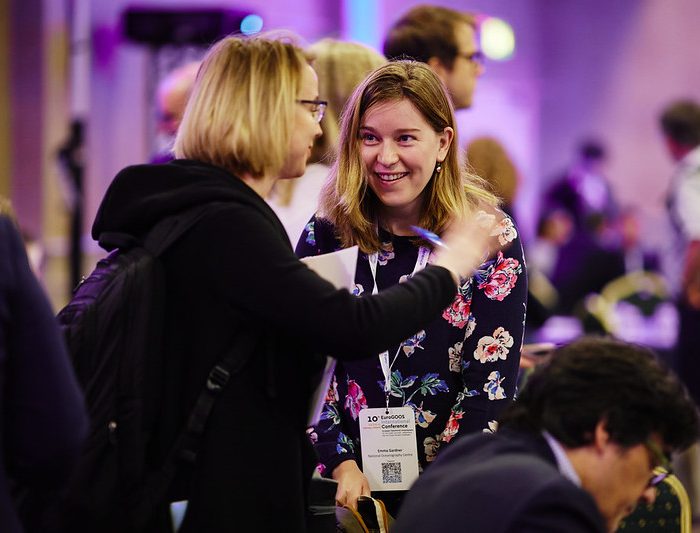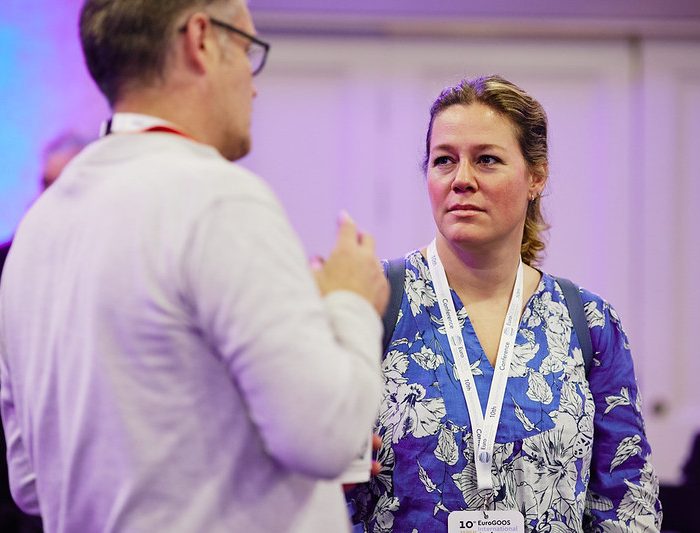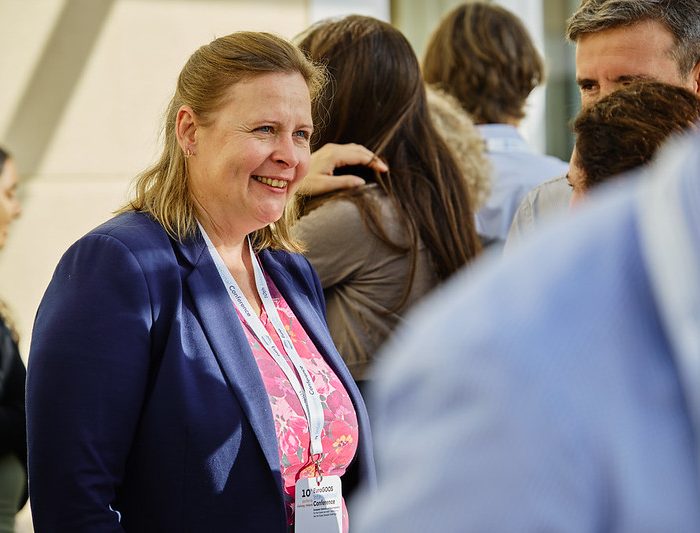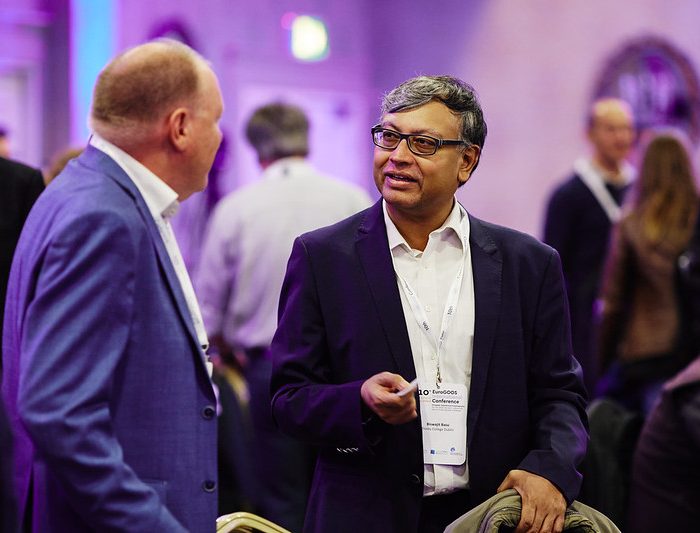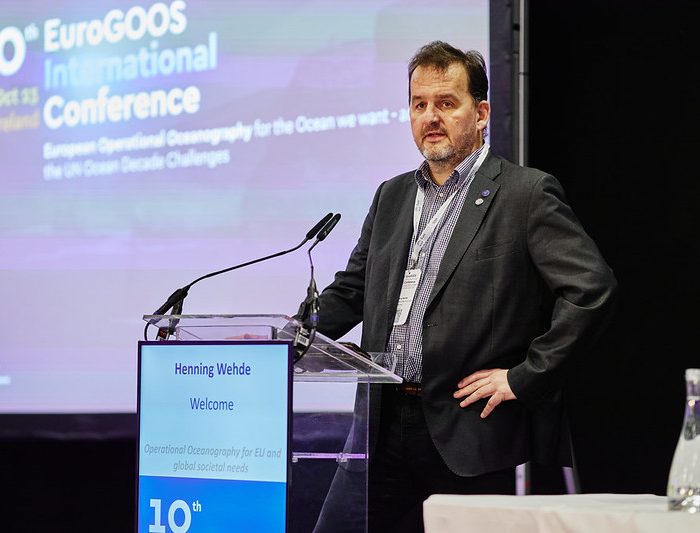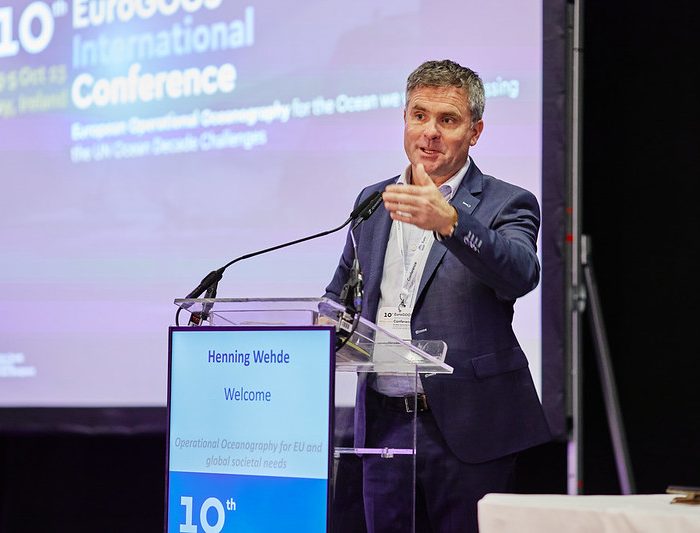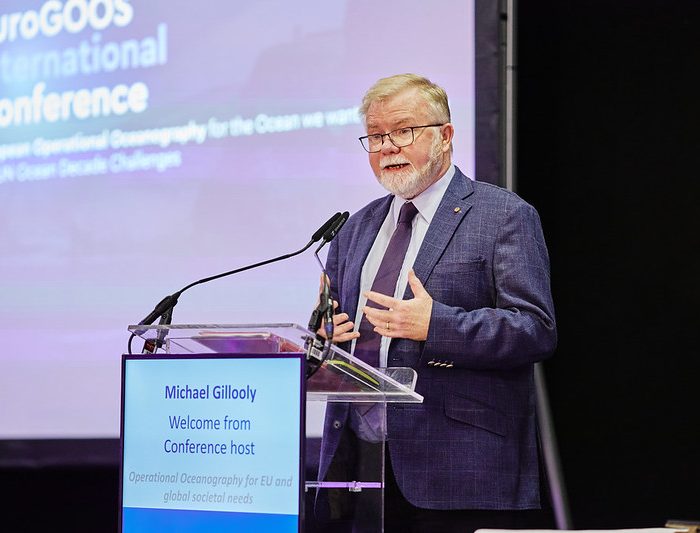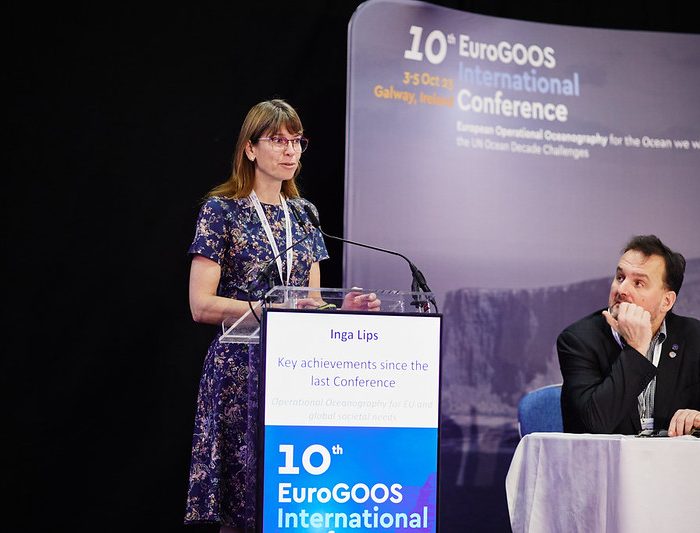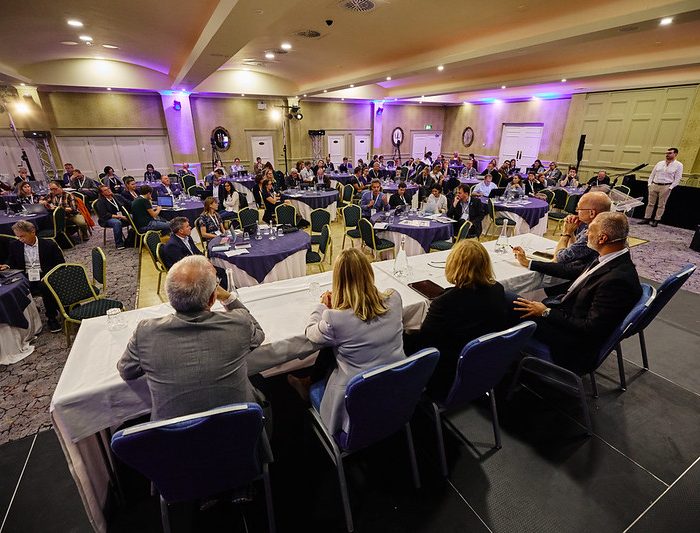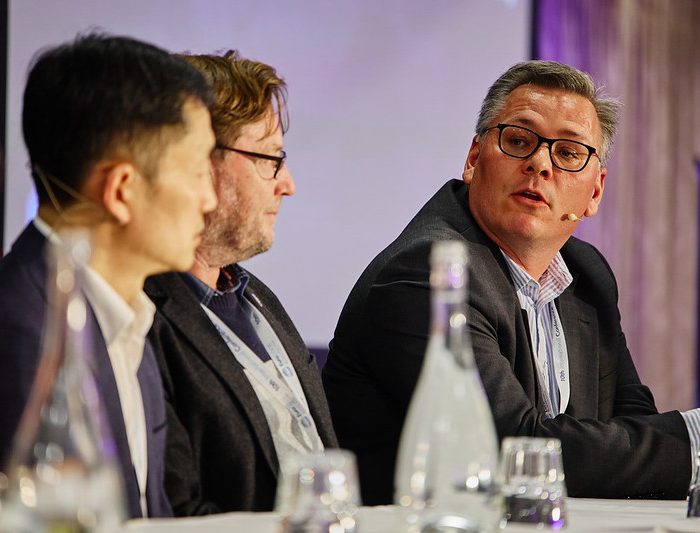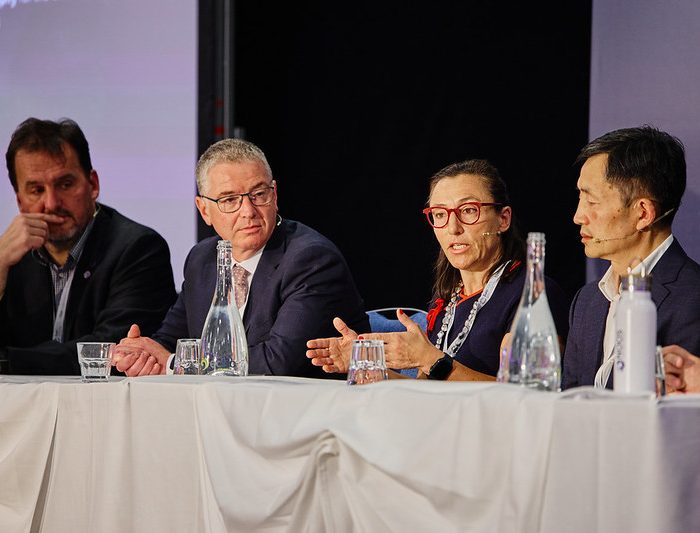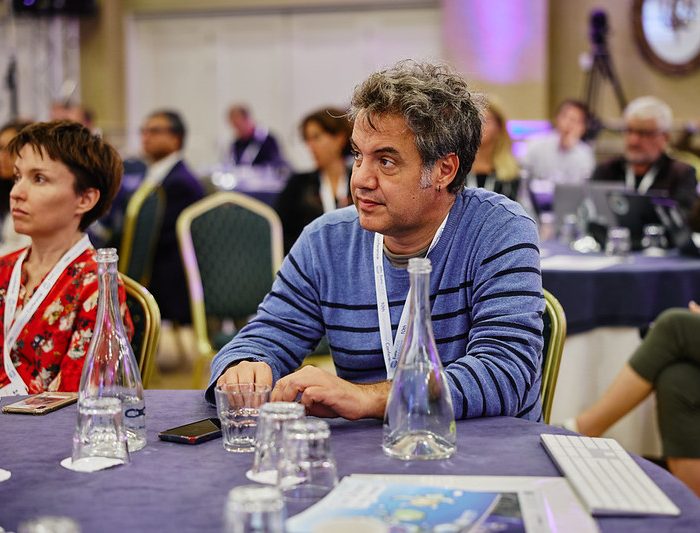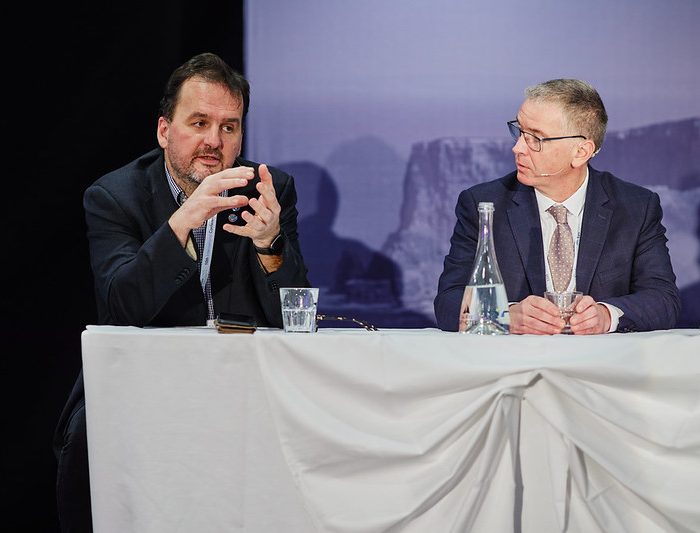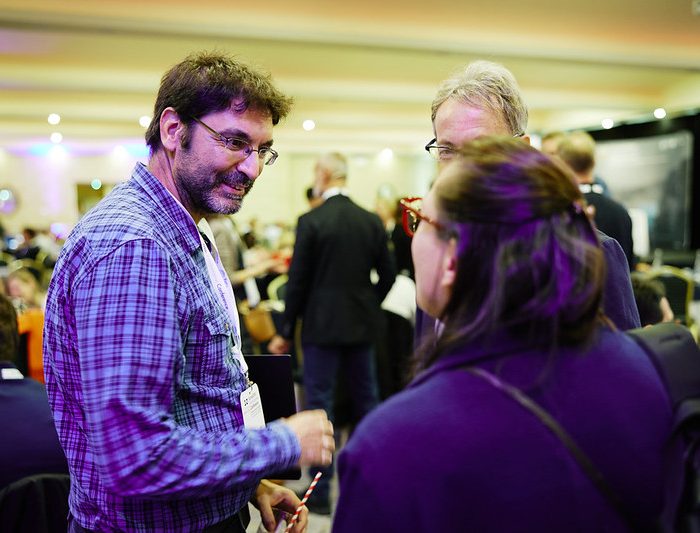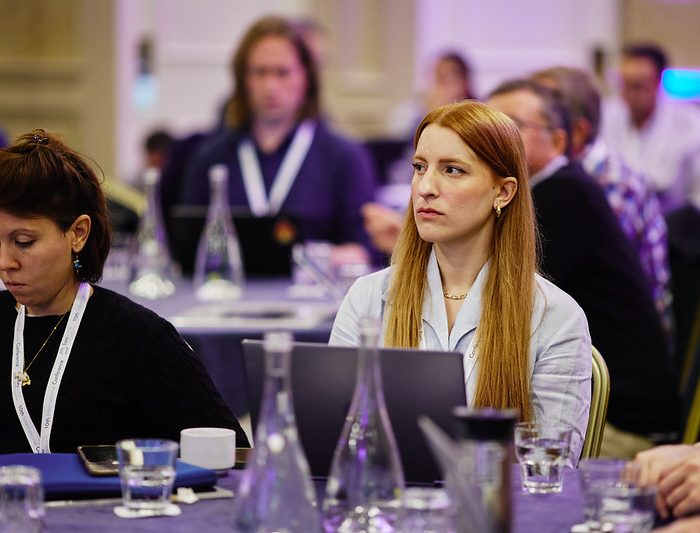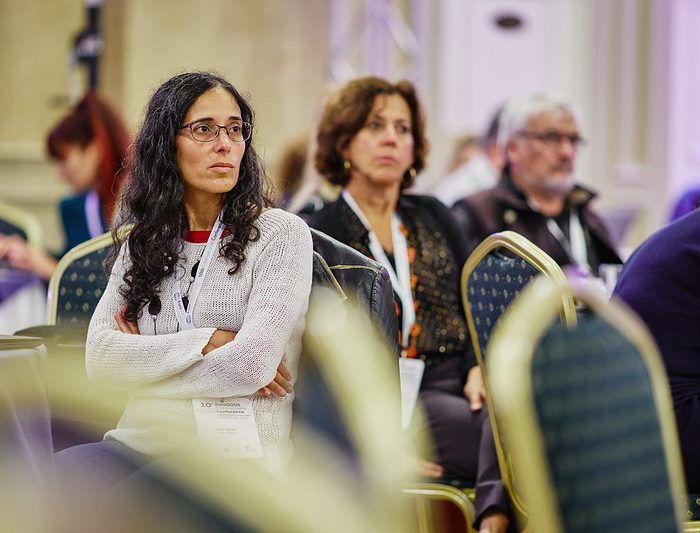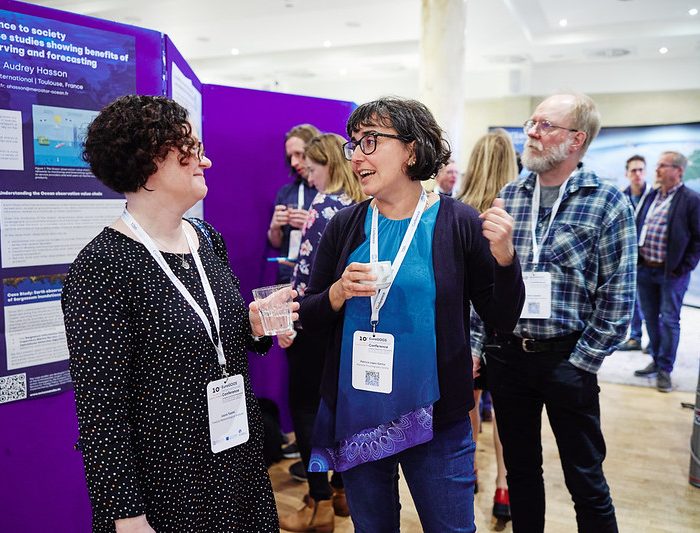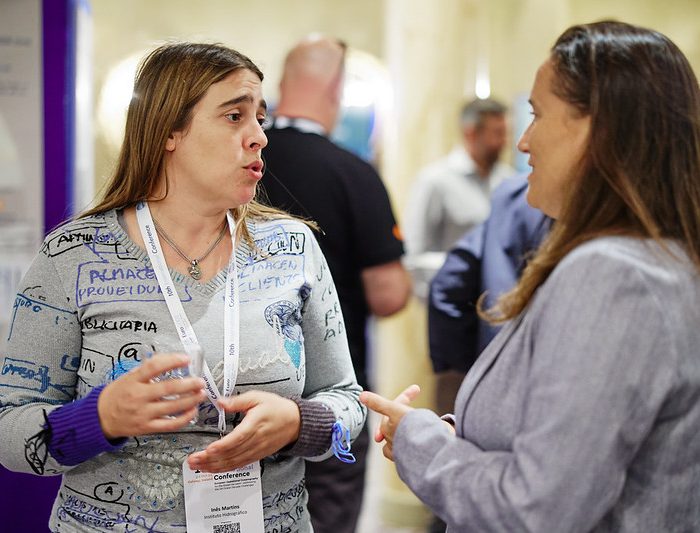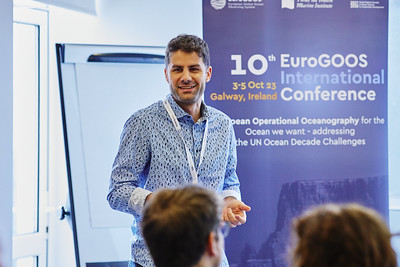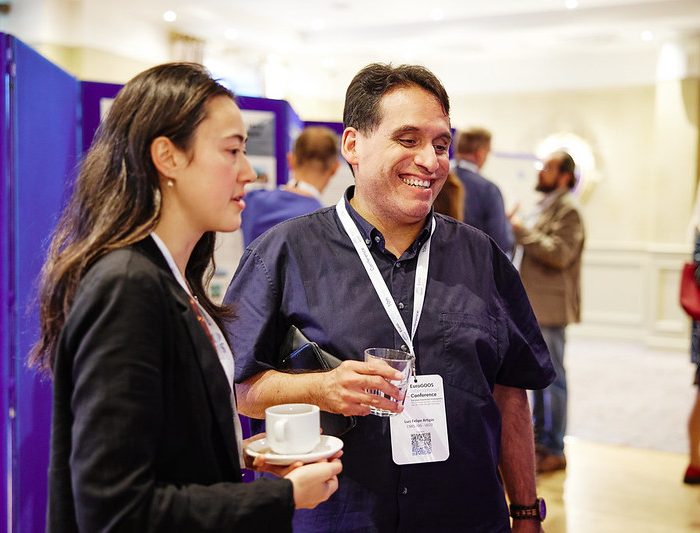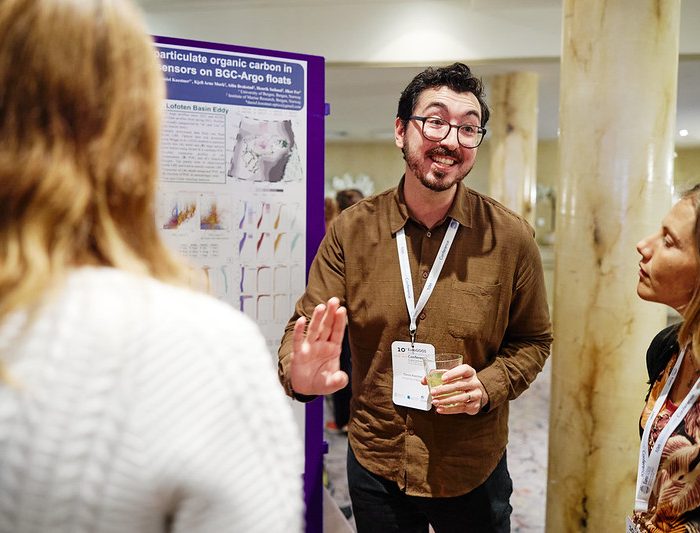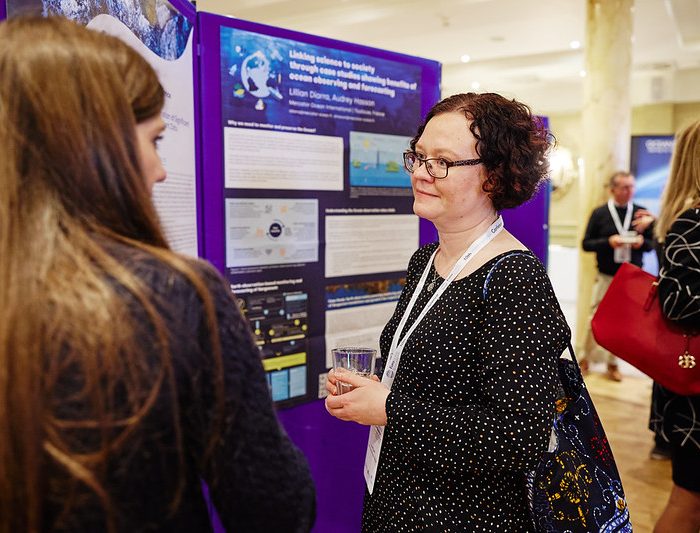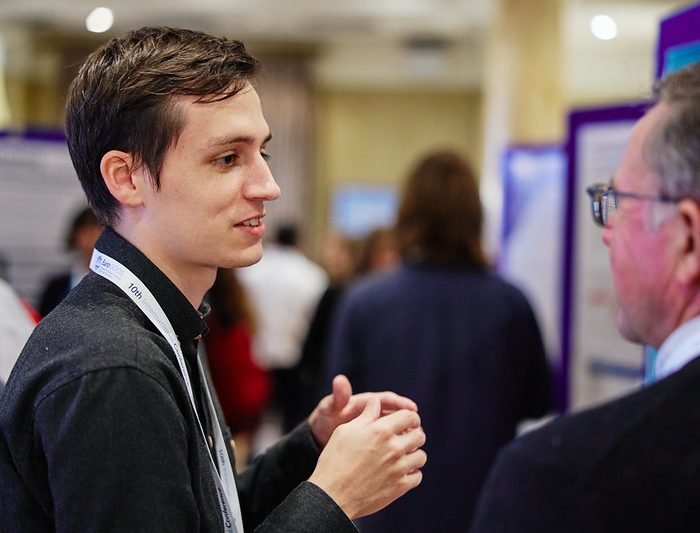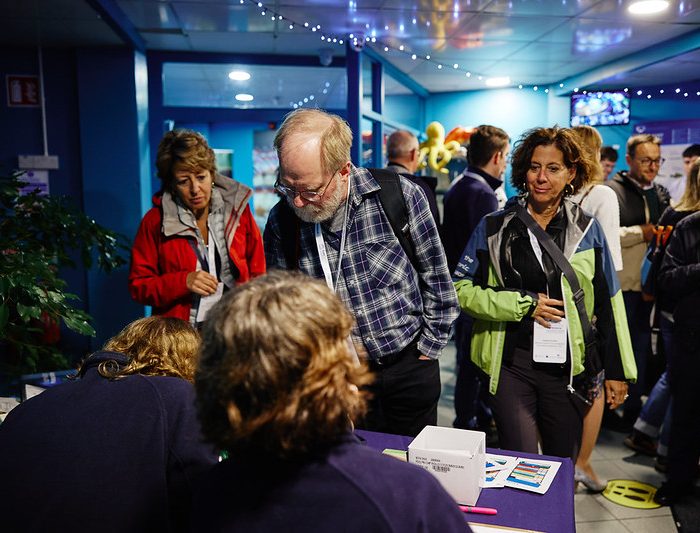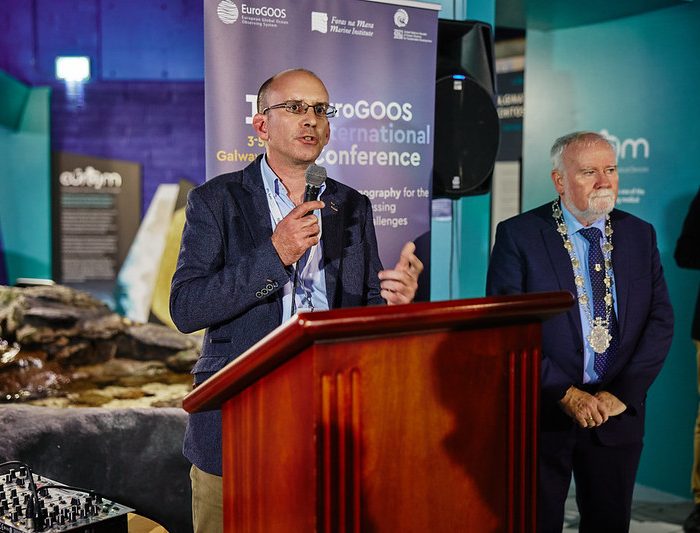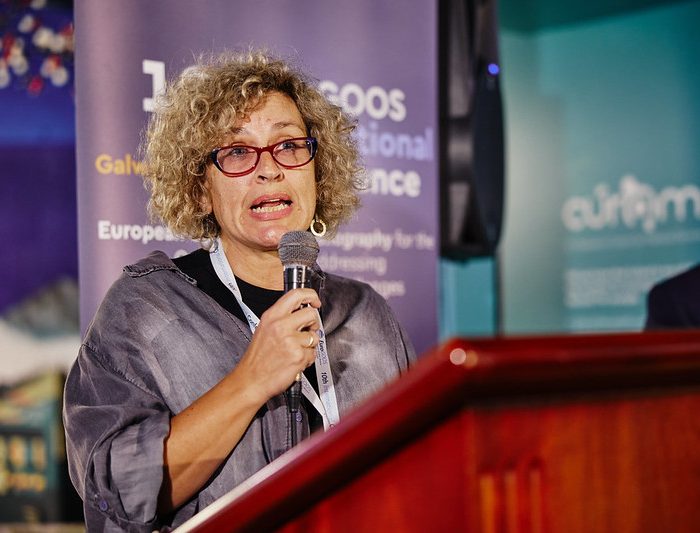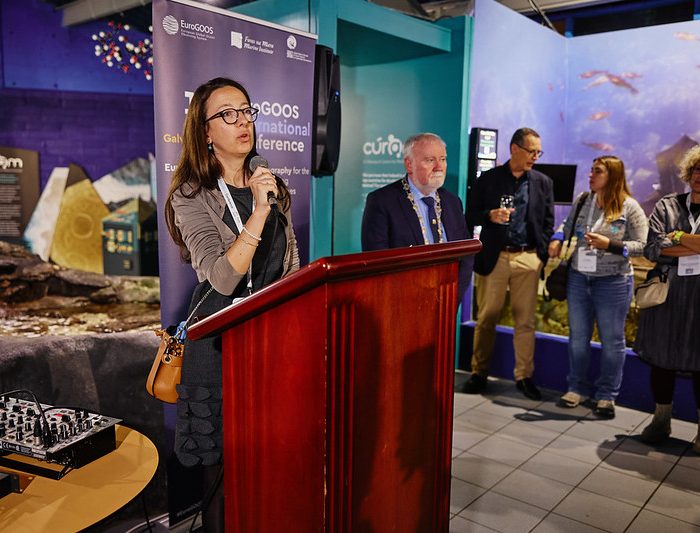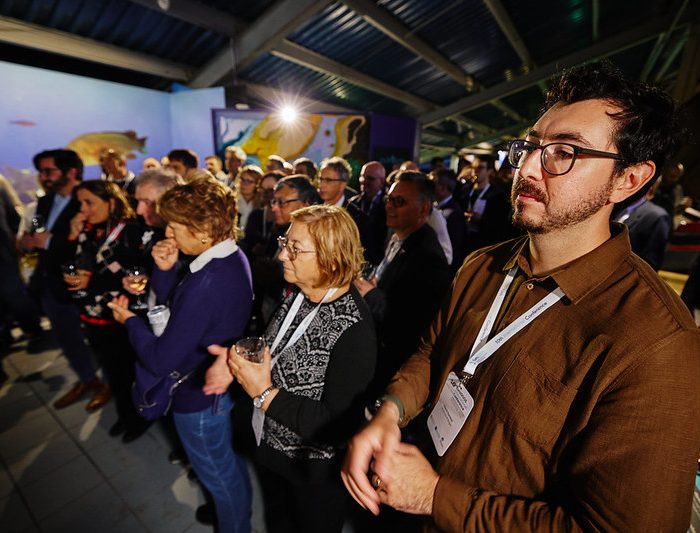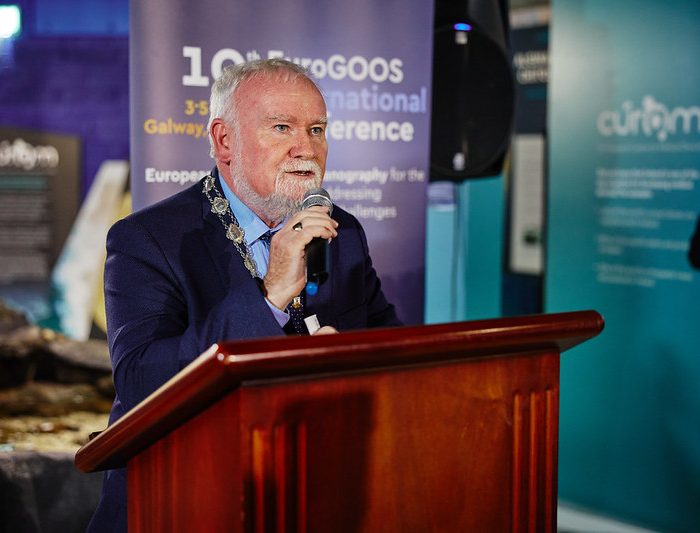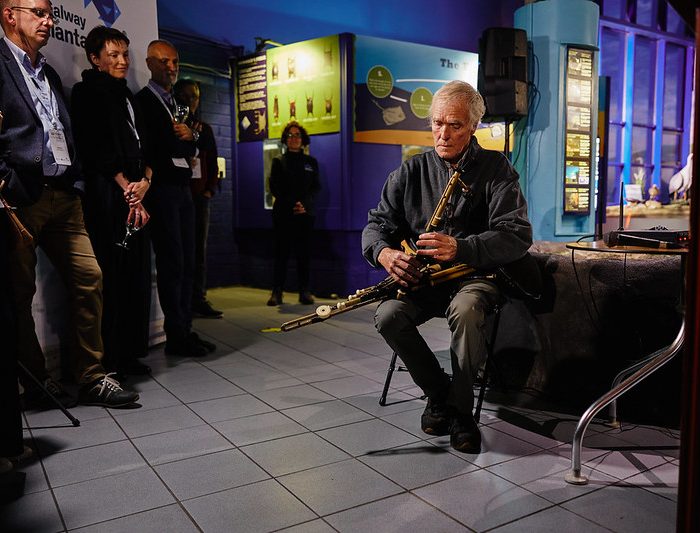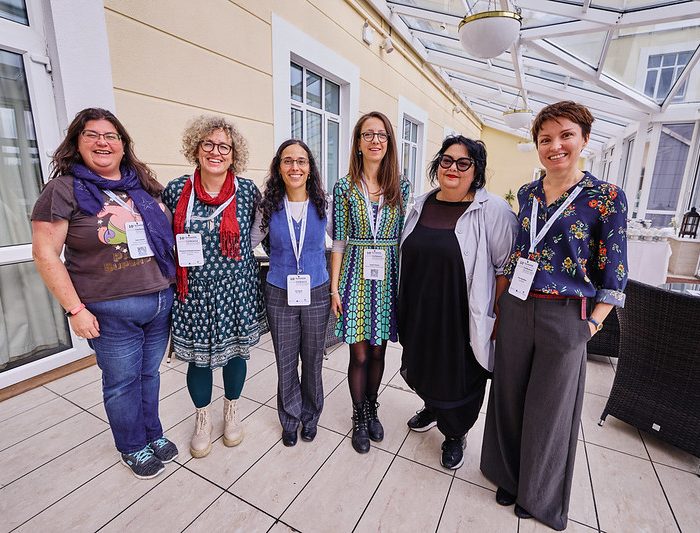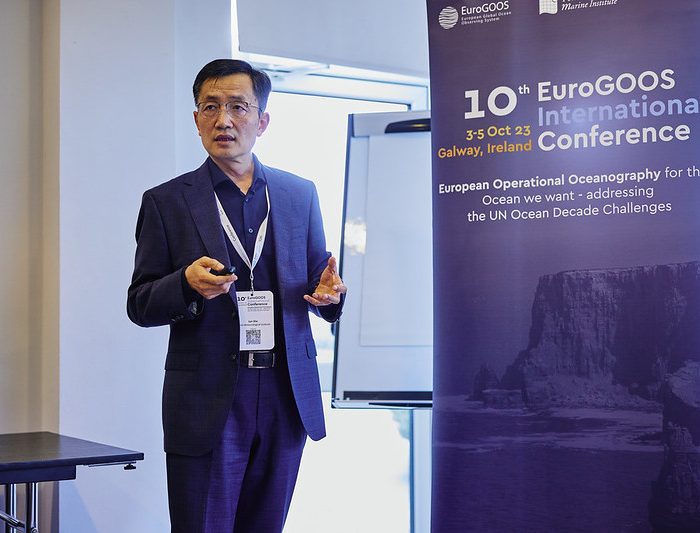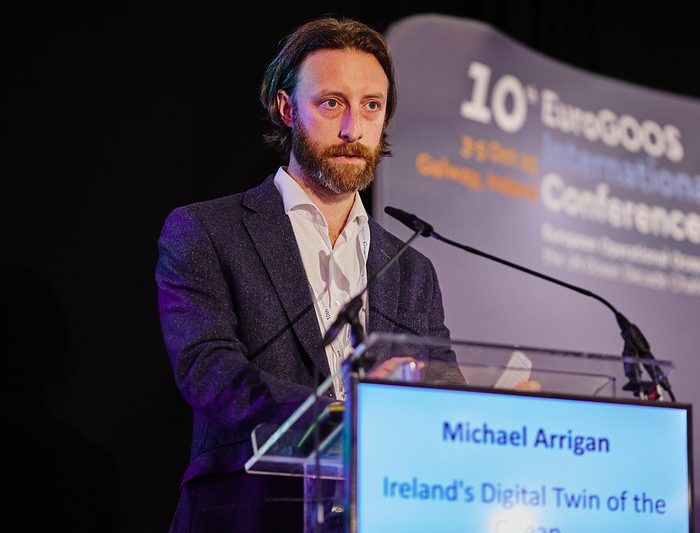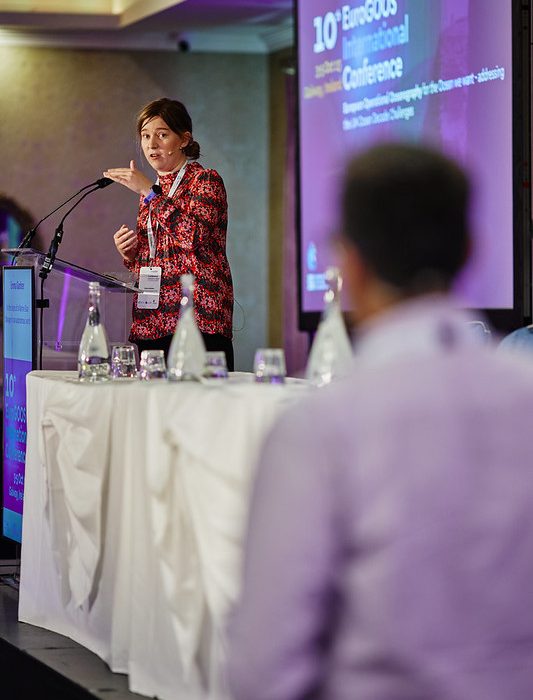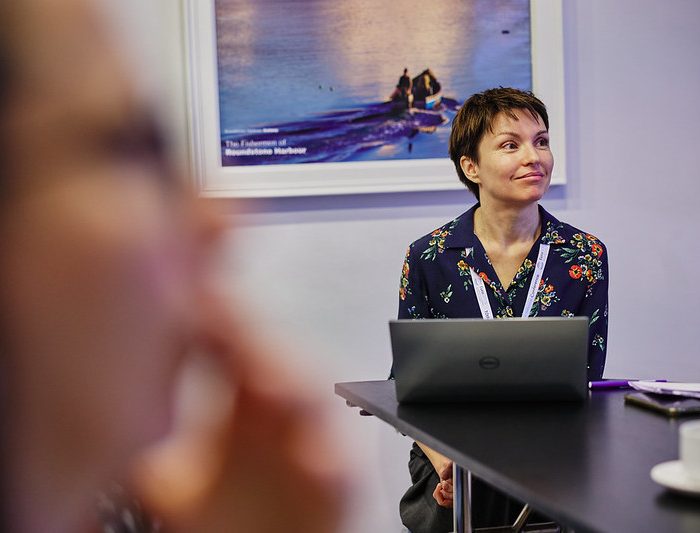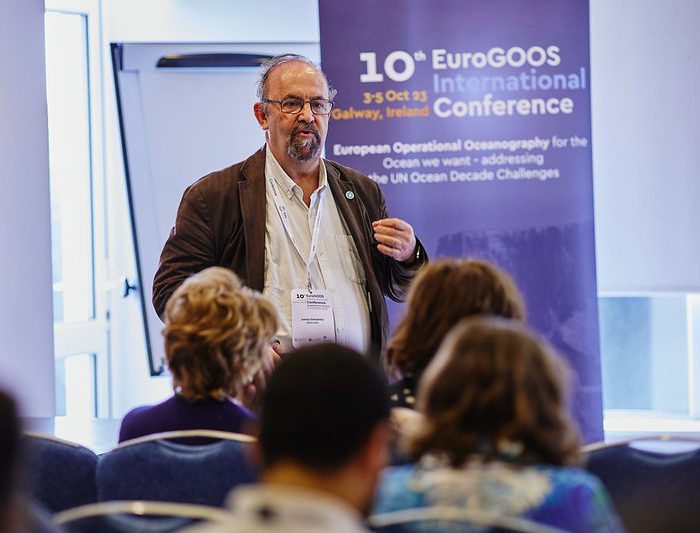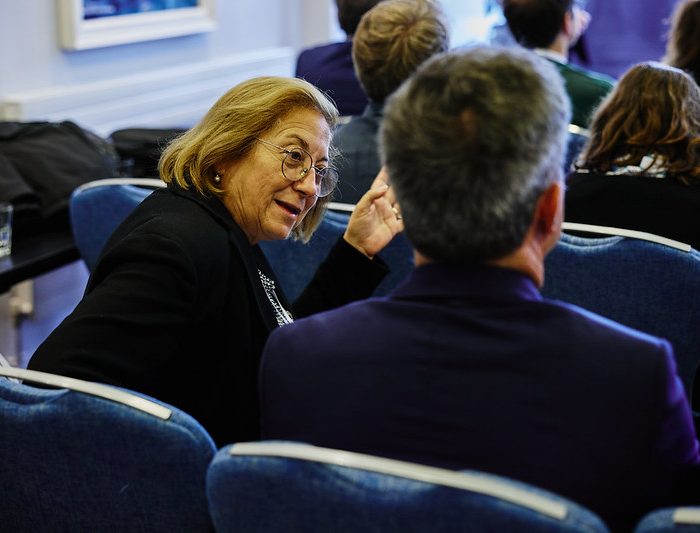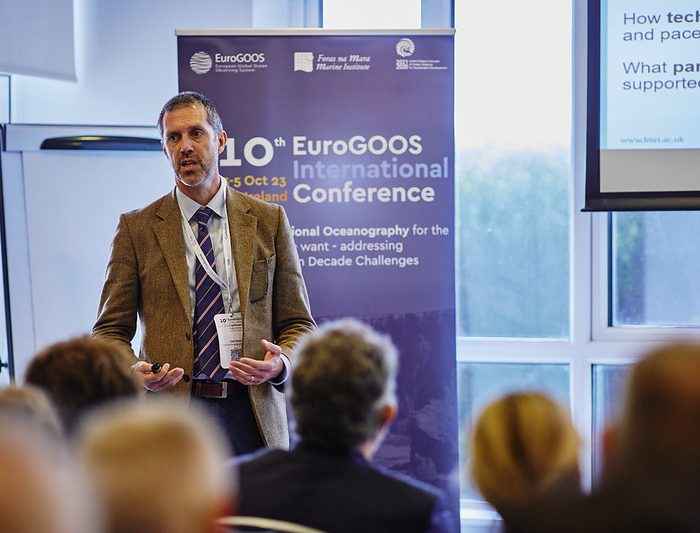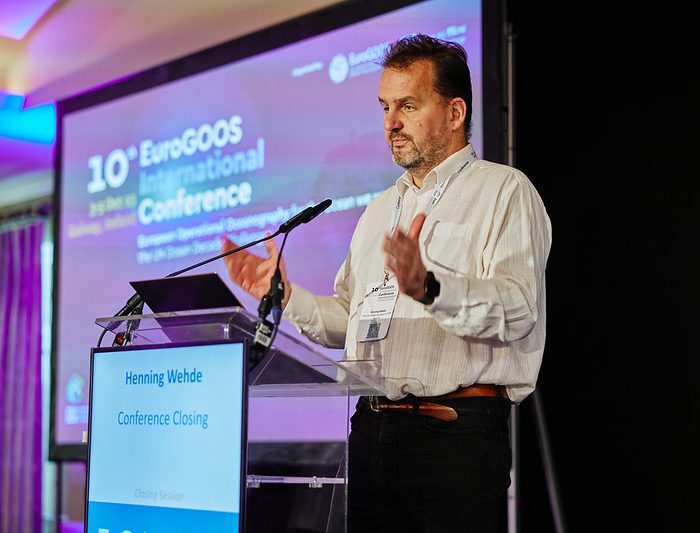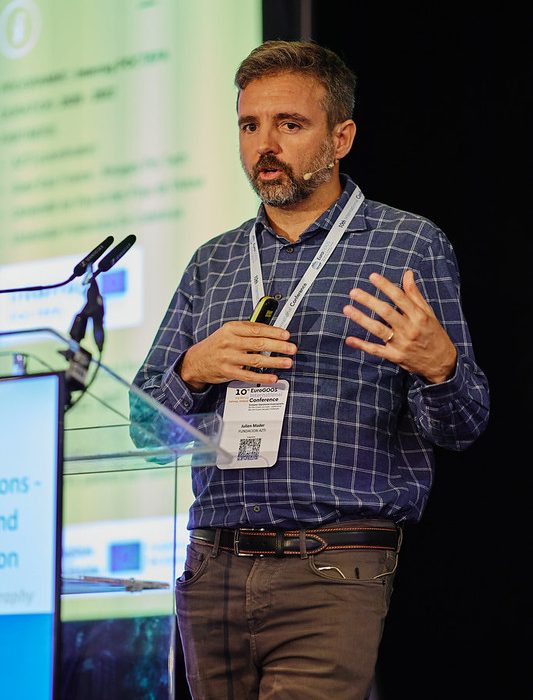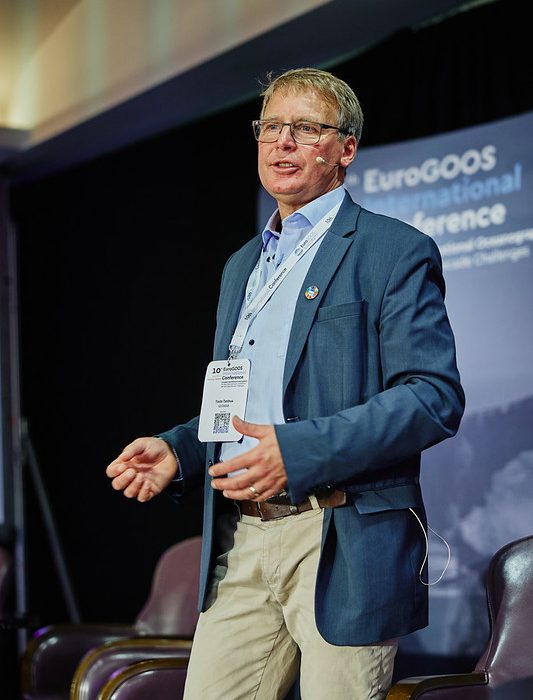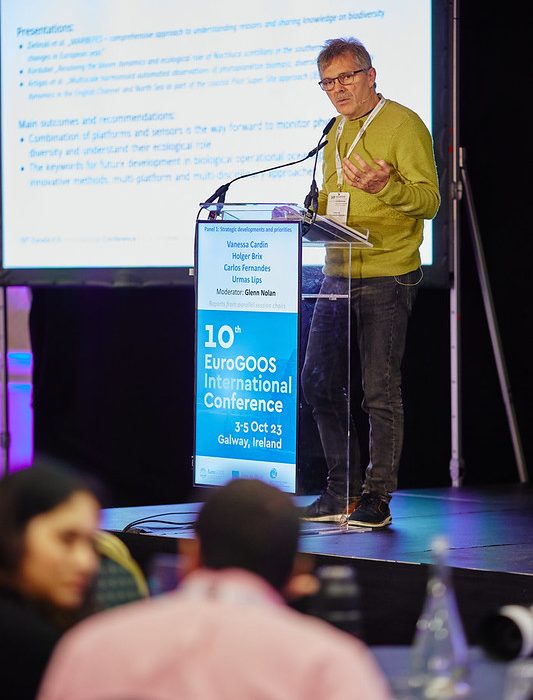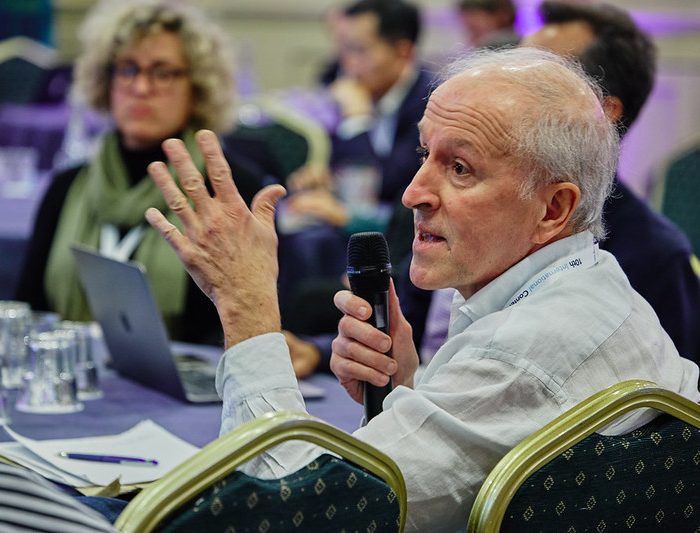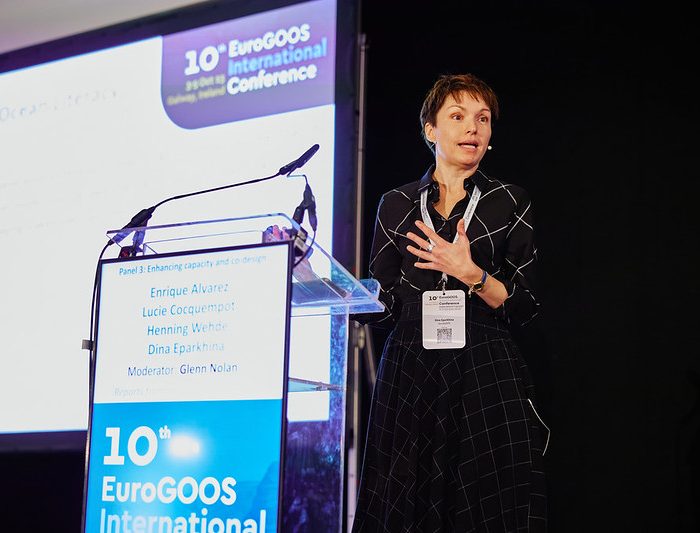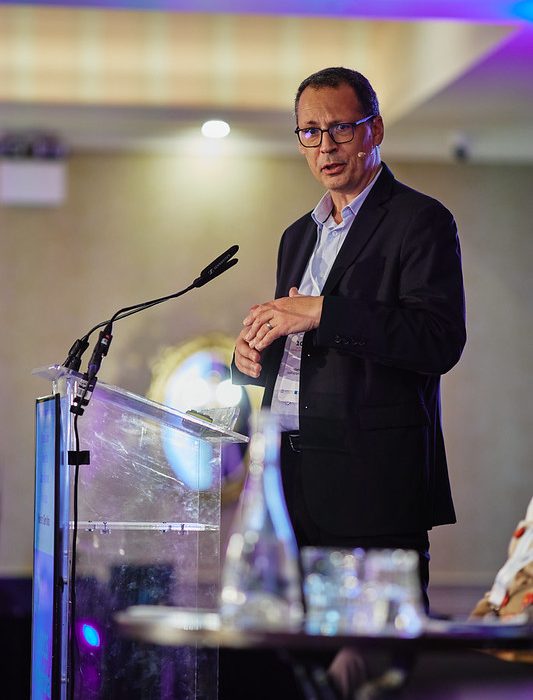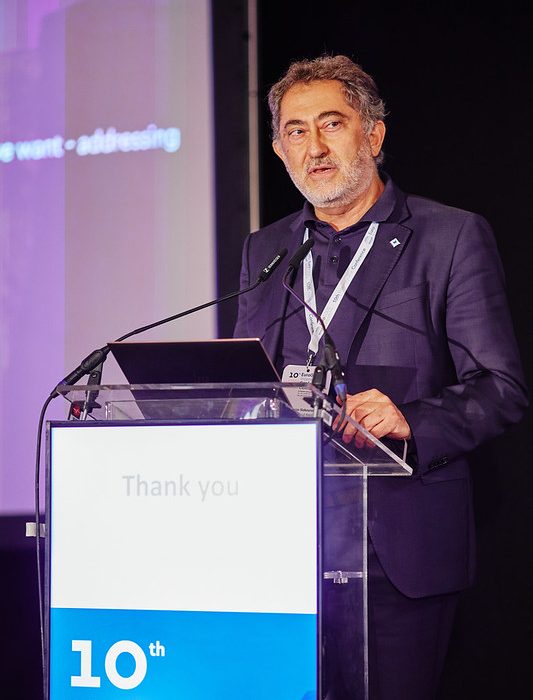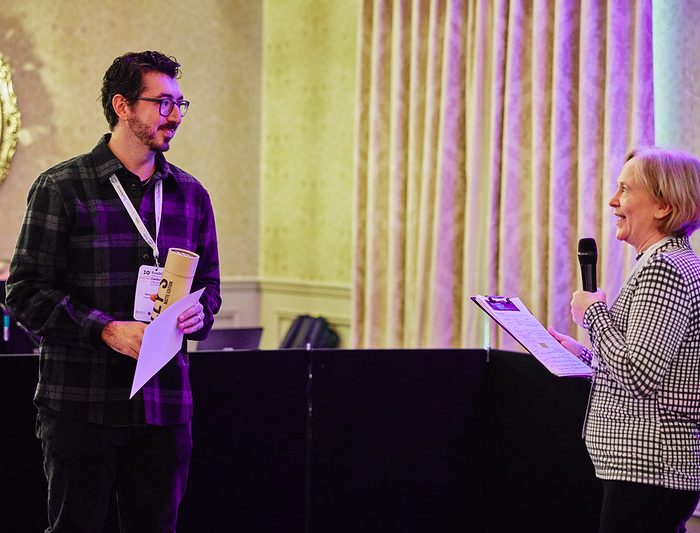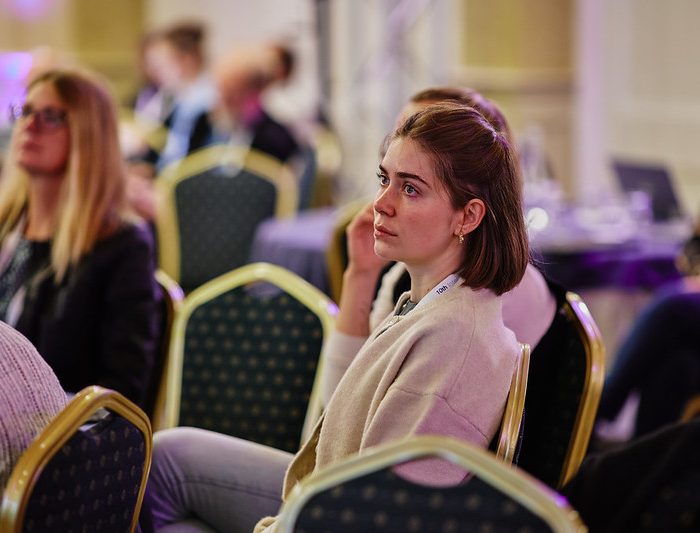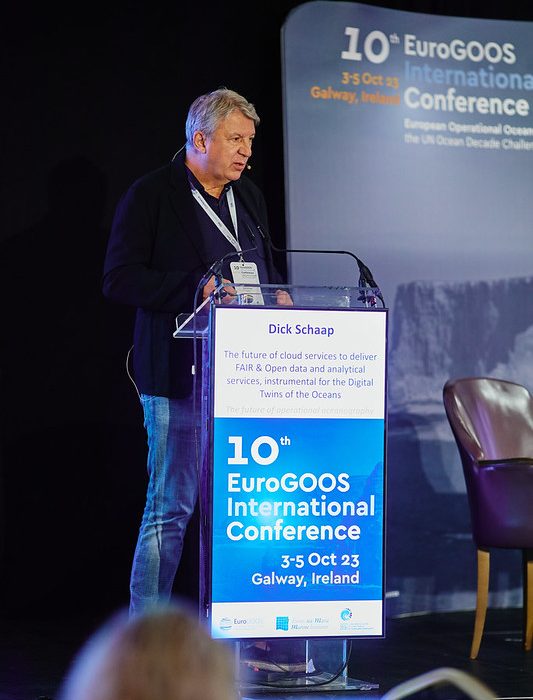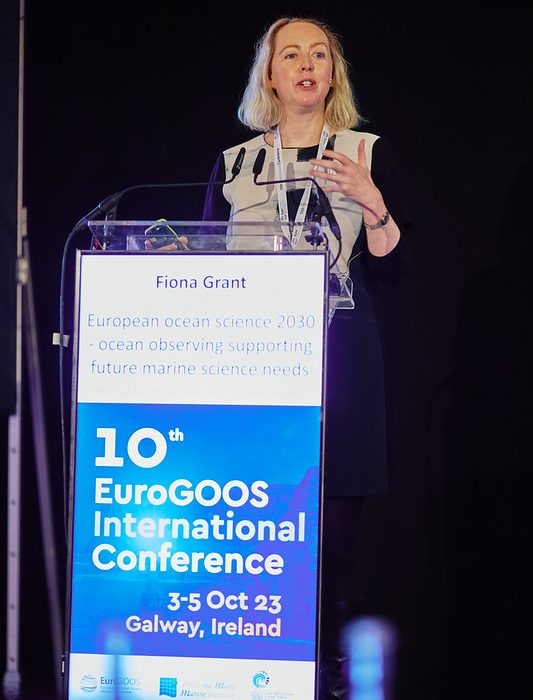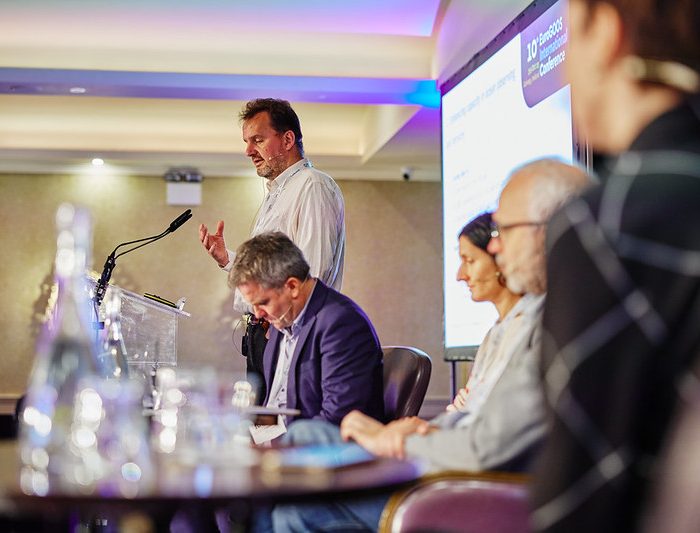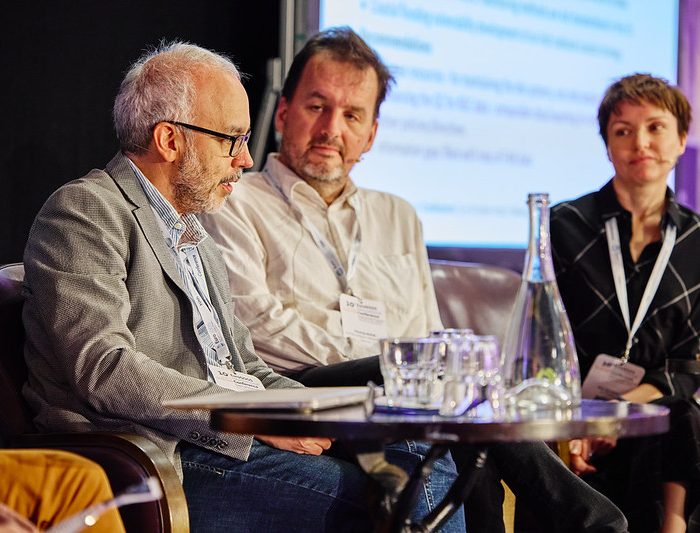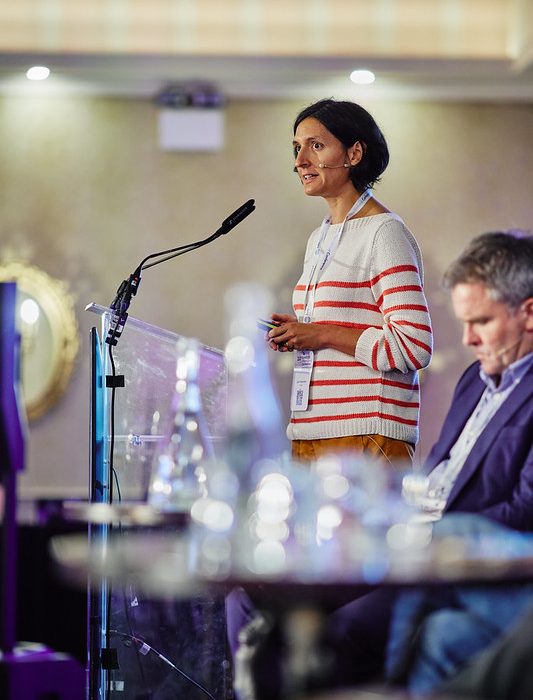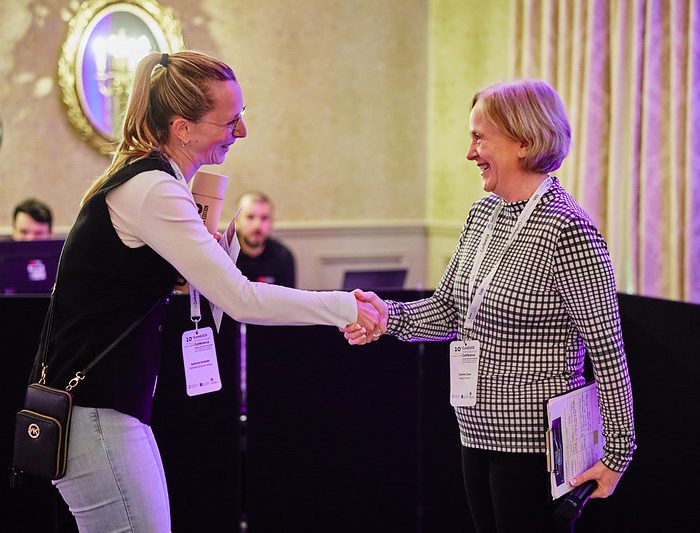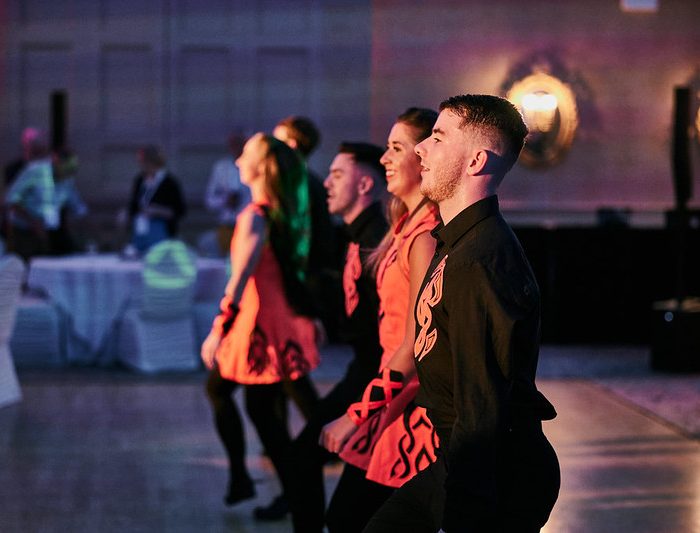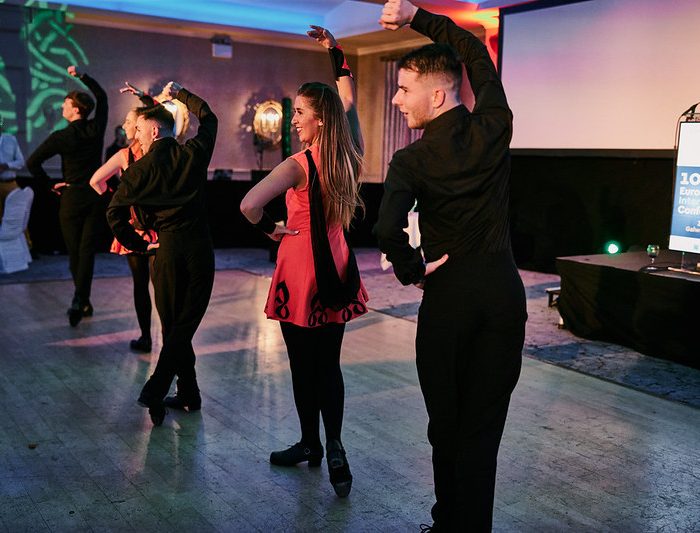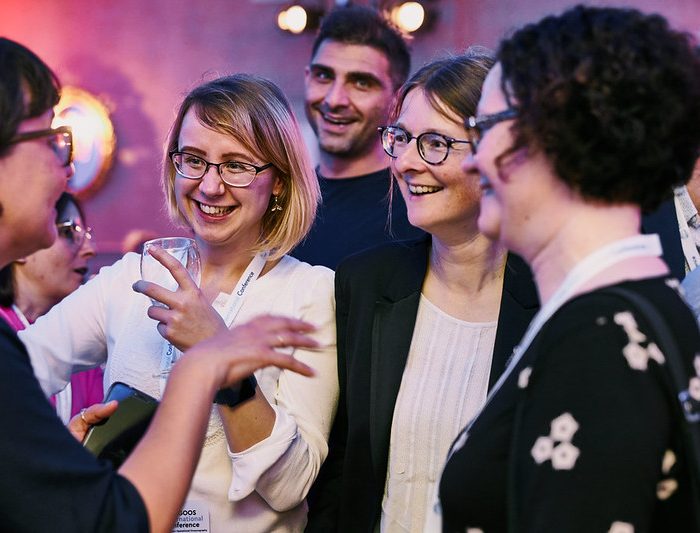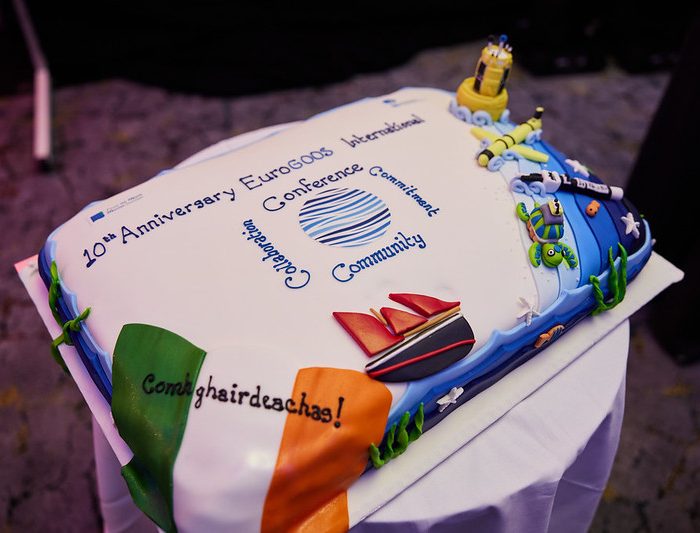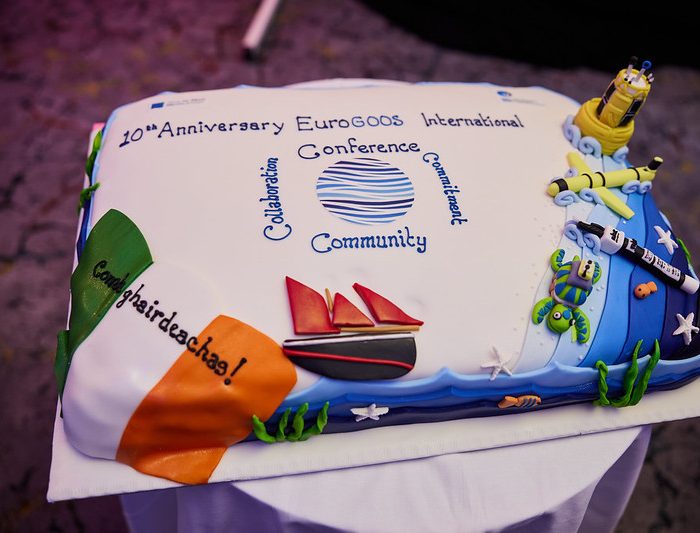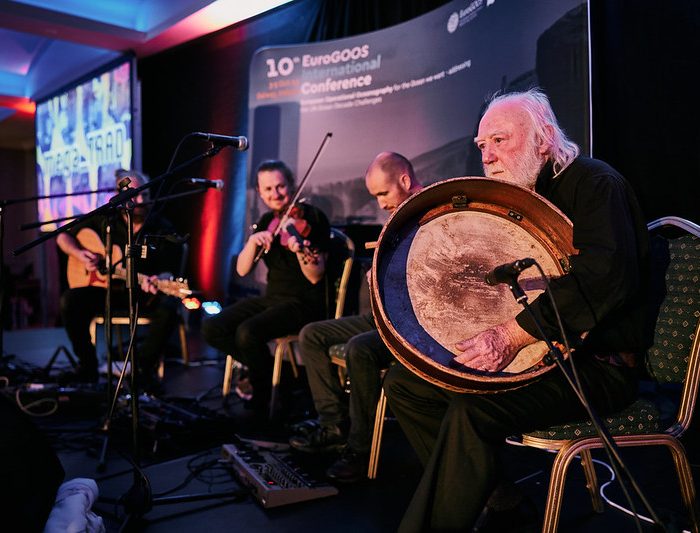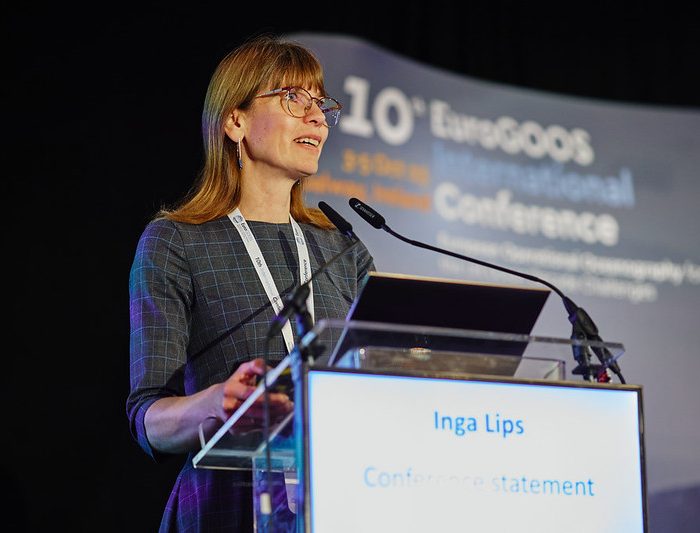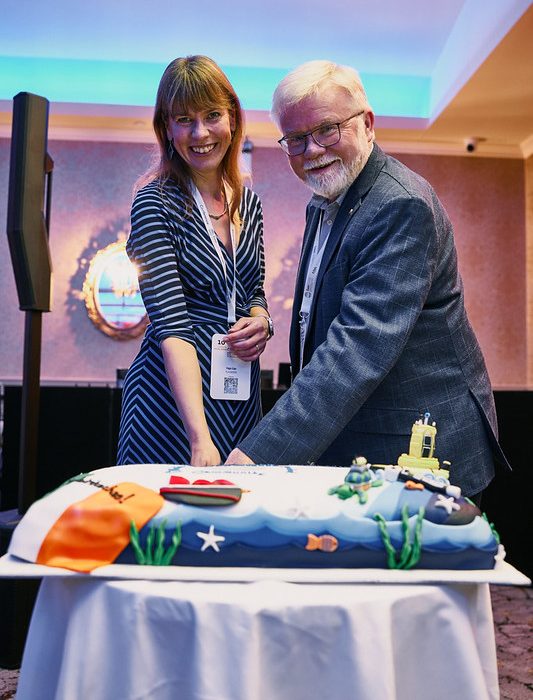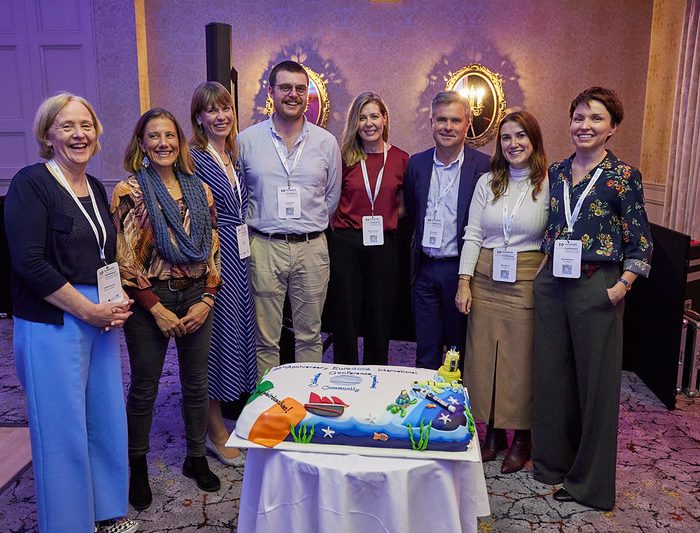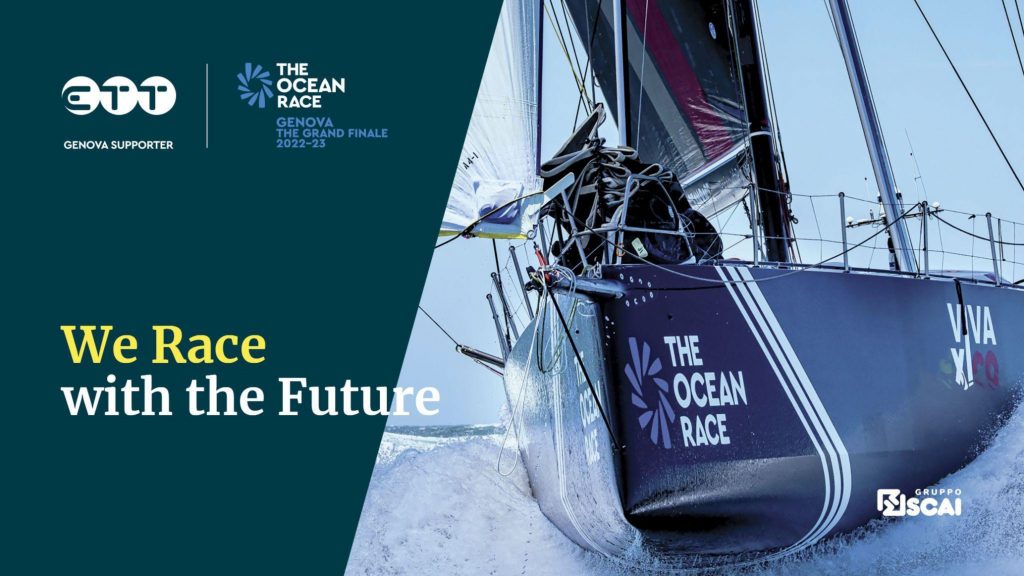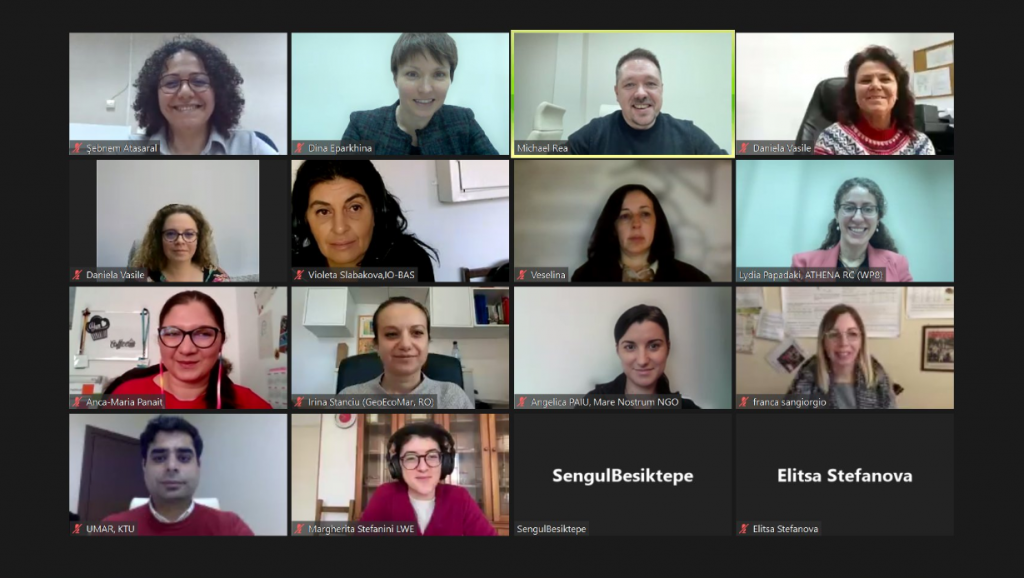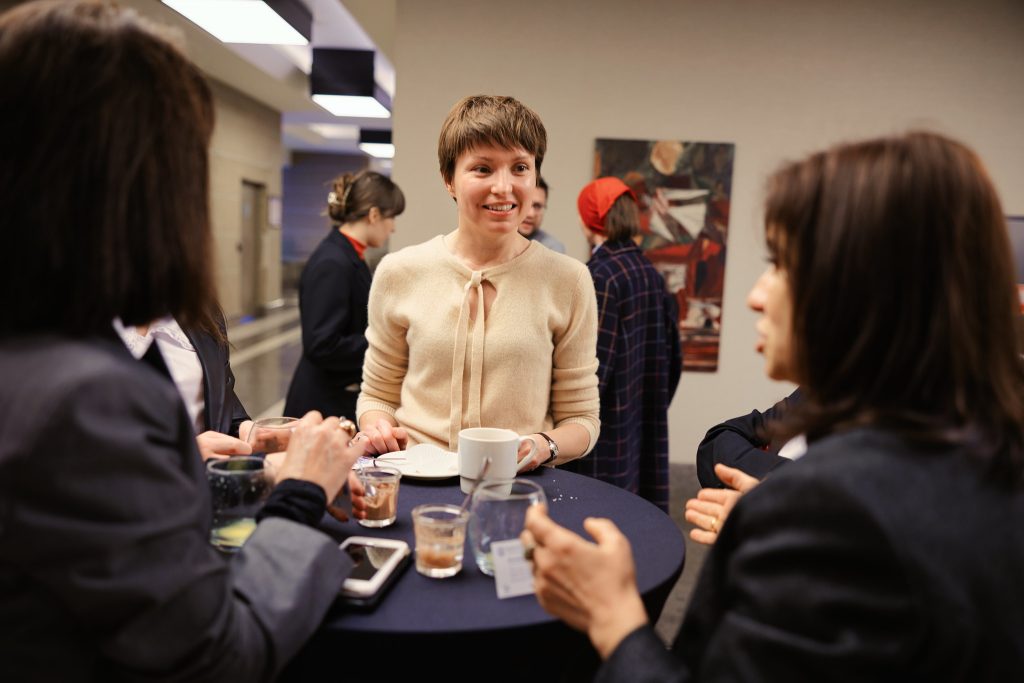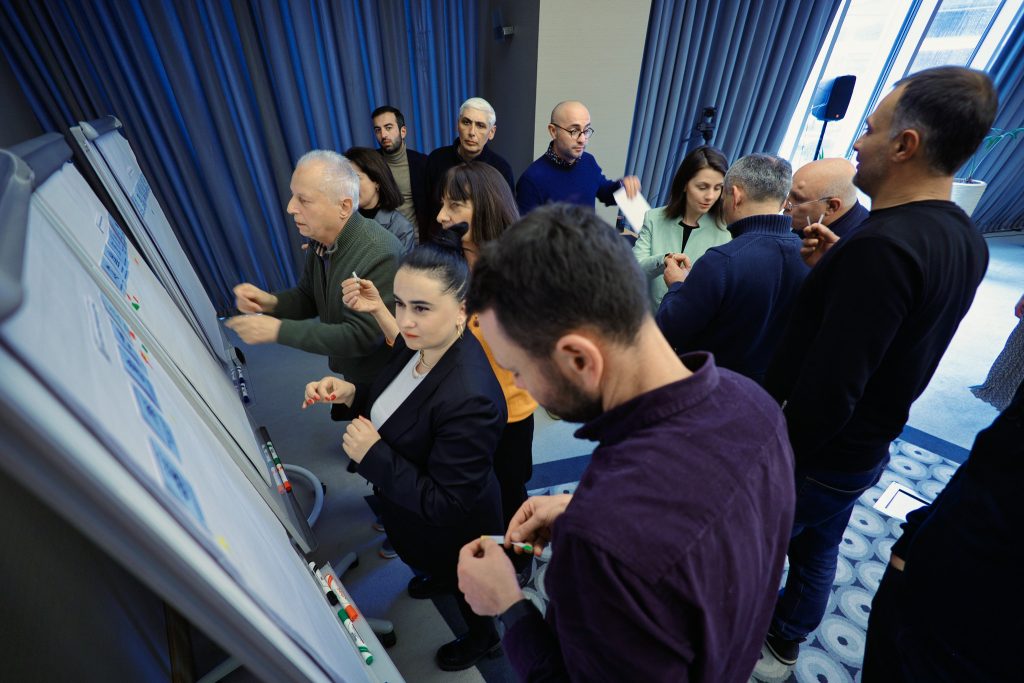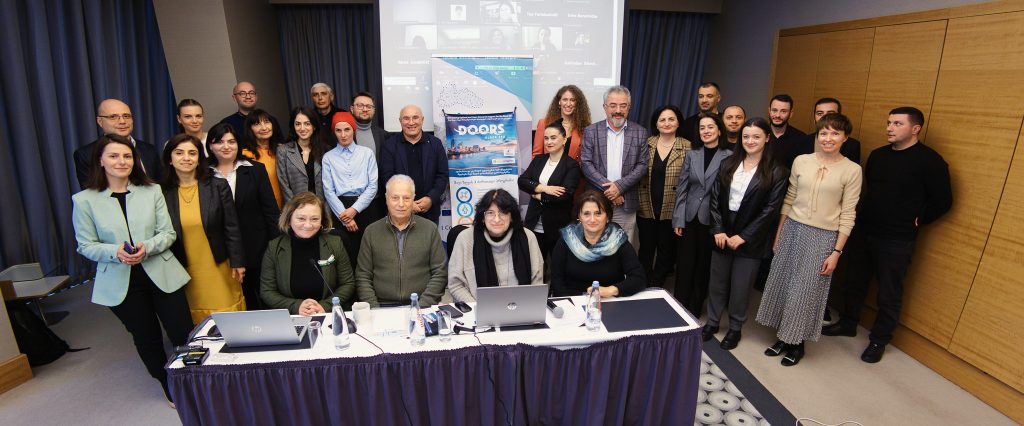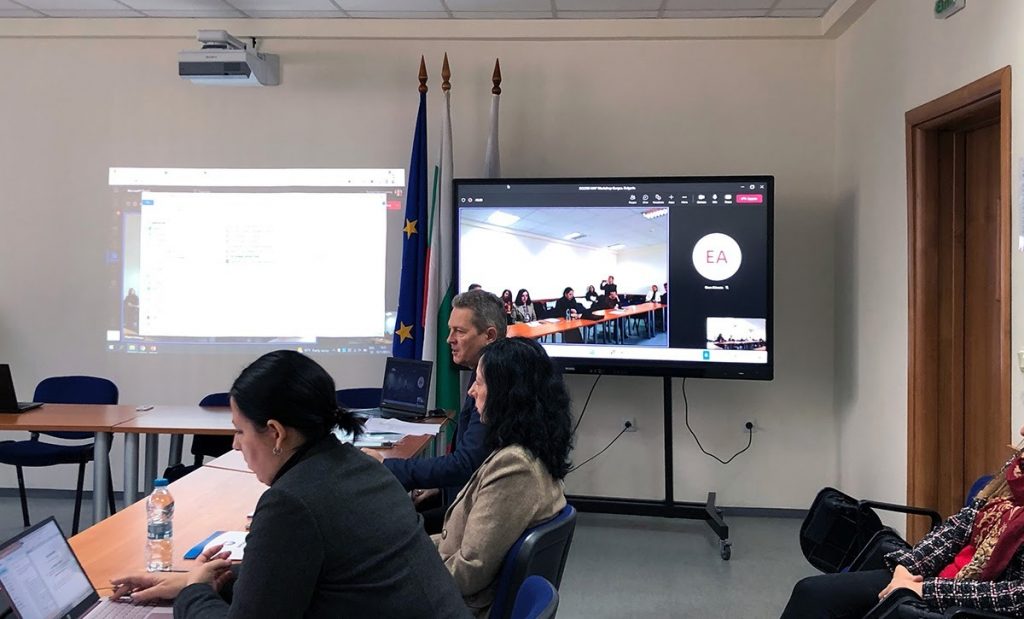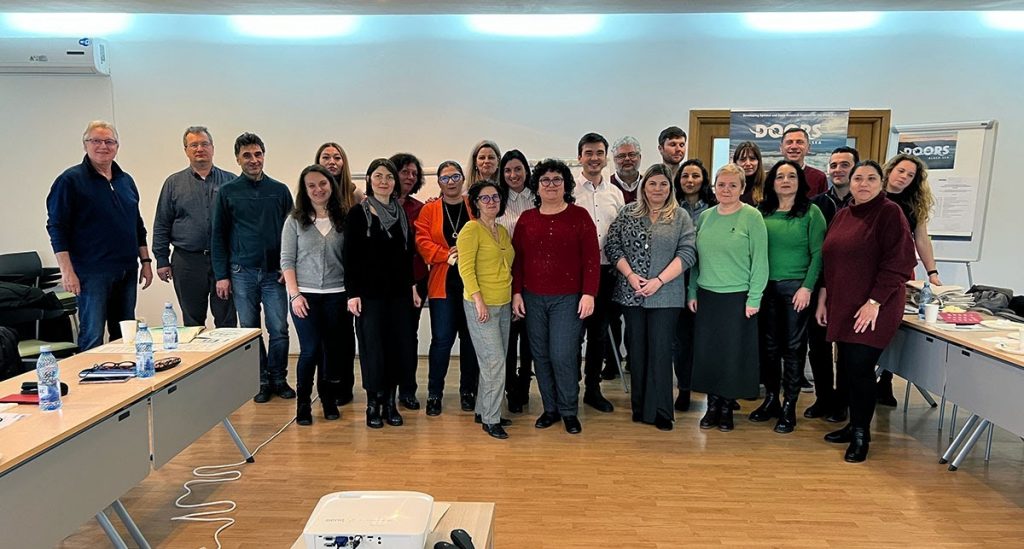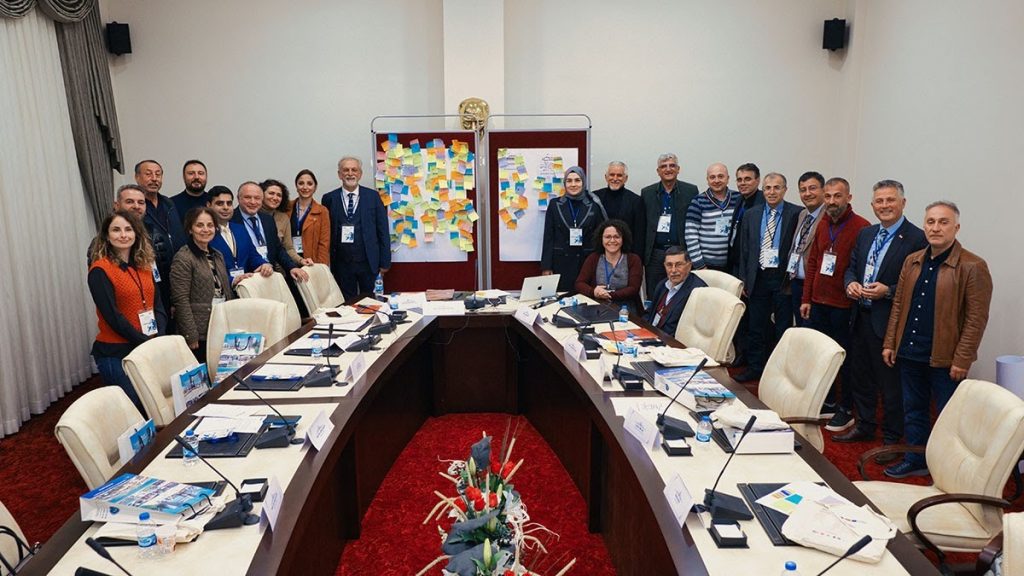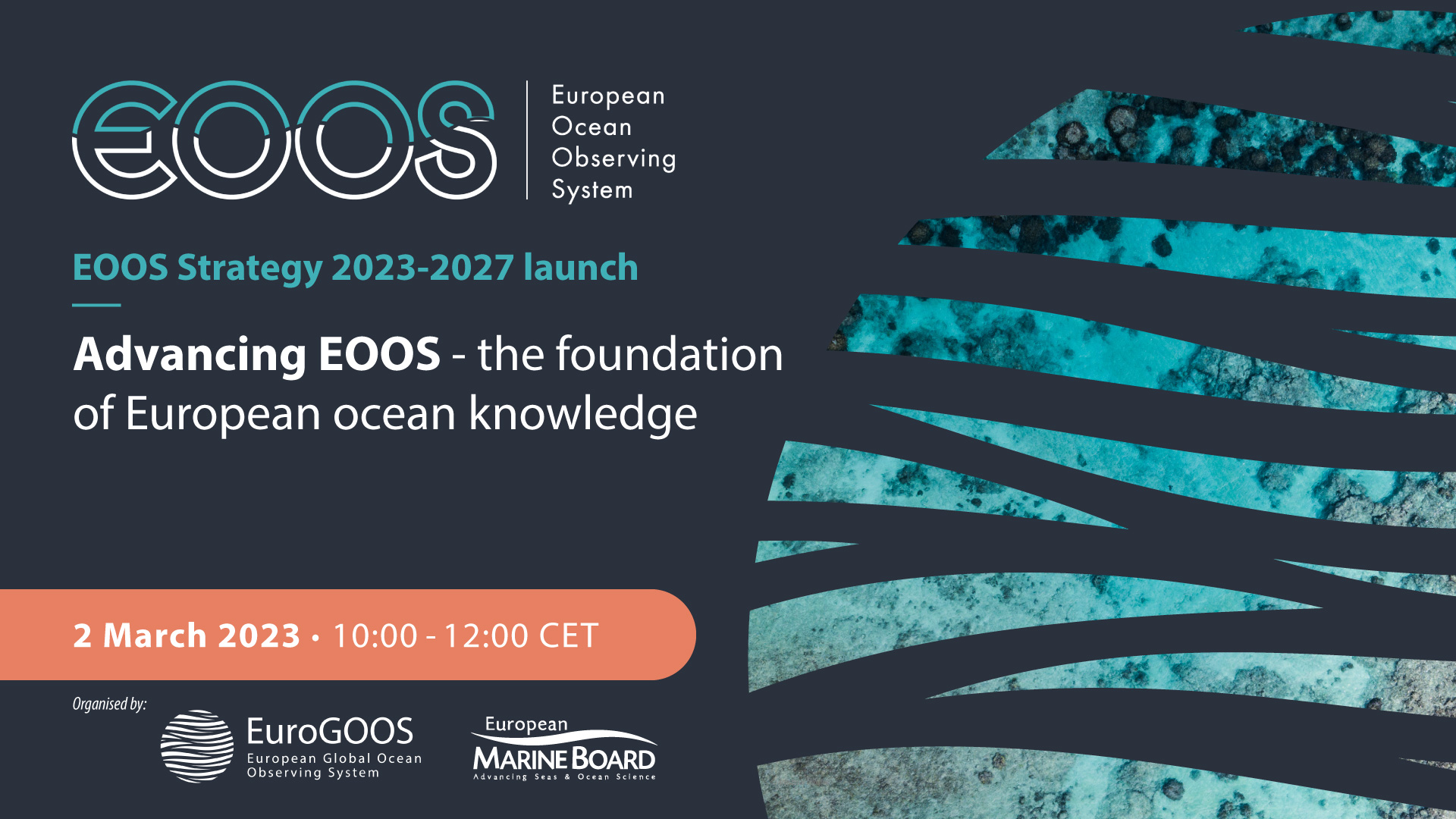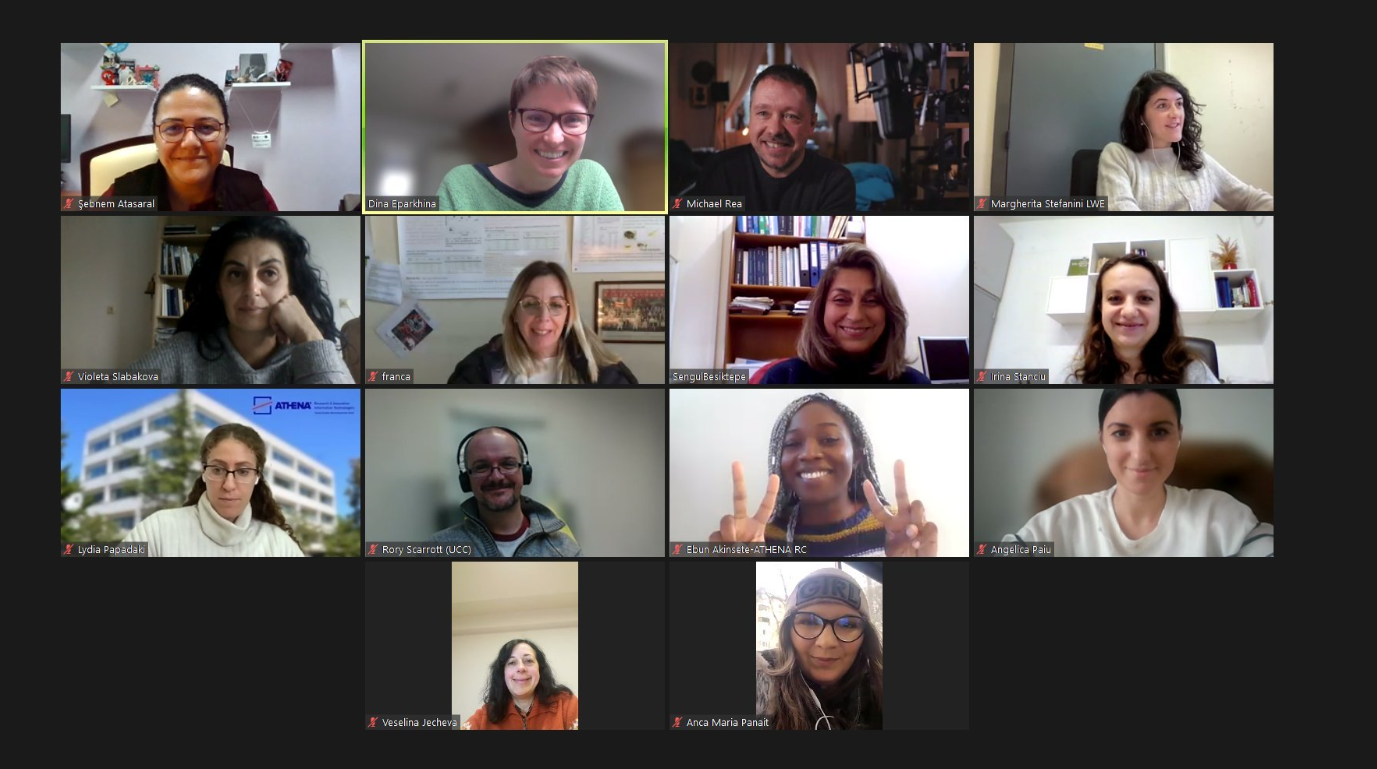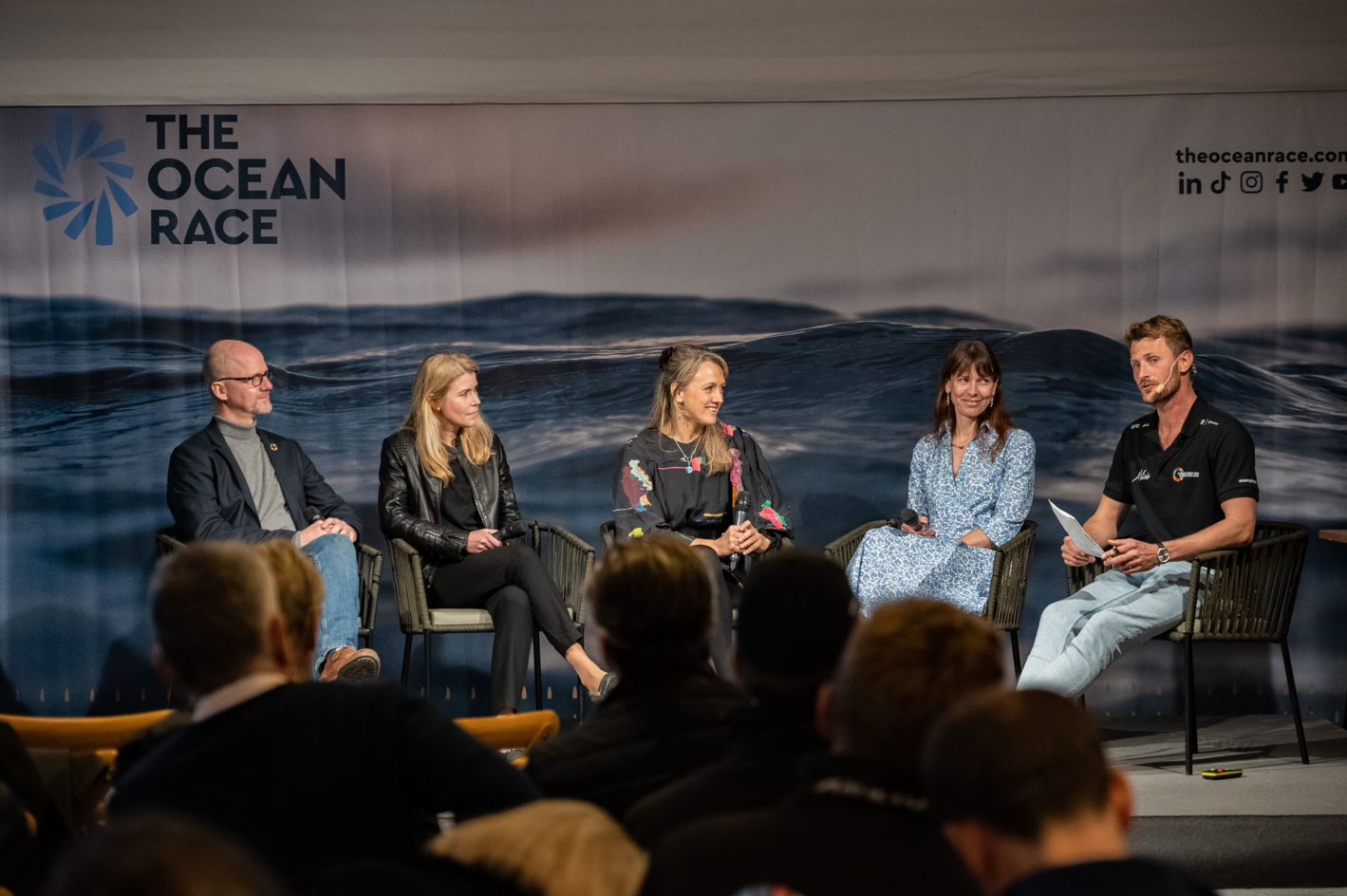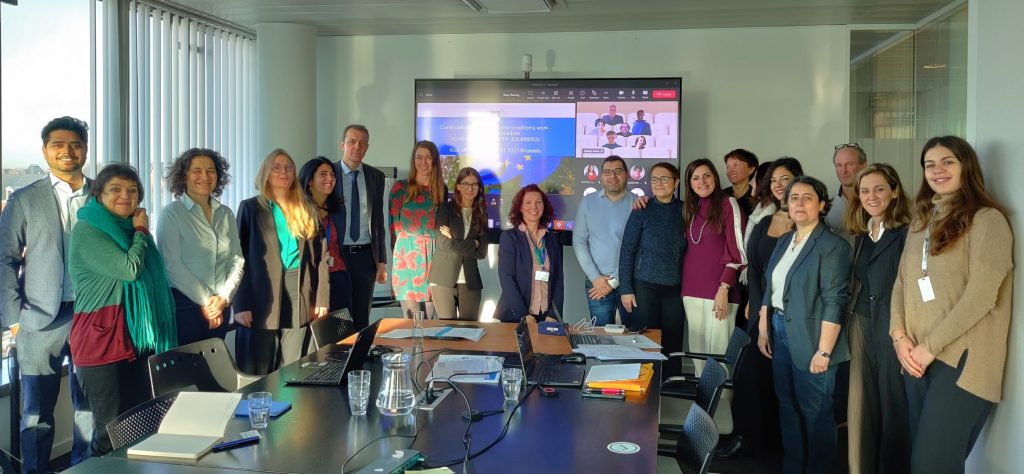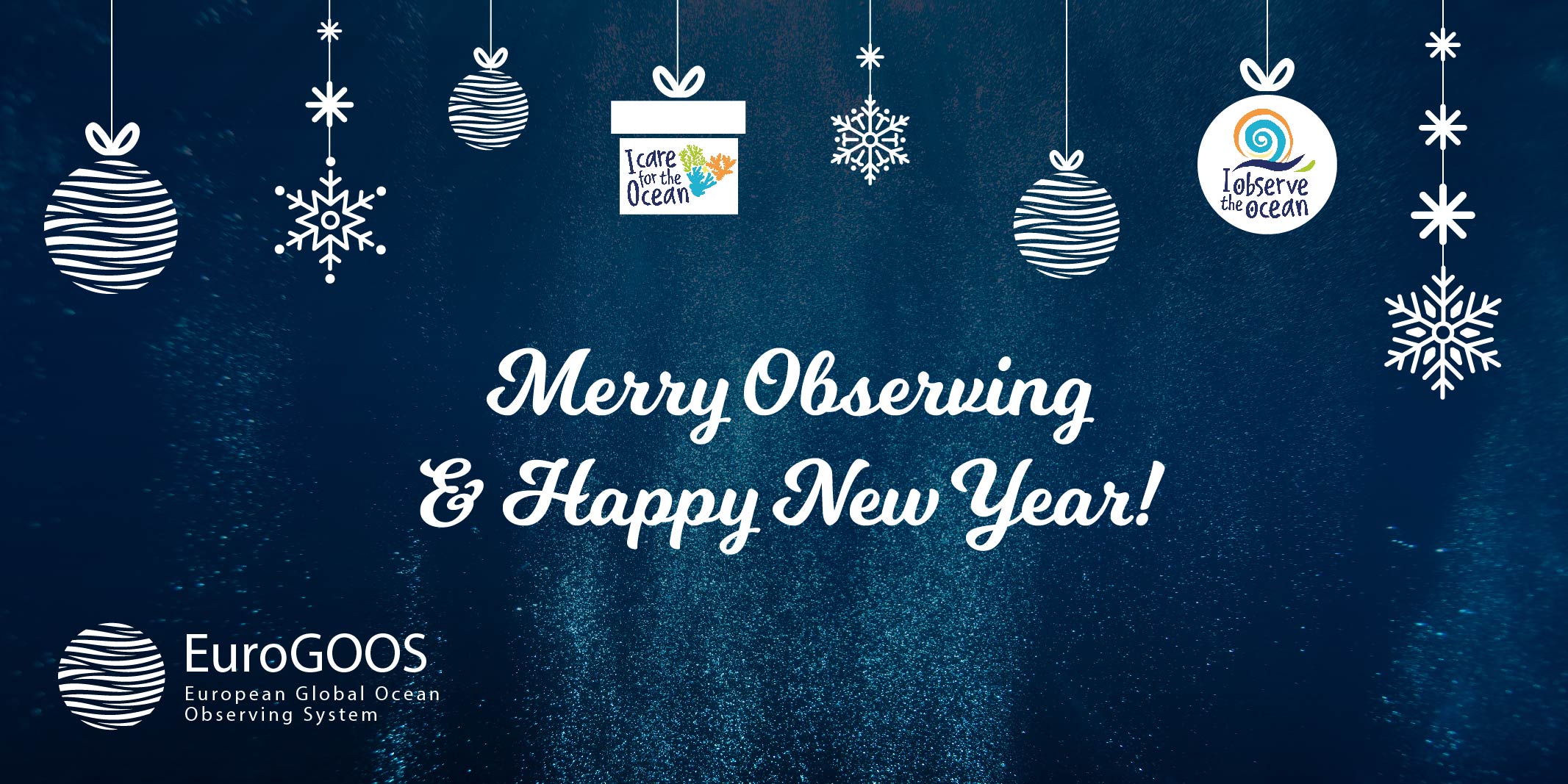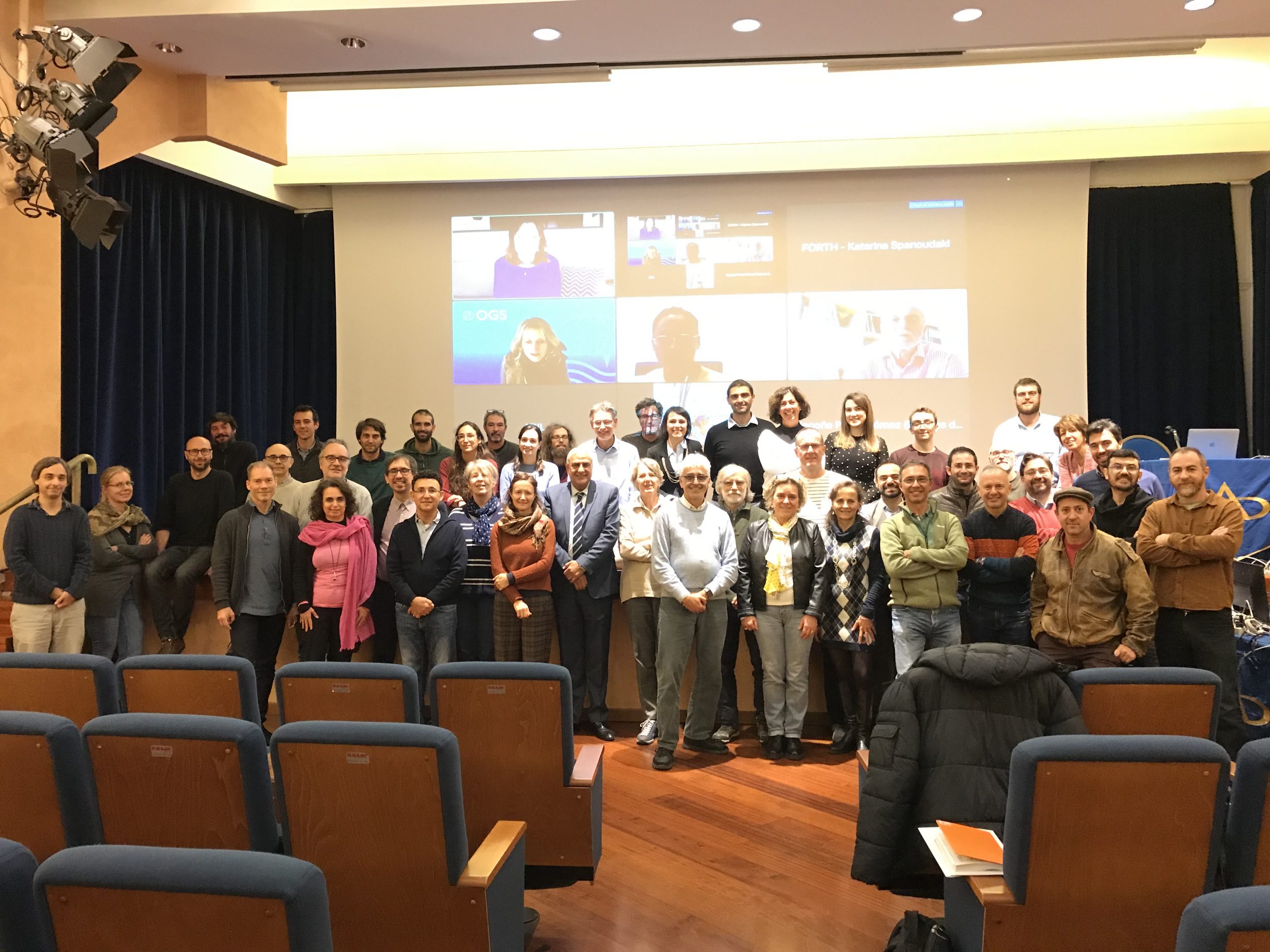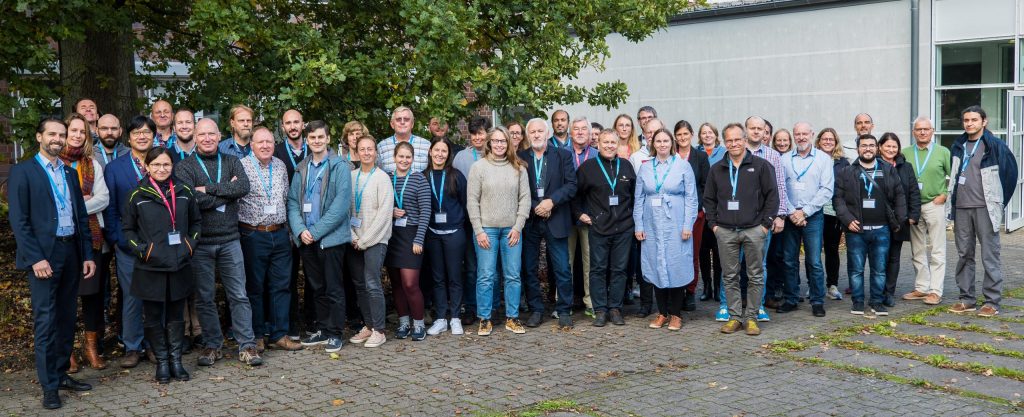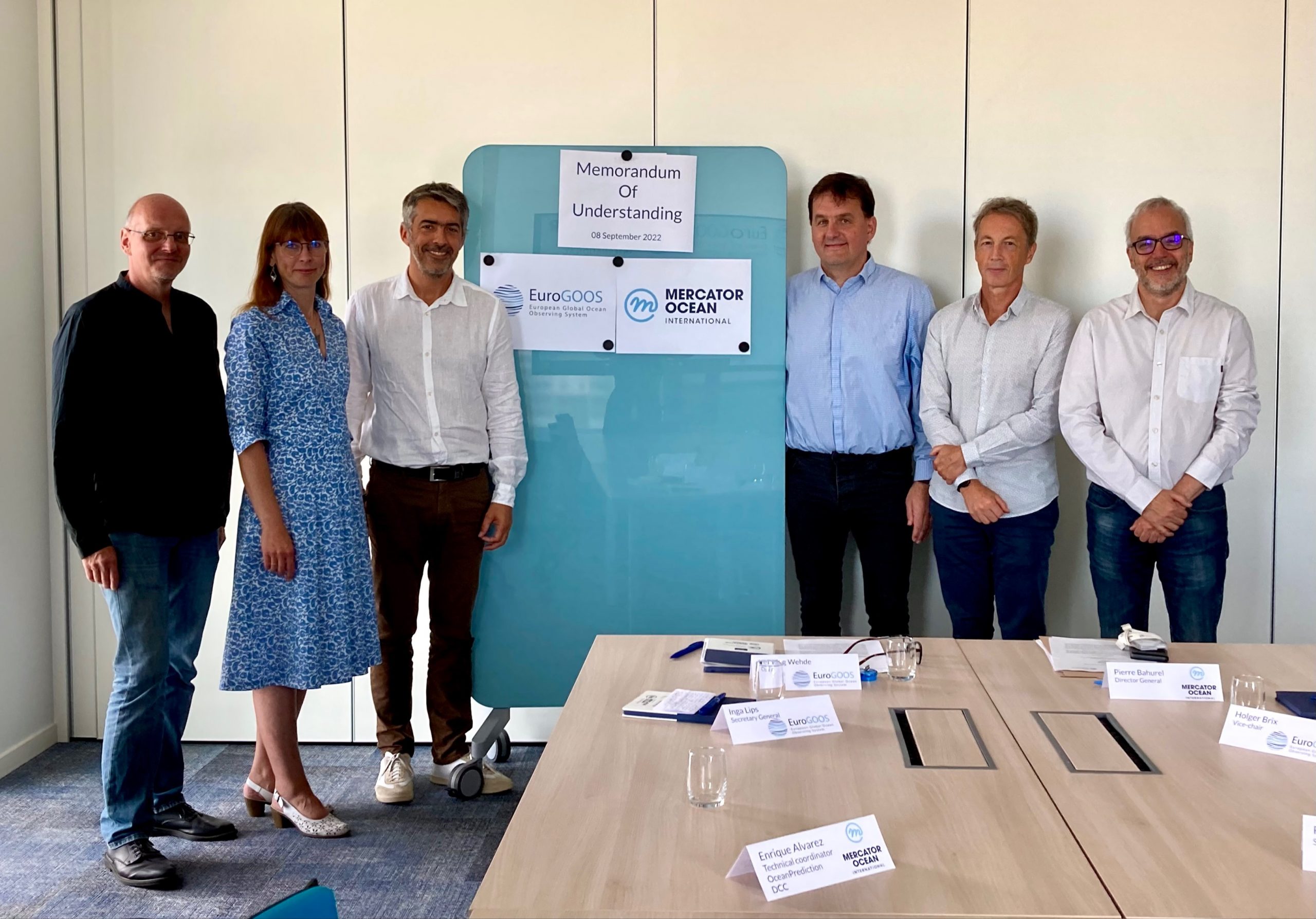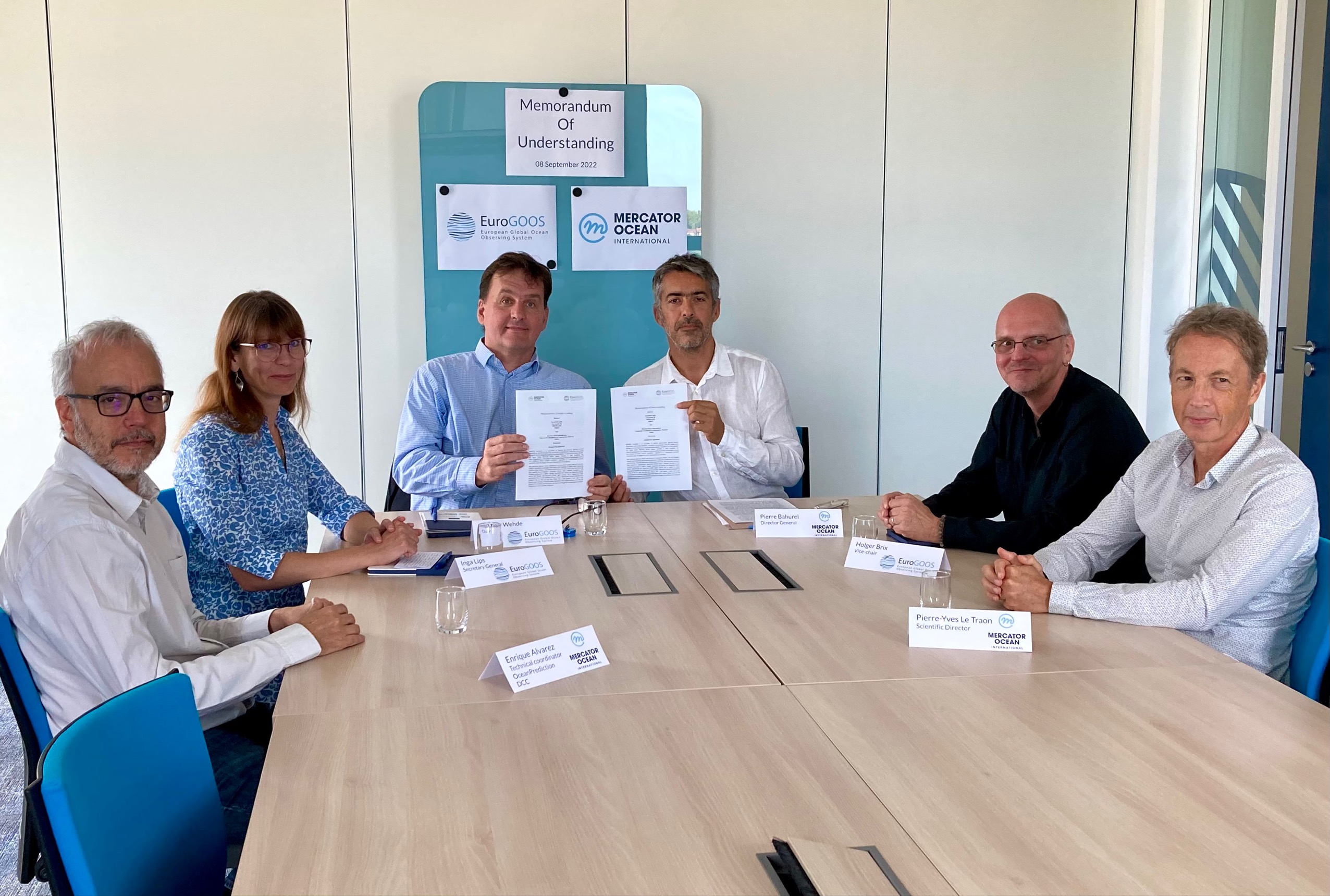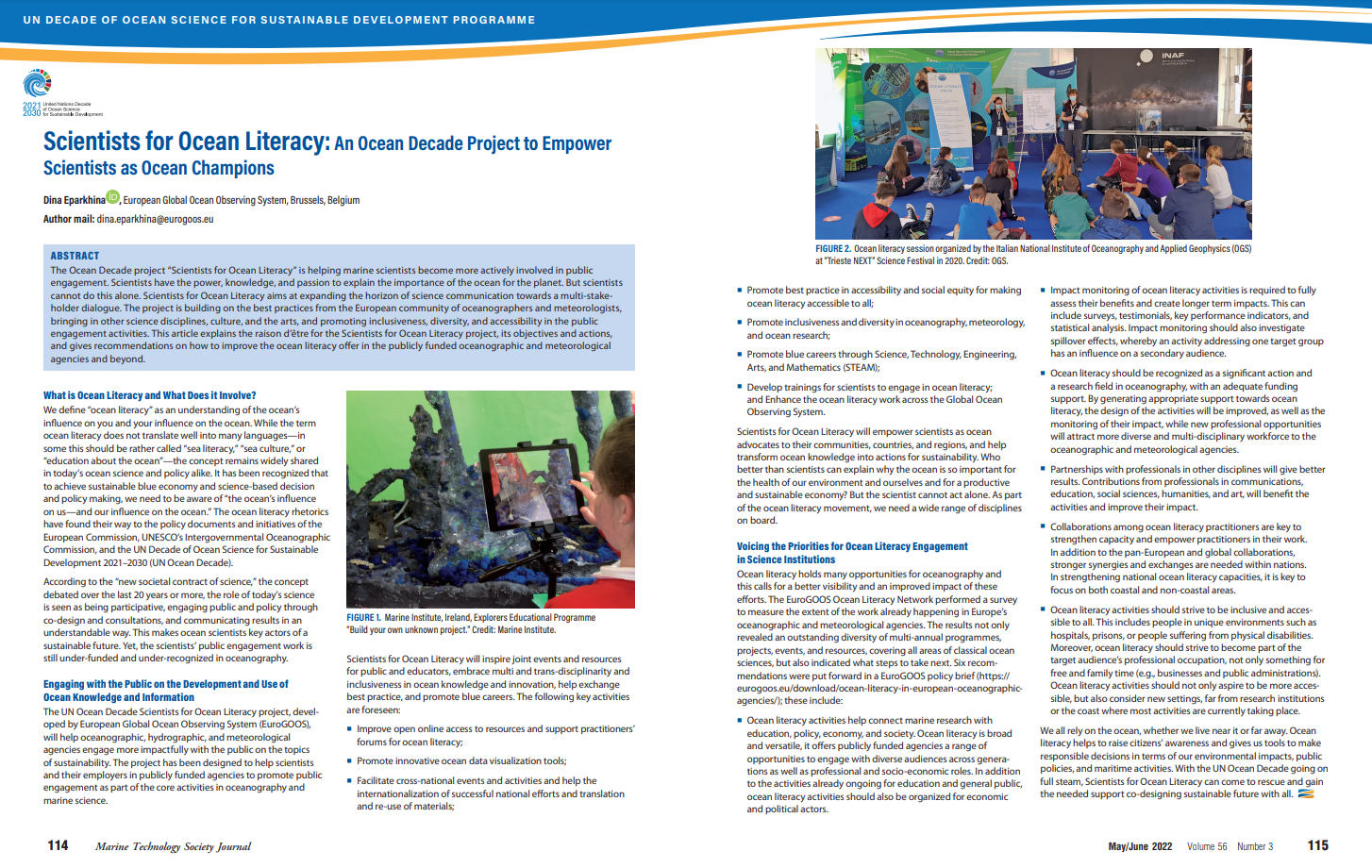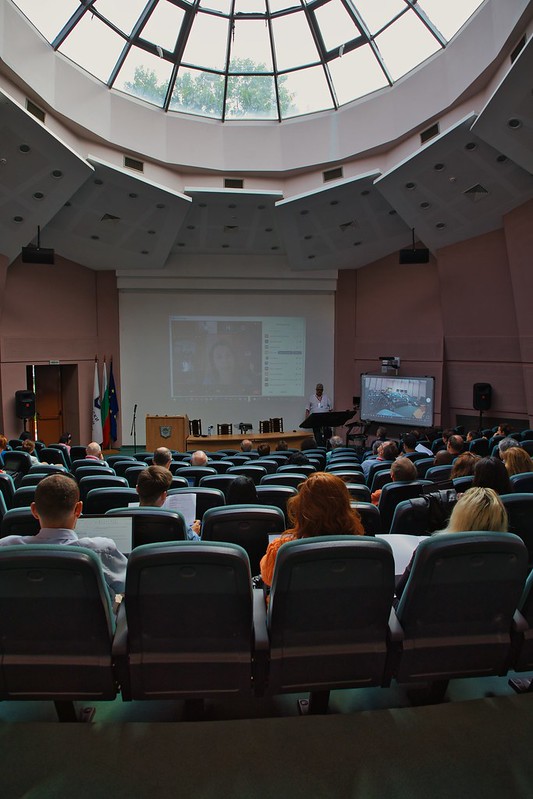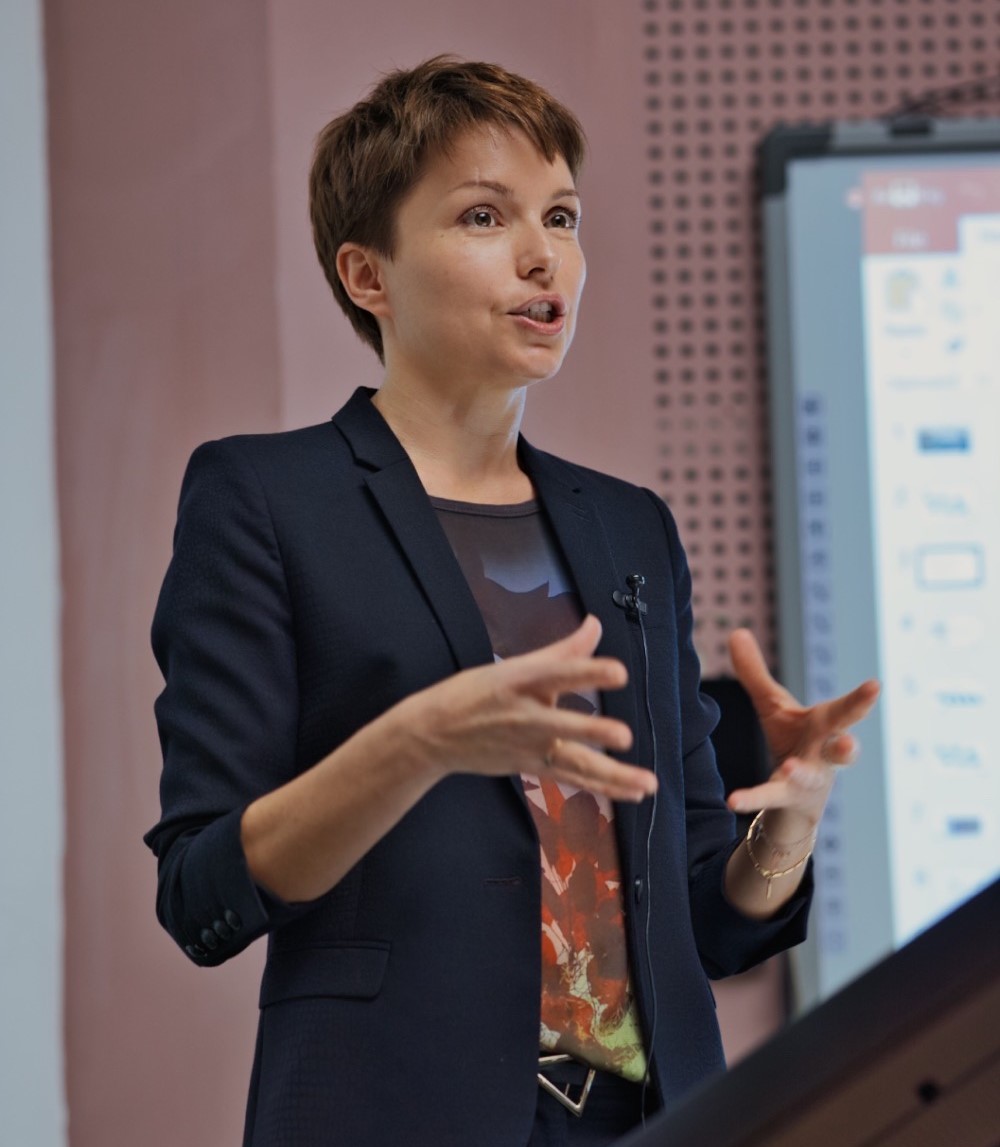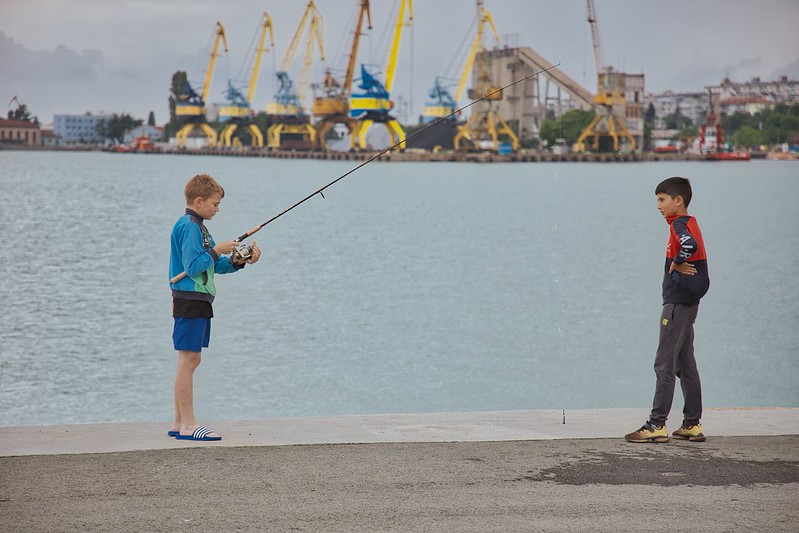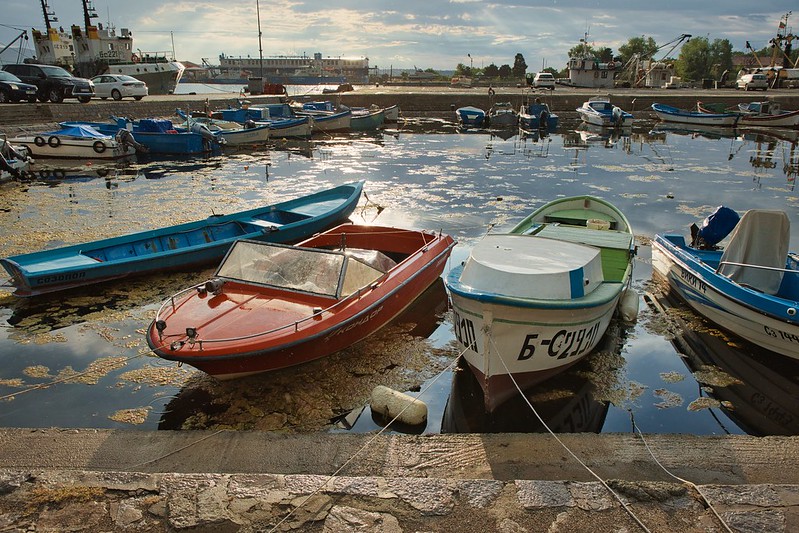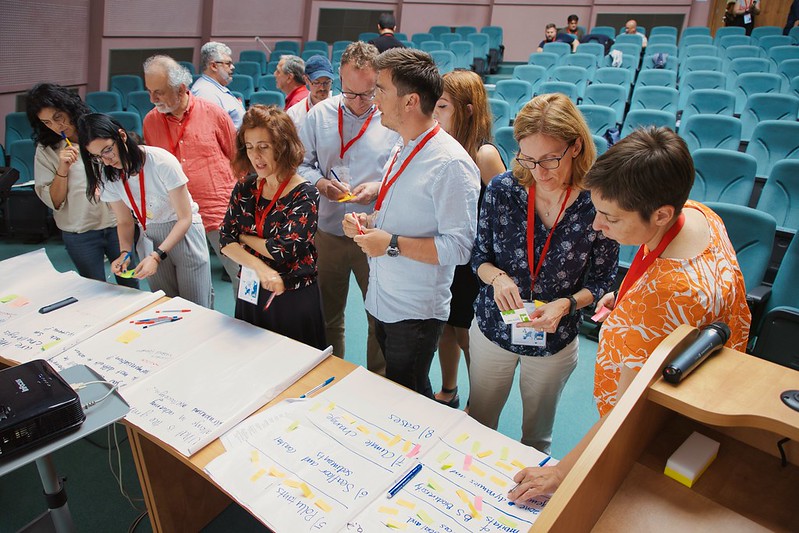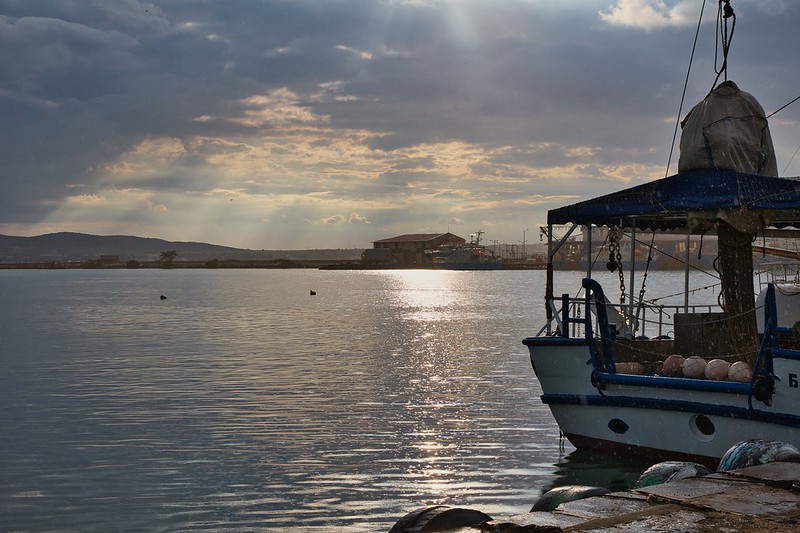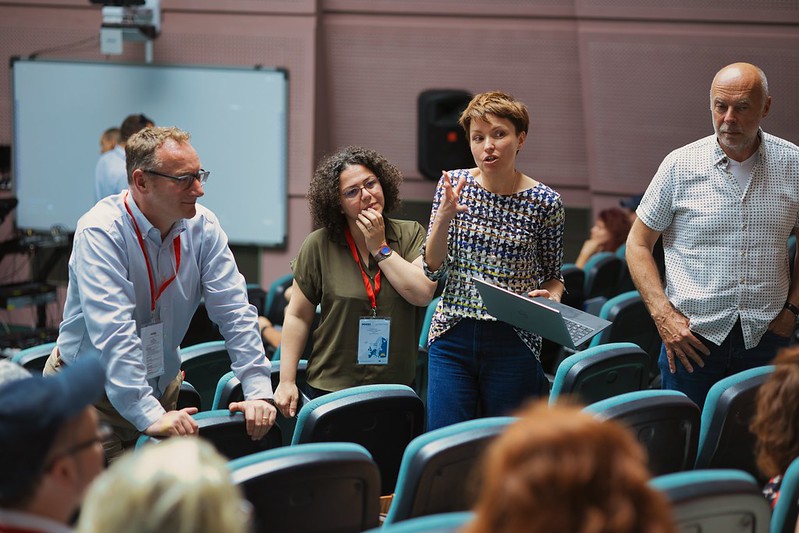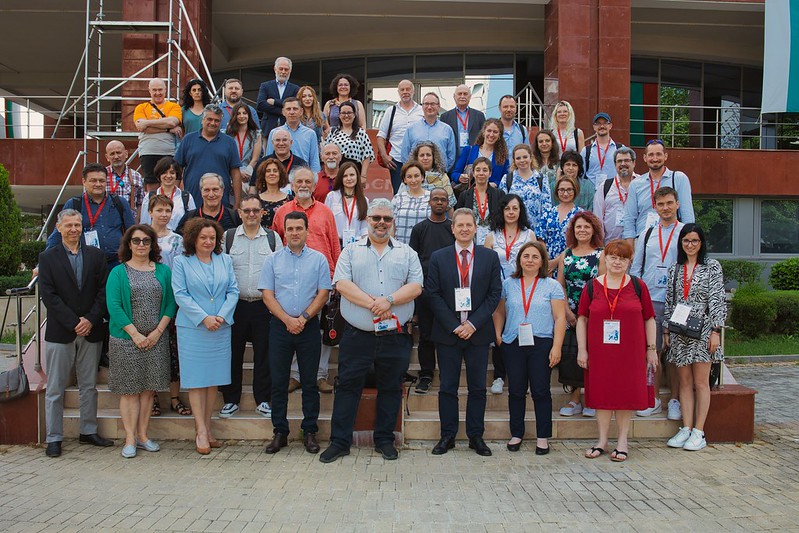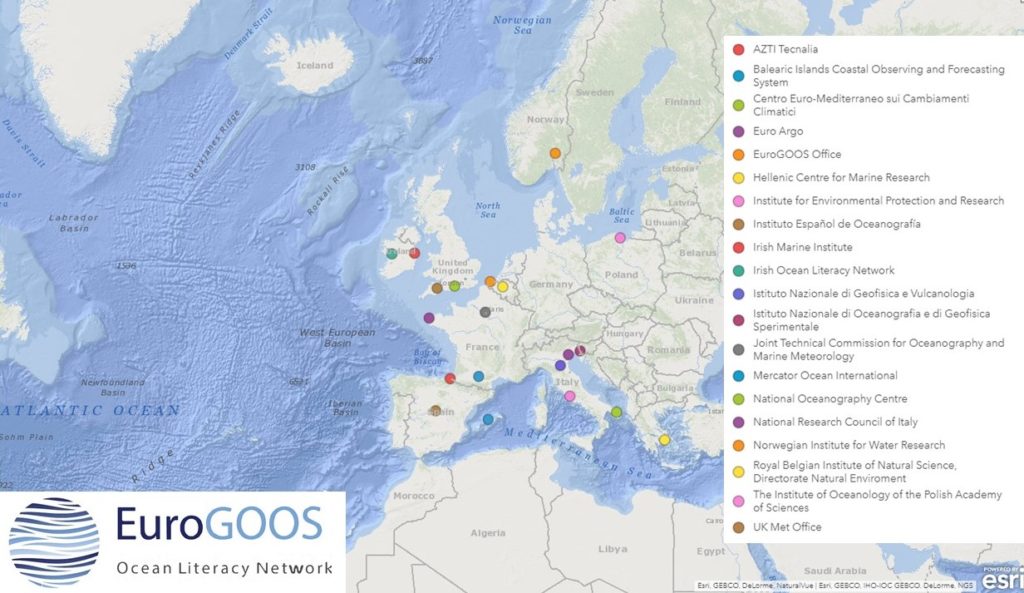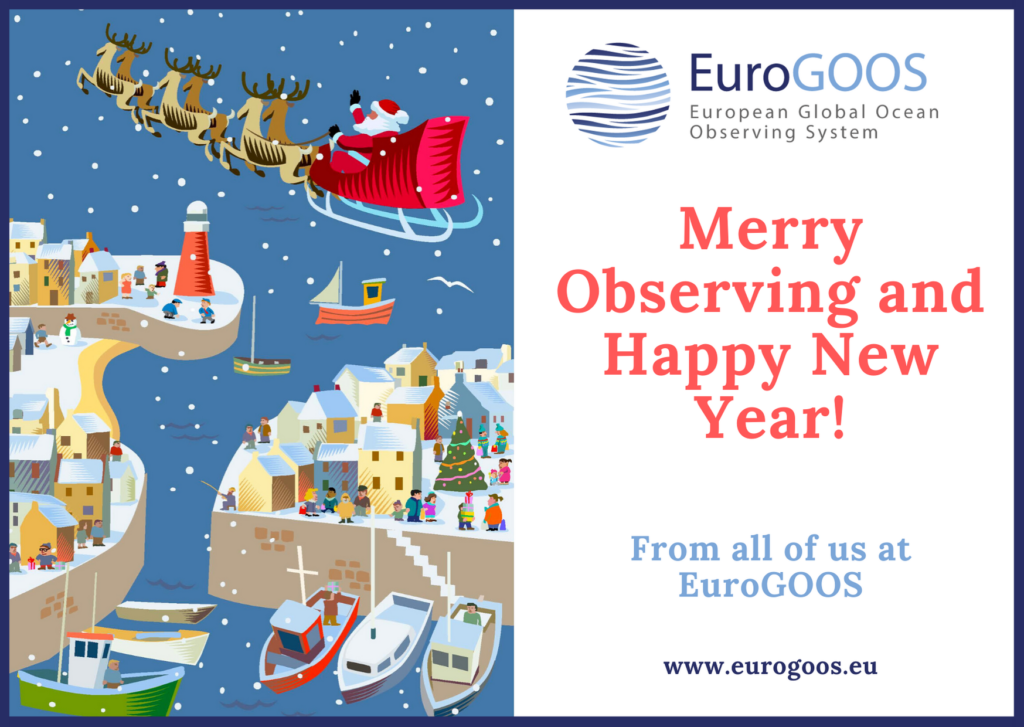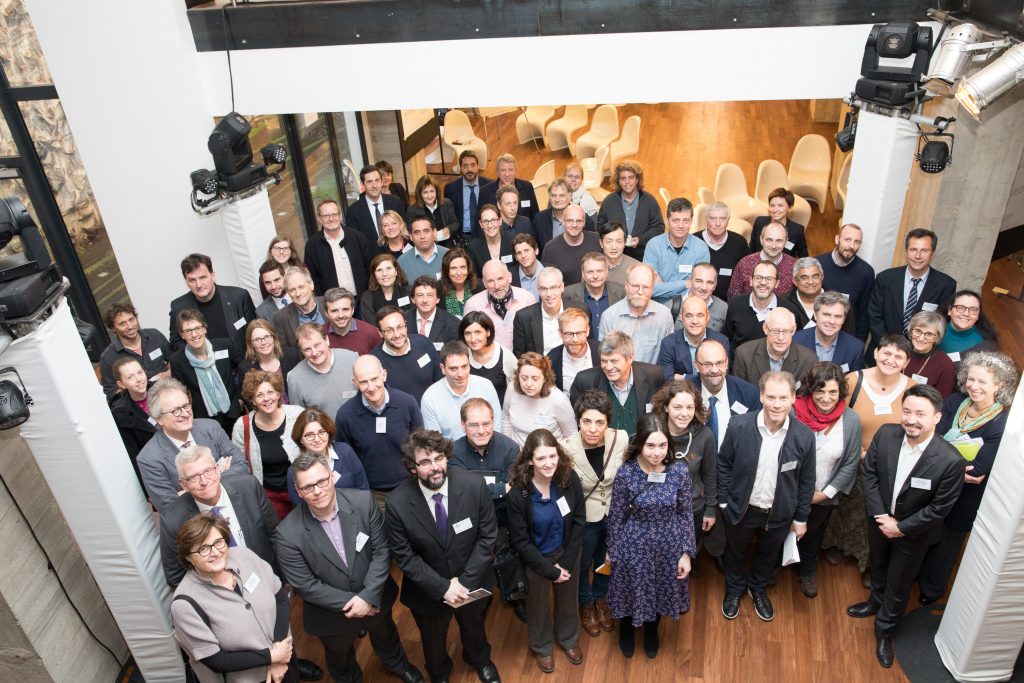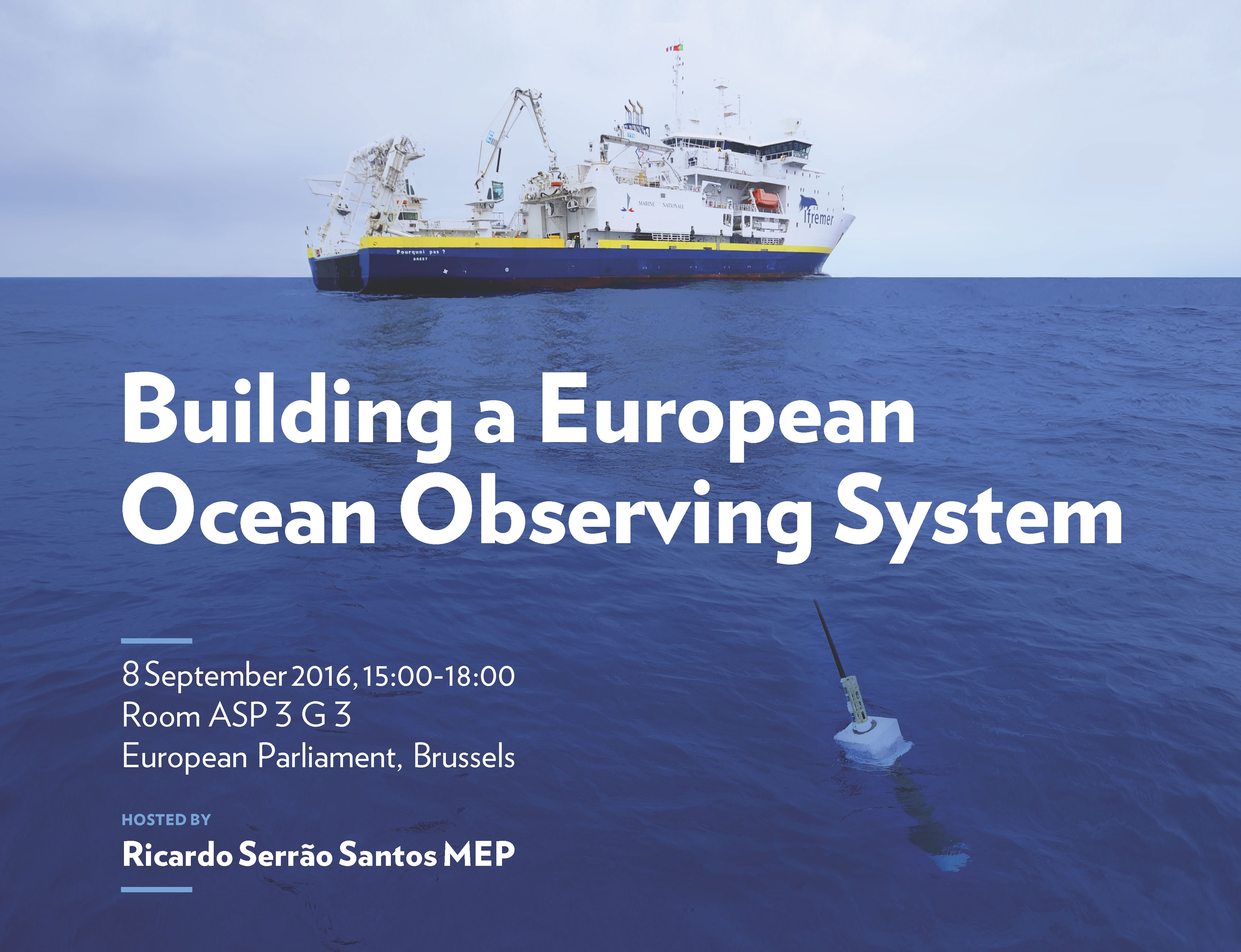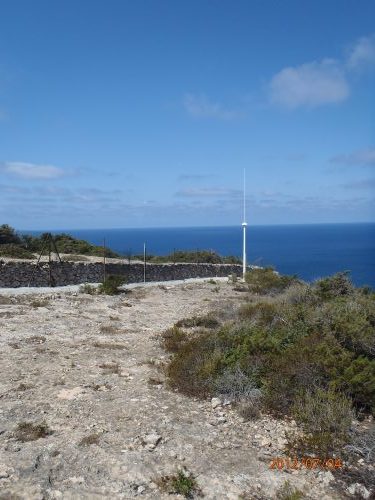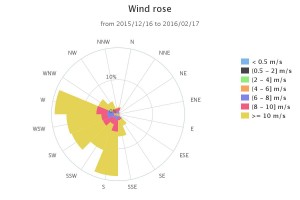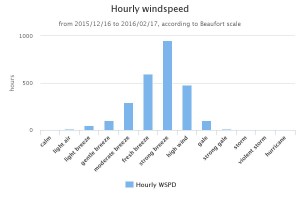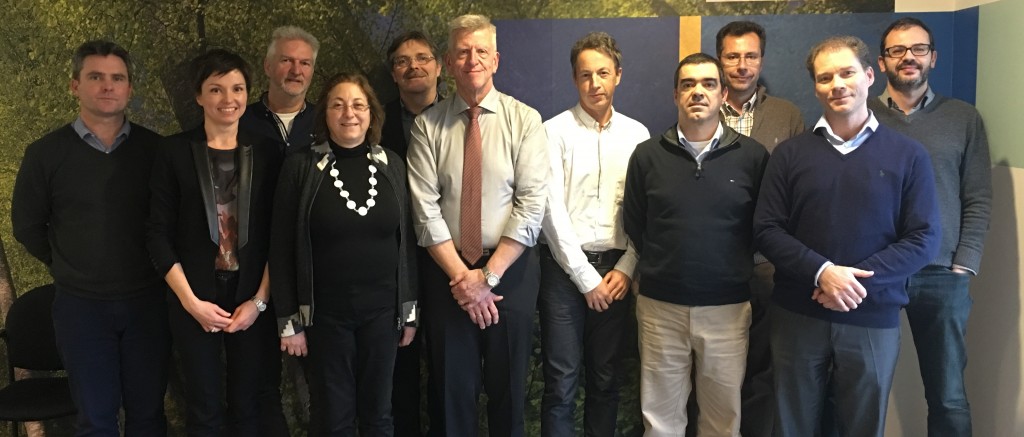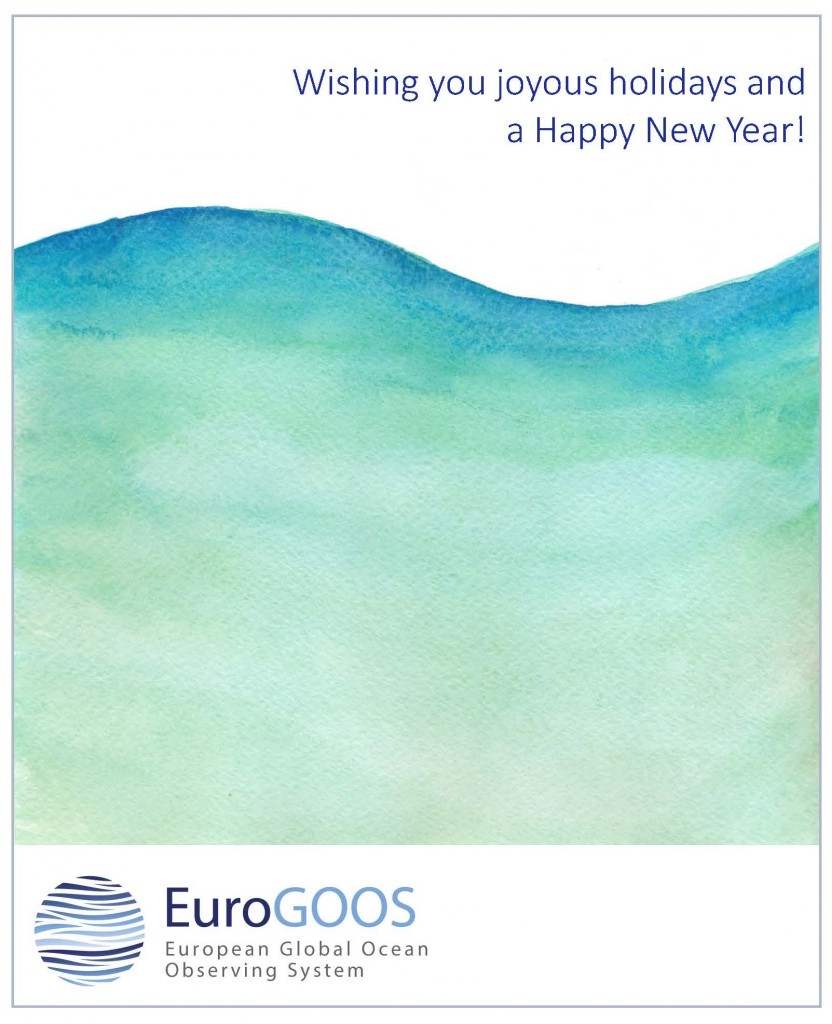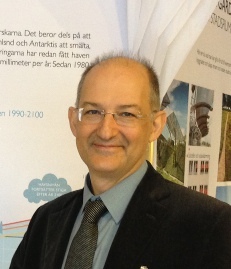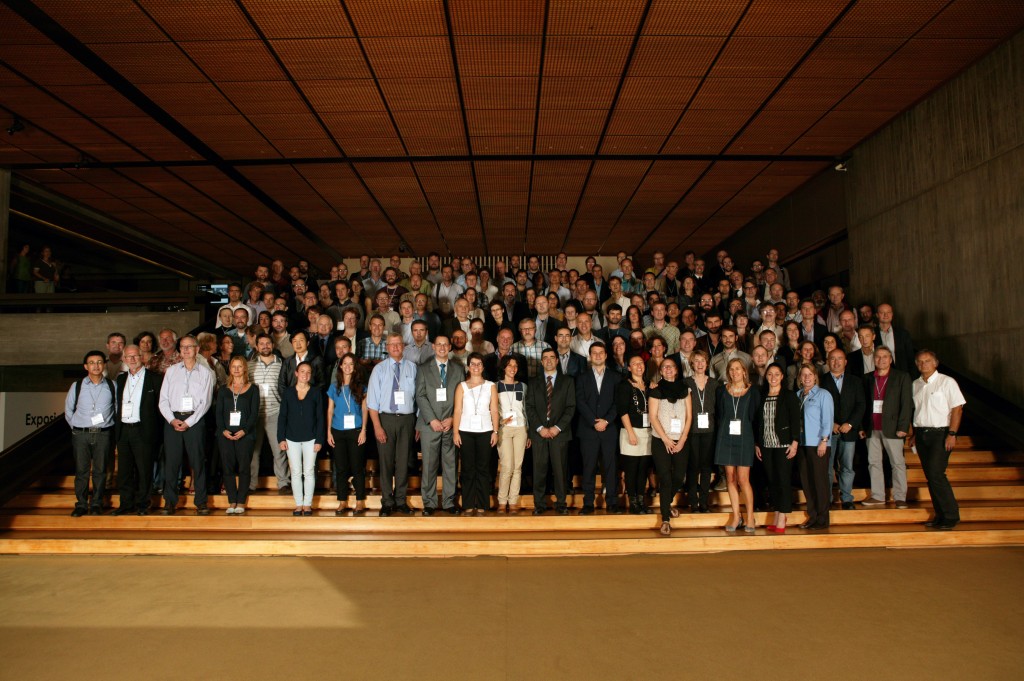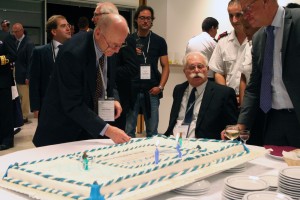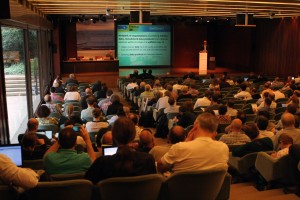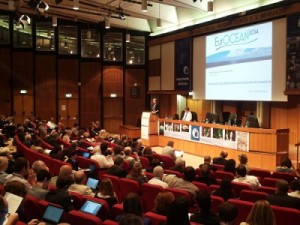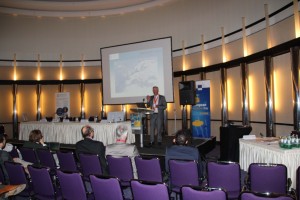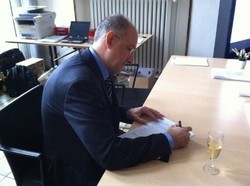Co-designing a pan-Arctic ocean observing alliance
EuroGOOS was a co-organiser of the sessions ‘Co-designing a pan-Arctic ocean observing alliance’ at the Arctic Observing Summit (AOS) 2024, in Edinburgh during Arctic Science Summit Week (ASSW). The session featured a summary of the identified need for an Arctic alliance for ocean observing (such as a GOOS Regional Alliance) and a timeline of efforts to establish one over several years. This was followed by a panel on ‘Arctic ocean observing: global context and large-scale regional initiatives’, featuring existing ocean observing networks active in the Arctic (including Arctic ROOS), and an Indigenous-led panel ‘Ocean observing: The rights, needs, and contributions of Arctic communities’. Key issues discussed included the need to connect the relevance of global-scale observing programmes to the needs of Arctic communities at local and regional scales, the great cultural importance of marine environments to Arctic communities alongside their role in subsistence and livelihoods, and the proper integration of Indigenous knowledge alongside western scientific knowledge systems. Emphasis was made on the rights of Indigenous communities to control activities, including ocean observing, in community’s region, and the need for improved training of researchers on how to appropriately engage and build trust with communities in the Arctic.
Several recommendations and actions from the meeting will be taken up but the international task team working to advance a process towards a pan-Arctic ocean observing alliance. The task team has also received formal endorsement from Sustaining Arctic Observing Systems (SAON), and remains open to further participants.
The post Co-designing a pan-Arctic ocean observing alliance appeared first on EuroGOOS.
New EuroGOOS data policy released in the Ocean Best Practices System
The new EuroGOOS data policy is now available on OBPS. This policy is the European implementation of the IOC Data Policy and Terms of Use adopted in 2023. It requires its members’ commitment to share core ocean data openly according to the FAIR principles and clear licences. By core in situ ocean data we mean, at least, the physical and biogeochemical Essential Ocean Variables (EOVs) which are necessary for the Copernicus Marine Service and the EuroGOOS Regional Operational Oceanographic Systems (ROOS), including coastal services, as well as the services delivered by the European Marine Observation and Data Network (EMODnet).
Discover the new EuroGOOS data policy in the OBPS by clicking this link.
The post New EuroGOOS data policy released in the Ocean Best Practices System appeared first on EuroGOOS.
THALASSA 2024 Marine Sciences Conference (Register now)
Thalassa 2024: Marine Sciences Conference aims to explore and identify the challenges faced by marine and coastal environments and propose ways to tackle them. It will also facilitate discussions between experts and provide a platform for participants to network for future collaborations.
The conference is aligned and officially endorsed by the United Nations Decade of Ocean Science for Sustainable Development.
THALASSA 2024 will provide a platform for knowledge exchange by bringing together marine experts and stakeholders from academic and research institutes, the industry, NGOs, and the public sector who will share their findings, innovations, and state-of-the-art developments on topics related to:
- Marine & Coastal Ecosystems (Ecology, Biology, Biodiversity, Threats, Pressures, Conservation, Restoration, Fisheries, Marine Protected Areas, Management)
- Marine Biotechnology & Aquaculture (Bioremediation, Integrated multitrophic Aquaculture, Diversification of Aquaculture, Biotechnology, Novel Techniques for Marine Monitoring)
- Oceanography (Ocean Data Management Systems, Marine Remote Sensing, MedOcean technology, Applications, Tools, and Technological Solutions)
- Marine Cultural Heritage (Integrated approaches in research and management of maritime cultural heritage sites)
- Marine and Coastal Governance (Marine and coastal governance, marine spatial planning, integrated coastal zone management, participatory mechanisms in governance)
Addressing and proposing science-based solutions to the challenges faced by marine and coastal environments in the Mediterranean region. The conference will also provide networking opportunities for participants to discuss current and potential collaborations.
Registration deadline: 15 April, 2024
For enquiries contact them at thalassa.conferences@cmmi.blue
The post THALASSA 2024 Marine Sciences Conference (Register now) appeared first on EuroGOOS.
Invitation to Contribute Articles (Frontiers in Ocean Observing)
In December 2024, The Oceanography Society plans to publish its third supplement to Oceanography magazine on “Frontiers in Ocean Observing”.
Letters of interest should be emailed to Oceanography Editor Ellen Kappel (ekappel@geo-prose.com) by March 15, 2024, and should contain the following:
- A summary of the content of the proposed paper (no more than 200 words)
- Potential authorship and affiliations
- Identify which theme your article would fit under (see below)
- Contact information
Notice of invitations to contribute an article will be sent by April 15, 2024. Further information on deadlines can be found here.
The post Invitation to Contribute Articles (Frontiers in Ocean Observing) appeared first on EuroGOOS.
EuroGOOS has been endorsed as an implementing partner of the UN Ocean Decade!
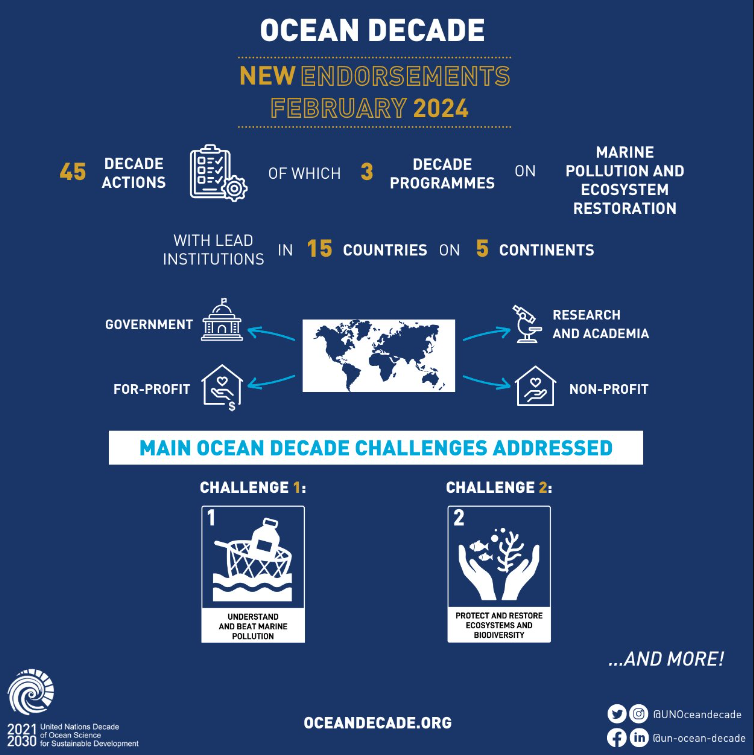 Launched in January 2021, the United Nations Decade of Ocean Science for Sustainable Development (2021-2030), the ‘Ocean Decade’, provides a convening framework for a wide range of stakeholders across the world to engage and collaborate outside their traditional communities to trigger nothing less than a revolution in ocean science. As an Ocean Decade Implementing Partner for Europe, EuroGOOS strongly supports this initiative and ensures that its activities support the aims of the Decade.
Launched in January 2021, the United Nations Decade of Ocean Science for Sustainable Development (2021-2030), the ‘Ocean Decade’, provides a convening framework for a wide range of stakeholders across the world to engage and collaborate outside their traditional communities to trigger nothing less than a revolution in ocean science. As an Ocean Decade Implementing Partner for Europe, EuroGOOS strongly supports this initiative and ensures that its activities support the aims of the Decade.
EuroGOOS is leading stakeholder engagement activities in European Union initiatives and projects and includes key expertise to help engage the community in the Decade and/or streamline the European contributions, with global impacts. Furthermore, EuroGOOS possess unique scientific and technical expertise and knowledge of the European landscape of marine research, oceanography, and innovation.
EuroGOOS, the European component of the IOC/UNESCO’s Global Ocean Observing System, will identify priorities, enhance cooperation, and promote the benefits of operational oceanography to ensure sustained observations in Europe’s seas.
The post EuroGOOS has been endorsed as an implementing partner of the UN Ocean Decade! appeared first on EuroGOOS.
EOOS Technology Forum 2024 at Oceanology International (Register your interest)
The 2024 EOOS Technology Forum “Catching the momentum in ocean observing technology: optimising value and data provision” will take place on the 13 March 2024 at the Oceanology International, Excel, London (09:45-17:45 UTC).
To increase the value and sustainability of ocean observing platforms and systems, observers have turned their attention toward technologies that can deliver data from greater coverage at effective cost. The European Ocean Observing System (EOOS) is the infrastructure, platforms, sensors and people that gather the required data and information about Europe’s ocean, seas and coastal waters.
The 2024 EOOS Technology Forum will bring together technology developers, manufacturers and users to exchange knowledge on platforms and sensors of all types, costs and levels of technical sophistication with the goal to enhance accessibility of ocean observations. Key technological issues such as ease of maintenance, evolution and adaptation, ease of deployment and sustainability, will be discussed. The event will identify and promote emerging synergies in the technology community to advance the optimisation of ocean observing in Europe and worldwide.
The focus of this event will be on exploring the technologies and systems transforming the ongoing operations of critical marine observing infrastructure and initiatives, and discussing the innovation and practical steps that will be needed to expand capabilities in terms of value, return-on-investment and data provision while continuing to preserve functional cost-effectiveness and asset integrity. This event is open to all registered participants of Oceanology International.
This workshop is organised by EuroGOOS with the support of Jerico, Ifremer, OGS and SMHI, and DOOS.
To register your interest, please fill this form.
The post EOOS Technology Forum 2024 at Oceanology International (Register your interest) appeared first on EuroGOOS.
MakeEUBlue Awards 2024: Submit your initiative by 23 February
The EU4Ocean coalition is organising its third “MakeEUBlue” Awards competition that will honor significant achievements in ocean literacy in Europe. Supported by the European Commission, the awards aim to raise awareness about the seas’ importance and encourage ocean literacy initiatives with long-term value. The projects must be aligned with the EU4Ocean philosophy and mobilise organisations from the different communities of the Coalition. Applications are open until 23 February here.
The post MakeEUBlue Awards 2024: Submit your initiative by 23 February appeared first on EuroGOOS.
Call for abstracts and travel grants open for the International Underwater Glider Conference
The International Underwater Glider Conference is a five-day event where members of the underwater glider community can engage in dialogue, share experiences, and develop best practices to strengthen international collaboration. This is an opportunity to enhance the glider community efforts and share the latest in scientific research and operational developments. The event, supported by the EuroGOOS Glider Task Team, includes plenaries, workshops, training, break-out, and poster sessions. Submit your abstract by 29 February here.
The post Call for abstracts and travel grants open for the International Underwater Glider Conference appeared first on EuroGOOS.
Arctic ROOS and OceanPrediction DCC workshop: Ocean and sea ice forecasting in the Arctic
The Arctic ROOS and the Arctic Regional Team of the OceanPrediction DCC organised a joint online workshop on 17 and 18 January, titled ‘Ocean and sea ice forecasting in the Arctic’. The workshop featured keynote presentations by Laurent Bertino (NERSC) on advances in modelling salinity in the Ice-covered Arctic, and Maria Berdahl (European Commission DG DEFIS) on the development of Copernicus’ polar applications.
The workshop explored the current state of the art in ocean and sea ice forecasting services in the Arctic, including numerical modelling and observations needed to support forecasting. Downstream user services and applications were discussed, along with perspectives for future priorities. Discussions between presenters and participants identified recommendations for developments to existing forecasting, which will contribute to the ongoing work of Arctic ROOS and the Arctic Regional Team of the OceanPrediction DCC.
The post Arctic ROOS and OceanPrediction DCC workshop: Ocean and sea ice forecasting in the Arctic appeared first on EuroGOOS.
Merry Observing and Happy New Year!
2023 has been a milestone year for EuroGOOS, marked by the celebration of the 10th edition of our International Conference, an event that brought together more than 160 people committed to operational oceanography. Hosted by the Marine Institute in Galway, the event allowed invaluable face-to-face interactions, exchanges, and new ideas, succinctly summarised in the Conference Statement, outlining the strengths and challenges for the European operational oceanography community coordinated by EuroGOOS. Working as one community can ensure sustained European ocean observing and forecasting for user-focused oceanographic services for society. This year, EuroGOOS has further advanced European capacities by bringing together the ocean observing operators, European Research Infrastructures, funders, users, and policy and decision makers. We will continue in this direction in 2024, fostering community building, best practices, and international, regional, and national cooperation.
This year, two new members have joined the EuroGOOS family: the French National Centre for Scientific Research (CNRS) and the Cyprus Marine & Maritime Institute (CMMI). CMMI will host the next edition of the EuroGOOS International Conference in 2026 in Cyprus, as an official event of the Cyprus Presidency of the Council of the European Union.
2023 has seen the completion of some projects that have been essential for our community, such as EuroSea, whose legacy report was delivered by EuroGOOS and can be downloaded here. We have also completed a tender project with DG MARE and CINEA titled All Ocean Obs, which helped the Commission to advance the Ocean Observations – Sharing Responsibility Initiative. Following several successful proposals, in 2024 we are joining new important projects and initiatives, such as AMRIT that will help to advance EOOS via implementing an EOOS Technical Support Center to ensure harmonised and coordinated operation of marine observation platforms; BioEcoOcean to co-create a comprehensive, fit-for-purpose, and inclusive Blueprint for Integrated Ocean Science (BIOS) that promotes a holistic approach, fosters effective communication and collaboration among stakeholders and sectors, and enables interoperability; ObsSea4Clim to improve regional and global climate assessments and provide projections and actionable indicators for sustainable development, and FOCCUS to improve and advance the coastal dimension of the Copernicus Marine Service. We will continue our work in ongoing projects, DOORS, Blue-Cloud2026, JERICO S3 and JERICO DS, EU4Ocean, EEA COINS.
This year has also been rich in terms of the work carried out by the EuroGOOS Regions (ROOS), Working Groups and Task Teams. We would like to highlight the MonGOOS General Assembly held in Tangier in November for the first time on the African continent, and promoting closer collaboration between the Mediterranean countries. NOOS has successfully prepared its Strategy 2030, to be launched next year. BOOS has been instrumental in improving the CMEMS products for the MSFD reporting through the collaboration with HELCOM, as part of the EuroSea project. The Arctic ROOS has continued to increase its activities in 2023, having a central role in the international initiative to develop a potential future Arctic GRA and organising a joint workshop with the Arctic Regional Team of the OceanPrediction DCC, to be held in January 2024.
EuroGOOS Working Groups have continued to boost exchange of best practices and the promotion of common European positions. DATAMEQ WG has successfully developed a new EuroGOOS Data Policy, which implements the IOC Data Policy adopted in 2023 in a European context. Ocean Literacy WG has co-organised a successful side event and a session at the 10th EuroGOOS International Conference, promoting the paramount importance of scientific inputs and expertise in changing humanity’s relationship with the ocean. The Coastal WG continues its role in coordination with various projects and initiatives, and is currently preparing its new roadmap of activities for the coming years.
EuroGOOS Task Teams have been as active as ever throughout 2023. The Glider TT is involved in organising the International Underwater Glider Conference 2024, due to be held in Gothenburg in June 2024. The renewed Argo TT had its kick off meeting in February, and is developing its activities in coordination with the Euro-Argo ERIC. The Fixed Platforms TT, which held an in-person meeting in Rome in April, is building up its work, including establishing a network of European fixed platforms.
EuroGOOS has continued to lead the development of the EOOS Framework as chair of the Steering Group. New EOOS Strategy 2023-2027 and Roadmap for Implementation were published in early 2023 with an online launch event featuring various high-level and expert speakers from different sectors which EOOS supports. Next year, with the aim of fostering collaboration with industry, the EOOS Technology Forum 2024, titled ‘Catching the momentum in ocean observing technology: optimising value and data provision’ will take place during Oceanology International on 13 March, co-organised by EuroGOOS and partners. EuroGOOS will continue the co-design and engagement activities with European and global partners towards a robust and user-focused EOOS.
On behalf of the EuroGOOS Office and the entire EuroGOOS community, we would like to wish you Merry Observing and a Happy New Year! 
The post Merry Observing and Happy New Year! appeared first on EuroGOOS.
10th EuroGOOS International Conference Proceedings launched!
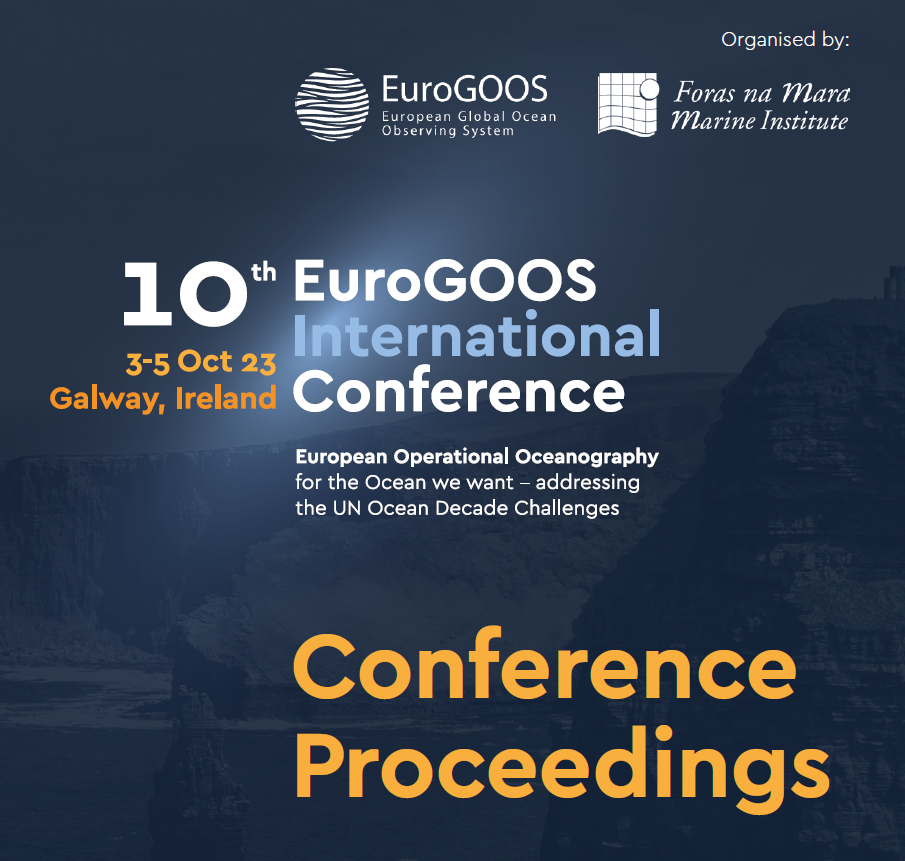 From 3 to 5 October 2023, EuroGOOS held its 10th International Conference, hosted in Galway by the Marine Institute, Ireland. The Conference, titled European Operational Oceanography for the Ocean we want – Addressing the UN Ocean Decade Challenges, was an endorsed Ocean Decade event.
From 3 to 5 October 2023, EuroGOOS held its 10th International Conference, hosted in Galway by the Marine Institute, Ireland. The Conference, titled European Operational Oceanography for the Ocean we want – Addressing the UN Ocean Decade Challenges, was an endorsed Ocean Decade event.
The event brought together over 160 participants for an in-person Conference covering all aspects of operational oceanography and its societal relevance. The Conference was opened by the Interim CEO of the Marine Institute Michael Gillooly, Executive Secretary of the Intergovernmental Oceanographic Commission of UNESCO Vladimir Ryabinin, Director for Maritime Policy & Blue Economy at the European Commission DG MARE Delilah Al Khudairy, and Head of Unit Healthy Seas and Ocean at the European Commission DG Research and Innovation Elisabetta Balzi.
The Conference was an astounding success, as shared by the attendees and speakers alike. The Conference proceedings, edited by the office, have been released. Furthermore, short videos are available on the EuroGOOS YouTube channel – both a 3-min summary and several shorter videos with interviews.
Conference Proceedings is available below:
The post 10th EuroGOOS International Conference Proceedings launched! appeared first on EuroGOOS.
EuroSea Legacy Report unveils transformative impact on European ocean observing & forecasting
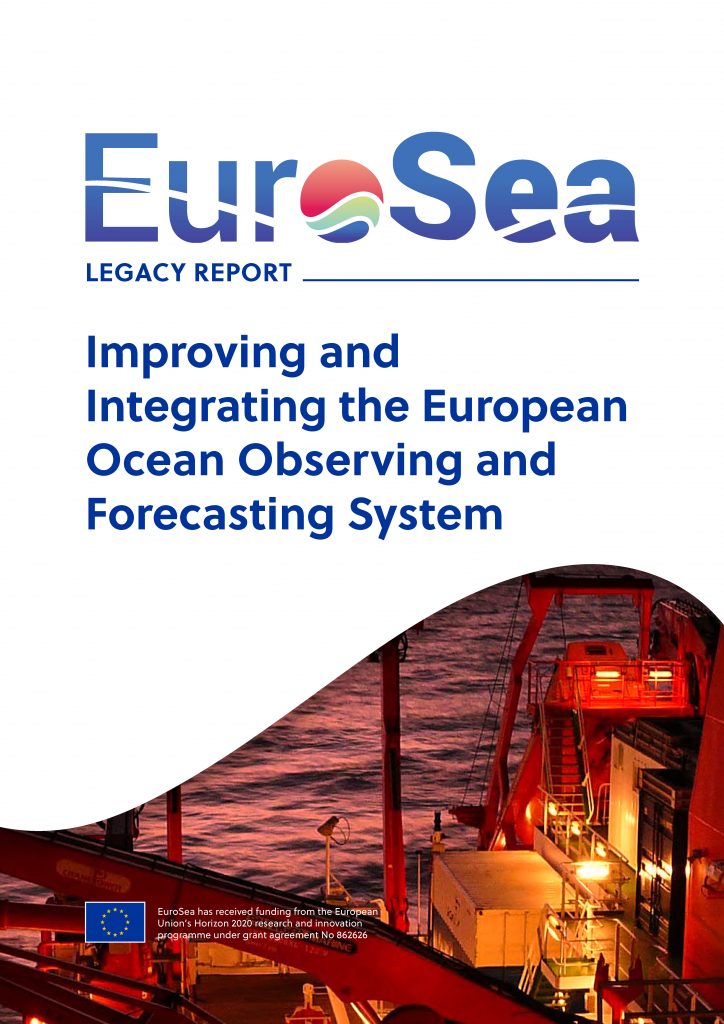 In a stride towards advancing ocean observing and forecasting, EuroSea, a large-scale project initiated in November 2019, culminates its four-year journey with the release of its Legacy Report. This comprehensive report charts EuroSea’s impact on the European Ocean Observing System (EOOS) and Europe’s modelling, forecasting, and services. EuroGOOS was deeply involved in the project, co-leading three work packages.
In a stride towards advancing ocean observing and forecasting, EuroSea, a large-scale project initiated in November 2019, culminates its four-year journey with the release of its Legacy Report. This comprehensive report charts EuroSea’s impact on the European Ocean Observing System (EOOS) and Europe’s modelling, forecasting, and services. EuroGOOS was deeply involved in the project, co-leading three work packages.
The EuroSea Legacy Report advocates for a holistic and integrated approach. From strengthening EOOS and supporting the Global Ocean Observing System (GOOS) to fostering innovations in blue economy and influencing policymaking, EuroSea has made a significant impact on the landscape of marine knowledge. The project’s legacy extends beyond technological advancements, emphasizing the importance of cooperation, coordination, and a sustained, informed approach.
The report emphasizes EuroSea’s commitment to delivering Findable, Accessible, Interoperable, and Reusable (FAIR) ocean data, enhancing modelling and forecasting capabilities, and consolidating these advancements into user-focused services. The collaborative efforts of over 160 EuroSea experts representing 53 organizations from 16 countries have contributed to the project’s impacts – most powerful of them have been featured in the Legacy Report.
Since its start, EuroSea has been analysing its progress towards the impacts we have set out to achieve. EuroSea’s impact monitoring has been distilled to all areas of work and monitored through consortium workshops, stakeholder webinars, tracking, and reporting. This pioneering effort in European ocean observing and forecasting has set a precedent for future projects.
As the EuroSea project concludes, the Legacy Report not only commemorates its achievements but also sets the stage for a more effective, efficient, and impactful future in ocean observing and forecasting. The findings, recommendations, and best practices outlined in the report offer valuable insights for advancing marine knowledge and sustaining a science-based blue economy on a global scale.
Download the EuroSea Legacy Report here
The post EuroSea Legacy Report unveils transformative impact on European ocean observing & forecasting appeared first on EuroGOOS.
MonGOOS Annual Meeting and OceanPrediction DCC Workshop
The annual MonGOOS General Assembly and the OceanPrediction DCC Mediterranean and Black Sea Regional Team Workshop were held on 14-16 November, for the first time since the foundation of MonGOOS, in an African country (Tangier – Morocco), kindly hosted by Abdelmalek Essaâdi University.
The main objective of this workshop was to provide a comprehensive overview of the current state of the art of forecasting capabilities and applications for the Mediterranean Sea, in order to identify gaps and ways forward.
As part of MonGOOS’ vision to share knowledge, this year they co-hosted a session with researchers from the SEAMLESS project that provided students, early career scientists, and experienced participants with hands-on training on data assimilation in marine biogeochemistry using the “Ensemble Assimilation Tool” developed by the project for the Mediterranean Sea.
The post MonGOOS Annual Meeting and OceanPrediction DCC Workshop appeared first on EuroGOOS.
EuroGOOS International Conference Statement
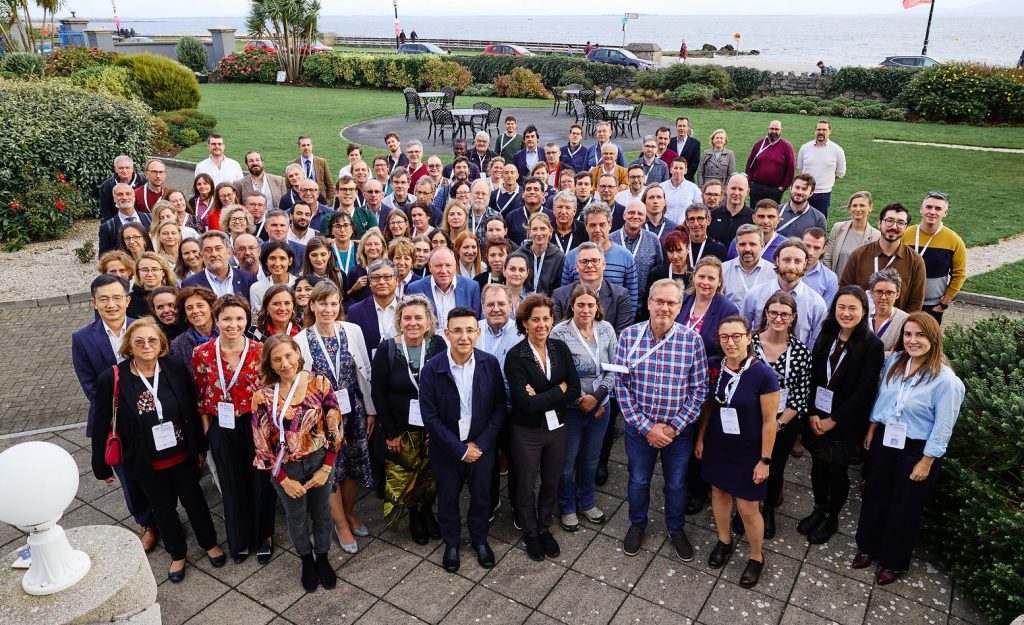 From 3 to 5 October 2023, EuroGOOS held its 10th International Conference, hosted in Galway by the Marine Institute, Ireland. The Conference, titled European Operational Oceanography for the Ocean we want – Addressing the UN Ocean Decade Challenges, was an endorsed Ocean Decade event.
From 3 to 5 October 2023, EuroGOOS held its 10th International Conference, hosted in Galway by the Marine Institute, Ireland. The Conference, titled European Operational Oceanography for the Ocean we want – Addressing the UN Ocean Decade Challenges, was an endorsed Ocean Decade event.
The event brought together over 160 participants for an in-person Conference covering all aspects of operational oceanography and its societal relevance. The Conference was opened by the Interim CEO of the Marine Institute Michael Gillooly, Executive Secretary of the Intergovernmental Oceanographic Commission of UNESCO Vladimir Ryabinin, Director for Maritime Policy & Blue Economy at the European Commission DG MARE Delilah Al Khudairy, and Head of Unit Healthy Seas and Ocean at the European Commission DG Research and Innovation Elisabetta Balzi.
The Conference Statement, summarizing the conference presentations and discussions, leads EuroGOOS and its large community in the coming years. The Statement puts forward the following key messages and recommendations:
- Operational oceanography in Europe must develop with a holistic Earth system approach. The operational oceanography value chain must be better connected to those of other environmental domains (terrestrial, hydrological, atmospheric, cryospheric, climate, etc.) as well as socio-economic information systems. This must be a focus of effort, while simultaneously continuing to strengthen the ocean-specific capabilities that are the core of the European operational oceanography community.
- Without observations, ocean services and products are not possible. Ocean observations play a vital role in delivering essential marine services and products relied upon by users in Europe and worldwide, including forecasts, data products, and model outputs on a daily basis. The continued development of the European Ocean Observing System (EOOS) as the Europe-wide coordinated system to observe the ocean is a collective ambition of the highest priority. Sustainability (in all regards, including resourcing and environmental impact) is key to the long-term prospects of coordinated ocean observing in Europe.
- Genuine co-design of operational oceanography with users and stakeholders is needed to ensure their needs are met. For operational oceanography to be fit for purpose and truly meet societal needs, stakeholder engagement, and co-design of the system with users from the outset must become the standard practice. Only through properly planned and resourced (funds and time) engagement and co-design activities, including iterative review according to new and emerging needs, can operational oceanography fully deliver its benefits to Europe and the world. Ocean Literacy is a key component, without which co-design and stakeholder engagement cannot reach their full potential.
- There is no operational oceanography without people – the skilled individuals without whom there would be no ocean observations, infrastructure and data management, or forecasts and services. Observing platforms or data by themselves cannot deliver the ocean knowledge, products and services Europe needs. Providing adequate resources to the human capacities is key. Enhanced training and education are needed, along with opportunities to ensure operational oceanography is an attractive career path, whether in a scientific, technical, managerial, or other domains.
- Boost and demonstrate the value of operational oceanography to all stakeholders across the marine knowledge value chain. Understanding of the value of ocean observing and operational oceanography must not be taken for granted. Communication, awareness raising, and the demonstration of economic value are needed to strengthen the case for observations. These are an essential part of Europe’s efforts to meet the needs of users in the blue economy and deliver on climate and biodiversity targets.
Full Statement is available below:
The post EuroGOOS International Conference Statement appeared first on EuroGOOS.
EuroGOOS HFRadar Task Team Newsletter: “Taking the pulse of the coastal ocean”
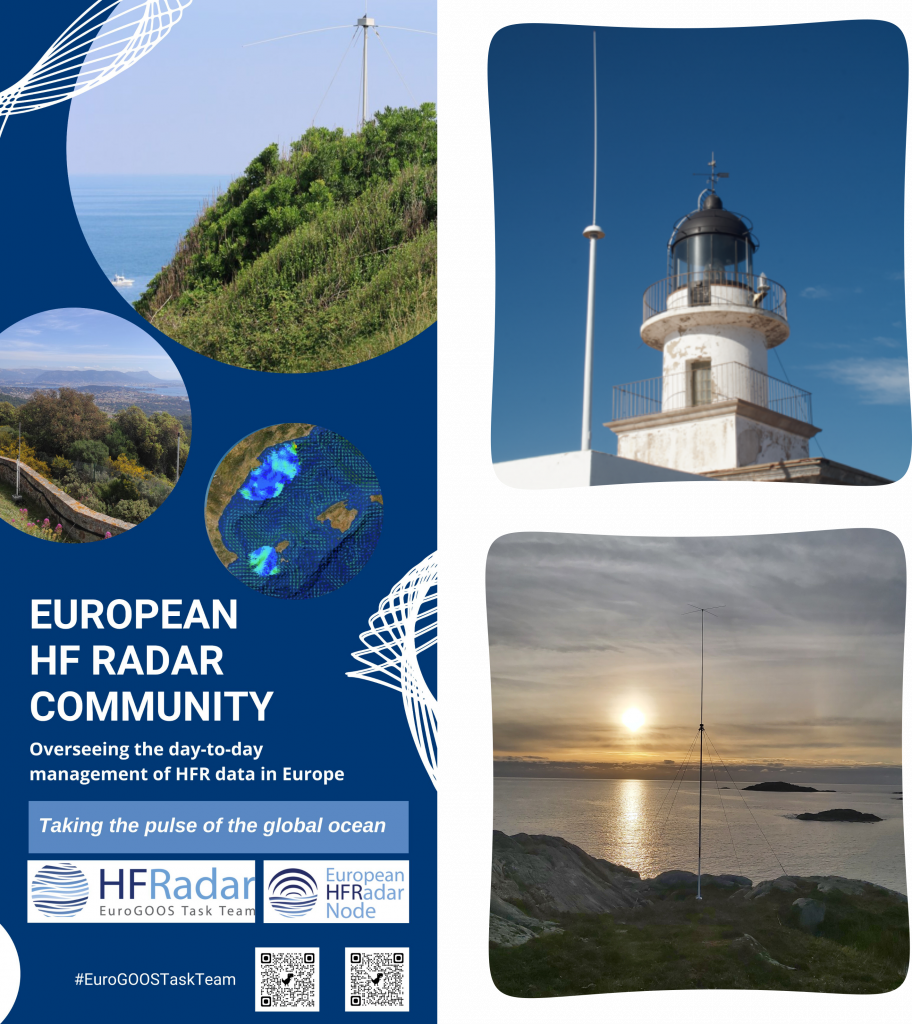 High-frequency radar (HFR) is a unique technology mapping ocean surface currents and wave fields (along with other variables) over wide areas with high spatial and temporal resolution. HFR is cost-effective, requiring only small manpower and technical costs.
High-frequency radar (HFR) is a unique technology mapping ocean surface currents and wave fields (along with other variables) over wide areas with high spatial and temporal resolution. HFR is cost-effective, requiring only small manpower and technical costs.
The EuroGOOS High Frequency Radar Task Team (HFRadar) helps coordinate the European activities around the development and use of this coastal technology. The Task Team is providing a European HFR operational network delivering data and products for science, environmental management, and operational needs, towards an integrated European Ocean Observing System (EOOS).
Discover the latest activities such as: the launch of the European HF Radar Node new website, open and forthcoming calls, job opportunities and much more in their latest newsletter: https://bit.ly/3tN1vJC
The post EuroGOOS HFRadar Task Team Newsletter: “Taking the pulse of the coastal ocean” appeared first on EuroGOOS.
DOORS Steering Committee and country leaders meeting
DOORS (Developing Optimal and Open Research Support for the Black Sea) Steering Committee met with the project’s country leaders from Georgia, Ukraine, Türkiye, Romania, and Bulgaria on 18-19 October in the headquarters of DOORS coordinator GeoEcoMar in Bucharest. The meeting followed a celebratory conference for the 30th anniversary of GeoEcoMar, which took place on 17 October. DOORS is developing optimal and open research base for sustainable Black Sea economy through enhancement of ocean knowledge and information value chain, development of blue economy, capacity building, and societal engagement. EuroGOOS is leading work package on stakeholder engagement. The Steering Committee and DOORS country leaders discussed the three DOORS programmes: System of Systems, Blue Growth Accelerator, and Knowledge Transfer and Training. The meeting also discussed the 1st DOORS Stakeholder Conference to take place in April 2024. The Conference will aim at validating the DOORS preliminary results and promoting sustained project legacy.
Discover more information about this project here.
The post DOORS Steering Committee and country leaders meeting appeared first on EuroGOOS.
Call for papers: International Journal of Data Science and Analytics (Blue-Cloud 2026)
Call for Papers: Special Issue on Data Science and AI in Marine Science and Blue Economy
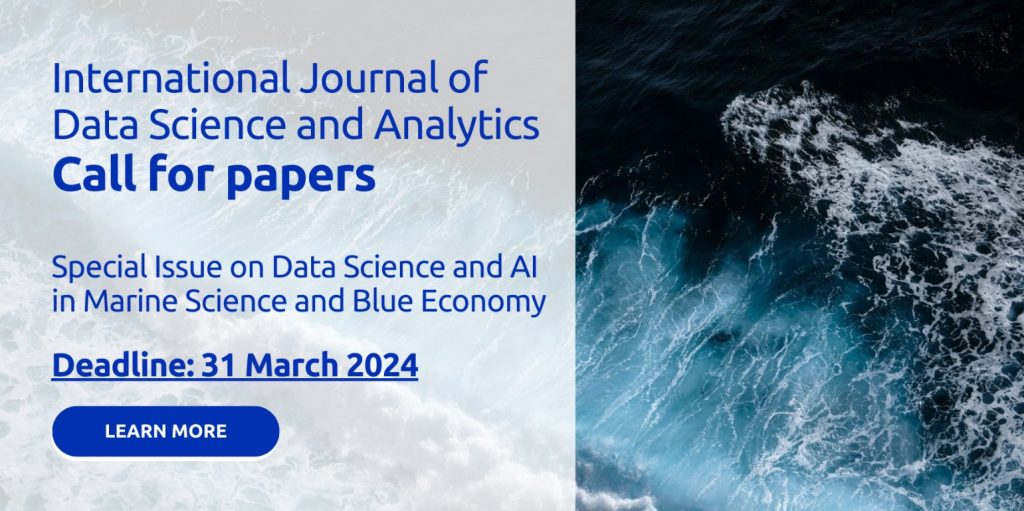 Aims
Aims
Data Science and AI play increasingly critical roles in Marine Science observation, operation and sustainable utilisation. This special issue aims for publishing up-to-date high-quality research and innovation results in all areas related to AI, data science, and scientific workflows in marine science. Contributions promoting Open Science and FAIRness are particularly encouraged.
Topics
All topics related to AI, Data Science, and Scientific Workflows including statistical and mathematical modelling, knowledge representation and discovery, machine learning, deep learning, simulation and visualisation, and innovative tasks composition for the acquisition, integration, reduction, visualisation, and publication of data in marine-related application contexts are welcome.
Papers may address the interdisciplinary vision, position, review and significant theoretical and practical contributions to synergise AI, Data Science and machine/deep learning with marine science and to innovate new-generation systems and services. This includes but is not limited to new theoretical and technical advancements as well as novel and significant real-world applications. Open Science and FAIRness approaches deserve a special mention. Survey, position and vision papers are also welcome.
Submissions
Submissions must be original, not published and not currently under review. Submissions should include a contribution statement on their significant and original contributions in the context of the state-of-the-art progress. Journal versions of previously published conference papers must include substantially new content and such new content should be properly highlighted at submission time.
Submissions will be reviewed when they appear in the editorial system. Accepted papers will be online published before included in the hard copies of the special issue.
- Papers should be formatted in the JDSA template and submitted to JDSA at https://www.editorialmanager.com/jdsa/default.aspx
- There is no page limitation.
- Please follow the author’s instructions of JDSA at the journal website https://www.springer.com/journal/41060/submission-guidelines?IFA in preparing your papers.
Final submission deadline 31 March 2024 (strict deadline), submit your manuscript here.
The post Call for papers: International Journal of Data Science and Analytics (Blue-Cloud 2026) appeared first on EuroGOOS.
Launch of Vigo Declaration: “Speaking with One Voice to achieve the One Ocean we want” at EurOCEAN
The EurOCEAN Conference took place on 10-11 October 2023 as an in-person event at the Auditorio y Palacio de Congresos Mar de Vigo, Vigo, Galicia, Spain, as a forum for the marine and maritime research community and wider stakeholders to interface with European and Member State policymakers and strategic planners. The aim of the EurOCEAN 2023 science-policy conference was to highlight the synergies between the EU Mission: Restore our Ocean and Waters by 2030, other EU research and innovation, and management initiatives, and the UN Decade of Ocean Science for Sustainable Development. EurOCEAN 2023 attracted marine policy makers, marine scientists, science stakeholders and communicators, maritime industry representatives and European and national decision makers and programme managers, i.e. those that set, manage and implement the marine science agenda.
On Wednesday 11 October, the Vigo Declaration was presented and signed by our Chair Henning Wehde among the EurOCEAN2023 co-organisers. The Vigo Declaration “Speaking with One Voice to achieve the One Ocean we want” calls for:
- Integrated land-sea policies and management
- Sustained and better coordinated Ocean observation
- Increased citizen engagement
Read the full text of Vigo Declaration here.
The post Launch of Vigo Declaration: “Speaking with One Voice to achieve the One Ocean we want” at EurOCEAN appeared first on EuroGOOS.
Become a European Blue School: Applications open!
European Blue Schools bring the ocean into the classroom. On the journey to becoming a European Blue School, teachers and pupils will improve their understanding of the ocean and develop a sense of responsibility towards our shared planet. Creating awareness and a feeling of responsibility for our ocean (so-called Ocean Literacy) encourages students to become more active and responsible European and global citizens.
The program challenges schools to Find the Blue and explore their connections to the ocean while creating networks all across Europe. The Network of European Blue Schools is an initiative of the European Commission, supported by DG MARE and was developed by the EU4Ocean Coalition partners.
Why become a European Blue School?
Schools that take up the Find the Blue challenge shall identify an ocean-based topic that is relevant to their students, and collaborate with their pupils to create a school project. The aim is to make the ocean a relevant part of the school curriculum through project-based learning. Student ownership, collaborations with other organizations and people involved with the ocean and creating a community with the same passion will be key values of these projects. By successfully completing the Find the Blue challenge, schools will receive a European Blue School certification.
All certified European Blue Schools become part of the Network of European Blue Schools, where teachers and students:
- Become agents of change for ocean sustainability;
- Share experiences with teachers and students from other schools;
- Connect to the wider ocean literacy community.
 Apply by 15 December here
Apply by 15 December here
The post Become a European Blue School: Applications open! appeared first on EuroGOOS.
EuroGOOS Ocean Literacy Working Group session at the 10th EuroGOOS International Conference
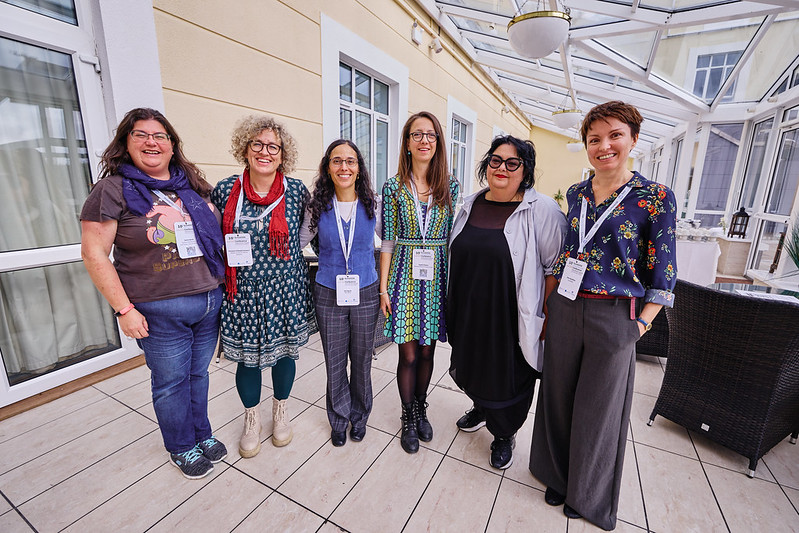
EuroGOOS Ocean Literacy Working Group members at the 10th EuroGOOS International Conference, 4/10/2023, Galway; from left: Noirin Burke (Irish Ocean Literacy Network), Yolanda Koulouri (HCMR, Greece), Ana Aguiar (Met Office, UK), Angela Pomaro (CNR, Italy), Cushla Dromgoolregan (Camden Trust), Dina Eparkhina (EuroGOOS)
The EuroGOOS Ocean Literacy Working Group organized a successful session at the 10th EuroGOOS International Conference in Galway, Ireland (3-5 October 2023).
The session featured talks about lessons learnt in several ocean literacy activities. In addition, the session discussed the future EuroGOOS Ocean Literacy Working Group training for scientists to engage in ocean literacy. A survey with the Conference participants was conducted to gather data for the discussion. The survey demonstrated a significant interest in such training and gave ideas about the form and focus.
As part of the Conference social programme, the Galway Atlantaquaria held a reception in its premises to popularize societal engagement as an important area of the work of scientific institutions. The reception, co-organized with the EuroGOOS Office, included short inspirational talks, a music concert, and special EuroGOOS scavenger hunt and games, and story telling.
Discover more about the Conference in this news piece.
The post EuroGOOS Ocean Literacy Working Group session at the 10th EuroGOOS International Conference appeared first on EuroGOOS.
10th EuroGOOS International Conference – main outcomes
 From 3 to 5 October 2023, EuroGOOS held its 10th International Conference, hosted in Galway by the Marine Institute, Ireland. The Conference, titled European Operational Oceanography for the Ocean we want – Addressing the UN Ocean Decade Challenges, was an endorsed Ocean Decade event.
From 3 to 5 October 2023, EuroGOOS held its 10th International Conference, hosted in Galway by the Marine Institute, Ireland. The Conference, titled European Operational Oceanography for the Ocean we want – Addressing the UN Ocean Decade Challenges, was an endorsed Ocean Decade event.
The event brought together over 160 participants for an in-person Conference covering all aspects of operational oceanography and its societal relevance. The Conference was opened by the Interim CEO of the Marine Institute Michael Gillooly, Executive Secretary of the Intergovernmental Oceanographic Commission of UNESCO Vladimir Ryabinin,
Director for Maritime Policy & Blue Economy at the European Commission DG MARE Delilah Al Khudairy, and Head of Unit Healthy Seas and Ocean at the European Commission DG Research and Innovation Elisabetta Balzi.
Four high-level plenary sessions were dedicated to the UN Ocean Decade, Digital Twin Ocean, European Ocean Observing System (EOOS), and Future Look. In addition, the Conference participants discussed over 80 presentations and 20 posters on all areas of operational oceanography.
The event marked the 10th anniversary of the international EuroGOOS Conference and nearly 30 years of the EuroGOOS organization, which was founded in 1994 as the European implementer of the Global Ocean Observing System (GOOS) of the UNESCO’s Intergovernmental Oceanographic Commission.
The Conference Statement, summarizing the conference presentations and discussions, will lead EuroGOOS and its large community in the coming years. The Statement puts forward the following key messages and recommendations:
- Operational oceanography in Europe must develop with a holistic Earth system approach. The operational oceanography value chain must be better connected to those of other environmental domains (terrestrial, hydrological, atmospheric, cryospheric, climate, etc.) as well as socio-economic information systems. This must be while continuing to strengthen the ocean-specific capabilities that are the core of the European operational oceanographic community.
- Without observations ocean services and products are not possible. The realisation of EOOS is essential, and is the foundation of ocean knowledge in Europe.
- Observe what is needed, not just what is possible. For operational oceanography to be fit for purpose and truly meet societal needs, stakeholder engagement and genuine co-design of the system with users from the outset must become the standard practice.
- Boost and demonstrate the value of operational oceanography to all stakeholders across the whole value chain, strengthening the business case for the necessary developments.
Full Statement and the Conference proceedings will be available soon on the website.
The event also awarded two prizes to early-career researchers for the scientific excellence, innovation, societal relevance, and quality of their presentations. Katharina Kordubel received the best oral presentation award and Daniel Koestner received the best poster presentation award.
On the occasion of the Conference, EuroGOOS released an online history pages illustrated through infographics. The text was written by the Marine Institute’s bursary Seoirse Swanton based on a comprehensive research of the EuroGOOS documents and several interviews.
Conference networking events included a vibrant tour of the Galway Atlantaquaria with inspirational talks from scientists working in ocean literacy, storytelling and games, a special EuroGOOS scavenger hunt, and a reception with food, drinks, and music. On the second day, the Conference dinner featured a concert of Irish traditional music and dancing and a EuroGOOS 10th Conference anniversary cake specially decorated for the occasion.
The Conference concluded with a handover from the Marine Institute to the Cyprus Marine and Maritime Institute, CMMI, who will host the 11th EuroGOOS International Conference in 2026 in Larnaka.
Discover the Conference through images in the gallery below.
The post 10th EuroGOOS International Conference – main outcomes appeared first on EuroGOOS.
Global Coastal Ocean Experiment – Call for Pilot Sites to implement transformational GlobalCoast activities!
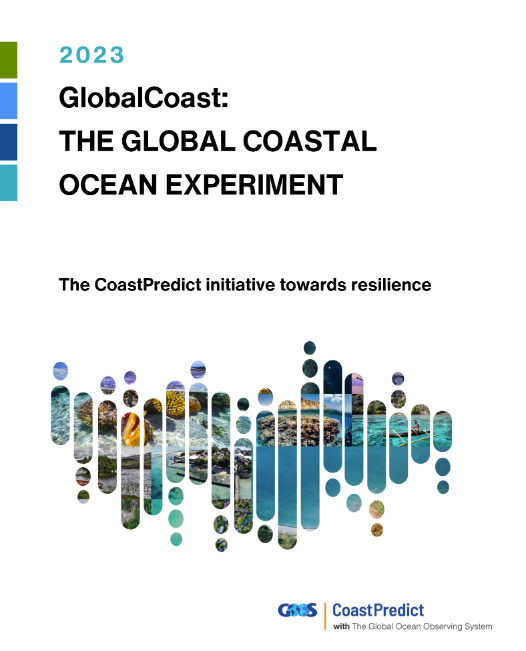 The Global Coastal Ocean Experiment is an initiative of the CoastPredict Programme of the UN Decade of Ocean Science for Sustainable Development 2021-2030 (UN Ocean Decade). GlobalCoast is a central framework for the coordination and practical implementation of the CoastPredict Programme.
The Global Coastal Ocean Experiment is an initiative of the CoastPredict Programme of the UN Decade of Ocean Science for Sustainable Development 2021-2030 (UN Ocean Decade). GlobalCoast is a central framework for the coordination and practical implementation of the CoastPredict Programme.
GlobalCoast will coordinate implementation and integration of the science and technology advances from the CoastPredict focus areas in a range of regions using best practice principles in ocean observing, data management, modeling and co-design. This will provide advanced knowledge and innovative products and services to support coastal community resilience, and will develop the basis to re-characterize the Global Coastal Ocean.
The GlobalCoast survey is seeking to collect expressions of interest to lead or collaborate on Pilot Sites will be selected within regions of the global coastal ocean. These regions have specific large scale oceanographic regimes that might contain a number of different coastal, hydrological and ecosystem regimes. The selected Pilot Sites will be implemented by the CoastPredict Programme.
- Fill out the survey now (deadline 4 October 2023)
- Brochure about the GlobalCoast Ocean Experiment – download
- Read more about CoastPredict – here
The post Global Coastal Ocean Experiment – Call for Pilot Sites to implement transformational GlobalCoast activities! appeared first on EuroGOOS.
FAIR Data Principles 1: Foundational components, best practices and standards
This webinar is the first in a series of three Blue-Cloud 2026 Training Academy webinars on FAIR Data Principles, to be held from September 2023 to March 2024.
The FAIR Guiding Principles for scientific data management and stewardship were first published in Scientific Data, 3:160018 [Wilkinson et al (2016)]. The principles apply to both data and metadata and are: Findable, Accessible, Interoperable, Reusable. They put specific emphasis on enhancing the ability of machines to automatically find and use the data, in addition to supporting its reuse by individuals. In pursuit of FAIR, there is a need for increased efforts in optimisation, standardisation, best practices and harmonisation across methodologies for ocean data management, applications and digital assets,
Webinar 1 will explore the challenges and solutions in applying the FAIR foundational components on the journey from FAIR Principles to FAIR Practices to achieve FAIRification in the marine data community. It will look at the standards and practices supporting interoperability and efficiency which focus on the findability and accessibility of data/metadata. Standards and best practices play a crucial role in implementing the FAIR Principles by providing a consistent framework and guidelines to achieve FAIRness targets. Approaches will vary, depending on the data lake, data space or repository structure and capabilities.
The post FAIR Data Principles 1: Foundational components, best practices and standards appeared first on EuroGOOS.
EuroGOOS Office is looking for a Financial Administrator
The EuroGOOS Office seeks a Financial Administrator to support the EuroGOOS team in activities linked to the secretariat general administration and EU project/contract finances.
The position is for 4 years based in Brussels at the EuroGOOS Office.
If you would like to apply for this position, please send your CV and a letter of motivation in English explaining why you are interested and why you are suitable for this role to Dr. Inga Lips, EuroGOOS Secretary General, by 27 August 2023.
.well.c2a3 .btn {
padding: 11px 30px;
font-size: 11pt;
}
.well.c2a3 .media-body {
font-size: 11pt;
margin-left: -15px;
}
.well.c2a3 .wpdm_icon {
height: 20px;
width: auto;
min-width: 28px;
max-width: 28px;
}
.well.c2a3 {
padding: 0;
background: transparent;
}
.well.c2a3 a {
color: #7BA6D8 !important;
}
.text-muted.fsize {
color: #7BA6D8 !important;
margin-left: 5px;
}
The post EuroGOOS Office is looking for a Financial Administrator appeared first on EuroGOOS.
EuroGOOS Office is looking for an Office/Financial Administrator
The EuroGOOS Office seeks an Office/Financial Administrator to support the EuroGOOS team in activities linked to the secretariat general administration and EU project/contract finances.
The position is for 4 years based in Brussels at the EuroGOOS Office, with the possibility of extension.
If you would like to apply for this position, please send your CV and a letter of motivation in English explaining why you are interested and why you are suitable for this role to Dr. Inga Lips, EuroGOOS Secretary General, by 27 August 2023.
.well.c2a3 .btn {
padding: 11px 30px;
font-size: 11pt;
}
.well.c2a3 .media-body {
font-size: 11pt;
margin-left: -15px;
}
.well.c2a3 .wpdm_icon {
height: 20px;
width: auto;
min-width: 28px;
max-width: 28px;
}
.well.c2a3 {
padding: 0;
background: transparent;
}
.well.c2a3 a {
color: #7BA6D8 !important;
}
.text-muted.fsize {
color: #7BA6D8 !important;
margin-left: 5px;
}
The post EuroGOOS Office is looking for an Office/Financial Administrator appeared first on EuroGOOS.
EuroGOOS Ocean Literacy Working Group & UN Ocean Decade project at the IUGG 2023
The EuroGOOS Ocean Literacy activities will be promoted at the IUGG 2023 – the General Assembly of International Union of Geodesy and Geophysics, taking place in Berlin from 11 to 20 July 2023. Co-chair of the EuroGOOS Ocean Literacy Working Group Angela Pomaro (CNR, Italy) will give a talk on behalf of the activity. Science alone cannot provide the solutions to the challenges we face – we need wider society to actively contribute. This has pushed forward the need for more ocean literacy. EuroGOOS Scientists for Ocean Literacy project of the UN Decade of Ocean Science for Sustainable Development 2021-2030, developed through the Ocean Literacy Working Group, aims to empower scientists to actively engage with society and foster sustainable behaviour. The project expands the horizon of science communication towards a multi-stakeholder and multi-disciplinary dialogue, while building on the existing best practices of the European oceanographic and meteorological agencies.
Ocean literacy raises awareness about our connection with the ocean and promotes co-creation of solutions to environmental degradation. Scientists should be working hand in hand with other professionals, specialists and educators in developing impactful ocean literacy activities. Furthermore, this would produce a fertile ground for co-creation among disciplines and sectors. Ocean literacy must be recognized as an important aspect of the work of research institutions and supported in scientific careers (Eparkhina et al, EuroGOOS, 2021).
The EuroGOOS Ocean Decade project and Ocean Literacy Working Group implemented at pan-European level and with partners from the Atlantic, Mediterranean, and the Arctic regions, have helped generate new synergies and are supporting the efforts of UNESCO-IOC and the European Commission’s EU4Ocean Coalition. A new addition to the Scientists for Ocean Literacy project is the establishment of the DOORS Ocean Literacy Network in 2023. The Network brings together academia, universities, NGOs, and communicators to promote the understanding of the scientific project results and foster ocean culture among the Black Sea citizens of all ages.
The post EuroGOOS Ocean Literacy Working Group & UN Ocean Decade project at the IUGG 2023 appeared first on EuroGOOS.
EuroGOOS promotes Ocean Literacy at the 28th IUGG General Assembly
EuroGOOS Ocean Literacy Working Group and the Scientists for Ocean Literacy UN Decade project will be promoted at the 28th General Assembly of the International Union of Geodesy and Geophysics (IUGG). Successfully implemented at pan-European level and with partners from the Atlantic, Mediterranean, and the Arctic regions, the EuroGOOS ocean literacy work has created new synergies and supported the efforts of UNESCO-IOC and the European Commission’s EU4Ocean coalition. A new addition to the Scientists for Ocean Literacy project is the establishment of the DOORS Ocean Literacy Network in 2023. The Network brings together academia, universities, NGOs, and communicators to promote the understanding of the scientific project results and foster ocean culture among the Black Sea citizens of all ages.
Ocean literacy raises awareness about our connection with the ocean and promotes co-creation of solutions to environmental degradation. Scientists should be working hand in hand with other professionals, specialists and educators in developing impactful ocean literacy activities. Furthermore, this would produce a fertile ground for co-creation among disciplines and sectors. Ocean literacy must be recognized as an important aspect of the work of research institutions and supported in scientific careers (Eparkhina et al, EuroGOOS, 2021).
Science alone cannot provide the solutions to the challenges we face – we need wider society to actively contribute. This has pushed forward the need for more ocean literacy. The EuroGOOS Scientists for Ocean Literacy project of the UN Decade of Ocean Science for Sustainable Development 2021-2030 aims to empower scientists to actively engage with society and foster sustainable behaviour. The project expands the horizon of science communication towards a multi-stakeholder and multi-disciplinary dialogue, while building on the existing best practices of the European oceanographic and meteorological agencies.
The post EuroGOOS promotes Ocean Literacy at the 28th IUGG General Assembly appeared first on EuroGOOS.
EuroGOOS Scientists for Ocean Literacy project at the Ocean Race Grand Finale
The Ocean Race is often described as the longest and toughest professional sporting event in the world, sailing’s toughest team challenge and one of the sport’s Big Three events, alongside the Olympic Games. Since several years, the Ocean Race has been engaged in the collection of the scientific marine data. The regatta boats are equipped with sampling kits collecting data on ocean salinity, sea surface temperature, currents, carbon dioxide, oxygen, trace elements, and microplastics. This programme is run in partnership with leading scientific organizations Ifremer, GEOMAR Helmholtz-Zentrum für Ozeanforschung Kiel, National Oceanic & Atmospheric Administration (NOAA), UK National Oceanography Centre, World Meteorological Organization, CNRS, Meteo France and others, and is part of the UN Decade of Ocean Science for Sustainable Development. The race has collected millions of ocean measurements transmitted to the scientific institutions and open-source marine data systems.
During the week of the Grand Finale in Genoa, Italy, ETT – the local co-organizer of the event and an avid contributor to the European marine data service EMODnet, organized a Marine Data Week, from 27 to 30 June 2023. Our Ocean Literacy activities were promoted by Dina Eparkhina, coordinator of the EuroGOOS Scientists for Ocean Literacy project of the UN Ocean Decade. Dina’s talk highlighted the importance of Ocean Literacy as a crucial societal engagement activity in today’s science. Scientists are best placed to tell the stories of the ocean and share their fascination and passion with the general public. But scientists cannot do this alone – various disciplines and sectors must come onboard with the Ocean Literacy activities of the marine scientific organizations, such as members of EuroGOOS. As shared in the EuroGOOS policy brief on the topic, Ocean Literacy tools and approaches are needed to increase societal and policy awareness of the needs, challenges, and opportunities of the ocean observing enterprise. Ocean Literacy is an important enabler of the better, broader, and more impactful engagement of science with policy and society on the topics of sustainability, research, and the importance of oceanography.
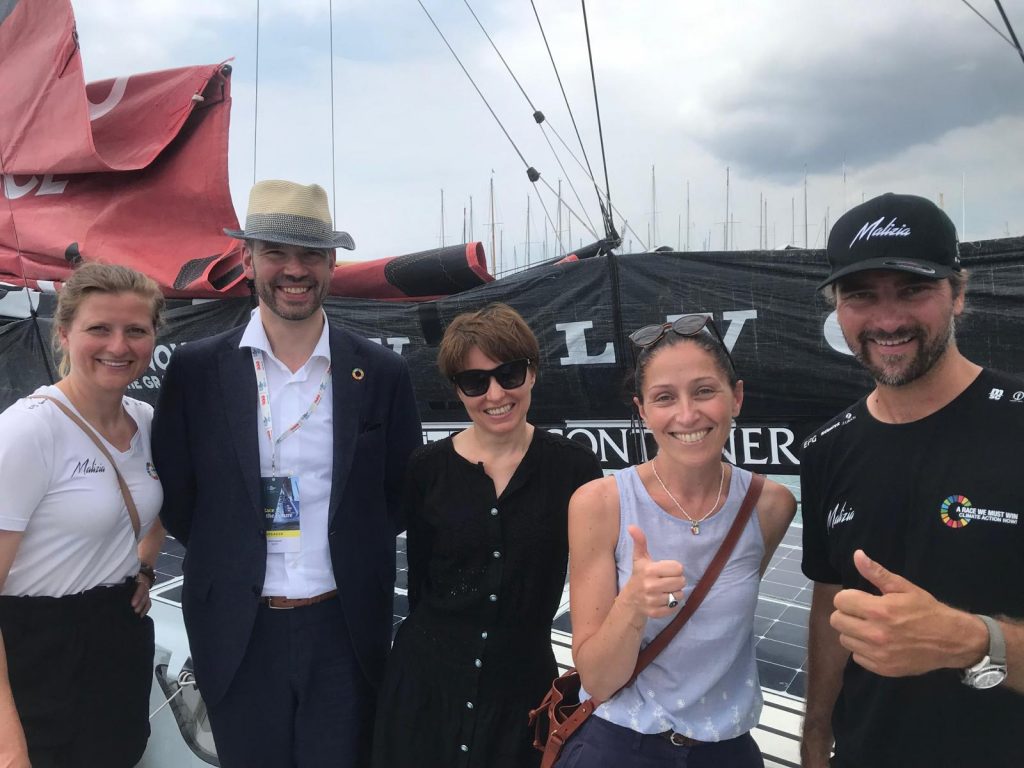
Visit to the Malizia boat at the Ocean Race Grand Finale, from left: Birte Lorenzen (Manager Ocean Education, My Ocean Challenge/Malizia), David Bassett (European Aquaculture Technology and Innovation Platform), Dina Eparkhina (EuroGOOS, co-chair of Ocean Literacy Working Group), Emanuela Rusciano (GOOS-OceanOPS, member of Ocean Literacy Working Group), Boris Herrmann (Malizia’s skipper), 29 June 2023, Genoa, Italy
The post EuroGOOS Scientists for Ocean Literacy project at the Ocean Race Grand Finale appeared first on EuroGOOS.
EuroGOOS joins Ocean Race Grand Finale in Genoa
EuroGOOS will join the European marine knowledge community for the Ocean Data Week, organized by ETT during the Ocean Race Grand Finale in Genoa from 27 to 30 June 2023. Conferences and workshops on ocean observing, forecasting, and services for blue economy will attract international audience and give credits to the students of the Genoa University.
- On 27 June, Inga Lips, EuroGOOS Secretary General, will join the NAUTILOS Policy Round Table ‘Supporting Ocean Observations’.
- On 28 June, Inga Lips will join the EuroSea day titled ‘Towards a user-focused, interdisciplinary, and responsive European ocean observing and forecasting system’. This one-day conference will be moderated by Dina Eparkhina, EuroGOOS Senior Policy and Communications Officer.
- On 29 June, the EuroGOOS work on ocean literacy and public engagement will be promoted in the session on ‘Between biodiversity and sustainability: science to raise awareness, awareness to guide decisions’ in Dina Eparkhina’s setting the scene talk.
The Ocean Data Week will feature short and engaging presentations from key European initiatives in the domain of ocean knowledge and information. Public authorities, policymakers, universities, research centers, and maritime industries are invited to attend and contribute to this debate.
Registration is ongoing here
Programme is available here
The post EuroGOOS joins Ocean Race Grand Finale in Genoa appeared first on EuroGOOS.
EuroGOOS Fixed Platforms Task Team organised its first on-site meeting since its kick-off
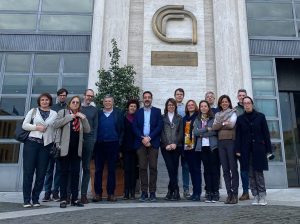 The EuroGOOS Fixed Platform Task Team (FPTT) organised on 4 and 5 April 2023 its first on-site meeting since its kick-off in March 2021. The meeting was hosted by CNR in Rome, Italy, and was co-organised by the EuroGOOS office and EMSO-ERIC. The 2-days meeting was followed onsite by 16 attendees and more than 10 remotely. First day, during a closed session, the group performed a SWOT analysis of the Task Team, and the objectives and goals were revised and discussed, as well as a leaflet promoting the Task Team. The results from the first day were presented the second day in an open session which included short presentations from different national, European and global initiatives, projects and programs related with Fixed Platforms, data sharing and observing infrastructure governance (presentations available here) highlighting the potential synergies and collaboration between those initiatives and the Fixed Platform Task Team. The meeting ended with a discussion on next steps and actions to promote the activities of the Task Team.
The EuroGOOS Fixed Platform Task Team (FPTT) organised on 4 and 5 April 2023 its first on-site meeting since its kick-off in March 2021. The meeting was hosted by CNR in Rome, Italy, and was co-organised by the EuroGOOS office and EMSO-ERIC. The 2-days meeting was followed onsite by 16 attendees and more than 10 remotely. First day, during a closed session, the group performed a SWOT analysis of the Task Team, and the objectives and goals were revised and discussed, as well as a leaflet promoting the Task Team. The results from the first day were presented the second day in an open session which included short presentations from different national, European and global initiatives, projects and programs related with Fixed Platforms, data sharing and observing infrastructure governance (presentations available here) highlighting the potential synergies and collaboration between those initiatives and the Fixed Platform Task Team. The meeting ended with a discussion on next steps and actions to promote the activities of the Task Team.
The post EuroGOOS Fixed Platforms Task Team organised its first on-site meeting since its kick-off appeared first on EuroGOOS.
Nominations are open for Kostas Nittis Award 2023
Each year, EuroGOOS celebrates an early-career researcher in operational oceanography, marine safety, climate change, ecosystems and ocean health with a grant of € 3,000. The Kostas Nittis Award was established in the memory of EuroGOOS Secretary General and strategic leader Dr. Kostas Nittis (1964-2014).
Successful applicants will have the opportunity to present their work at international conferences and events, expand their professional networks, and reach out to potential research partners and future employers.
Who should apply?
Eligible candidates should be:
- Under 30 on the day of the nomination deadline
- Student at a Master of Science, PhD level, or recent PhD, carrying out research or innovation
projects in climate change, marine safety, ecosystem and ocean health, or operational oceanography (ocean observations, ocean data, numerical modelling, operational ocean services, etc.) - Nominated by current EuroGOOS members
Detailed information on the application process is available here
Deadline for submissions: 5 May 2023.
The post Nominations are open for Kostas Nittis Award 2023 appeared first on EuroGOOS.
EMD 2023 Workshop Sustainable ocean observation: shared responsibilities
We are pleased to co-organize a European Maritime Day (EMD 2023) workshop ‘Sustainable ocean observation, from open sea to coast: shared responsibilities‘, to take place on on 25 May 2023 at 14.30 – 15.45 CET. The event is co-organized by Ifremer, Eurofleets+, Euro-Argo ERIC, Esprit de Velox, EMODnet, EOOS, and EuroGOOS.
In the face of climate change and loss of biodiversity for which the ocean is steering the future of our planet, ocean observation is key to preserving the ocean as a common good of humanity and to deliver the European Green Deal. Today, European ocean observing is not sustainable, lacks coordination and support, and its trajectory is not convergent with the greenhouse gas reduction targets by 2050. It is relying on marine research infrastructures and observing networks mostly financed from research resources by nations with a maritime coastline. Despite the obvious progress made in recent years, this cannot satisfy the needs for exponential growth and profound technological refoundation.
Coordinated and optimised for efficiency, cost and intrinsic environmental footprint ocean observation from open sea to coast is paramount for sustained and reliable provision of oceanographic services and information. This workshop will discuss how the ocean observing stakeholders are consolidating efforts to limit the duplication and promote long-term coordination and sustainability. We will discuss the challenges we face and solutions our communities offer in delivering a common ocean observation strategy.
Register to EMD and our workshop (25 May, 14.30-15.45) here
The post EMD 2023 Workshop Sustainable ocean observation: shared responsibilities appeared first on EuroGOOS.
ASSW 2023 meeting: Towards an Arctic GRA
During the Arctic Science Summit Week (ASSW) 2023 in Vienna, EuroGOOS and Arctic ROOS, together with international partners, held a roundtable meeting to discuss the prospect of developing a GOOS Regional Alliance (GRA) for the Arctic. The meeting summarised the current landscape of ocean and sea ice observing networks and systems in the Arctic, presented results of SWOT (strengths, weaknesses, opportunities, threats) analysis of developing an Arctic GRA, and an overview of existing GRAs established within the GOOS system. Discussions followed on why an Arctic GRA is needed, what it could potentially look like, and how to work towards it.
The consensus of meeting participants was that an Arctic GRA, or other pan-Arctic alliance for ocean observing, is needed. Emphasis was made on the need to involve different stakeholders in the design of such a system from the beginning, with particular involvement of Arctic Indigenous communities and other users. A task team will be established to develop a process towards realisation of an Arctic GRA, with key milestones for broad community input planned at the Arctic Circle Assembly in October 2023 and the Arctic Observing Summit in March 2024.
The post ASSW 2023 meeting: Towards an Arctic GRA appeared first on EuroGOOS.
EuroGOOS International Conference – Call for Abstracts open!
Call for abstracts is open for the EuroGOOS International Conference (3-5 October 2023, Galway). Deadline for submission is 16 April.
This year marks an anniversary edition of the EuroGOOS Conference, which has provided a focal point for European operational oceanography for nearly 30 years. This edition has been endorsed as an official event of the UN Decade of Ocean Science for Sustainable Development 2021-2030.
The Conference will offer an opportunity to discuss how well our ocean monitoring and forecasting are supporting societal and policy needs. The event will facilitate dialogue among a broad range of ocean observing and forecasting stakeholders, towards a fit-for-purpose ocean information delivery.
The key priorities of the 10th EuroGOOS International Conference are:
- Analyse the state of the art and defining emerging priorities in operational oceanography;
- Advance the European Ocean Observing System (EOOS) framework towards the sustainability and integration of in situ observations;
- Develop a seamless forecasting system of the European seas and global ocean;
- Strengthen the responsiveness of European operational oceanography to policy and governance needs;
- Foster engagement of all stakeholders to co-design the European operational oceanography;
- Promote diversity, equity and inclusivity in oceanography and ocean science;
- Integrate European operational oceanography into the global context.
Discover the full call for abstracts on the Conference website: Eurogoos-conference2023.marine.ie.
This event is co-organized by the EuroGOOS Office and the Marine Institute, Ireland. This is an event of the UN Decade of Ocean Science for Sustainable Development 2021-2030.
The post EuroGOOS International Conference – Call for Abstracts open! appeared first on EuroGOOS.
DOORS Ocean Literacy Network kicks off
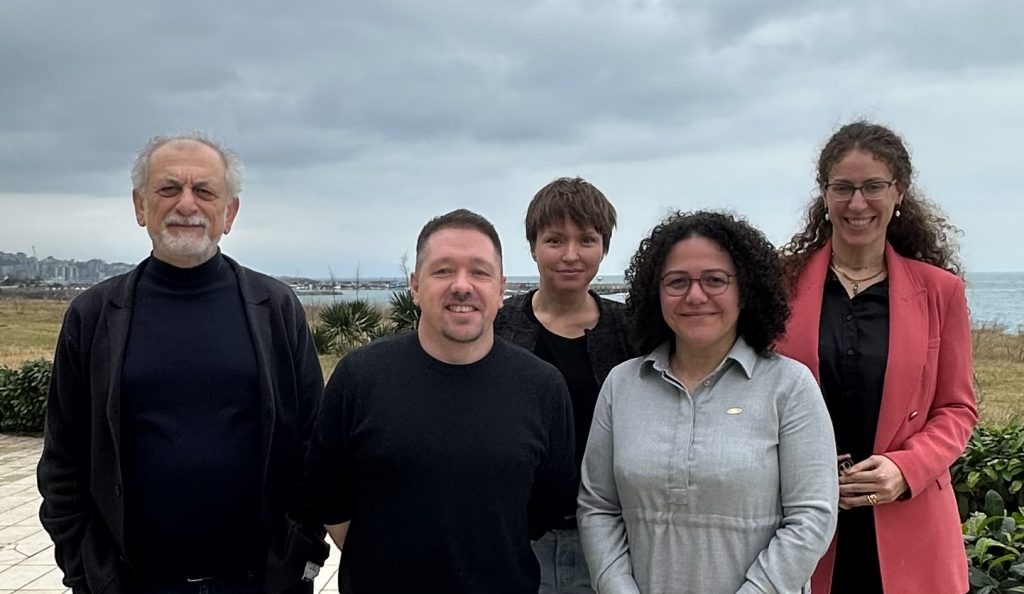
On-site participants of the DOORS Ocean Literacy Network kick-off, 1 February 2023. From left: Kadir Seyhan (DOORS country leader for Türkiye/Karadeniz Technical University), Mike Rea (DOORS Communications Lead/Co-Chair of OL Network), Dina Eparkhina (DOORS Stakeholder Engagement Lead/Co-Chair of OL Network), Sebnem Atasaral (Karadeniz Technical University), and Lydia Papadaki (Athena, Greece)
On 1 February 2023, the DOORS Ocean Literacy Network was kicked off in Trabzon, Türkiye. The Network is co-chaired by Dina Eparkhina of EuroGOOS and Mike Rea, the DOORS communication lead. From the outset, the Network works in synergy with several other European activities on ocean literacy, including the EuroGOOS UN Ocean Decade project Scientists for Ocean Literacy and the European Commission’s EU4Ocean coalition.
Academia, NGOs, and experts in science-policy engagement and science communication have joined the Network, which involves all Black Sea countries participating in DOORS. 16 experts took part in the hybrid kick-off meeting in Trabzon. Additionally, three initiatives were invited to profile their work and discuss opportunities for collaboration. These are EU projects BRIDGE-BS and GES4SEAS and the Cyprus Marine and Maritime Institute. EuroGOOS showcased its ocean literacy activities executed through the Ocean Literacy Working Group, EU4Ocean coalition, and the UN Ocean Decade.
Ocean Literacy has been widely recognized as a strategic enabler to engage with policy and society on the topics of ocean sustainability and blue economy (EuroGOOS, 2021). Ocean Literacy is a cross-cutting enabler in the European Mission Restore our Ocean and Waters 2030. The Mission Starfish proposal states that by 2030 (European Commission, 2020):
- Literacy and knowledge about the water system must be compulsory elements in all science curricula in primary and secondary schools throughout the EU;
- 50 percent of Europeans should have participated in events organised by the pan-European ocean literacy coalition (EU4Ocean);
- At least 50 percent of the European blue workforce will have been upskilled or re-skilled.
According to UNESCO, Ocean Literacy has a twofold goal: to learn more about the world’s ocean, and to contribute to the co-design and co-delivery of solutions to the problems and threats it faces (UNESCO, 2021).
The DOORS Ocean Literacy Network aims to contribute to an increased public awareness about the importance of ocean science and sustainability and the work of DOORS. It will help engage with citizens along the pillars of the Black Sea Strategic Research and Innovation Agenda (Knowledge Bridge, Blue Economy, Key Infrastructure and Policy Enablers, Empowered Citizens and Enhanced Blue Force).
The Network has the following specific objectives:
- Help connecting DOORS science with education, youth, and general public;
- Use DOORS results (or spill-offs of thereof) to demonstrate to the citizens the societal value of the DOORS efforts;
- Develop ‘Science meets Education’ sessions at schools and organise scientific gaming and competitions;
- Develop activities using the existing resources such as marine litter collection programmes and the EuroGOOS Ocean Literacy resources library;
- Contribute to the DOORS efforts popularising ocean science through outreach; and
- Promote the ongoing OL activities by the DOORS Ocean Literacy Network members.
DOORS has been actively promoting its work and results to the public. In addition to ocean literacy, the project has a vibrant science outreach through videos, podcasts and articles, and is developing several citizen science activities. Watch this space for more information as new resources are becoming available on the website and the DOORS social medial accounts: https://www.doorsblacksea.eu/.
The post DOORS Ocean Literacy Network kicks off appeared first on EuroGOOS.
DOORS Multi-Actor Forums for the Black Sea and new Ocean Literacy Network
The EuroGOOS Office is leading stakeholder engagement in the EU DOORS project, Developing Optimal and Open Research Base for the Black Sea. As part of stakeholder engagement, national Multi-Actor Forums (MAF) are held, facilitated by Athena RC, Greece. The events are taking place in Bulgaria, Georgia, Romania, and Türkiye during 2022 and 2023. Scroll down to see some pictures.
The first round of MAF workshops were completed on The World Wetlands Day of 2 February 2023 in Batumi, Georgia. At the Georgian MAF, tourism and fisheries were highlighted as essential socioeconomic sectors in the eastern Black Sea – both Georgia and Türkiye intensively fishing in this part of the Black Sea basin. Coastal hazards have been identified as another important topic for the stakeholders. Pervasive nuisances with coastal erosion will be significantly exacerbated with imminent climate change induced threats, such sea level rise and more frequent coastal floods. Even tornados, almost never heard of in this region, are becoming increasingly common amid climate crisis.
The participating stakeholders of the Romanian MAF, which took place in Constanta on 25 January 2023, prioritized such topics as marine research and development, tourism, ocean renewable energy, and fisheries and aquaculture. Furthermore, the need to harmonise local legislation alongside the European model was identified as a key objective in order for these different sectors and regions to effectively work together and sustainably use the coastal resources. While the Romanian Black Sea coast enjoys a vibrant tourism industry, there are many other unexploited resources such as protected areas, archaeological and geological sites, and adventure and vineyard tourism to maximise the potential of the region.
The Bulgarian MAF took place on 18 November 2022 in Burgas. The most prominent topics of the day were the importance of tourism as a significant contributor to the country’s economy. The sector contributed 15% of the GDP and supported 150,000 workplaces in 2014. Sustainability of tourism and new areas such as ecotourism were discussed. The stakeholders also stressed the lack of marine knowledge and information for the blue economy users.
On 9 November 2022, the DOORS Turkish MAF took place in Trabzon. In the meeting, we heard growing concerns expressed about Black Sea fish stocks and the impact of plastic pollution. The participants also saw tourism and maritime transport as important areas of further growth.
Alongside our stakeholder engagement activities in DOORS, we have also started the work on engaging youth and general public. On 1 February 2023 in Trabzon, Türkiye, the DOORS Ocean Literacy Network was kicked off. The Network will contribute to the EuroGOOS Ocean Decade project Scientists for Ocean Literacy. It is bringing together academia and NGOs, as well as experts in science-policy engagement, stakeholder management, and communicators.
The post DOORS Multi-Actor Forums for the Black Sea and new Ocean Literacy Network appeared first on EuroGOOS.
EOOS Strategy 2023-2027 launch: “Advancing EOOS – the foundation of European ocean knowledge”
Europe needs strong and connected ocean observing capacities. This is necessary to understand, benefit from and respond to the dynamic ocean environment that is essential for life on Earth, especially in the face of ongoing climate change and its implications for European societies. By synergistically federating and further developing its ocean observation capabilities as the European Ocean Observing System (EOOS), Europe will enhance the effectiveness and efficiency of efforts to understand its ocean, seas and coastal waters.
EOOS is the infrastructures, platforms, sensors and people that gather this essential data and information about Europe’s ocean, seas and coastal waters. Effective coordination and collaboration are key to EOOS as it aims to meet the growing needs of users. EOOS will be a central focal point for strategy, stakeholder engagement and innovation across Europe’s diverse ocean observation and monitoring communities. It strives for a systematic and efficient approach to collecting high-quality information on the state and variability of the marine environment and life within.
With the new EOOS Strategy 2023-2027, and its accompanying Roadmap for Implementation, the development of EOOS will be advanced in line with its Mission to coordinate and integrate European communities and organisations operating, supporting and maintaining ocean observing infrastructures and activities, fostering collaboration and innovation. Efforts through the EOOS Framework will work towards the ultimate Vision of a European Ocean Observing System that is sustained and meets the specific needs of users.
At this online launch event, the new EOOS Strategy and Roadmap for Implementation 2023-2027 will be presented and discussed by esteemed members of the European ocean community.
The post EOOS Strategy 2023-2027 launch: “Advancing EOOS – the foundation of European ocean knowledge” appeared first on EuroGOOS.
DOORS Ocean Literacy Network kick-off and Georgian Multi-Actor Forum
The EuroGOOS Office is leading stakeholder engagement in the EU DOORS project, Developing Optimal and Open Research Base for the Black Sea. As part of stakeholder engagement, national Multi-Actor Forums (MAF) are held, facilitated by Athena, Greece. The events are taking place in Bulgaria, Georgia, Romania, and Türkiye during 2022 and 2023. We will be attending the Georgian MAF, taking place in Batumi on 2 February. Click here to discover more information.
The event is bringing together a vast community of blue economy and ocean science stakeholders to discuss their needs and expectations from the DOORS project. Another DOORS event is taking place that week in Trabzon, Türkiye, on 1 February, where EuroGOOS will co-chair the kick-off of the DOORS Ocean Literacy Network, as part of the Scientists for Ocean Literacy Ocean Decade project.
The post DOORS Ocean Literacy Network kick-off and Georgian Multi-Actor Forum appeared first on EuroGOOS.
Sustainability panel debate of Malizia Sustainability Programme (The Ocean Race)
The Team Malizia‘s science and education programme is immersed in the climate and ocean campaign “A Race we must win – Climate Action Now!”. On the occasion of The Ocean Race, the Team Malizia has organised the first sustainable debate panel “Ocean & Climate change – understanding the interdependencies, risks and consequences and why data plays an important role?” by inviting international guests and their partners to discuss and learn more about the intertwined effects of Ocean Health and Climate Change.
Team Malizia’s mission is to further scientificocean research, with the help of a SubCTech ocean sensor originally installed on Seaexplorer – Yacht Club de Monaco in 2018 and updated in 2020. They have created the innovative sustainability programme “My Ocean Challenge” that is supported by UNESCO’s Intergovernmental Oceanographic Commission (IOC).
EuroGOOS Secretary General Inga Lips was invited to the Malizia Sustainability Panel debate during Ocean Race start in Alicante on 13 January 2023 with Lucy Gilliam from Seas At Risk, Martin Kramp from UNESCO – Intergovernmental Oceanographic Commission, Kathrin Wolf from Kuehne+Nagel. As all racing boats carried a scientific equipment on board, the panel discussion focused very much on the relevance and importance of data in the overall climate change debate and how it can help to trigger change in society, industry and politics.
The post Sustainability panel debate of Malizia Sustainability Programme (The Ocean Race) appeared first on EuroGOOS.
EU4Ocean second wave project kicks off!
The European Union’s EU4Ocean initiative connects diverse organisations, projects, and people that contribute to ocean literacy and the sustainable management of the ocean. Supported by the European Commission, this bottom-up inclusive initiative aims at uniting the voices of Europeans to make the ocean a concern of everyone. EuroGOOS is a founding member of the EU4Ocean coalition.
Since December 2022, our Office is also actively contributing to the second wave of the EU4Ocean implementation, coordinated by Acteon, France. This work goes hand in hand with the EuroGOOS Scientists for Ocean Literacy project of the UN Decade of Ocean Science for Sustainable Development 2021-2030. The project officially kicked off on 17 January 2023 and will run for three years.
The EU4Ocean coalition is:
- Contributing to enhancing awareness and the engagement of all parties involved in the sustainable management of our ocean and seas;
- Helping its members to become ocean advocates in their own field/role/region;
- Contributing to the implementation of the EU marine and maritime policies and the achievement of the Sustainable Development Goals of the Agenda 2030.
The initiative is working closely with the UNESCO Ocean Literacy programme and has already establish hundreds of connections worldwide.
The post EU4Ocean second wave project kicks off! appeared first on EuroGOOS.
BOOS Annual Meeting 2022
BOOS Annual Meeting was hosted by DMI in 14 December in 2022, as an online meeting. 32 participants from 17 BOOS partners and EuroGOOS Office joined the meeting.
The morning session focusing on BOOS cooperation. First BOOS Chair welcome new partner contacts from IOUG (Poland), LVGMC (Latvia), EPA (Lithuania) and KU (Lithuania), and gave an overview on BOOS activities and future perspectives, representatives from EuroGOOS and NOOS also presented their major activities and views relevant to BOOS. This was followed by reporting annual activities from 17 partners and 11 BOOS working groups (WGs).
There are increasing activities in developing models and products for offshore wind farms, climate change adaptation, aquaculture, environment and pollution assessment, especially in estuarial-coastal continuum. More partners started to apply data assimilation in their operational system (e.g., BSH, TalTech). A new reanalysis with 1nm resolution on physical and biogeochemical status is now made by DMI.
The afternoon session is BOOS business meeting. BOOS members voted for changing BOOS logo from “Baltic Sea Operational Oceanographic System” to “EuroGOOS Baltic Sea Operational Oceanographic System”. EuroGOOS will help to maintain the BOOS website, together with BOOS website Working Group.
The next BOOS Annual meeting will be a physical meeting, in Helsinki in May 2023. FMI has volunteered to host the event.
The post BOOS Annual Meeting 2022 appeared first on EuroGOOS.
Merry Observing and Happy New Year from all of us in EuroGOOS!
At the end of every year, we traditionally write a letter to all those interested in EuroGOOS and our valued members. As we are preparing for the year ahead, let’s take a moment to look back at 2022 – a major year for our community.
In 2022, the European ocean observing partnerships got stronger. Through our Task Teams, Working Groups, Regional Operational Oceanographic Systems, and the EU projects, EuroGOOS has helped bring the community closer together.
We held a successful EOOS Technology Forum in March, co-funded by the EuroSea and MINKE projects. Ocean research and observations are being transformed through disruptive technologies, such as big data or artificial intelligence. At the same time, observation technologies are becoming more affordable and the data volume increases. The 2022 EOOS Technology Forum Foresight Workshop, focusing on marine pollution, gave a platform for our broad community to discuss the challenges and opportunities ahead. The event was endorsed by the UN Ocean Decade.
We have also continued strengthening the delivery of data to European ocean services, working with the European Environmental Agency on cross-cutting coordination of Copernicus in situ data activities for regional, coastal, and Arctic marine observations. In partnership with the Copernicus Marine Service and EMODnet, we are constantly improving the definition of in situ requirements for the Copernicus services and the operational oceanography systems, as well as the availability of marine in situ data and the acknowledgement of data providers.
This year we kicked off our regular webinar series, with an episode on the UN Ocean Decade Collaborative Centre for Ocean Prediction, coordinated by our member Mercator Ocean International. EuroGOOS is leading the initiation of the regional team for the North-East Atlantic. The Centre is a major opportunity for global ocean modelling and forecasting communities of practices. More EuroGOOS webinars are planned in early 2023, including one on the launch of the new 5-year Strategy and Roadmap for Implementation for the European Ocean Observing System (EOOS) framework. Furthermore, EuroGOOS signed this year a memorandum of understanding with Mercator Ocean International to jointly enhance cooperation in the promotion of ocean observations and the development of EOOS.
The EuroGOOS Office and the Arctic ROOS organised a successful two-day online workshop, ‘Opportunities and challenges for in situ ocean observing in the Arctic’, in November. Attended by over 70 people, the event discussed in situ observing of the Arctic Ocean and sea ice, data management, infrastructure, and new technologies. You can join a new public mailing list to keep up to date with Arctic ROOS here. EuroGOOS Regional Systems, IBI ROOS, NOOS, BOOS, and MONGOOS have achieved significant advances, revamped their websites, and held successful Annual Meetings in 2022.
EuroGOOS has also been an active contributor to the European Maritime Day stakeholder conference in May (Ravenna, Italy), coordinating two workshops. The European Maritime Day is for us a great opportunity to tag up with a wide range of policy users of our work. We have also contributed to the All-Atlantic Ocean Research and Innovation Declaration which was signed by the European Union, Argentina, Brazil, Canada, Cabo Verde, Morocco, South Africa, and the United States. It gives a new strategic course for the trans-Atlantic partners to tackle the most pressing challenges the basin is facing, including climate change, biodiversity loss, pollution, ecosystem protection and restoration, and sustainable and inclusive ocean economies while contributing to the objectives of the European Green Deal.
In June 2022, world leaders and the ocean community met at the UN Ocean Conference in Lisbon. The EuroGOOS Office brought there a set of key messages from our community. We had an opportunity to voice them at the Conference plenary session on observations and at the official side event on Ocean Literacy, organised by UNESCO and the European Commission. Discover our inputs to the UN Ocean Conference here.
The EuroGOOS global activities continued with a strong support to the UN Ocean Decade. Our conference next year has been endorsed as an official UN Ocean Decade event. Titled, European operational oceanography for the ocean we want – addressing the UN Ocean Decade Challenges, the event will offer an opportunity to address all aspects of the ocean observing value chain. This international conference is a milestone for operational oceanography. The 2023 edition will be the 10th in the history of this triannual event. It will take place from 3 to 5 October 2023, hosted by EuroGOOS member Marine Institute in Galway, Ireland. Watch this space for the call for abstracts in January!
We have been closely working with the UN Ocean Decade programmes SciNMeet and CoastPredict. Our own Decade project Scientists for Ocean Literacy continued its work on the public engagement in science. The project was officially launched at the European Maritime Day 2022 in a joint workshop with UNESCO and has been featured at several stakeholder events since. Furthermore, together with French multi-agency infrastructure ILICO, we have developed a campaign to promote oceanographic professions and attract the next generation of ocean scientists. A series of stickers was designed that you can print out using this link.
The work of EuroGOOS, as the European Global Ocean Observing System, is built on invaluable commitments and contributions of our Task Teams, Working Groups, Regional Operational Oceanographic Systems, and related European projects. A tremendous thanks for our achievements in 2022 go to the EuroGOOS Member Organisations and delegates and our Board of Directors. Last but not least is to thank the dynamic team of the EuroGOOS Office which has increased with three new staff members this year.
We are well geared up for 2023!
Merry Observing and Happy New Year from all of us in EuroGOOS!
The post Merry Observing and Happy New Year from all of us in EuroGOOS! appeared first on EuroGOOS.
Special Issue “New Frontiers Research on Ocean Observation”
Submissions are invited to the special issue of Journal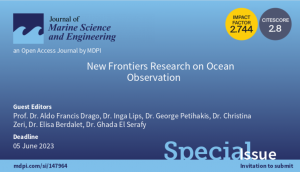 of Marine Science and Engineering in the section Physical Oceanography. The issue tackles new frontiers in ocean observing and research in a broad context, underpinning the scientific knowledge, data and information, and applications and services. Contributions are expected to cover both in situ and remote sensing observations. The deadline for submissions is 5 June 2023, and manuscripts should be submitted online at mdpi.com by registering and logging in to this website. Once you are registered, click here to go to the submission form.
of Marine Science and Engineering in the section Physical Oceanography. The issue tackles new frontiers in ocean observing and research in a broad context, underpinning the scientific knowledge, data and information, and applications and services. Contributions are expected to cover both in situ and remote sensing observations. The deadline for submissions is 5 June 2023, and manuscripts should be submitted online at mdpi.com by registering and logging in to this website. Once you are registered, click here to go to the submission form.
The post Special Issue “New Frontiers Research on Ocean Observation” appeared first on EuroGOOS.
MonGOOS Annual Meeting & workshop on the importance of scales and uncertainties in ocean transport
The Mediterranean Oceanographic Network for the Global Ocean Observing System (MONGOOS) organised its annual meeting in Florence, from the 22nd to the 24th of November 2022, where the workshop on the importance of scales and uncertainties in Ocean Transport and the General Assembly took place. During the same occasion, the EuroGOOS HFR Task Team Annual Meeting was organised as a side event of the MONGOOS annual meeting, and it hosted the JERICO-S3 Training Workshop dedicated to the “New joint tools for the European HFR Community”.
The post MonGOOS Annual Meeting & workshop on the importance of scales and uncertainties in ocean transport appeared first on EuroGOOS.
The Ocean Decade project of EuroGOOS at CommOCEAN 2022
From 30 November to 1 December, the 5th International Marine Science Communication Conference CommOCEAN 2022 is organized by the European Marine Board’s Communication Panel. The event will combine talks, hands-on exercises, expertise-sharing, and latest marine science. EuroGOOS will showcase the development of the UN Ocean Decade action ‘Scientists for Ocean Literacy‘.
The Ocean Decade Scientists for Ocean Literacy project coordinated by EuroGOOS, aims to empower scientists as key actors of a sustainable future. It embraces the diversity of marine disciplines, promotes inclusiveness in knowledge and innovation linked to the ocean, and fosters blue careers. The talk, given by the project coordinator Dina Eparkhina, will address several aspects of Ocean Literacy activities in ocean science and will build on the EuroGOOS policy brief ‘Ocean Literacy in European Oceanographic Agencies – EuroGOOS recommendations for the UN Decade of Ocean Science for Sustainable Development’.
The following key questions will be raised with the audience:
- What role are the scientific institutions to play in engaging the public?
- How to sustain and improve the Ocean Literacy offer and improve the impact?
- How to build cohesive communications around Ocean Literacy?
‘Scientists for Ocean Literacy’ is being developed by EuroGOOS to help oceanographic agencies to engage more impactfully with people in their communities, but also internationally. But the scientists cannot act alone – as part of the Ocean Literacy movement, we need a wide range of disciplines on board. Furthermore, despite the policy interest in Ocean Literacy, the scientists’ public engagement work is still under-funded and under-recognized in oceanography.
‘Scientists for Ocean Literacy’ will inspire joint events and resources for public and educators, embrace multi and trans-disciplinarity and inclusiveness in ocean knowledge and innovation, help exchange best practices, and promote blue careers. An important emphasis of the project is the promotion of Ocean Literacy as a strategic activity area in oceanography. The talk at CommOCEAN 2022 will help engage the European communication professionals and scientists interested in communications in the promoting and enabling Ocean Literacy.
The post The Ocean Decade project of EuroGOOS at CommOCEAN 2022 appeared first on EuroGOOS.
Highlights from the 11th FerryBox workshop
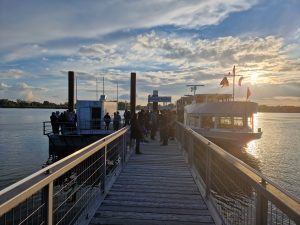 The 11th FerryBox Workshop took place on 28-29 September 2022 at Helmholtz-Zentrum Hereon in Germany. The workshop highlighted the progress within the FerryBox community during the 20 years since the EU FerryBox project started (2003).
The 11th FerryBox Workshop took place on 28-29 September 2022 at Helmholtz-Zentrum Hereon in Germany. The workshop highlighted the progress within the FerryBox community during the 20 years since the EU FerryBox project started (2003).
The event brought together research scientists, stakeholders, and industry partners from more than 15 countries in Europe and beyond. Some of the newest developments within the community were showcased, including the initiatives towards expanding the FerryBox network, the newest technological developments, and data and communication tools.
Andrew King, Research Manager in the Marine Biogeochemistry and Oceanography section at the Norwegian Institute for Water Research (NIVA) and co-chair of EuroGOOS FerryBox Task Team, and Dina Eparkhina, Senior Policy and Communications Officer at EuroGOOS, showcased opportunities to use (near)-real time in situ data for public engagement. The EuroGOOS UN Ocean Decade project ‘Scientists for Ocean Literacy‘ was highlighted as well as NIVA’s console displaying FerryBox data aboard ferries. After the talk, the FerryBox community provided feedback. It was recognized that FerryBox data is valuable to explain to the public the importance of measuring water quality, harmful algal blooms, and temperature, among others.
The workshop was supported by EuroGOOS, EU projects Jerico-S3 and EuroSea, as well as industry partners 4H Jena Engineering GmbH, SubCTech GmbH, and Kongsberg.
The post Highlights from the 11th FerryBox workshop appeared first on EuroGOOS.
State of the Global Ocean Observing System in 2022
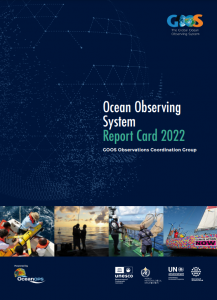 The United Nations have just released the new Ocean Observing System Report Card – a high-level annual report providing a deep insight on the state, capacity and value of the Global Ocean Observing System (GOOS). The Report Card was produced by the operational centre OceanOPS in collaboration with GOOS partners and experts.
The United Nations have just released the new Ocean Observing System Report Card – a high-level annual report providing a deep insight on the state, capacity and value of the Global Ocean Observing System (GOOS). The Report Card was produced by the operational centre OceanOPS in collaboration with GOOS partners and experts.
In 2022 the Report focuses on how an integrated observing network adds value to society across the three GOOS delivery areas of climate, operational services and ocean health. The Report highlights physical, biogeochemical and, for the first time, biological observations, providing a global view of the state of the GOOS, identifying the latest observing networks’ progress, the key challenges and opportunities to enhance the system.
The 2022 Report Card focuses on several key areas:
- Global view of the state of the Global Ocean Observing System
- Monitoring ocean carbon uptake to allow more accurate climate model projections
- Advancing coastal inundation forecasts and early warnings
- Phytoplankton observations – vital for understanding changes in food webs and shifts in marine life
- Involvement of new communities through the GOOS Ocean Decade Programmes
The Ocean Observing System Report Card was prepared by OceanOPS, GOOS Observations Coordination Group, GOOS-BioEco and BGC panels, OOPC panel, and the Secretariats of the Intergovernmental Oceanographic Commission of UNESCO and of the World Meteorological Organization.
The Ocean Observing System Report Card is available at: ocean-ops.org/reportcard
The post State of the Global Ocean Observing System in 2022 appeared first on EuroGOOS.
EuroGOOS Ocean Literacy at the Marine & Inland Waters Research Symposium 2022
The EuroGOOS Ocean Literacy Working Group and the UN Ocean Decade project ‘Scientists for Ocean Literacy’ will be presented at the Marine and Inland Waters Research Symposium 2022 in Greece. The presentation will feature in session “Mediterranean Sea (and Fresh Water) Literacy in the Era of 2030 Agenda for Sustainable Development and Decade of Ocean Science for Sustainable Development (2021-2030)”.
The presentation will showcase the EuroGOOS ‘Scientists for Ocean Literacy’ project endorsed by the UN Decade of Ocean Science for Sustainable Development 2021-2030.
The ‘Scientists for Ocean Literacy’ project aims to empower scientists as ocean advocates to their communities, countries, and regions, and help transform ocean knowledge and awareness into actions for sustainability. The project has several objectives:
- Support blue careers and education,
- Promote activities in the land-freshwater-sea continuum,
- Help share best practices and impact assessment guidelines among ocean literacy practitioners, and
- Embrace multi and trans-disciplinarity and inclusiveness through connecting science with art and culture.
The project was developed from the work of the EuroGOOS Ocean Literacy Network which has been promoting the role of the European (including Mediterranean) oceanographic and meteorological agencies in educating and engaging with the general public towards a more ocean-literate society. The ‘Scientists for Ocean Literacy’ project will raise public awareness about the importance of sustained publicly-funded information on the ocean state, natural and anthropogenic-induced phenomena, and requirements for sustainable ocean management. The ‘Scientists for Ocean Literacy’ project is connecting science with society not only through conferences and publications, but through outreach and engagement with the public in the cities, at the coast and far away from it, in schools and hospitals. The activity will follow the strategic outlook delivered by EuroGOOS in its policy brief, titled ‘Ocean Literacy in European Oceanographic Agencies – EuroGOOS recommendations for the UN Decade of Ocean Science for Sustainable Development 2021-2030’.
The post EuroGOOS Ocean Literacy at the Marine & Inland Waters Research Symposium 2022 appeared first on EuroGOOS.
EuroGOOS and Mercator Ocean International sign a Memorandum of Understanding
EuroGOOS has signed today a memorandum of understanding (MoU) with Mercator Ocean International. Mercator Ocean International is a non-profit organization dedicated to global ocean monitoring and forecasting and member of the EuroGOOS Association. With this MoU, the parties agree to enhance cooperation in the promotion of ocean observations and the development of the European Ocean Observing System (EOOS) Framework. This will include collaboration on in situ data assembly and processing in the framework of the Copernicus Marine In Situ Thematic Assembly Center (INSTAC) and the European Marine Observations and Data Network (EMODnet), on ocean monitoring and forecasting and, and strengthening links with national operational oceanographic services.
Henning Wehde, EuroGOOS Chair, said: “We are delighted to deepen the trustful collaboration with Mercator Ocean International and with that boosting the development of the Global and European ocean observing and operational oceanography systems. This includes as well the coastal regions as the bio/biogeochemical part of the marine environment. The MoU will intensify cooperation, make us stronger in sharing and utilizing the EuroGOOS member efforts, advancing data provision, filling needs, and bringing in general the operational Oceanography up to another level.”
Pierre Bahurel, Director General of Mercator Ocean International, said: “It is a great pleasure to announce the re-signing of a MoU with EuroGOOS, which has been a strong partner in the evolution of Mercator Ocean International. We look forward to continuing this journey with them, notably with important initiatives such as the consolidation of the European in situ observation system, organising a link with the Copernicus Marine Service and EU Member State national coastal systems, the development of the European Digital Twin of the Ocean, as well as the deployment of the UN Decade Collaborative Centre for Ocean Prediction.”
Mercator Ocean International is the implementing authority of Europe’s flagship Copernicus Marine Environmental Monitoring Service (CMEMS). EuroGOOS and its Regional Operational Oceanographic Systems (ROOS) have been instrumental in developing the Copernicus Marine Service Thematic Assembly Centres in all European regions. The new MoU will strengthen our joint work on increasing support for the Copernicus Marine Service as well as the uptake and improvement of its downstream services. Joint activities will be planned in building the European Digital Twin of the Ocean (DTO) and the Decade Collaborative Center on Ocean Prediction of the UN Decade of Ocean Science for Sustainable Development 2021-2030.
On the occasion of the signing ceremony, the EuroGOOS Kostas Nittis Medal to early career scientist was awarded. The medal comes with a grant and is awarded annually to an outstanding early career researcher in the broad field of ocean observing and operational oceanography. This year’s medal goes to Dr. Babette C. Tchonang who is working at the NASA’s Jet Propulsion Laboratory after completing her PhD in Europe.
Dr. Babette Tchonang shared: “As an African woman who has struggled a lot to be where I am today, this medal means a lot to me, it gives me hope and more courage. The Kostas Nittis Award will allow me to participate and be involved in projects to promote oceanography in Africa such as COESSING and expand my professional network.”
The post EuroGOOS and Mercator Ocean International sign a Memorandum of Understanding appeared first on EuroGOOS.
The Technologies of the Science We Need for the Ocean We Want – Report from the EOOS Tech Forum
Ocean technologies, data, and infrastructures are undergoing rapid changes, transforming the ocean research and innovation. Disruptive technologies such as artificial intelligence, big data or blockchain are starting to shape research and innovation cycles. Sustained ocean observations, essential to increase our understanding of the ocean and its functions, require a suite of increasingly efficient technologies and instruments to gather, store, transfer and process large volumes of ocean data. We need to better incorporate new technologies into the observing systems, while making sure the observations are fit for purpose and address societal needs.
The EOOS Technology Forum provides the structure to enable the comparison of old and new technologies for their usefulness in ocean observing systems, understand data management and processing needs, and provide guidance to technology developers about technology user requirements.
The second edition of the EOOS Technology Forum was held from 22 to 24 March 2022 as a virtual event. It was endorsed as an activity of the UN Decade of Ocean Science for Sustainable Development 2021-2030 (Ocean Decade). The event was organized by EuroGOOS with support of the EU Horizon H2020 projects EuroSea and Minke. It brought together over 120 international participants, including instrument manufacturers, technicians, technologists, scientists, and policymakers. The three-day Forum comprised several keynote addresses, panel discussions, Show-and-Tell presentations, and interactions with the audience. Report of the Forum is now available on the EOOS website.
Scientific research and innovative technologies are crucial to achieving global sustainability and adequate stewardship of the ocean. They enable us to deepen our understanding and respond to societal needs. As a regular meeting point on ocean observing technologies, the EOOS Technology Forum helps boost cooperation among a wide range of ocean observing implementers and stakeholders.
The post The Technologies of the Science We Need for the Ocean We Want – Report from the EOOS Tech Forum appeared first on EuroGOOS.
Implementing Operational Ocean Monitoring and Forecasting Systems – new guide
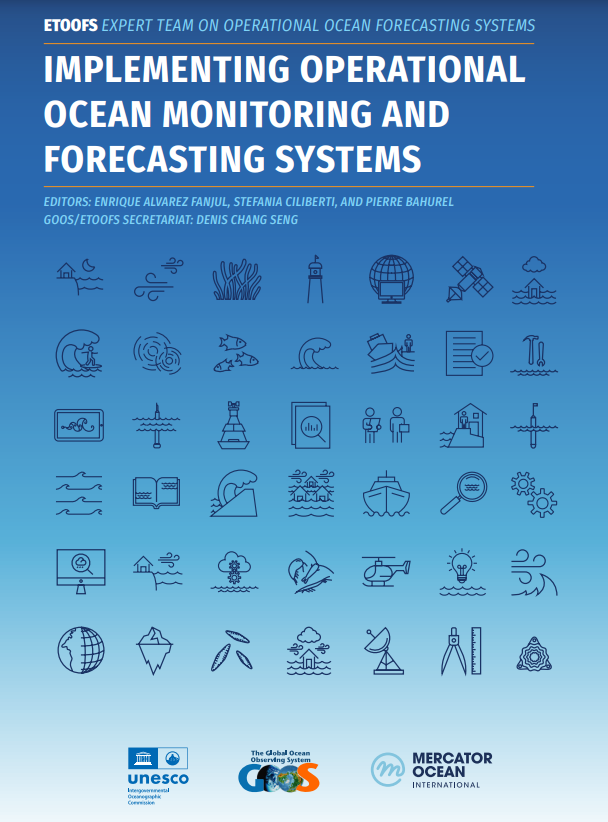 The Global Ocean Observing System (GOOS) and its Expert Team on Operational Ocean Forecasting Systems released a new guide titled “Implementing Operational Ocean Monitoring and Forecasting Systems”. This document is a new reference for operational oceanography, prepared by 80 authors and in cooperation with 51 institutions from 18 countries worldwide. EuroGOOS Member Organization Delegates Enrique Alvarez Fanjul and Pierre Bahurel were among the co-editors. The publication was initiated at the request of the Intergovernmental Oceanographic Commission of the UNESCO (IOC-UNESCO) and the World Meteorological Organization (WMO), and funded by GOOS and Mercator Ocean International.
The Global Ocean Observing System (GOOS) and its Expert Team on Operational Ocean Forecasting Systems released a new guide titled “Implementing Operational Ocean Monitoring and Forecasting Systems”. This document is a new reference for operational oceanography, prepared by 80 authors and in cooperation with 51 institutions from 18 countries worldwide. EuroGOOS Member Organization Delegates Enrique Alvarez Fanjul and Pierre Bahurel were among the co-editors. The publication was initiated at the request of the Intergovernmental Oceanographic Commission of the UNESCO (IOC-UNESCO) and the World Meteorological Organization (WMO), and funded by GOOS and Mercator Ocean International.
This guide is a unique and comprehensive reference document for the operational ocean modeling community. It covers key areas of ocean monitoring and forecasting systems, focusing on their current state of the art as well as their future developments. The guide aims to promote the development of new marine forecasting systems around the globe as well as advance the implementation of the existing ones. It provides an overview of the entire value chain of the operational ocean monitoring and forecasting systems as well as international standards and best practices for setting up monitoring and forecasting services.
Find out more and download at this link.
The post Implementing Operational Ocean Monitoring and Forecasting Systems – new guide appeared first on EuroGOOS.
EuroGOOS at the UN Ocean Conference
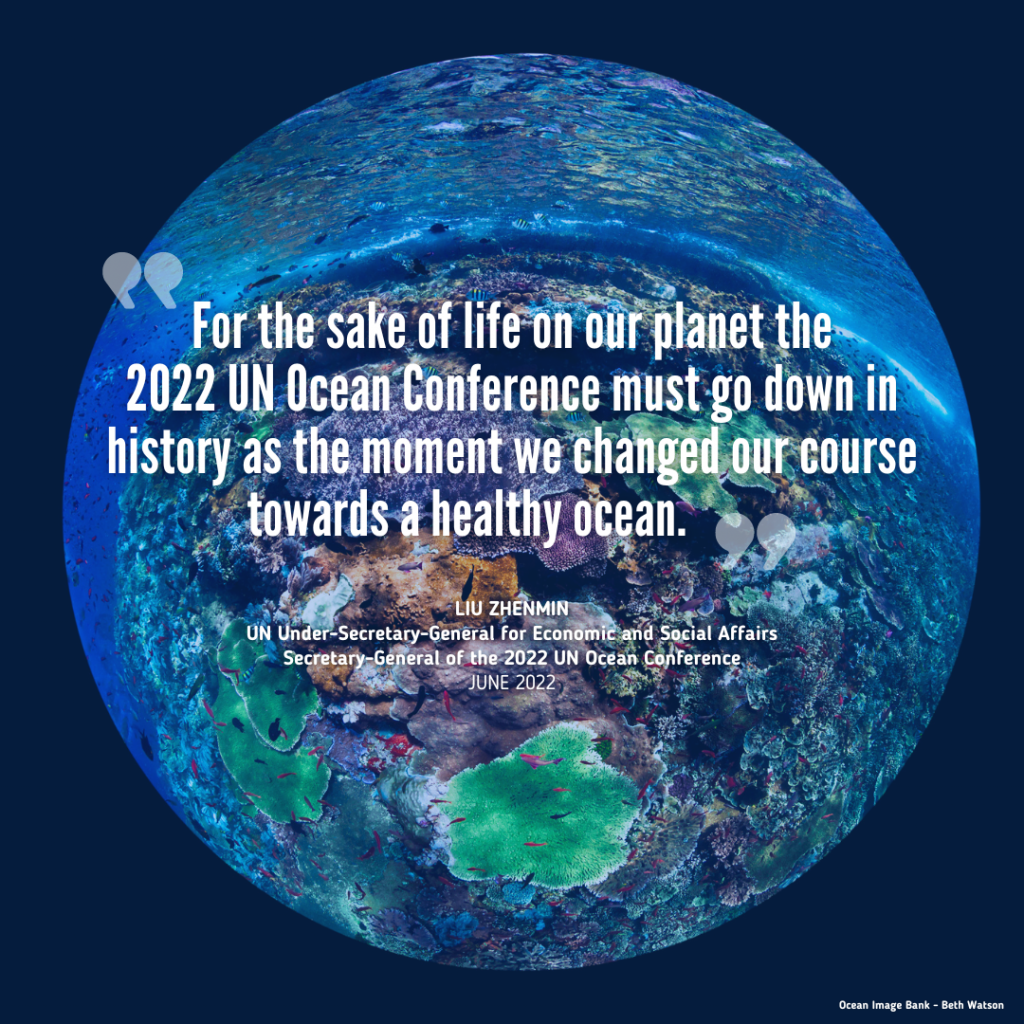 Many EuroGOOS Member Organizations and the EuroGOOS Office will be present at the UN Ocean Conference (UNOC 2022). This is a milestone event bringing together the global communities across all sectors of society for high-level and comprehensive dialogues about ocean sustainability.
Many EuroGOOS Member Organizations and the EuroGOOS Office will be present at the UN Ocean Conference (UNOC 2022). This is a milestone event bringing together the global communities across all sectors of society for high-level and comprehensive dialogues about ocean sustainability.
“There is a great deal we still do not know about the ocean but there are many reasons why we need to manage it sustainably”, states the preamble to the UNOC 2022. In response to this, our Member Organizations have collectively submitted a EuroGOOS statement to UNOC 2022 highlighting that oceanography holds key solutions to closing those knowledge gaps. In addition, to a call for global action on sustained ocean observing and operational oceanography service provision, EuroGOOS also is bringing attention to other key topics in today’s ocean science, spanning actions on data, capacity enhancement, blue careers, and ocean literacy.
Partnerships across countries and different sectors are recognized as a key strategy for more effective resource use and increased participation in ocean science, reinforcing its application in policy, according to the Global Ocean Science Report (IOC, 2020). As stated in the EuroGOOS 2030 Strategy, partnerships are paramount in achieving common objectives and gaining the added value in the co-production of oceanographic services and information. Moreover, partnerships are critical to ensure these services are user-focused and the ocean information underpinned by our work can support decision-making. In our UNOC 2022 statement we put forward some priority topics for partnerships in the domain of operational oceanography. These concern, sharing infrastructures, strengthening science-policy interface and public-private engagements, citizen science and co-design with social sciences and humanities.
Our UNOC 2022 statement is not only a call for action across these important topics, but also our commitment. As stated in the document, “EuroGOOS is emphasising its commitment to lead the development and implementation of sustained and coordinated operational oceanography in Europe and further an integrated framework for the European Ocean Observing System. The benefits of this work have global implications, improving the delivery of ocean information and services internationally”.
Download the EuroGOOS statement to UNOC 2022:
.well.c2a3 .btn {
padding: 11px 30px;
font-size: 11pt;
}
.well.c2a3 .media-body {
font-size: 11pt;
margin-left: -15px;
}
.well.c2a3 .wpdm_icon {
height: 20px;
width: auto;
min-width: 28px;
max-width: 28px;
}
.well.c2a3 {
padding: 0;
background: transparent;
}
.well.c2a3 a {
color: #7BA6D8 !important;
}
.text-muted.fsize {
color: #7BA6D8 !important;
margin-left: 5px;
}
In addition to attending the UNOC main event, we will also participate in many side events organized by a vast international ocean community. Programme of the UNOC is available here.
- On 30 June, EuroGOOS will intervene during the UNOC interactive dialogue “Increasing scientific knowledge and developing research capacity and transfer of marine technology”, as part of the main event of the conference.
- On 29 June, EuroGOOS will present our Scientists for Ocean Literacy UN Ocean Decade project at the official UNOC side event titled Ocean Literacy Dialogues, organized by UNESCO and the European Commission.
- Among the side events we will contribute to, EuroGOOS Office was invited to represent the community at the side event co-organized by EuroGOOS member Mercator Ocean International, titled ‘Digital Ocean Systems to Support and Strengthen Implementation of the Sustainable Development Goals‘ on 27 June.
- EuroGOOS will also be represented at the side event for the launch of the Charter for the Mission “Restore our Ocean and Waters by 2030″, organized by the European Commission on 30 June.
The post EuroGOOS at the UN Ocean Conference appeared first on EuroGOOS.
EuroGOOS Scientists for Ocean Literacy at the UN Ocean Conference
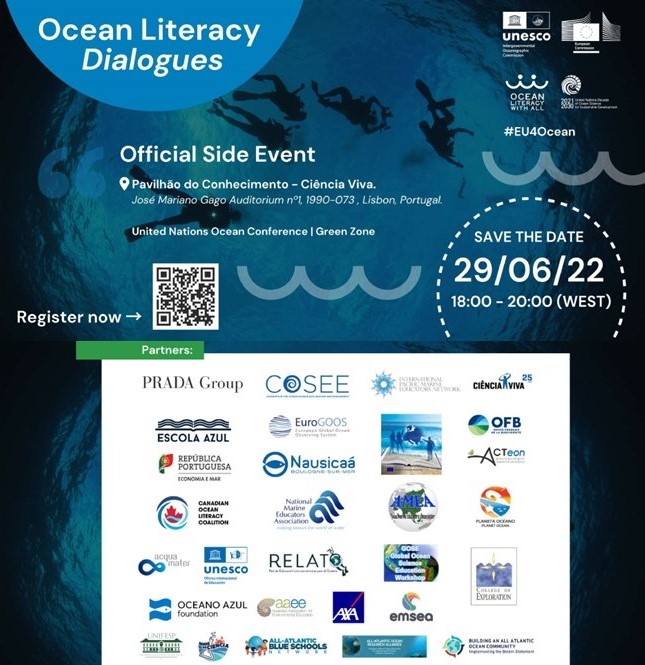 We are pleased to contribute to the official side event of the UN Ocean Conference titled Ocean Literacy Dialogues on 29 June, 18:00-20:00 (Lisbon time). This event, organized by UNESCO and the European Commission, will bring together leading international networks on Ocean Literacy to discuss joint action and strengthen the visibility of Ocean Literacy at the UN level. EuroGOOS will present our Scientists for Ocean Literacy project of the UN Ocean Decade and the work of our Ocean Literacy Working Group.
We are pleased to contribute to the official side event of the UN Ocean Conference titled Ocean Literacy Dialogues on 29 June, 18:00-20:00 (Lisbon time). This event, organized by UNESCO and the European Commission, will bring together leading international networks on Ocean Literacy to discuss joint action and strengthen the visibility of Ocean Literacy at the UN level. EuroGOOS will present our Scientists for Ocean Literacy project of the UN Ocean Decade and the work of our Ocean Literacy Working Group.
As stated in the concept note for this event, Ocean Literacy is at a tipping point. There are many initiatives and projects around the world involved in Ocean Literacy at different levels. We also observe a policy uptake of the Ocean Literacy narratives. However, Ocean Literacy is still falling behind as an integral and central part of sustainable development, unlike, for example, the blue economy which is gaining in importance and funding. One cannot be without the other, and Ocean Literacy should be fully recognized with all the needed support.
This event will promote Ocean Literacy as a central component of the next UN Ocean Conference and will be a first in a series of events fostering dialogues, exchanges, and ideas. A pre-event survey is being circulated to the Ocean Literacy practitioners around the globe to reflect their priorities (completed already by EuroGOOS at the pan-European level and the individual members of our Ocean Literacy Working Group).
Registration is ongoing here
The pre-event survey is here
The post EuroGOOS Scientists for Ocean Literacy at the UN Ocean Conference appeared first on EuroGOOS.
Scientists for Ocean Literacy in MTS Journal
Have you seen the new edition of the Marine Technology Society Journal dedicated to the UN Decade of Ocean Science for Sustainable Development 2021-2030?
We are happy to be part of this publication with our Ocean Decade project Scientists for Ocean Literacy! Find the article by Dina Eparkhina here. The full MTS issue is available free of charge at this link.
What is Scientists for Ocean Literacy?
This Ocean Decade project is helping marine scientists become more actively involved in public engagement. Scientists for Ocean Literacy is expanding the horizon of science communication towards a multi-stakeholder dialogue. The project is building on the best practices from the European community of oceanographers and meteorologists, bringing in other science disciplines, culture, and the arts, and promoting inclusiveness, diversity, and accessibility in the public engagement activities. The project also explores how to improve the ocean literacy offer in the publicly funded oceanographic and meteorological agencies and beyond.
The post Scientists for Ocean Literacy in MTS Journal appeared first on EuroGOOS.
General Assembly of the EU DOORS Black Sea project – main highlights and EuroGOOS role
 The DOORS project held its second general assembly from 7 to 9 June in Burgas, Bulgaria, hosted by the Burgas Free University (discover some pictures at the bottom of this article). DOORS stands for Developing Optimal and Open Research Support for the Black Sea. This European Union project, running from June 2021 to May 2025, will enhance the Black Sea knowledge and deliver information and oceanographic services for the Blue Economy and other stakeholders.
The DOORS project held its second general assembly from 7 to 9 June in Burgas, Bulgaria, hosted by the Burgas Free University (discover some pictures at the bottom of this article). DOORS stands for Developing Optimal and Open Research Support for the Black Sea. This European Union project, running from June 2021 to May 2025, will enhance the Black Sea knowledge and deliver information and oceanographic services for the Blue Economy and other stakeholders.
DOORS has three main programmes to underpin the delivery of its objectives:
- The System of System of the Black Sea knowledge and information: This system will combine the existing marine data and modelling capabilities of the Black Sea and demonstrate innovative prototypes of an integrated service responding to the needs of the Black Sea Strategic Research and Innovation Agenda (SRIA).
- Blue Economy Accelerator: This programme will analyze the Blue Economy potential in the Black Sea and propose tangible solutions for the businesses in the region.
- Knowledge Transfer and Training: This programme will deliver bespoke training and capacity enhancement activities for various audiences and stakeholders of the Black Sea research and innovation. A special focus will be given to the training of the next generation of ocean professionals.
The European Global Ocean Observing System (EuroGOOS), is leading the DOORS work on stakeholder engagement and project legacy, helping to harvest stakeholder requirements to co-design the implementation of the DOORS work plan, across the three main programmes and the underpinning activities. In addition to co-leading the implementation of the stakeholder engagement strategy together with the project coordinator, Romanian National Research-Development Institute for Marine Geology and Geoecology (GeoEcoMar), EuroGOOS is also coordinating the activities of the European Marine Research Infrastructures in DOORS and the project’s Ocean Literacy work.
The DOORS assembly in Burgas was a milestone for the project, having brought nearly all partners together for the first time in their physical presence (DOORS was approved for funding in 2021 in the midst of the pandemic). The partners unable to attend, joined the sessions remotely. This three-day meeting reviewed the activities of nine DOORS work packages and the advancements in the design of the three DOORS programmes listed above.
EuroGOOS held an ideation session with the consortium to reflect on the stakeholder engagement activities across three key topics: Sustainable Blue Economy, Policy and Governance, and Public Engagement. EuroGOOS also organized a side meeting with the European Research Infrastructure Consortia (ERIC) who are partners in DOORS to set out the work plan for transferring experiences and best practices from ERICs to the emerging and developing Research Infrastructures, and engaging more Black Sea countries in the European activities. In the first months of the project, EuroGOOS released a map viewer of the ocean observing capabilities in the Black Sea, showing in a one-stop-shop all European marine data aggregators, ERICs, and established Research Infrastructures.
On the last day of the DOORS assembly, 13 representatives of business in the Black Sea from Bulgaria, Romania, Turkey, Georgia, and Moldova joined the DOORS consortium for a dialogue on their needs and views on the opportunities for the Blue Economy development. The business sectors represented included traditional and eco-tourism, renewable energy, fisheries, circular solutions, in addition to local administrations and port authorities.
In the coming year, in the lead up to the next DOORS assembly to take place in Trabzon, Georgia, many DOORS events are foreseen – connecting the project’s stakeholders through multi-actor forums, training Black Sea researchers on the use of the ERIC and European data aggregator services, developing business support programmes, and engaging with general public.
The post General Assembly of the EU DOORS Black Sea project – main highlights and EuroGOOS role appeared first on EuroGOOS.
The cities we need for the ocean we want – EuroGOOS-UNESCO workshop at EMD 2022
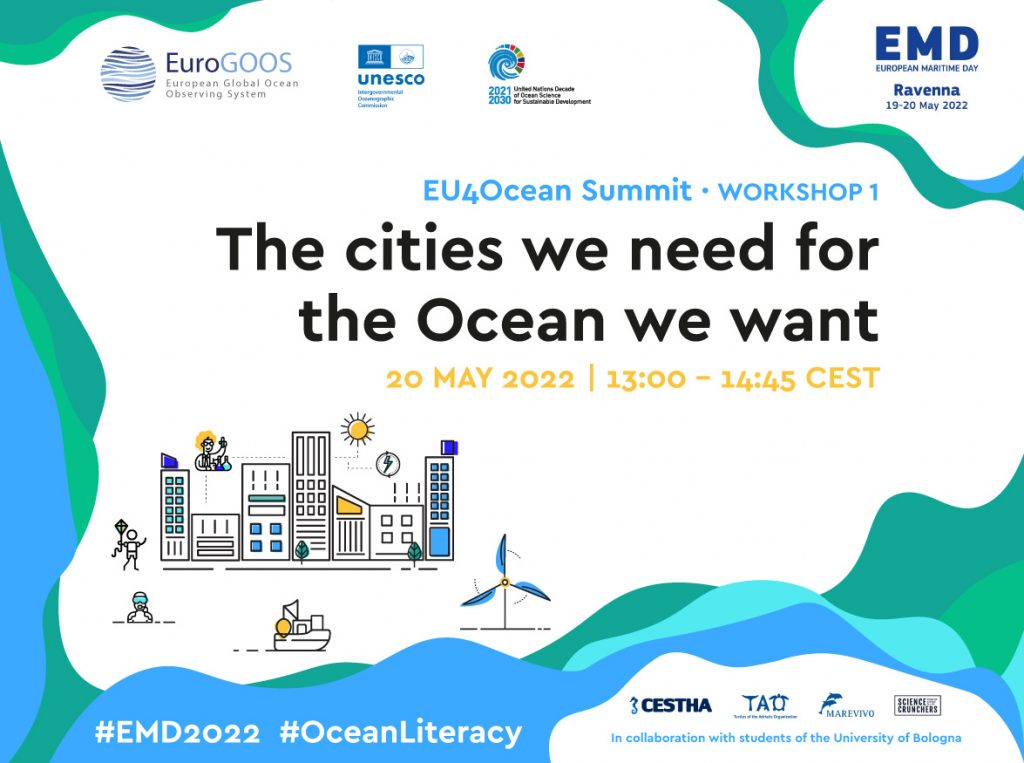 Join us at this workshop titled ‘The cities we need for the ocean we want’, co-organized by EuroGOOS and IOC-UNESCO as part of the European Maritime Day 2022 (EMD)!
Join us at this workshop titled ‘The cities we need for the ocean we want’, co-organized by EuroGOOS and IOC-UNESCO as part of the European Maritime Day 2022 (EMD)!
EMD is the annual two-day event organized by the European Commission during which Europe’s maritime community meet to network, discuss, and outline joint action on maritime affairs. This year’s main theme is ‘Sustainable blue economy for green recovery’.
At our workshop, we will discuss ocean literacy as a tool to connect science with cities and communities in European coastal or land-locked settings. We will engage with ocean literacy practitioners, oceanographers, city authorities, and the next generation of Blue Career professionals, to discuss how to make our cities more blue and citizens more ocean literate.
With the UN Decade of Ocean Science going on full steam, we will invite the audience to follow the Decade programme “Ocean Literacy With All” and its project “Scientists for Ocean Literacy”, coordinated by EuroGOOS. Students from the Bologna University will share their ideas and expectations from the city municipalities and representatives of the ocean literacy initiatives across Europe.
The event will connect science with the public in a tangible way to co-design tools and solutions for the cities we need for the ocean we want.
Our workshop is part of the Commission’s EU4Ocean Summit on ocean literacy, taking place during the EMD.
Download the programme of our workshop ‘The cities we need for the ocean we want’ 20 May 2022:
.well.c2a3 .btn {
padding: 11px 30px;
font-size: 11pt;
}
.well.c2a3 .media-body {
font-size: 11pt;
margin-left: -15px;
}
.well.c2a3 .wpdm_icon {
height: 20px;
width: auto;
min-width: 28px;
max-width: 28px;
}
.well.c2a3 {
padding: 0;
background: transparent;
}
.well.c2a3 a {
color: #7BA6D8 !important;
}
.text-muted.fsize {
color: #7BA6D8 !important;
margin-left: 5px;
}
EMD programme and registration (until 12 May) are here. All EMD sessions and workshops are organized in a hybrid format, with speakers and moderators in the venue.
The post The cities we need for the ocean we want – EuroGOOS-UNESCO workshop at EMD 2022 appeared first on EuroGOOS.
EuroGOOS ‘Scientists for Ocean Literacy’ initiative endorsed by the UN Ocean Decade
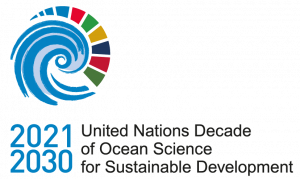 EuroGOOS is committed to mainstream ocean literacy in European oceanographic and met agencies as a strategic area of activity. This commitment has now been recognized and acknowledged by the Intergovernmental Oceanographic Commission of UNESCO (IOC), with the endorsement of the EuroGOOS initiative ‘Scientists for Ocean Literacy’ as a project under the UN Decade of Ocean Science for Sustainable Development 2021-2030 (the Decade). This EuroGOOS project will be part of the Decade programme called Ocean Literacy with All (OLWA) led by UNESCO.
EuroGOOS is committed to mainstream ocean literacy in European oceanographic and met agencies as a strategic area of activity. This commitment has now been recognized and acknowledged by the Intergovernmental Oceanographic Commission of UNESCO (IOC), with the endorsement of the EuroGOOS initiative ‘Scientists for Ocean Literacy’ as a project under the UN Decade of Ocean Science for Sustainable Development 2021-2030 (the Decade). This EuroGOOS project will be part of the Decade programme called Ocean Literacy with All (OLWA) led by UNESCO.
‘Ocean literacy is key for achieving the Decade objectives’, says Dina Eparkhina, coordinator of EuroGOOS ocean literacy activities. ‘Since 2019, EuroGOOS has been building a network of oceanographic and meteorological institutes actively working on ocean literacy in their countries. We have achieved a vibrant and creative community of practice, jointly developed activities, and recently released a policy brief on ocean literacy in oceanographic agencies. The endorsement by the Decade will give our efforts a stronger visibility and recognition at both local and global levels and help gain new partners.’
The EuroGOOS ‘Scientists for Ocean Literacy’ Decade project will empower scientists as ocean advocates to their communities, countries, and regions, and help transform ocean knowledge into actions for sustainability. This project will support blue careers and education, promote activities in land-freshwater-sea continuum, help share best practices and impact assessment guidelines among institutes, and embrace multi and trans-disciplinarity and inclusiveness through connecting science with art and culture. It will also be an important tool to increase societal awareness of the role of oceanographic activities in delivering information on ocean state, natural and anthropogenic-induced phenomena, and processes for sustainable ocean management – supporting the objectives of the global and regional ocean observing systems.
The ’Scientists for Ocean Literacy’ Decade project will be implemented by the EuroGOOS Office and the EuroGOOS Working Group on Ocean Literacy. Further information on the Decade actions is available here.
The post EuroGOOS ‘Scientists for Ocean Literacy’ initiative endorsed by the UN Ocean Decade appeared first on EuroGOOS.
EuroGOOS Office is looking for a Communications Officer
The EuroGOOS Office seeks a Communications Officer to support the EuroGOOS team, members, and regional networks in communications, outreach, and organizational tasks.
The Communications Officer will manage the EuroGOOS Office daily communication and outreach tasks, support the EuroGOOS team in meeting organization, assist EuroGOOS members and regions (ROOS) in communication outreach tasks, and facilitate internal operations.
The position is for three years and is based in Brussels at the EuroGOOS Office.
Interested applicants are invited to submit their CV and motivation letter to Dina Eparkhina, Senior Policy and Communications Officer at dina.eparkhina@eurogoos.eu by 5 November 2021.
The full job description can be accessed below:
Job Announcement_Communications Officer
104.07 KB
The post EuroGOOS Office is looking for a Communications Officer appeared first on EuroGOOS.
EuroGOOS releases new Kostas Nittis Award brochure and poster
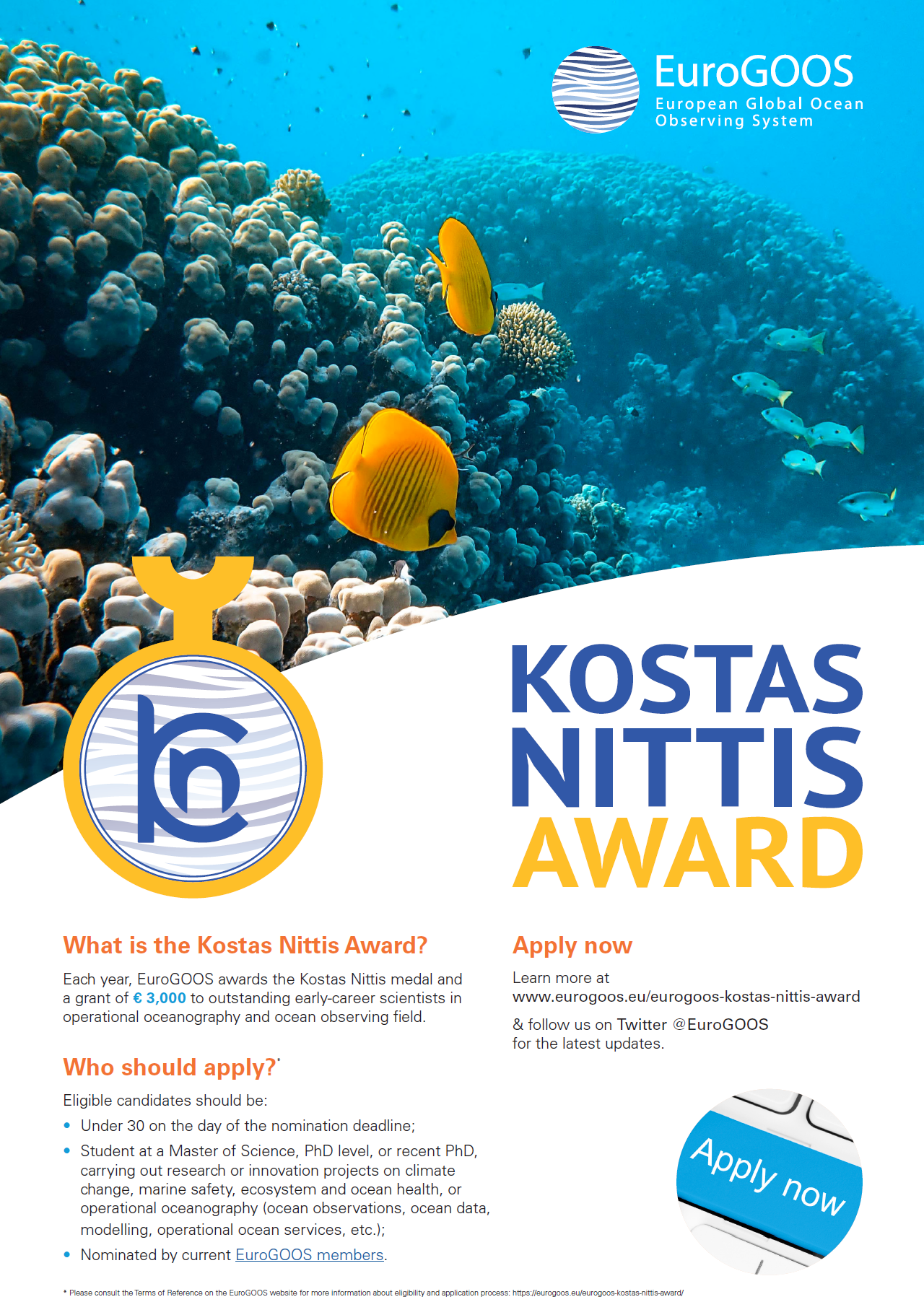 The new brochure and flyer aim to provide an overview of the EuroGOOS Kostas Nittis Award.
The new brochure and flyer aim to provide an overview of the EuroGOOS Kostas Nittis Award.
Interested applicants are invited to learn more about the initiative and eligibility criteria, and discover how the award has benefited the research work and professional development of previous winners.
Every year, EuroGOOS awards the Kostas Nittis medal and a grant of € 3,000 to outstanding early-career scientists in operational oceanography and ocean observing field. The award, established in memory of EuroGOOS Secretary General and strategic leader Dr. Kostas Nittis, provides successful applicants with the opportunity to present their work at international conferences and events, expand their professional networks, and reach out to potential research partners and future employers.
Access the brochure and poster below for more information:
Kostas Nittis Award_Brochure
4.54 MB
Kostas Nittis Award_Poster
2.19 MB
The post EuroGOOS releases new Kostas Nittis Award brochure and poster appeared first on EuroGOOS.
New EuroGOOS Biological Observations Working Group kicks off on 1 October
The EuroGOOS Biological Observing Working Group (BIOWG) kick-off meeting will take place virtually on 1 October 2021.
As EuroGOOS starts implementing its 2030 Strategy, the EuroGOOS General Assembly approved the establishment of the Biological Observing Working Group (BIOWG) in May 2021. The BIOWG is the first Working Group within the biological discipline in EuroGOOS, and will help the organization expand its scope into ocean health and climate services and create closer links with the marine biological community in Europe.
Chaired by Nicolas Pade from EMBRC-ERIC, the BIOWG will work on developing rigorous and operationally-focused standard specifications and operating procedures to generate quantitative and qualitative biological data products to integrate into existing ocean observation programmes and modelling efforts.
The BIOWG includes 29 members from 24 organisations and 17 nations whose initial work will focus on eDNA, multi-omics, and imaging.
Building and strengthening links and collaboration across different disciplines is essential for achieving a well-coordinated and integrated European operational oceanography and ocean observing capacity.
This kick-off meeting represents a decisive step towards this goal and an excellent opportunity to work, collaborate, and integrate with the marine biological community.
The post New EuroGOOS Biological Observations Working Group kicks off on 1 October appeared first on EuroGOOS.
New EuroGOOS Biological Observing Working Group kicks off on 1 October
The EuroGOOS Biological Observing Working Group (BIOWG) kick-off meeting will take place virtually on 1 October 2021.
As EuroGOOS starts implementing its 2030 Strategy, the EuroGOOS General Assembly approved the establishment of the Biological Observing Working Group (BIOWG) in May 2021. The BIOWG is the first Working Group within the biological discipline in EuroGOOS, and will help the organization expand its scope into ocean health and climate services and create closer links with the marine biological community in Europe.
Chaired by Nicolas Pade from EMBRC-ERIC, the BIOWG will work on developing rigorous and operationally-focused standard specifications and operating procedures to generate quantitative and qualitative biological data products to integrate into existing ocean observation programmes and modelling efforts.
The BIOWG includes 29 members from 24 organisations and 17 nations whose initial work will focus on eDNA, multi-omics, and imaging.
Building and strengthening links and collaboration across different disciplines is essential for achieving a well-coordinated and integrated European operational oceanography and ocean observing capacity.
This kick-off meeting represents a decisive step towards this goal and an excellent opportunity to work, collaborate, and integrate with the marine biological community.
The post New EuroGOOS Biological Observing Working Group kicks off on 1 October appeared first on EuroGOOS.
9th EuroGOOS International Conference Proceedings released
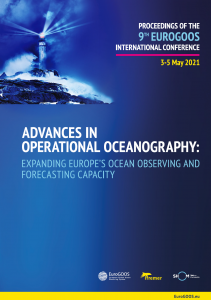 The 9th EuroGOOS International Conference Proceedings, ‘Advances in operational oceanography: Expanding Europe’s ocean observing and forecasting capacity’, are now available on the permanent conference website hosted by Ifremer.
The 9th EuroGOOS International Conference Proceedings, ‘Advances in operational oceanography: Expanding Europe’s ocean observing and forecasting capacity’, are now available on the permanent conference website hosted by Ifremer.
Held every three years, the event aims to assess current ocean monitoring and forecasting capacities, address challenges, and identify new science and technology priorities. It fosters dialogue, experience sharing, and future planning with both European and international partners and stakeholders, towards a more coordinated response to societal needs related to the ocean.
The 9th EuroGOOS International Conference – titled ‘Advances in operational oceanography: Expanding Europe’s ocean observing and forecasting capacity’ – took place virtually on 3-5 May 2021. The event was a resounding success and brought together over 450 participants from 45 countries to engage on a wide range of operational oceanography themes and topics. A total of 90 scientific presentations were given in parallel sessions and 22 posters were presented, while international speakers shared their insights on coordination, governance, and impact across five plenary sessions. The EuroGOOS Conference was jointly organized by the offices of EuroGOOS, Ifremer, and SHOM.
Download the 9th EuroGOOS International Conference Proceedings here and access the presentations from the plenary, breakout and posters sessions here.
The post 9th EuroGOOS International Conference Proceedings released appeared first on EuroGOOS.
EuroGOOS 2nd Integration Workshop
The 2nd EuroGOOS Integration Workshop will take place on 29-30 November 2021 at the EuroGOOS headquarters, hosted by the Royal Belgian Institute of Natural Sciences in Brussels, as a hybrid event. The workshop aims to improve the integration between EuroGOOS Task Teams, Working Groups, and Regional Operational Oceanographic Systems (ROOS), align strategies, and improve engagement and cooperation.
The event will start with the opening remarks of Henning Wehde, EuroGOOS Chair, and an outline of the workshop objectives, followed by an overview of the EuroGOOS activities and their contribution to the UN Ocean Decade programmes.
The first day will feature two sessions. The first session will be on common requirements (10:00-13:00 CET). It will address topics such as FAIR data services, requirements for coastal models, and machine learning techniques for quality control. The second session (14:00-17:00 CET) will be dedicated to observation integration for Ocean Climate and Ocean Health. It will discuss biological observations on different platforms, integration of technologies, steps and practices to improve integration, detection of marine pollution, and development of nature-based solutions to coastal protection and climate change. This session will also address research priorities to develop an integrated Earth-system approach and expand the EuroGOOS scope to ocean climate services and operational ecology.
The second day will host a session on governance and strategy (10:00-13:00 CET). This will focus on the EuroGOOS ROOS and Task Team governance, alignment of the ROOS strategies with the EuroGOOS 2030 Strategy, and ways to foster closer collaboration between members on proposals supporting the implementation of the Strategy. The event will conclude with recommendations for future action.
The workshop will be open for broad participation, and in-person attendance will be available for the EuroGOOS Board, Office, and Chairs of activities.
The post EuroGOOS 2nd Integration Workshop appeared first on EuroGOOS.
Scientists for Ocean Literacy – EuroGOOS activity as part of the Ocean Decade Inspiring & Engaging Lab
We invite you to discuss the role of scientists as Ocean Literacy advocates in their communities, countries, and regions! This EuroGOOS activity in the Ocean Decade Lab on ‘Inspiring and Engaging Ocean’ will feature our latest policy brief ‘Ocean Literacy in European Oceanographic Agencies: EuroGOOS recommendations for the UN Decade of Ocean Science for Sustainable Development 2021-2030’ and showcase several Ocean Literacy activities in Europe.
We hope to inspire scientists to work closely with various sectors of society, among others, educators, communicators, journalists, and public authorities, embrace multi and trans-disciplinarity and inclusiveness in ocean knowledge and innovation, help exchange best practices, and promote blue careers. This event will help empower the Ocean Literacy communities of practice in transforming ocean knowledge into actions for sustainability through societal engagement.
Register here!
Registration is free of charge but mandatory. After registering, you will receive a confirmation email containing information about joining the meeting. The event will be in English, no translation provided.
Programme (draft):
- Oceanographers for Ocean Literacy & EuroGOOS recommendations
Dina Eparkhina, Office of the European Global Ocean Observing System (EuroGOOS) - Case studies from the EuroGOOS Ocean Literacy Network:
- Localizing Ocean Literacy
Panayota Koulouri, European Marine Science Educators Association – EMSEA-Med / Hellenic Centre for Marine Research (HCMR), Greece - Oceanographic consoles for Ocean Literacy
Andrew King, Norwegian Institute for Water Research (NIVA), Norway - Citizen scientists monitoring the ocean
Marina Locritani, National Institute of Geophysics and Volcanology (INGV), Italy - Turning the tide for women in oceanography
MCarmen Carcia, Spanish Institute of Oceanography (IEO), Spain - SeaFest maritime festival
Garry Kendellen, Irish Ocean Literacy Network - Video: The colours of the Mediterranean
Michela Angiolillo and Marco Pisapia, Italian National Institute for Environmental Protection and Research (ISPRA), Italy
- Localizing Ocean Literacy
- Discussion with the audience
This event is organized within the activities of the EuroGOOS Ocean Literacy Network.
Find out more about the Ocean Decade Laboratories here. The Laboratories are hosted by the German Federal Ministry of Education and Research in partnership with IOC-UNESCO as part of the kick-off programme of the UN Decade of Ocean Science for Sustainable Development 2021-2030.
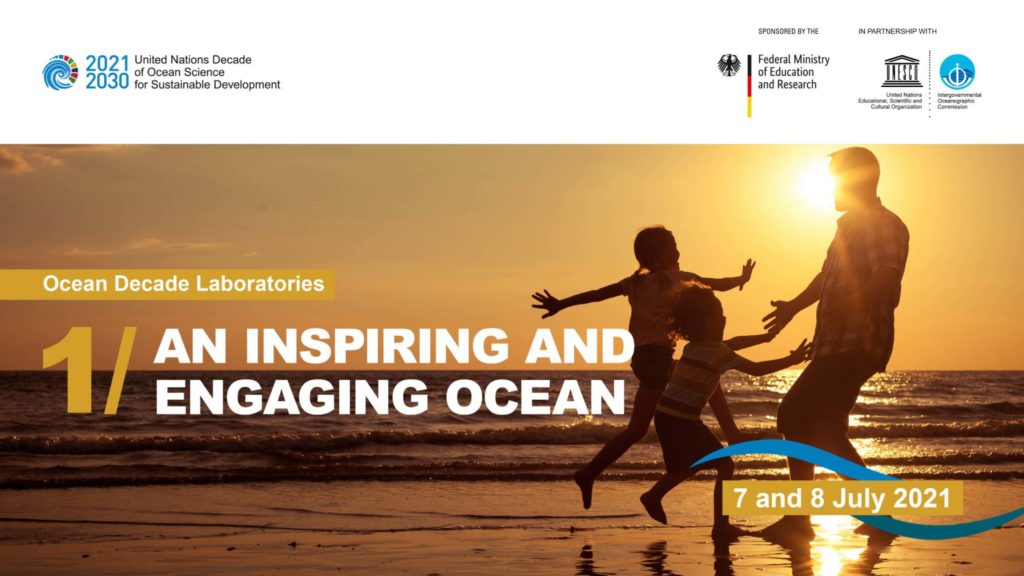
The post Scientists for Ocean Literacy – EuroGOOS activity as part of the Ocean Decade Inspiring & Engaging Lab appeared first on EuroGOOS.
Developing Optimal and Open Research Support for the Black Sea (DOORS)
The DOORS project (June 2021-May 2025) is a research and innovation action under the European Union Horizon 2020 programme. The project aims at implementing the Black Sea Strategic Research and Innovation Agenda (download) with stakeholders and other projects and initiatives in the region. DOORS will address research and infrastructure to better understand the Black Sea, develop and implement an ecosystem-based framework for Blue Economy, inform policy development and implementation, and promote behavioural change towards sustainability.
In DOORS, EuroGOOS is leading work package on stakeholder engagement and participates in other work packages to facilitate a smooth and integrated engagement activity throughout the project.
The post Developing Optimal and Open Research Support for the Black Sea (DOORS) appeared first on EuroGOOS.
The DOORS project kicks off to develop open research support for the Black Sea
The DOORS project, titled ‘Developing Optimal and Open Research Support for the Black Sea’, has stared in June 2021 for a four-year duration, coordinated by GeoEcoMar, Romania. DOORS is a research and innovation action under the European Union Horizon 2020 programme, bringing together 37 partners to advance the Black Sea Strategic Research and Innovation Agenda (download).
The project consortium represents all countries in the Black Sea region as well as several pan-European organizations and Research Infrastructure consortia. EuroGOOS is leading the work package on stakeholder engagement and participates in other work packages to facilitate a smooth and integrated engagement activity throughout the project.
DOORS will work closely with stakeholders and other projects and initiatives in the region, addressing research and infrastructure needs to close the knowledge gaps, develop and implement an ecosystem-based framework for Blue Economy, inform policy development and implementation, and promote behavioural change towards sustainability.
The DOORS kick-off meeting is taking place on 29-30 June 2021 as a virtual event.
The post The DOORS project kicks off to develop open research support for the Black Sea appeared first on EuroGOOS.
Key takeaways from the 9th EuroGOOS International Conference
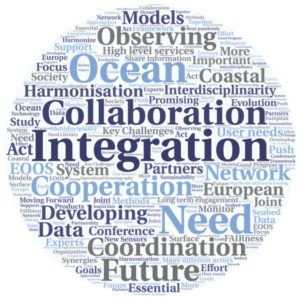
Word cloud of the audience key takeaways at the 9th EuroGOOS International Conference closing, 5 May 2021
Our 9th International Conference has been an overwhelming success. 450 participants from 45 countries joined our online event tackling all aspects of operational oceanography. A total of 90 scientific presentations were given in parallel sessions and 22 posters presented, while international speakers shared their insights on coordination, governance, and impact in our five plenary sessions.
At the closing we asked our audience about their key takeaways and among the many answers one came in most prominently – integration. Our new 2030 Strategy, launched at the conference, is addressing the integration needs though various key themes, such as expanding and enhancing the communities of practice and partnerships, as well as joining efforts more efficiently and impactfully in common advocacy, public mobilization, and interactions at science-policy interface.
Integration is not something that happens at once. The communities represented at the 9th EuroGOOS Conference have demonstrated through their diverse voices and a joint imperative to foster co-production of oceanographic services and value to society, that this integration is ongoing at full steam. To help this process, we will deliver not only the conference proceedings but also the conference recommendations which will set out a list of priorities for our members and partners in the coming years, aligned with our vision and strategy.
EuroGOOS Chair George Petihakis presented the key messages of this statement in the conference closing. Those are:
- Operational monitoring, data provision, and services for ocean health and climate – seamless Earth-system approach, synergies between operational, environmental, and climate research and monitoring, enhanced biology and bio-geo-chemistry observations and data delivery;
- Common approach to strengthening marine Research Infrastructures – joint observing system implementation, stronger user engagement and capacity building, joint actions at international level;
- Coastal oceanography – fit-for-purpose technologies, FAIR, timely & interoperable data, metrology standards towards Ocean Digital Twin, user-friendly interfaces;
- From acquisition to modelling – EuroGOOS and EOOS supporting sustainability of in situ systems, shared standards and practices, user engagement in co-design, improved data assimilation, esp. in coastal areas and for bio-geo-chemical and biological modelling;
- User-oriented products and services – targeted interactions with users, clear messaging, technological cooperation, best practices;
- Big data and artificial intelligence – FAIR data management plans for transdisciplinary analyses with AI, training in machine learning and programming, collaborations between marine and computer scientists;
- Contribution to the UN Decade of Ocean Science for Sustainable Development – co-production of new products and services, data aggregation, advocacy for sustained operations, international partnerships;
- EOOS Framework – linking European ocean observing networks, stakeholders, and initiatives, stakeholder engagement and co-design, synergies across disciplines, interface between national and pan-European ocean observing management.
Co-design and co-production of science, models and forecasting will bring the needed paradigm shift in ocean observing to deliver better and timelier knowledge to society. At the heart of this are partnerships, integration, capacity development and diversity.
Our Conference platform with all its contents (the programme, posters, breakout will remain open for the coming year. The permanent conference website hosted by Ifremer will contain all conference outcomes, including the speakers’ slides, video recordings, proceedings, and the conference statement.
The post Key takeaways from the 9th EuroGOOS International Conference appeared first on EuroGOOS.
EuroGOOS Policy Brief: Ocean Literacy in European Oceanographic Agencies – Recommendations for the Ocean Decade
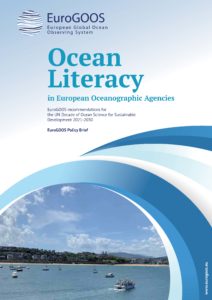 Our new policy brief gives recommendations on how to enhance Ocean Literacy activities in oceanographic agencies. The brief was developed from the work of the EuroGOOS Ocean Literacy Network and a survey the network conducted across 11 organizations in Europe. The survey unveiled an outstanding diversity of activities, demonstrating that Europe is advancing towards making Ocean Literacy part of the mandate of oceanographic agencies and meteorological offices.
Our new policy brief gives recommendations on how to enhance Ocean Literacy activities in oceanographic agencies. The brief was developed from the work of the EuroGOOS Ocean Literacy Network and a survey the network conducted across 11 organizations in Europe. The survey unveiled an outstanding diversity of activities, demonstrating that Europe is advancing towards making Ocean Literacy part of the mandate of oceanographic agencies and meteorological offices.
The extent of the activities dedicated to increasing public engagement and awareness carried out by these organizations, whose core mandate is mainly linked to scientific and technological aspects of ocean data and services, calls for a stronger voice for Ocean Literacy as a recognized and active force in today’s oceanography.
From local and national to global levels, Ocean Literacy enables science to engage with policy and society on the topics of ocean sustainability, observations and research, and the importance of oceanography. EuroGOOS has been showcasing and connecting the variety of Ocean Literacy competences among its members and partners.
The success of the United Nations Decade of Ocean Science for Sustainable Development 2021-2030 will rely on sustained and fit-for-purpose ocean observing and derived oceanographic information and services. Ocean Literacy tools and approaches are needed to increase societal and policy awareness of the needs, challenges, and opportunities of the ocean observing enterprise. Furthermore, Ocean Literacy is important for achieving sustained operations and funding of the ocean observing systems, maintained predominantly by public funding.
Download the EuroGOOS Policy Brief
The post EuroGOOS Policy Brief: Ocean Literacy in European Oceanographic Agencies – Recommendations for the Ocean Decade appeared first on EuroGOOS.
EuroGOOS 2030 Strategy launched!
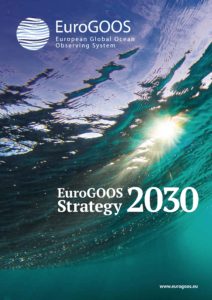 Today, at the 9th EuroGOOS International Conference, we have launched the EuroGOOS Strategy 2030. The new Strategy and its five objectives will guide our community of members, Regional Operational Oceanographic Systems (ROOS), networks of observing platforms, and working groups.
Today, at the 9th EuroGOOS International Conference, we have launched the EuroGOOS Strategy 2030. The new Strategy and its five objectives will guide our community of members, Regional Operational Oceanographic Systems (ROOS), networks of observing platforms, and working groups.
EuroGOOS is a Regional Alliance of the Global Ocean Observing System, which brings together oceanographic systems around the globe. The EuroGOOS 2030 Strategy underpins the implementation of the Global Ocean Observing System 2030 Strategy and expands the EuroGOOS strategic foci to include the operational monitoring, data provision, and services for ocean health and climate. This Strategy will strengthen the contribution of the EuroGOOS large network of organisations to the UN Decade of Ocean Science for Sustainable Development 2021-2030.
Chair George Petihakis said, “Since its foundation in 1994, EuroGOOS has been pivotal in advancing pan-European cooperation in oceanographic research, technology development, capacity building, and data sharing. In our new Strategy we have identified five objectives which will help our community of over 130 organizations to jointly deliver a fit-for-purpose and integrated operational oceanographic system and services to society”.
As the ocean is undergoing dramatic changes, it is imperative to have the relevant information across all scales to better understand and protect the ocean and its ecosystems. Adaptive, integrated, and sustained ocean observing systems are needed to underpin data and information for a range of users and respond to the policy needs. The European Ocean Observing System (EOOS) framework development, together with the implementation of the EuroGOOS 2030 Strategy, will form a powerful effort of the European ocean observing community to step-up the delivery of the ocean knowledge and information.
Download the EuroGOOS 2030 Strategy  EuroGOOS 2030 Strategy (1.0 MiB)
EuroGOOS 2030 Strategy (1.0 MiB)
The post EuroGOOS 2030 Strategy launched! appeared first on EuroGOOS.
Registrations open for the 9th EuroGOOS International Conference on 3-5 May 2021
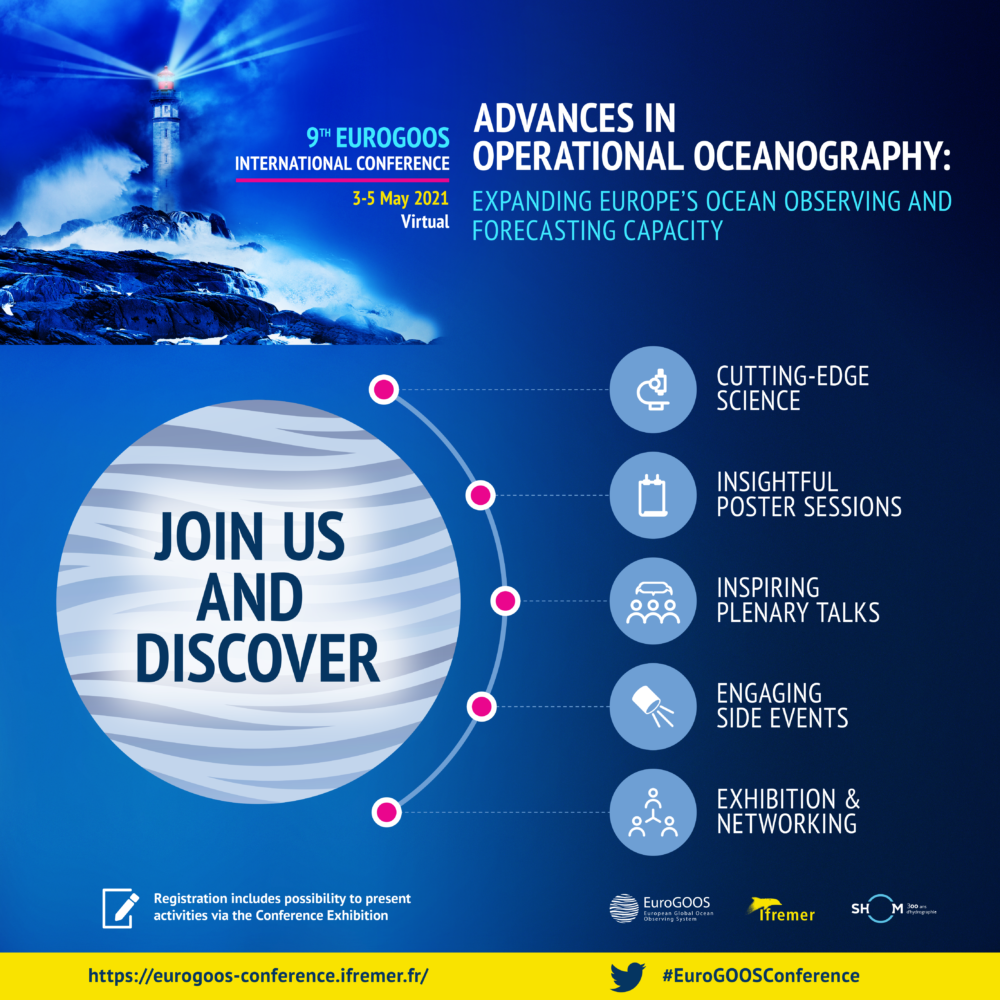 The EuroGOOS Conference, held every three years, brings together managers, developers, and users of ocean observing and operational oceanography products and services. The conference fosters dialogue, experience sharing, and future planning with European and international partners and stakeholders, towards a more coordinated response to societal needs related to the ocean.
The EuroGOOS Conference, held every three years, brings together managers, developers, and users of ocean observing and operational oceanography products and services. The conference fosters dialogue, experience sharing, and future planning with European and international partners and stakeholders, towards a more coordinated response to societal needs related to the ocean.
The first virtual edition of the conference will offer a vibrant scientific programme on oceanographic methods, technologies, and applications, spanning ocean physics, health, and climate. Our marketplace is an opportunity to showcase your work, while the interactive meeting platform will ease networking and matchmaking worldwide.
We invite a broad range of stakeholders in ocean observing and operational oceanography, from scientists and technologists to businesspersons and policymakers. Together, we will debate ways to achieve a sustained and fit-for-purpose European Ocean Observing System and support the UN Decade of Ocean Science for Sustainable Development as well as the European Green Deal. The event will address synergies between European ocean observing networks and initiatives and the integration of data and knowledge for societal benefits.
To register, please access the conference virtual platform HERE. Step-by-step instructions are available here.
Please note that participation is free but registration is mandatory.
Keep your finger on the pulse of operational oceanography advancements and join us for this exciting event!
The post Registrations open for the 9th EuroGOOS International Conference on 3-5 May 2021 appeared first on EuroGOOS.
Registrations open for the 9th EuroGOOS International Conference taking place on 3-5 May 2021
 The EuroGOOS Conference, held every three years, brings together managers, developers, and users of ocean observing and operational oceanography products and services. The conference fosters dialogue, experience sharing, and future planning with European and international partners and stakeholders, towards a more coordinated response to societal needs related to the ocean.
The EuroGOOS Conference, held every three years, brings together managers, developers, and users of ocean observing and operational oceanography products and services. The conference fosters dialogue, experience sharing, and future planning with European and international partners and stakeholders, towards a more coordinated response to societal needs related to the ocean.
The first virtual edition of the conference will offer a vibrant scientific programme on oceanographic methods, technologies, and applications, spanning ocean physics, health, and climate. Our marketplace is an opportunity to showcase your work, while the interactive meeting platform will ease networking and matchmaking worldwide.
We invite a broad range of stakeholders in ocean observing and operational oceanography, from scientists and technologists to businesspersons and policymakers. Together, we will debate ways to achieve a sustained and fit-for-purpose European Ocean Observing System and support the UN Decade of Ocean Science for Sustainable Development as well as the European Green Deal. The event will address synergies between European ocean observing networks and initiatives and the integration of data and knowledge for societal benefits.
To register, please access the conference virtual platform HERE. Step-by-step instructions are available here.
Please note that participation is free but registration is mandatory.
Download the conference flyer:
 9th EuroGOOS International Conference 2021 Flyer (1.0 MiB)
9th EuroGOOS International Conference 2021 Flyer (1.0 MiB)
The post Registrations open for the 9th EuroGOOS International Conference taking place on 3-5 May 2021 appeared first on EuroGOOS.
IOC-UNESCO’s First Ocean Literacy Course of the Decade of Ocean Science for Sustainable Development
The EuroGOOS Ocean Literacy Network took part in the 1st Ocean Literacy Course organized within the UN Decade of Ocean Science for Sustainable Development 2021-2030. The training development was led by IOC and its Ocean Teacher Global Academy. Virtual classrooms brought together a wide range of people from various sectors of society and occupations around the topic of Ocean Literacy. Teachers were gathered from practitioners and managers from around the world.
In this course, we shared our passion for ocean observing which underpins all activities at sea, as well as our weather and climate predictions, and presented two case studies from the EuroGOOS Ocean Literacy Network.
EuroGOOS member SOCIB, the Balearic Islands Coastal Observing and Forecasting System, presented a study on “The Sea of Science” contest in Spain: a nationwide artwork, video, and storytelling competition for primary and secondary schools. SOCIB strongly believes that researchers have an obligation to inform the public of their work and to encourage open dialogue about an area of science that is likely to have a huge impact on people’s lives, bringing marine sciences and scientists closer to the public. In the “The Sea of Science” contest, students immerse themselves in marine sciences through artistic expression, showing their relationship with the ocean, and their views about its state and oceanographers’ work. The competition also involves teachers, education centres, and families. It promotes an inspiring and engaging ocean and helps citizens understand the ocean value and importance.
Two other members of EuroGOOS, the Institute of Marine Sciences of the Italian Research Council, CNR-ISMAR, and Istituto Nazionale di Geofisica e Vulcanologia, INGV, shared a case study on the project “SeaCleaner” focused on the problem of anthropogenic waste in the marine environment. Since 2013, “SeaCleaner” has involved more than 1,500 pupils, researchers, and citizen volunteers in the monitoring of Anthropogenic Marine Debris accumulated on Italian coasts. Within this project, a data acquisition protocol was defined for the collection and cataloguing of the different types and sizes of these waste items, based on protocols used at European level, was simplified and adapted to the local specificities, to allow its use by volunteers and also by high school students, thus combining research and education. The activity involved environmental NGOs, volunteers, and five Italian Marine Protected Areas surrounding the Pelagos Sanctuary.
At the training session, led by Francesca Santoro, IOC Programme Specialist developing Ocean Literacy at UNESCO, the EuroGOOS members’ Ocean Literacy efforts were presented by Dina Eparkhina, the Network‘s coordinator. Download the EuroGOOS slides and discover the images from the “The Sea of Science” and the “SeaCleaner” case studies below.
 2020 02 17 IOC Ocean Literacy Training (1.3 MiB)
2020 02 17 IOC Ocean Literacy Training (1.3 MiB)
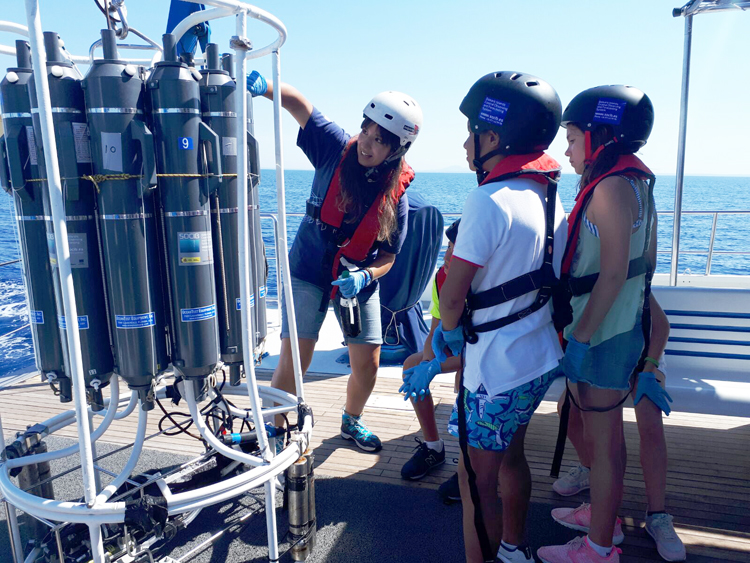
The Sea of Science (La mar de ciencia) contest. Credit: SOCIB |
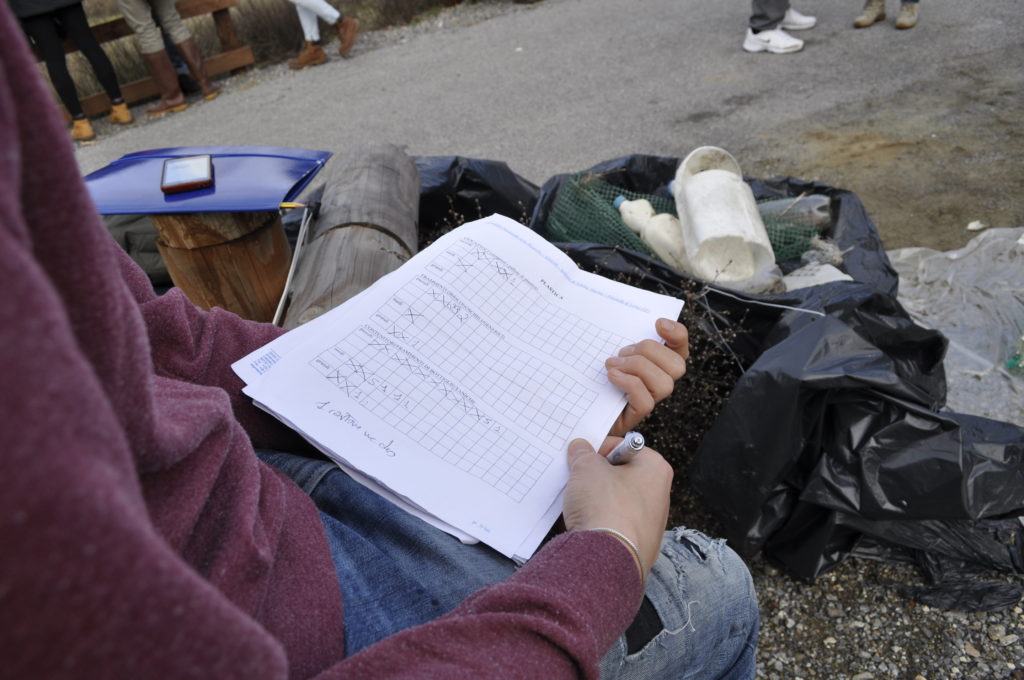
Sea Cleaner project. Credit: CNR-ISMAR and INGV |
The post IOC-UNESCO’s First Ocean Literacy Course of the Decade of Ocean Science for Sustainable Development appeared first on EuroGOOS.
EuroGOOS response to the European Commission consultation ‘Ocean Observation – Sharing Responsibility’
EuroGOOS welcomed the opportunity to react to the European Commission’s public consultation on the initiative titled ‘Ocean Observation – Sharing Responsibility’. In November 2020, we submitted to the Commission our feedback on the inception impact assessment of this initiative . In that document, we outlined a EuroGOOS vision on the status and priorities for the European ocean observing coordination and shared a set of relevant studies and documents.
The EuroGOOS response to the Commission’s consultation was submitted on behalf of the member organizations – 44 national oceanographic institutes, hydrographic agencies, met offices, and foundations from 18 European countries.
EuroGOOS supports a European Union initiative to bring together all Member States’ public bodies responsible for ocean observation to develop priorities and realise opportunities for sharing effort, as well as a stronger EU funding support towards observations of common benefit. European ocean observing must be able to respond to a wide range of societal needs, well identified in many documents by our community and partly listed in the Commission’s consultation survey. Ocean is an interconnected system which requires integrated approaches to collecting and analysing its information and responding to the needs of the users. Priorities in funding and support should be identified very carefully to not put in jeopardy an integrated assessment of the ocean’s pressures and our management actions.
Sustained and coordinated ocean observing is paramount for accurate forecasts of the ocean state and conditions critical for maritime economy, human health, and security. Coordination between sectoral players (agencies for ocean health, fisheries, climate, operational services, etc.) at the sea basin level is crucial. Innovative regional observational technologies should be incorporated in the monitoring and observing programmes to provide data with the appropriate resolution in time and space to assess the ocean status and progress towards environmental targets and the Good Environmental Status. Coordinated ocean observing will also boost European competitiveness in ocean technologies, including infrastructures, sensors, or e-infrastructures.
Enabling and improving multi-disciplinary training of personnel is key, as well as attracting and keeping personnel in oceanographic jobs, including a growing need in informatics and data curation specialists, as well as promoting training exchange among institutions.
Ocean observing must become a shared priority between the Members States and the Union with effective governance at national, regional sea, and European levels. The EU needs integrated, sustained, and fit-for-purpose ocean observing to deliver on the EU Green Deal and the Biodiversity Strategy, Europe’s Agenda 2030 contributions, the blue economy goals, and to develop integrated tools to understand the evolution of the climate and the marine environment, like a Digital Twin of the Ocean. There is a lack of knowledge among nations about each other’s activities leading to inefficiencies that result in slow progress in monitoring, modelling, blue technology evolution, and ocean knowledge and information availability with, at the end, user needs, and sustainability targets not being met.
Nations should take responsibility to sustain ocean observations in their countries, and these activities should be coordinated at regional and pan-European levels. Stronger EU funding support should be directed towards observations of common benefit. A combination of EU and Member States’ support towards ocean observing sustainability will help achieve policy coherence, support dialogue towards common solutions and identification of synergies and trade-offs, shed light on potential or perceived barriers, and sustain ocean observing efforts over time beyond research, funding, or electoral cycles.
Ocean is the largest shared natural resource of the European Union and stronger collaboration between atmosphere, land, marine, and social research communities is critical to homogenize and enhance the quality of operational products at the interfaces of those domains. The European Commission’s support towards better planning of the ocean observing activities will have positive influence on other environment monitoring areas as well as security.
Sharing ocean observing capacity and joint planning of activities will contribute to better equity in science, technology, and innovation, making ocean observations a public utility. The scientific advancements allowed through a better coordination of European ocean observing efforts will underpin the implementation of the UN Decade of Ocean Science for Sustainable Development.
Download the EuroGOOS statement submitted with the consultation survey response
 EG21.03 European Commission Ocean Observation Consultation – EuroGOOS Feedback (172.2 KiB)
EG21.03 European Commission Ocean Observation Consultation – EuroGOOS Feedback (172.2 KiB)
The post EuroGOOS response to the European Commission consultation ‘Ocean Observation – Sharing Responsibility’ appeared first on EuroGOOS.
EuroGOOS at the 2nd EuroSea Annual Meeting – towards integrated European ocean observing and forecasting
The EuroSea Annual Meeting took place on 18-22 January with the project’s General Assembly taking place on the last day.
The EuroGOOS Office co-leads work packages 1 (Governance and Coordination of ocean observing and forecasting systems) and 8 (Engagement, Dissemination, Exploitation & Legacy) and is represented on the Gender and Diversity Board, while many EuroGOOS members and ROOS representatives are project partners.
The week showcased progress in the first 14 months of the project and featured invited talks from the colleagues at IMOS and GOOS, as well as several EuroSea-related EU projects. The EuroSea Gender and Diversity Board invited a lecture on Women in Oceanography from Britta Thege of Kiel University of Applied Sciences and held a session to discuss the results of the survey conducted among the EuroSea consortium members. Inga Lips (EuroGOOS Secretary General) presented the EOOS framework developments. Dina Eparkhina (EuroGOOS Senior Policy and Communications Officer) and Emma Heslop (IOC-GOOS Programme Specialist) organized a session on EuroSea impact monitoring. A series of Scientific Lunches were held during the lunch breaks with a wide range of presentations from the EuroSea experts. At the General Assembly, George Petihakis (EuroGOOS Chair) was elected as member of the EuroSea Executive Board to fill the seat left vacant after the departure of Glenn Nolan from EuroGOOS.
Discover a summary of the event on the EuroSea website.
The post EuroGOOS at the 2nd EuroSea Annual Meeting – towards integrated European ocean observing and forecasting appeared first on EuroGOOS.
Looking back at 2020 and wishing you Merry Observing and Happy New Year 2021!
Moving onto a new year which will mark the beginning of the UN Decade of Ocean Science for Sustainable Development, let us look back at the year we are leaving behind. 2020 will be remembered by the global pandemic that affected our Members and team, both personally and professionally. Operations at sea were stopped, engagement opportunities frozen, life-work balance strained – just to name a few of the challenges we faced this year. But incredible as it was, the EuroGOOS Members and the Office achieved new heights and supported some major organization’s actions for the coming years.
Our new 2030 Strategy was adopted by the Members at the EuroGOOS General Assembly in June. The Strategy sets out an ambitions framework to foster our impact and engage more strongly with all areas of ocean observing. For years, EuroGOOS has strengthened operational oceanographic cooperation, and has contributed to the delivery of some of the core European operational services we have today. The new 2030 Strategy will help us expand to the areas of operational data collection, forecasting and service provision for ocean health and climate. We will continue fostering communities of practice, partnerships, and advocating for ocean observing sustainability and fitness for purpose. We will also continue making societal engagement part of our priorities. Citizens’ understanding of the importance of oceanography and value it brings to their daily lives – from weather predictions, to climate research, to maritime operations and coastal security – is key to sustain our work.
We welcomed our new Secretary General and first woman to hold this position in EuroGOOS’ 26 years of history, Dr. Inga Lips. We wish to thank Dr. Glenn Nolan who held this position for the last five years. The Office has also grown with new members joining the team.
44 Members of EuroGOOS from 18 countries and our five Regional Operational Oceanographic Systems (ROOS) were engaged in our Working Groups and Task Teams which bring European added value of cooperation in various areas of oceanography. Through meetings, research, and engagement with stakeholders, we believe our activities have made EuroGOOS much stronger this year. These achievements are too many to list and span coastal services, infrastructure reviews, ocean literacy, and new observing technologies. To strengthen the joint impact of the EuroGOOS numerous bodies, integration workshops took place to enhance the transfer of best practices and cross-fertilization.
An external review was conducted for the first time, providing key insights into the various aspects of EuroGOOS activities, strategy, and way forward. The review highlighted the unique and well-established role of EuroGOOS as a hub and voice for European ocean observing adding value to its Members and broader community, catalyzing new ideas and initiatives, strengthening regional coordination, and enhancing synergies among stakeholders.
Several projects started their active work in 2020 in which the EuroGOOS Office represents the priorities of the organization – all contributing to various aspects of the ocean observing and forecasting value chain. These are: EuroSea, Jerico S3 and Jerico DS, FORCOAST, and a new Copernicus In Situ Coordination project. SeaDataCloud project ended having achieved new important milestones towards quality ocean data aggregation at the EU level.
We have continued to actively work with partners towards a shared European Ocean Observing System framework, EOOS. The EOOS implementation plan, adopted in 2018, was updated with more actions completed – such as the EOOS Technology Forum, organized by our Technology Plan Working Group. We have helped strengthening the EOOS governance working with the European Marine Board with whom we co-chair the EOOS Steering Group and Advisory Committee. The EOOS Operations Committee started its work in late 2020.
This has been another fruitful year for EuroGOOS despite the unexpected and severe pressures caused by the pandemic we all have experienced this year. We wish to recognize the enthusiasm and continuous belief in EuroGOOS by our Members and ROOS, as well as the dedication and professionalism of our tireless Office team. Let us list the members of our Office: Orla Colligan, Ana Lara-Lopez, Ruxandra-Laura Bosilca, Erik Buch, Vicente Fernandez, Dina Eparkhina, with Inga Lips at the helm of the team.
Merry Observing and Happy New Year!
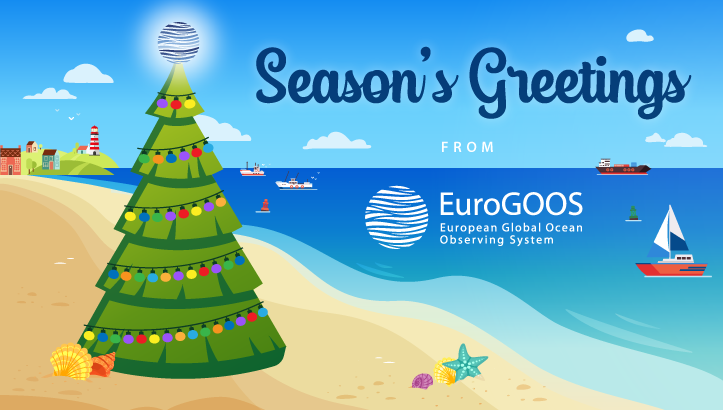
The post Looking back at 2020 and wishing you Merry Observing and Happy New Year 2021! appeared first on EuroGOOS.
EuroGOOS International Conference: Abstract submission is now open

Abstract submission is now open for the 9th EuroGOOS International Conference, Advances in Operational Oceanography: Expanding Europe’s Ocean Observing and Forecasting Capacity, to take place virtually on 3-5 May 2021.
Held every three years, the conference aims to provide a review of current ocean monitoring and forecasting capacities and oceanographic services and map out new science and technology priorities. The event brings together a wide range of developers and users of operational oceanography services, and serves as a platform fostering the exchange of ideas and cooperation to find solutions to ocean-related global challenges.
Abstracts (maximum 1600 characters) should address one of the key themes and topics of the conference:
- In-situ and remote sensing observations: towards a European Ocean Observing System (EOOS) in the framework of the UN Ocean Decade;
- Ocean modelling and forecasting: extending and improving predictability: Global, regional, shelf and coastal forecasting systems, towards the Digital Twin of the Ocean;
- Meeting end-user needs and supporting marine development.
Abstracts should be submitted via the online abstract submission system on the conference website before 15 January 2021 (23.59 CET).
Authors will be notified of acceptance or rejection by 15 February 2021 and final versions of accepted papers should be submitted by 12 April 2021 for publication in the EuroGOOS 9th International Conference Proceedings.
The post EuroGOOS International Conference: Abstract submission is now open appeared first on EuroGOOS.
EOOS Operations Committee holds a successful first meeting
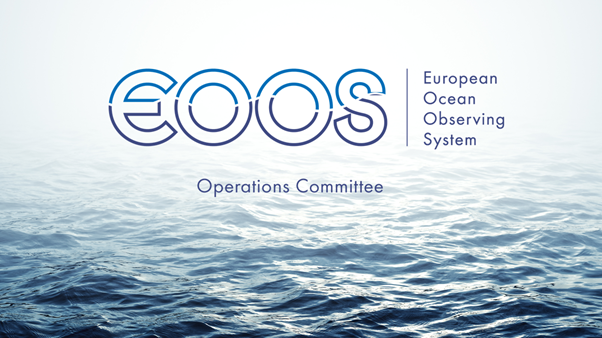 The newly formed EOOS Operations Committee held a successful first meeting on 24-25 November 2020 (virtual), chaired by EuroGOOS and co-organized by EuroGOOS and GOOS within the activities of the EuroSea project. The meeting brought together over 45 participants, across 23 European countries. The EOOS Operations Committee is a vital element of the EOOS governance representing the diversity of the ocean observing implementers at national, regional, and pan-European levels. The committee’s role will be to help with the integration and long-term sustainability of the ocean observing efforts in Europe and implement EOOS progressively.
The newly formed EOOS Operations Committee held a successful first meeting on 24-25 November 2020 (virtual), chaired by EuroGOOS and co-organized by EuroGOOS and GOOS within the activities of the EuroSea project. The meeting brought together over 45 participants, across 23 European countries. The EOOS Operations Committee is a vital element of the EOOS governance representing the diversity of the ocean observing implementers at national, regional, and pan-European levels. The committee’s role will be to help with the integration and long-term sustainability of the ocean observing efforts in Europe and implement EOOS progressively.
The GOOS National Focal Points from Europe, an integral part of this committee, provided a national perspective across a range of important topics relevant to European ocean observing and monitoring. This helped understand the diverse national requirements and level of coordination. The meeting benefited from the knowledge and experience of the European Research Infrastructures and EuroGOOS structures (Regional Operational Oceanographic Systems and Task Teams), as well as European earth observation agencies, research vessel operators and network of marine stations, as existing coordinating and collaborating structures in Europe. They are an excellent example of pan-European collaboration and provided valuable input on the successes and pitfalls in setting up these coordination groups.
The Operations Committee inaugural meeting was dynamic, informative and, insightful. It provided animated and engaging discussions that explored diverse solutions to make the benefits of ocean observing more visible, foster integration, coordination and collaboration, and advocate for sustained funding. The meeting also represents the first time GOOS has engaged with its National Focal Points as a collective team to work on advancing in national and cross-border ideas towards an integrated, fit-for-purpose Global Ocean Observing System.
Participants raised many ideas at the meeting, some of these include:
- Create national ocean observing coordination structures that are multi-sectorial and multi-disciplinary;
- Propose a Pan-European programme of ocean observing for UN Decade of Ocean Science, with the support of EOOS and GOOS;
- Facilitate dialogue between neighbouring nations and between different communities (research, monitoring, industry) to improve information and knowledge exchange through dedicated interactive workshops at national, regional, and European level.
The next steps for the committee will be to map the ocean observing infrastructure networks and organisations, develop plans for dialogue within and between nations to foster coordination and collaboration, and other activities that will contribute to more a integrated ocean observing in Europe. You can find more information about this meeting in here, with a full report coming out soon.
The post EOOS Operations Committee holds a successful first meeting appeared first on EuroGOOS.
EuroGOOS response to the European Commission Initiative ‘Ocean Observation – Sharing Responsibility’
EuroGOOS summited the institutional response to the European Commission Inception Impact Assessment, Ocean Observation – Sharing Responsibility, as part of the online consultation on the inception (22 October – 19 November 2020).
As a unique voice of European oceanography representing national and regional interests and well established in the Global Ocean Observing System, EuroGOOS stands ready to deliver a coordinated support to the European Commission’s ocean observation actions supporting joint planning of ocean observing activities and a framework for collaboration on a national and EU scale.
We shared our support to a European Union initiative to bring together all Member States’ public bodies responsible for ocean observation to develop priorities and realise opportunities for sharing effort, as well as stronger EU funding support towards observations of common benefit. We believe this will help addressing the current lack of long-term sustainability of ocean observing efforts and the unbalance between the member states efforts, as well as improve synergy between the EU ocean observing support tools.
It should be recognised that common European and global ocean observing needs should be served by centrally supported infrastructures, while the national capacities should be better coordinated across the agencies and authorities responsible for various parts of the ocean observing enterprise. A combination of EU and member states support towards ocean observing sustainability will help achieve policy coherence, support dialogue towards common solutions and identification of synergies and trade-offs, shed light on potential or perceived barriers, and sustain ocean observing efforts over time beyond research, funding, or electoral cycles.
Further to the request for stakeholder feedback on the inception, the Commission is planning to open a public consultation in the last part of 2020, to prepare for proposal for an act towards the third quarter of 2021.
Download our full response
 EG20.25 European Commission Ocean Observation Inception EuroGOOS Feedback (185.7 KiB)
EG20.25 European Commission Ocean Observation Inception EuroGOOS Feedback (185.7 KiB)
The post EuroGOOS response to the European Commission Initiative ‘Ocean Observation – Sharing Responsibility’ appeared first on EuroGOOS.
Applications for the Kostas Nittis Award are now open until 31 January 2021
Every year, EuroGOOS awards the Kostas Nittis Medal and an accompanying grant of € 3,000 to outstanding early-career marines scien tists in operational oceanography and the broader ocean observing field.
tists in operational oceanography and the broader ocean observing field.
The call is open to marine students younger than 30 years old, conducting innovative work at the Master of Science or Ph.D. level in the areas of climate change, marine safety, ecosystems and ocean health, or operational oceanography. Candidates should be nominated by current EuroGOOS members.
Discover how the award supports the work of young researchers, and read more about the eligibility requirements, application process, and evaluation here.
The deadline for applications is 31 January 2021.
The post Applications for the Kostas Nittis Award are now open until 31 January 2021 appeared first on EuroGOOS.
Summary of the 1st EOOS Technology Forum
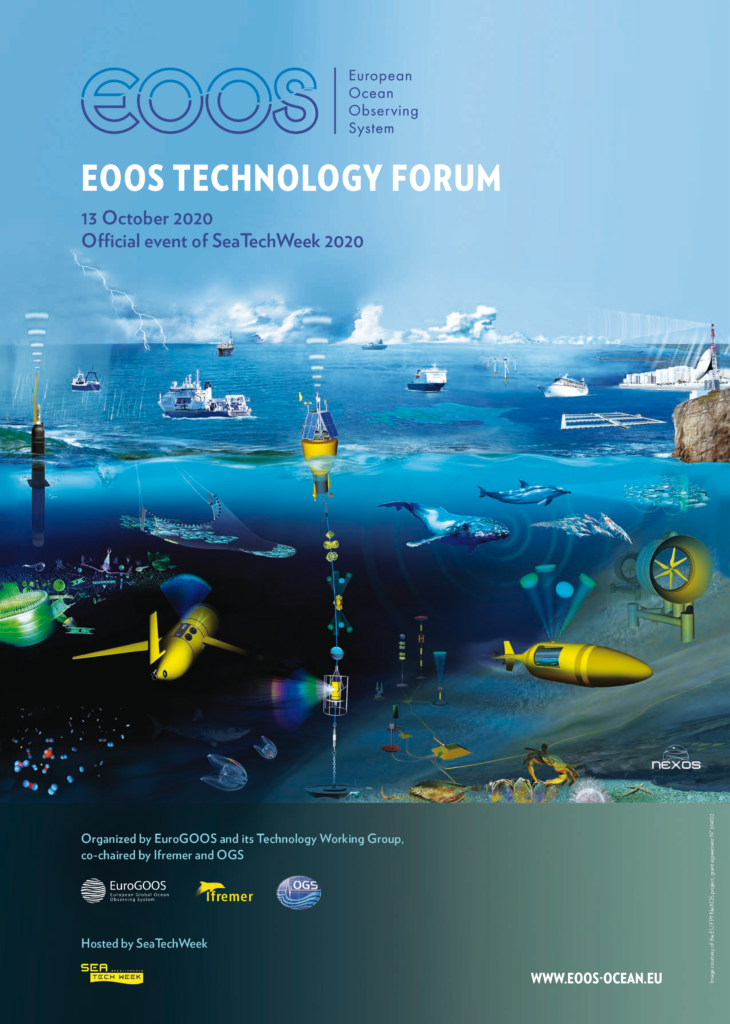 On 13 October 2020, the 1st EOOS Technology Forum was organized by EuroGOOS through its Technology Plan Working Group and hosted by SeaTechWeek as a virtual event.
On 13 October 2020, the 1st EOOS Technology Forum was organized by EuroGOOS through its Technology Plan Working Group and hosted by SeaTechWeek as a virtual event.
The Forum brought together 77 participants representing instrument manufacturers, technicians, technologists, and scientists across the public and private sectors from 11 European countries, the United States, Canada, and Argentina. Participants discussed the technological and operational aspects of ocean observing, exchanged knowledge and best practices, and explored new opportunities for collaboration. The event was divided into two 2-hour sessions which included key presentations and two interactive workshops.
Participants shared that the EOOS Technology Forum can help overcome fragmentation and facilitate collaboration by providing a permanent European platform for information exchange, building synergies, and creating a channel for enhanced visibility and accessibility. Launching a series of training sessions on ocean observing technologies under the aegis of EuroGOOS with the support of manufacturers was suggested. There was high interest in collaborative projects in the areas of sensor development, shared R&D, product improvement, development of services (e.g. calibration), and product testing. Several obstacles to fruitful collaboration were identified, including, among others, insufficient funding, poor networking, and technical barriers.
Possible ways and tools were discussed to improve the science-industry collaboration and outlined a number of key points on how the EOOS Technology Forum can help to:
- Identify current and future trends in technology, that will allow compliance with present and future ocean observational needs and requirements;
- Facilitate synergies between science and industry sectors in the field of ocean observing by promoting adequate instruments, e.g. an online tool enabling stakeholders to exchange information and identify matchmaking opportunities;
- Foster continuous dialogue and exchange between different stakeholders in the public and private sectors within the framework of a regularly held event;
- Develop shared strategies to jointly promote the value of ocean observing activities and technologies to policymakers, industry, and broader society.
The event’s summary, presentations and video recordings are available on the EOOS website.
The post Summary of the 1st EOOS Technology Forum appeared first on EuroGOOS.
Save the date for the 9th EuroGOOS International Conference, 5-6 May 2021, Brest, France
The EuroGOOS conference provides a forum of interaction between marine scientists and technologists developing operational oceanography products, and the users of these services including decision and policy-makers as well as the private sector. The EuroGOOS conference is an opportunity to review the present ocean monitoring and forecasting capacities and their services, and to identify new challenges and the underpinning science and technology priorities. The event facilitates dialogue, experience sharing and future planning with international partners and stakeholders, towards a more coordinated response to global challenges and societal needs related to seas and the global ocean.
The two-day meeting will include plenary, splinter and poster sessions, as well as round tables with focused discussions. The main outcomes of the conference will be summarized during the last day and key messages will be formulated. Participants will be invited to submit abstracts for their presentations, while full papers will be published in the EuroGOOS conference proceedings.
The conference is foreseen to take place in Brest, France, hosted by Ifremer and SHOM. Abstract submission call will open in October 2020.

The post Save the date for the 9th EuroGOOS International Conference, 5-6 May 2021, Brest, France appeared first on EuroGOOS.
Save the date for the 9th EuroGOOS International Conference, 5-7 May 2021, virtual event
The EuroGOOS conference provides a forum of interaction between marine scientists and technologists developing operational oceanography products, and the users of these services including decision and policy-makers as well as the private sector. The event is an opportunity to review the present ocean monitoring and forecasting capacities and their services, and to identify new science and technology priorities. The conference facilitates dialogue, experience sharing, and future planning with international partners and stakeholders towards a more coordinated response to global challenges and societal needs related to seas and the global ocean.
The two-day meeting will include plenary, splinter, and poster sessions, as well as round tables with focused discussions. Participants will be invited to submit abstracts for their presentations, with full papers being published in the EuroGOOS conference proceedings.
The post Save the date for the 9th EuroGOOS International Conference, 5-7 May 2021, virtual event appeared first on EuroGOOS.
Save the date for the 9th EuroGOOS International Conference, 3-5 May 2021, virtual event
The EuroGOOS conference provides a forum of interaction between marine scientists and technologists developing operational oceanography products, and the users of these services including decision and policy-makers as well as the private sector. The event is an opportunity to review the present ocean monitoring and forecasting capacities and their services, and to identify new science and technology priorities. The conference facilitates dialogue, experience sharing, and future planning with international partners and stakeholders towards a more coordinated response to global challenges and societal needs related to seas and the global ocean.
The three-day meeting will include plenary, splinter, and poster sessions, as well as round tables with focused discussions. Participants will be invited to submit abstracts for their presentations, with full papers being published in the EuroGOOS conference proceedings.
The post Save the date for the 9th EuroGOOS International Conference, 3-5 May 2021, virtual event appeared first on EuroGOOS.
EuroGOOS Ocean Literacy Network map – discover our members!
The map of the EuroGOOS Ocean Literacy Network has been released today on the occasion of the EU4Ocean platform launch event. The network brings together 20 organizations from eight European nations and three of the pan-European and global remit. We are working together with other local, regional and global partners to promote and empower the connection between responsible science and innovation and ocean literacy.
The post EuroGOOS Ocean Literacy Network map – discover our members! appeared first on EuroGOOS.
EuroGOOS Ocean Literacy Network map: discover our members!
The map of the EuroGOOS Ocean Literacy Network has been released today on the occasion of the EU4Ocean platform launch event.
The network brings together 20 organizations from eight European nations and three of the pan-European and global remit. We are working together with other local, regional and global partners to promote and empower the connection between responsible science and innovation and ocean literacy.
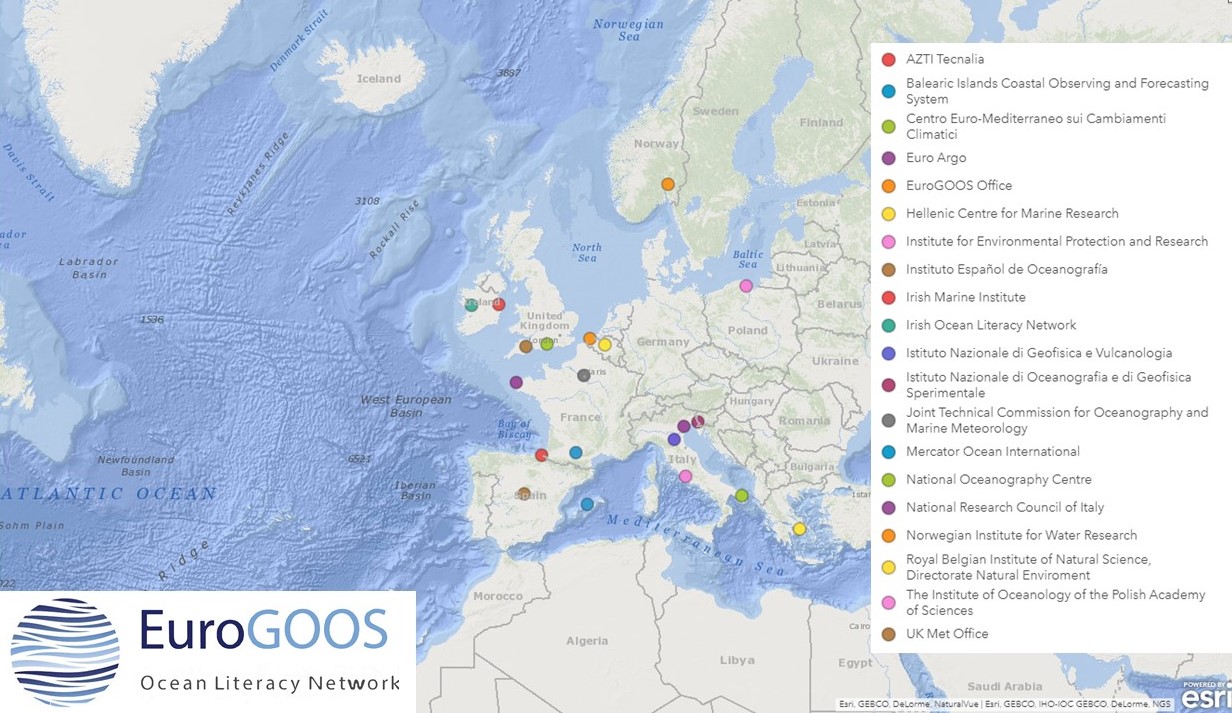
The post EuroGOOS Ocean Literacy Network map: discover our members! appeared first on EuroGOOS.
The EOOS Technology Forum to be launched at SeaTechWeek
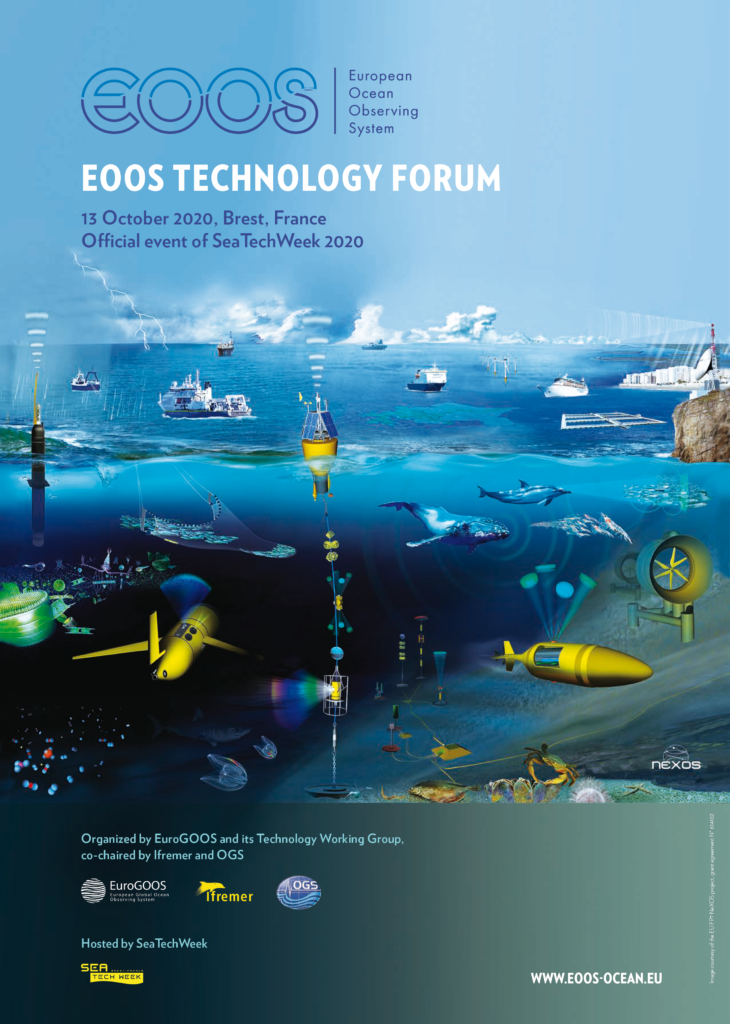 The EOOS Technology Forum aims to:
The EOOS Technology Forum aims to:
- Bring closer the marine instrument manufacturers, technicians, technologists and scientists, in the public and private sectors – to drive development and innovation in the European ocean observing technologies;
- Support regular assessments of the technological readiness in the European oceanography, with a focus on Global Ocean Observing System essential ocean variables and observation requirements;
- Identify jointly topics and themes for future actions dealing with the ocean observing technology sector.
The 1st EOOS Technology Forum is organized by EuroGOOS through its Technology Plan Working Group. It will be hosted by SeaTechWeek as a virtual event on 13 October 2020. The event will deliver a cross-cutting platform focusing on the technological and operational aspects of ocean observing. It will establish an open platform for sharing information and knowledge and identifying actionable mechanisms for collaboration and matchmaking across the participants, at both regional and international levels.
Registration details:
Participation is free of charge for the EOOS Technology Forum, held during virtual SeaTechWeek. To register, please select step 3 in the registration process and click ‘create account’ – here.
The post The EOOS Technology Forum to be launched at SeaTechWeek appeared first on EuroGOOS.
European Ocean Literacy library by EuroGOOS launched on the World Ocean Day!
For our community, the ocean is not only passion, but also our daily work. EuroGOOS brings together European oceanographic institutes, met offices, hydrographic agencies, and foundations. These organizations help to predict the weather, plan maritime activities, view real time changes in the ocean conditions, or study our climate.
EuroGOOS members also engage with citizens in their communities, countries, and regions, on the importance of the ocean and ocean research.
We conducted a survey of national Ocean Literacy activities in Europe and have seen their incredible diversity, from programmes, to festivals and competitions, school workshops, books, films, artworks, and games… Topics range from biodiversity, to pollution, environmental management, blue economy, climate, technologies, or promotion of gender balance and diversity.
This first European Ocean Literacy resources library has been launched on the occasion of the first UNESCO-IOC Ocean Literacy Summit, of which EuroGOOS is a proud co-organizer, on 8 June 2020, the World Ocean Day.
Our Ocean Literacy resource base is growing fast and we hope it will inspire and engage scientists and citizens alike!
The post European Ocean Literacy library by EuroGOOS launched on the World Ocean Day! appeared first on EuroGOOS.
EuroGOOS Kostas Nittis award to a young marine scientist – call open!
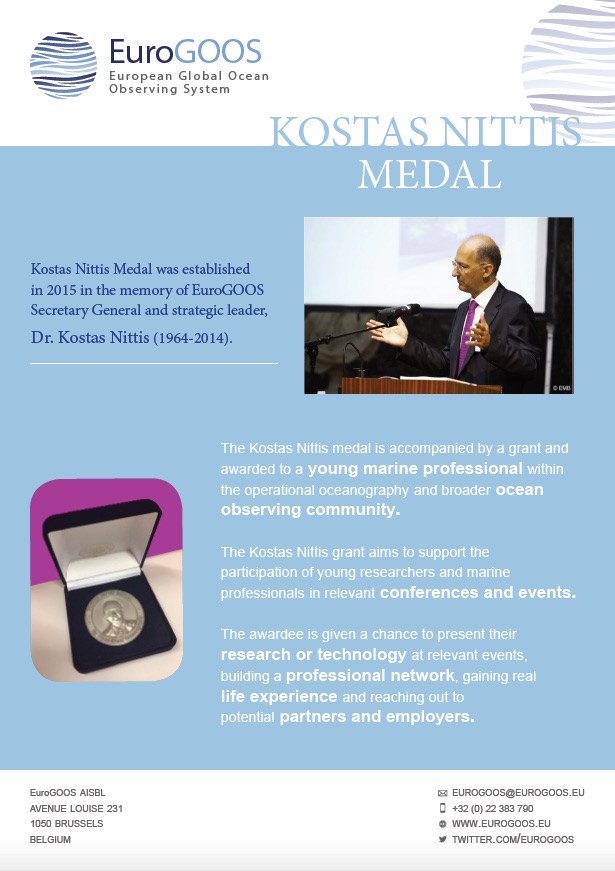 The Kostas Nittis Medal was established in memory of EuroGOOS Secretary General and strategic leader Dr. Kostas Nittis (1964-2014). The Kostas Nittis Medal is accompanied by a grant awarded to an early career marine scientist within operational oceanography and broader ocean observing.
The Kostas Nittis Medal was established in memory of EuroGOOS Secretary General and strategic leader Dr. Kostas Nittis (1964-2014). The Kostas Nittis Medal is accompanied by a grant awarded to an early career marine scientist within operational oceanography and broader ocean observing.
The Kostas Nittis Medal and the grant amounting to € 3,000 aim to support the participation of early career marine scientists in relevant conferences and events. The awardee is thus given a chance to present their research work at relevant events, building a professional network, gaining real life experience and reaching out to potential research and technological partners and/or future employers.
The call is open to marine students younger than 30 years old on the day of the nomination deadline (extensions are possible in some cases, please see the terms of reference). Candidate must be a student at a Master of Science, PhD level, or recent PhD, carrying out research or innovation projects in the broad domain of climate change, marine safety, ecosystem and ocean health, or operational oceanography (ocean observations, ocean data, numerical modelling, operational ocean services, etc). Nominations should come from a EuroGOOS member organization.
Deadline for nominations: 30 October 2020
Download the terms of reference:
 EuroGOOS YoungScientistMedal ToR 2020 (160.3 KiB)
EuroGOOS YoungScientistMedal ToR 2020 (160.3 KiB)
The post EuroGOOS Kostas Nittis award to a young marine scientist – call open! appeared first on EuroGOOS.
How the COVID-19 crisis affects information on the state of our environment?
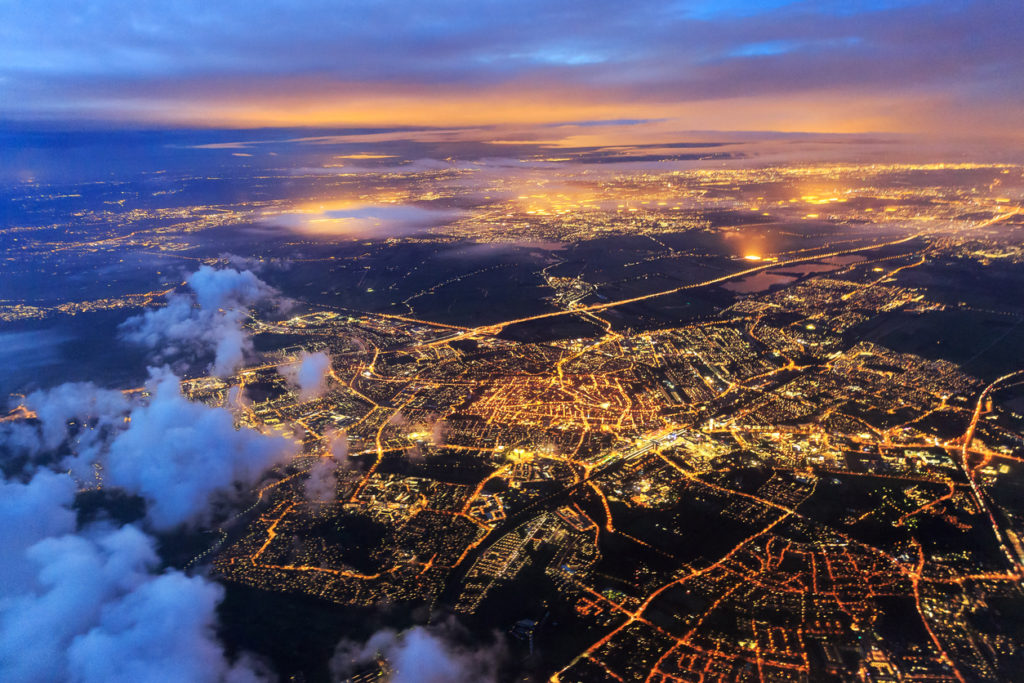 The COVID-19 pandemic has affected all areas of our lives, but only some of them are clearly visible to the public. One of such hidden effects is related to the acquisition of environmental data.
The COVID-19 pandemic has affected all areas of our lives, but only some of them are clearly visible to the public. One of such hidden effects is related to the acquisition of environmental data.
Many areas of the environmental data collection have been affected by the ongoing pandemic. Aircraft-based observations of temperature and wind have been hit the hardest by the COVID-19 crisis. These observations (known as AMDAR reports) are down by about 78% globally and 90% over Europe. Responding to this, National Meteorological Services have increased the number of radiosonde daily launches.
The COVID-19 crisis has also spiraled gaps in other types of data. While most ground-based weather stations or moored buoys are automatic, maintaining them requires engineering, e.g. people that can travel on-site regularly and work in calibration laboratories, which in some countries has been severely compromised due to strict lockdowns.
Data provided by in situ observing systems require several stages of quality control. If some can be automated, a lot of them need manual intervention from staff that may not be able to telework with the same capacities as usual.
Automatic stations like high-frequency radars, tide gauges, anchors, argo floats, gliders, and drifting buoys are currently maintaining their operation, but a medium-term concern could come from the lack of maintenance of these stations, stopped during the present situation, that may affect the data delivery later in autumn and winter.
A decrease has been detected in marine observations from ferryboxes and research vessels since most vessels have returned to port. The reduction in data streams is observable at both global and regional scale, and particularly in the Arctic. Stopping the research vessels activities will affect all types of data collection, from physical to biological and biogeochemical.
Depending on the country, the European research vessels are expected to resume their activities between June and September. This together with the temporary closure of some instrument manufacturers may also impact the deployment of Argo floats and drifter floats, leading to a potential decrease in the number of observations in the coming months. Data providers are currently identifying the geographical areas where gaps in the spatial distribution of floats would form – to prioritize deployments in these areas.
Modern data assimilation systems can mitigate part of the reduction of the in situ data, but this is not the case for the collection of climate time series. Any reduction in this data collection will have a negative effect and some gaps will not be recoverable.
A significant part of the in situ data collection is based on time-limited research projects and national funding. It is important to maintain that funding despite additional new priorities linked to Corona-related research or economic recovery plans. Several EU Copernicus services have detected various degrees of risks linked to the in situ data gaps resulted from the COVID-19 crisis. These risks are being evaluated in both short, medium, and long run, as the repercussions of the crisis will be seen through a long period of time.
This article was prepared by EuroGOOS for the Copernicus In Situ website, where it was published on 18 May 2020. The article is based on expert contributions from the Copernicus Marine, Climate, and Atmosphere Services, as well as EUMETNET.
The post How the COVID-19 crisis affects information on the state of our environment? appeared first on EuroGOOS.
1st Ocean Literacy Summit to take place on the UN World Ocean’s Day, 8 June 2020
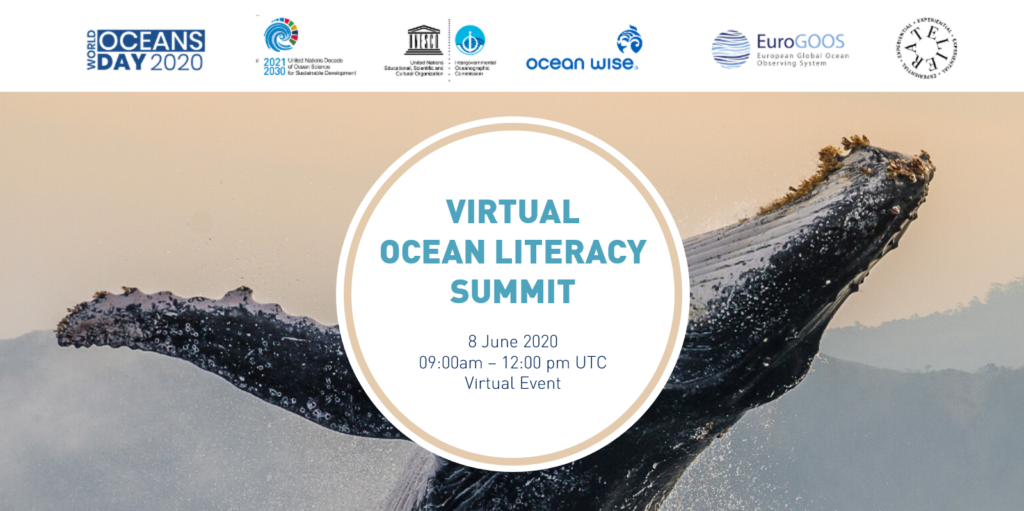 On the occasion of World Oceans Day, UNESCO’s Intergovernmental Oceanographic Commission, in collaboration with Ocean Wise, EuroGOOS, and Experiential Atelier, organizes the first Virtual Ocean Literacy Summit. In 2020, we are celebrating people, projects and programmes related to “Innovation for a Sustainable Ocean”. As part of a fundamental tool to enhance capacity development, ocean literacy aims to transform ocean knowledge into innovative actions and ideas.
On the occasion of World Oceans Day, UNESCO’s Intergovernmental Oceanographic Commission, in collaboration with Ocean Wise, EuroGOOS, and Experiential Atelier, organizes the first Virtual Ocean Literacy Summit. In 2020, we are celebrating people, projects and programmes related to “Innovation for a Sustainable Ocean”. As part of a fundamental tool to enhance capacity development, ocean literacy aims to transform ocean knowledge into innovative actions and ideas.
Ocean Literacy (OL) is defined as ‘the understanding of human influence on the Ocean and the Ocean’s influence on people’. OL is not only about increasing awareness of the state of the ocean, but it is also about providing tools and approaches that can transform ocean knowledge into actions that promote ocean sustainability. OL is radically evolving from being a tool to be applied only in the context of formal education and training to an approach for society as a whole, aimed at triggering actions towards ocean sustainability. OL can be led by a broad range of stakeholders and have a wide variety of beneficiaries.
In the context of the UN Decade of Ocean Science for Sustainable Development 2021 – 2030, OL is expected to play a key role to transform ocean knowledge to action. As part of the Decade, OL will help to advance sustainable production practices, develop evidence based public marine policy, influence the ocean science research agenda by identifying the science questions that are most relevant to society, promote a more responsible citizenry, and encourage young people to start a career in the ocean economy or in marine science. Moreover, the Decade aims to encourage the science community, governments, policymakers, funders and resource providers, the private sector, and civil society to think beyond “business as usual” and aspire for real change leading to concrete actions and solutions.
The Summit is being organized by the Intergovernmental Oceanographic Commission (IOC) of UNESCO in partnership with OceanWise, EuroGOOS, and Experiential Atelier and in collaboration with: IPMEN, COSEE, CaNOE, NMEA, Australian Marine Education Network, Ocean Literacy Italia, Direção-Geral de Política do Mar, Aquamater, Asia Marine Educators Association, Irish Ocean Literacy Network, Oceano Azul Foundation, Ciência Viva, Universidade Federal de São Paulo, Red de Educación Latinoamericana para el Océano, and OL4All.
EuroGOOS is actively promoting the importance of OL for sustainability, as well as sustained ocean observing, effective science-policy interfaces, and user-focused maritime applications. In 2019, these efforts resulted in the establishment of the EuroGOOS Ocean Literacy Expert Group which currently brings together 19 organizations, both national and international, spanning all EuroGOOS sea regions.
Date and time: 8 June 2020, 11am-14pm CEST
Registration and further information on the event’s page
The post 1st Ocean Literacy Summit to take place on the UN World Ocean’s Day, 8 June 2020 appeared first on EuroGOOS.
9th International EuroGOOS Conference: call for abstracts open
Abstract submission is open for the 9th EuroGOOS International Conference, Advances in
Operational Oceanography: Expanding Europe’s ocean observing and forecasting capacity, to
take place in Brest, France, from 14 to 15 October 2020. The event will be hosted by SeaTech Week. The EOOS Technology Forum, organized by EuroGOOS, will be held at SeaTech on 13 October 2020.
- Abstract submission is online at conference website.
- Abstracts should pertain to one of the conference themes and topics detailed in this announcement.
- Deadline for submitting abstracts: 31 May 2020; Authors will be notified of acceptance/rejection before mid-July 2020.
- Full papers of approved abstracts should be delivered to EuroGOOS by 31 August 2020 for publication in the EuroGOOS 9th International Conference Proceedings.
The European Global Ocean Observing System, EuroGOOS, was established in 1994 to “make sure that the global infrastructure of GOOS is designed so as to guarantee the required data products
and benefits needed by Europe” (ECOPS 1994). Since then EuroGOOS has been developing operational oceanography in Europe in the framework of the UNESCO’s Intergovernmental
Oceanographic Commission Global Ocean Observing System programme (IOC GOOS).
Every three years the EuroGOOS conference provides a forum of interaction between marine scientists and technologists developing operational oceanography products, and the users of these services including decision and policy-makers as well as the private sector.
The EuroGOOS conference provides the opportunity to review the present ocean monitoring and forecasting capacities and their services, and to identify new challenges and the underpinning
science and technology priorities. The conference facilitates dialogue, experience sharing and future planning with international partners and stakeholders, towards a more coordinated response to global challenges and societal needs related to seas and the global ocean.
Visit the conference website
Download the conference call for abstracts
 EuroGOOS 9th Conference 2020 Call For Abstracts (1.6 MiB)
EuroGOOS 9th Conference 2020 Call For Abstracts (1.6 MiB)

The post 9th International EuroGOOS Conference: call for abstracts open appeared first on EuroGOOS.
EuroGOOS welcomes new Secretary General Dr. Inga Lips
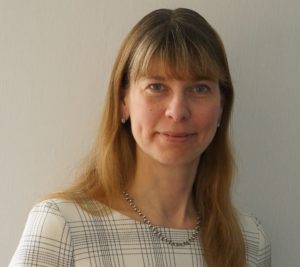 Dr. Inga Lips has joined EuroGOOS as new Secretary General. Dr. Lips has 24-year experience in marine science managing national and international programmes and activities. Before joining EuroGOOS, Inga worked at the Tallinn University of Technology where she established and led the marine ecology lab and initiated several new study fields, among others on microplastics and plankton genomics. She also innovatively combined biological and physical oceanography, integrating traditional ship-based measurements and laboratory analysis with autonomous measuring and sampling platforms.
Dr. Inga Lips has joined EuroGOOS as new Secretary General. Dr. Lips has 24-year experience in marine science managing national and international programmes and activities. Before joining EuroGOOS, Inga worked at the Tallinn University of Technology where she established and led the marine ecology lab and initiated several new study fields, among others on microplastics and plankton genomics. She also innovatively combined biological and physical oceanography, integrating traditional ship-based measurements and laboratory analysis with autonomous measuring and sampling platforms.
As the EuroGOOS community of members, regions (ROOS), task teams and working groups, extend their warm welcome to Dr. Lips, we note that this is the first woman at the head of the EuroGOOS office in its 26 years of history.
We thank Dr. Glenn Nolan who has been holding this position since 2015. Glenn has expanded our membership, advanced the strategy, and helped transform EuroGOOS into a more impactful association, responding to the needs of policy and stakeholders. We wish Glenn best of luck in the continuation of his career at the Irish Marine Institute.
The post EuroGOOS welcomes new Secretary General Dr. Inga Lips appeared first on EuroGOOS.
New positions open at the EuroGOOS Secretariat!
EuroGOOS is seeking enthusiastic professionals to fill two new positions at the EuroGOOS Secretariat. Place of work is the EuroGOOS office in the Brussels European district.
- Science Officer to support the EuroGOOS team in activities linked to the coordination of the European ocean observing and forecasting. The position is for 4 years.
- Communications Officer to support the EuroGOOS team, members and regional networks in communications, outreach and organizational tasks. The position is for 3,5 years.
Contact eurogoos [@] eurogoos.eu for further details. Application details are included in the announcements.
The post New positions open at the EuroGOOS Secretariat! appeared first on EuroGOOS.
New positions open at the EuroGOOS Secretariat
 EuroGOOS is seeking enthusiastic professionals to fill two new positions at the EuroGOOS Secretariat. Place of work is the EuroGOOS office in the Brussels European district.
EuroGOOS is seeking enthusiastic professionals to fill two new positions at the EuroGOOS Secretariat. Place of work is the EuroGOOS office in the Brussels European district.
- Science Officer to support the EuroGOOS team in activities linked to the coordination of the European ocean observing and forecasting. The position is for 4 years.
 EuroGOOS Science Officer Job Profile April 2020 (134.1 KiB)
EuroGOOS Science Officer Job Profile April 2020 (134.1 KiB) - Communications Officer to support the EuroGOOS team, members and regional networks in communications, outreach and organizational tasks. The position is for 3,5 years.
 EuroGOOS Communications Officer Job Profile April 2020 (131.7 KiB)
EuroGOOS Communications Officer Job Profile April 2020 (131.7 KiB)
Contact eurogoos [@] eurogoos.eu for further details. Application details are included in the announcements.
The post New positions open at the EuroGOOS Secretariat appeared first on EuroGOOS.
Responsible Research and Innovation in Ocean Observing and Forecasting
The EU project EuroSea has delivered a fact sheet on Responsible Research and Innovation in the realm of ocean observing and forecasting activities. Responsible Research and Innovation helps to plan and carry out research and engagement in close cooperation with all relevant stakeholders to ensure maximum benefit is derived from co-design, sharing and endorsement of the research results. Responsible Research and Innovation enables a participative approach helping to collect feedback from your stakeholders, increasing awareness of the ocean observing and forecasting system requirements, and maximizing the impact of your efforts. The fact sheet was prepared by EuroSea Work Package 8, co-led by EuroGOOS and GEOMAR.
Download the EuroSea fact sheet Responsible Research and Innovation in Ocean Observing and Forecasting:
The post Responsible Research and Innovation in Ocean Observing and Forecasting appeared first on EuroGOOS.
EuroGOOS is seeking a Communications Assistant
EuroGOOS Office seeks a Communications Assistant to support the EuroGOOS team in communications, outreach and organizational tasks. The job is based in Brussels at the EuroGOOS Office premises.
Position responsibilities will include website content management, maintaining social media presence, drafting documents, publication pre-press, dissemination and mailing, production of corporate give-aways, etc. The incumbent will be also required to support the EuroGOOS team in meeting organization and facilitate internal operations, including clerical duties, filing documents, and disseminating information.
Deadline for applications: 31 March 2020
Download the job advertisement for all the details:
 EuroGOOS Communications Assistant Job Profile March 2020 (131.3 KiB)
EuroGOOS Communications Assistant Job Profile March 2020 (131.3 KiB)
The post EuroGOOS is seeking a Communications Assistant appeared first on EuroGOOS.
EuroGOOS Operational Modelling Inventory in European Seas
The EuroGOOS Coastal Working Group delivered an overview and analysis of the operational modelling capacities in the European seas and recommendations for improvements. The study has been published in Frontiers in Marine Science Journal (see here). The analysis was based on the contributions from 49 organizations around Europe, representing more than 100 operational model systems simulating hydrodynamics and biogeochemistry in the European seas. The study highlights the strengths and weakness of the current capacities from an operational point of view and makes recommendations towards improvement of the European operational modelling services.
The EuroGOOS Coastal Working Group proposes a set of recommendations to foster the marine and coastal operational modelling capacity in Europe, building on the ongoing integration efforts within the EuroGOOS Operational Oceanographic Systems (ROOS) and the broader EuroGOOS communities.
The paper calls for better forcing, more data assimilation, and sharing standards in the European operational modelling. Modelling of biogeochemical phenomena needs to be improved to enable a proper monitoring of the EU Marine Strategy Framework Directive (MSFD) and the Water Framework Directive (WFD) indicators, and to support blue economy activities. Stronger collaboration between atmosphere, land, marine and social research communities is critical to homogenize and enhance the quality of operational products at those domains’ interfaces.
Data access and timeliness have been identified as a bottleneck for efficient data assimilation in operational modelling. The uptake of assimilation practices is also limited due to the lack of technical expertise. Capacity building, through training or allocation of additional human resources, is needed. Promotion of ocean modelling and data assimilation in early career scientist programmes, summer schools, national and European master programmes is advised.
Increased spatial resolution is another priority to improve the accuracy of operational modelling systems. But to increase spatial resolution can not effectively enhance simulation accuracy if this effort is not complemented with improvements of coastline, bathymetry, atmospheric, and land forcings in the models.
The paper recommends to systematically run large-angle capacity survey like the one conducted by the EuroGOOS Coastal Working Group, to keep the finger on the pulse of the evolving user needs and modelling capacities. EuroGOOS, through its Coastal Working Group, will envisage a regular update of the current survey.
The post EuroGOOS Operational Modelling Inventory in European Seas appeared first on EuroGOOS.
The UN Ocean Decade Preparations
The EuroGOOS office attended the regional preparatory workshops for three sea basins most linked to the EuroGOOS activities: the North Atlantic, the Mediterranean, and the Arctic, within the preparations for the UN Decade of Ocean Science for Sustainable Development 2021-2030 (UN Ocean Decade). All meetings took place in January 2020. There has been so far eight regional workshops for the Decade all around the globe.
The Ocean Decade Executive Planning Group is compiling the first version of the Decade’s Implementation Plan comprising: a Science Action Plan, a Capacity Development Plan, a Governance Plan, and a Communications Plan. EuroGOOS has been contributing to the Science Action Plan through the regional workshops. It has been widely agreed that strong stakeholder engagement and targeted communications are essential for the success of the Decade. Therefore, the EuroGOOS office is also contributing to the Decade’s Communications Plan, which will underpin the stakeholder engagement activities, as well as to the Ocean Literacy Strategy, supporting the Decade’s ambitions to strengthen the understanding of the societal impacts of all ocean science disciplines.
The regional workshops for the North Atlantic, the Mediterranean, and the Arctic were structured to address the six Decade’s societal relevance areas through dedicated brainstorming sessions:
- A clean ocean where sources of pollution are identified and removed;
- A healthy and resilient ocean where marine ecosystems are mapped and protected;
- A predictable ocean where society has the capacity to understand current and future ocean conditions;
- A safe ocean where people are protected from ocean hazards;
- A sustainably harvested ocean ensuring the provision of food supply; and
- A transparent ocean with open access to data, information and technologies.
At the North Atlantic workshop (7-10 January, Halifax, Canada), one of the emerging ideas put forward was the concept of Ocean 5D which would feature any available ocean data in a portal displaying x,y,z, and time as the users selected parameter/essential ocean variable of interest. The Ocean Infohub developed by the IOC’s International Oceanographic Data and Information Exchange (IODE) was discussed. EuroGOOS will attend the forthcoming planning meeting in Ostend on 18-20 May 2020. A strong theme from the meeting, building on outputs from OceanObs’19, was that the views and inherent knowledge of the traditional knowledge holders need to be factored into the planning for the Decade. EuroGOOS Secretary General Glenn Nolan contributed to the meeting’s programme as panelist. Find the North Atlantic workshop presentations and other documents here.
At the Mediterranean workshop (21-23 January, Venice, Italy), the diversity and richness of activities in the basin was well covered in the programme, spanning plenary and flash talks in breakouts from pan-European, regional and intergovernmental networks and organizations active in the area. It was stressed that the Med is a melting pot of many processes and impacts, and the changes are happening at a faster rate than in other basins. An idea for an Ocean Decade programme for the Global Coastal Ocean was put forward at the event. Italy’s commitment to the Ocean Decade was shared by several high level representatives including the Italian Ambassador to UNESCO. EuroGOOS Senior Policy and Communications Officer Dina Eparkhina contributed to the meeting’s programme as panelist, while many EuroGOOS members represented ocean observing and forecasting efforts in the basin. The EuroGOOS Mediterranean region (MONGOOS) was also represented by Chair Vanessa Cardin. Find the Mediterranean workshop presentations and other documents here.
At the Arctic workshop (29 January, Tromsø, Norway), data access and data gaps in the region were stressed as well as the importance of sustained and integrated ocean monitoring system in the Arctic. Gaps in the long time series measurements were also mentioned along with the need to link research and monitoring programmes. Second Decade preparatory workshop for the Arctic will be held in Copenhagen on 29 April – 1 May 2020. EuroGOOS Science Officer Vicente Fernandez attended the first Arctic workshop, while the second one will be attended by Erik Buch, EuroGOOS Senior Consultant. Find further information about the Arctic workshop in January here.
In his introductory speeches at these regional workshops, Vladimir Ryabinin, IOC Executive Secretary, mentioned the EuroGOOS sustainability study results. The study was led by EuroGOOS within the contract with the European Environmental Agency for the coordination of the Copernicus In Situ Component. It shows remarkable differences in the funding of observations and indicates a direct link between the source of funding and the funding sustainability. For most meteorological observations, the funds are provided sustainably by national institutions, while for most of atmospheric composition and ocean observations, the main bulk of funding comes from short-term or research projects and is claimed unsustained in the long term.
Find out more about the UN Decade of Ocean Science for Sustainable Development here.
The post The UN Ocean Decade Preparations appeared first on EuroGOOS.
Contributing to the Ocean Literacy Framework in the UN Ocean Decade
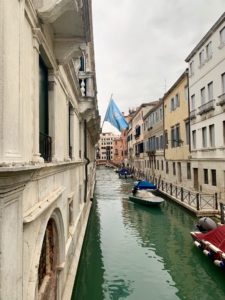 EuroGOOS’ Dina Eparkhina, initiator and facilitator of the EuroGOOS Ocean Literacy Network, represented our efforts at the UNESCO brainstorming for the Ocean Literacy Framework for the UN Decade of Ocean Science for Sustainable Development.
EuroGOOS’ Dina Eparkhina, initiator and facilitator of the EuroGOOS Ocean Literacy Network, represented our efforts at the UNESCO brainstorming for the Ocean Literacy Framework for the UN Decade of Ocean Science for Sustainable Development.
The Ocean Literacy Framework design considers the goal of engaging all members of society within the UN Decade. It assumes the fact that Ocean Literacy, in its broadest sense, can spearhead engagement and ownership across all types of stakeholders, and hence provide a critical pathway for implementation and adoption of the UN Decade.
Draft document presenting the framework is available here.
The post Contributing to the Ocean Literacy Framework in the UN Ocean Decade appeared first on EuroGOOS.
Our 2019 highlights in this festive season
Thank you 2019! At our General Assembly in May we had the honour of welcoming three new members to our organisation, SHOM, France, PLOCAN, Spain, and NIVA, Norway. This brings our overall membership to 44 organizations spanning oceanographic institutes, met offices and hydrographic agencies in 18 European countries.
In 2019 we have contributed to a great many ocean community events on behalf of our member organizations and the EuroGOOS Regional Oceanographic Systems (ROOS) which unite almost 100 ocean observing organizations across five European maritime regions. Of particular note is OceanObs’19 in Honolulu where we had an exhibition stand for the broad EuroGOOS community and participated in many conference sessions. We have also been active in the planning for the UN Decade of Ocean Science for Sustainable Development through the planning workshops. We held the chairmanship of the Global Ocean Observing System (GOOS) Regional Alliances Forum for the past two years. This mandate has now ended and we are happy to hand it to our counterpart the Indian Ocean GOOS Region.
EuroGOOS has established an Ocean Literacy working group that already involves 16 member organisations and is growing and building partnerships in Europe and globally. The working group has launched a survey on the Ocean Literacy efforts in European oceanography. The survey shows an incredible wealth of active work on engaging with society on the importance of ocean observations, predictions, services, and technologies. We will release a state of play summary in 2020. We are contributing to the Ocean Literacy strategy for the UN Ocean Decade.
2019 also saw the development of new projects involving both the EuroGOOS office and our member organizations across the five EuroGOOS regions. The EuroSea project will strengthen Europe’s overall ocean observing value chain in the coming four years and contribute to the G7 Future of the Seas and Oceans Initiative. We were fortunate to receive new support for the JERICO coastal observation research infrastructure through the JERICO S3 project. The FORCOAST project will advance the market uptake of oceanographic services and support the activities of the EuroGOOS Coastal working group. Our work with the European Environment Agency on in situ coordination for the Copernicus services continues. We also continue to co-chair the EOOS framework steering group hand in hand with the European Marine Board.
Since November, the EuroGOOS office has been hosted by the Royal Belgian Institute of Natural Sciences (RBINS) located close to the European Parliament in the heart of the Brussels EU quarters. The generous hosting of the EuroGOOS office by BELSPO on avenue Louise expired earlier this year. We are grateful to the Belgian Federal Government and RBINS for their continuous support to EuroGOOS.
We look forward to a fruitful and exciting 2020. This will be the first year of the new European Commission and Parliament, and the EU Green Deal which we hope will strengthen even further Europe’s global role in ocean and climate science and sustainable blue economy. And this will be the last year of the preparations for the UN Ocean Decade, which will be a unique opportunity for the global ocean community to generate societal awareness of the ocean’s role strengthening science for sustainable development. In 2020, EuroGOOS will launch its 2030 strategy with a set of ambitious goals for our broad community, building on the 25 years of the EuroGOOS rich history.
We wish you all a happy new year 2020!
The post Our 2019 highlights in this festive season appeared first on EuroGOOS.
Earth Observations services for the European coasts: new Copernicus market uptake project FORCOAST
FORCOAST, a Copernicus market uptake project, had its kick-off meeting in Schevening, the Netherlands, on 26-27 November. The project is coordinated by the co-chair of the EuroGOOS Coastal Working Group Ghada El Serafy, Deltares. FORCOAST is receiving €2 million from the EU Horizon 2020 programme to develop oceanographic products for the European aquaculture, wild fisheries and oyster restoration sectors, based on the Copernicus Earth Observation products, in situ data and national numerical models. 21 organizations from 9 countries spanning research, academia and SMEs form the FORCOAST consortium which was instigated by the EuroGOOS Coastal Working Group. In addition, EuroGOOS office is also partner in the consortium, providing a pan-European perspective on products design and stakeholder engagement and visibility.
FORCOAST will develop services in eight pilot sites in the North Sea, Baltic Sea, Mediterranean, Black Sea, and the Iberian Atlantic. The project is supporting advanced data management and cloud computing for Copernicus-based downstream services utilizing Copernicus Data and Information Access Services (DIAS). The availability and accessibility of data and derived products generated in the project will stimulate exploitation by a wide range of users in the targeted industries. Partnership with SMEs is at the core of FORCOAST ensuring the market applications and services for coastal sectors will continue after the end of the project.
The EuroGOOS office is co-leading the FORCOAST work package 7 on marketing and communications and is involved in work packages on user engagement and requirements (WP2) and service design (WP3). FORCOAST brings together many EuroGOOS member organizations and many of the EuroGOOS Coastal Working Group members. The broader EuroGOOS community will be involved through the FORCOAST Stakeholder Advisory Board which will be set up soon.
FORCOAST is funded by the European Union H2020 research and innovation program under the grant agreement 870465.
Discover FORCOAST via Twitter. The website will be released soon.
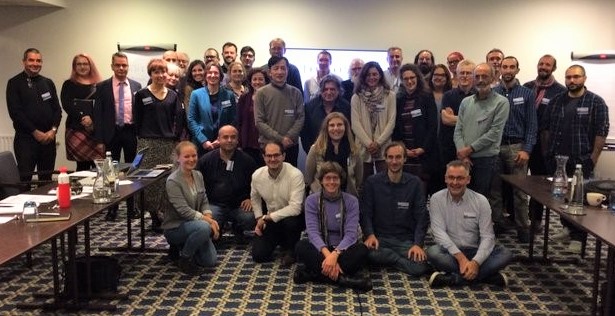
FORCOAST consortium at the project’s kick-off meeting, 26 November 2019, Schevening
The post Earth Observations services for the European coasts: new Copernicus market uptake project FORCOAST appeared first on EuroGOOS.
Ocean knowledge & services for sustainable development: Horizon 2020 EuroSea project kicks off
55 ocean observing, data and modelling organizations are meeting in Brussels this week at the kick-off of a new European project EuroSea. EuroSea is an innovation action receiving €12.6 million from the EU Horizon 2020 programme. “The aim of the project is to better combine existing capacities in the European ocean observing, fill existing gaps and make the resulting data and information available to users more easily,” said the EuroSea coordinator Dr. Toste Tanhua of the GEOMAR Helmholtz Centre for Ocean Research Kiel.
Partners in the EuroSea consortium are both scientific institutions and private organizations from 13 European countries, Brazil and Canada. In addition, there are international institutions and networks such as the World Meteorological Organization (WMO), the Intergovernmental Oceanographic Commission of UNESCO (IOC-UNESCO), the European Marine Board and the European part of the Global Ocean Observing System – EuroGOOS. Partnerships with industry will allow EuroSea to develop fit-for-purpose ocean technologies and services and secure their continuation after the end of the project.
EuroSea will not only improve ocean observations, it will also focus on the quality and usability of the collected data, and on operational forecast services. EuroSea builds on the achievements of the Horizon 2020 AtlantOS project and continues the work begun there in all European sea basins and across the Atlantic.
“We want to pave the way for a sustained ocean observing system that not only provides researchers, but also users such as fisheries, aquaculture, coastal protection, offshore energy generation and ultimately the public with the information they need and demand. In doing so, we are also contributing to the United Nations’ sustainable development goals, the UN Decade for Ocean Science for Sustainable Development, and the G7 Initiative Future of the Seas and Oceans,” said Dr. Tanhua.
EuroGOOS is co-leading the EuroSea work package 1 on governance and is leading work package 8 on communication spanning engagement, dissemination, exploitation and legacy. EuroSea brings together many EuroGOOS members and the broader EuroGOOS community across the EuroGOOS regions, ROOS, and the task teams. Five of the EuroGOOS task teams contribute to the EuroSea work package on networks integration (WP3) which is co-chaired by EuroGOOS chair George Petihakis (HCMR).
The EurSea project kick-off is hosted by the Royal Belgian Institute of Natural Sciences (RBINS) and organized by GEOMAR, RBINS and EuroGOOS.
EuroSea is funded by the European Union in the framework of The Future of Seas and Oceans Flagship Initiative, under the grant agreement 862626.
Discover EuroSea on the project’s website and via Twitter.
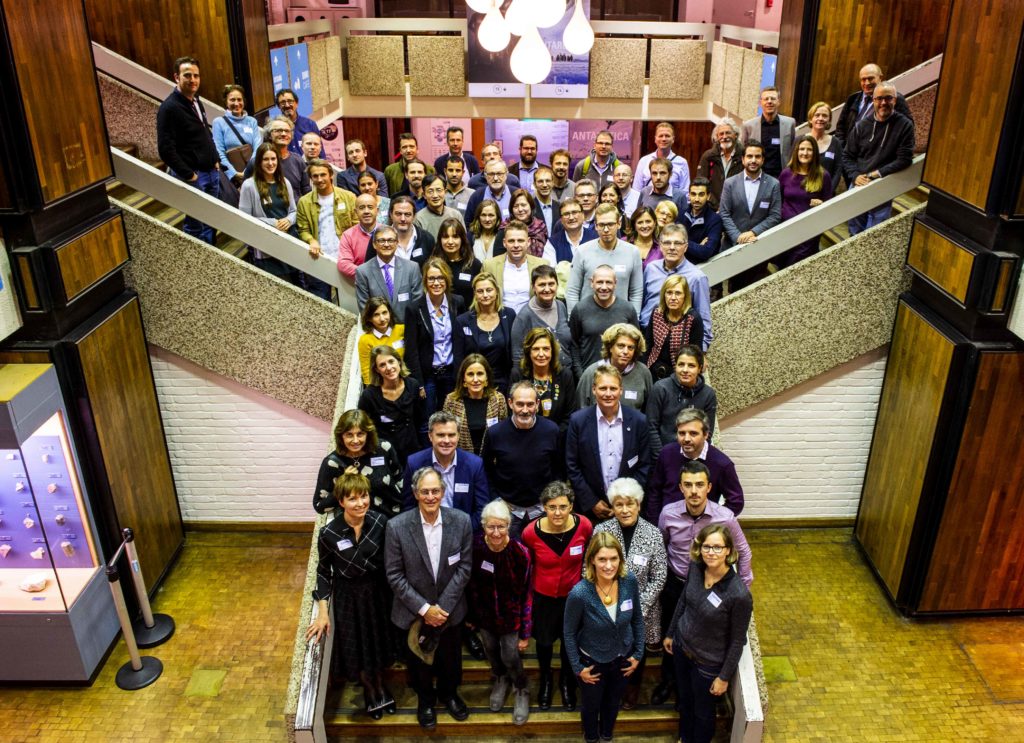
EuroSea consortium at the project’s kick-off meeting, 27 November 2019, Brussels
The post Ocean knowledge & services for sustainable development: Horizon 2020 EuroSea project kicks off appeared first on EuroGOOS.
The EuroGOOS 2019 Kostas Nittis medal and grant winner announced
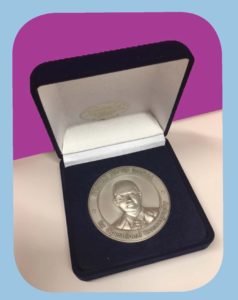 María Dolores Pérez Hernández has been selected as the winner of this year’s EuroGOOS Kostas Nittis medal and travel grant. The Kostas Nittis medal and the grant amounting to € 3,000 aim to support the participation of early career marine scientists in relevant conferences and events. The awardee is thus given a chance to present their research work at relevant events, building a professional network, gaining real life experience and reaching out to potential research and technological partners and future employers.
María Dolores Pérez Hernández has been selected as the winner of this year’s EuroGOOS Kostas Nittis medal and travel grant. The Kostas Nittis medal and the grant amounting to € 3,000 aim to support the participation of early career marine scientists in relevant conferences and events. The awardee is thus given a chance to present their research work at relevant events, building a professional network, gaining real life experience and reaching out to potential research and technological partners and future employers.
The award recognizes María’s work advancing the understanding of the global ocean dynamics and variability using a combination of in situ observations (including ship-based and autonomous observing platforms) and satellite data, complementing observations with numerical models. Her findings on the Canary current re-circulation, strongly linked with the seasonal cycle of the Atlantic Meridional Overturning Circulation (AMOC), are extremely relevant to not only physical oceanography but also to coastal ecosystems, fish stocks and storm tracks. The jury has also recognized Maria’s sea-going experience and outstanding data processing and analysis demonstrated by her publication record and her capacity to carry out outreach activities. Discover Maria’s blog here.
Maria has been invited to attend the kick-off meeting of the new European Commission’s Horizon 2020 project EuroSea, taking place in Brussels on 27-29 November 2019, where she will be awarded the medal.
The post The EuroGOOS 2019 Kostas Nittis medal and grant winner announced appeared first on EuroGOOS.
New site for NL astronomical tide
Rijkswaterstaat has changed the portal for astronomical tide”:
http://waterinfo.rws.nl/#!/kaart/astronomische-getij/

The IPCC Special Report on the Ocean and Cryosphere in a Changing Climate released
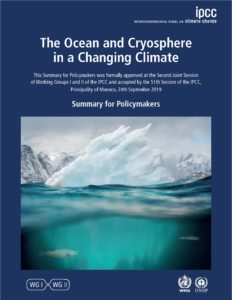 The Intergovernmental Panel on Climate Change (IPCC) released its Special Report on the Ocean and Cryosphere in a Changing Climate (SROCC). More than 100 scientists from 30 countries contributed to the SROCC. The report highlights the need for urgent, ambitious, and coordinated action to address unprecedented and enduring changes in the planet’s ocean and cryosphere.
The Intergovernmental Panel on Climate Change (IPCC) released its Special Report on the Ocean and Cryosphere in a Changing Climate (SROCC). More than 100 scientists from 30 countries contributed to the SROCC. The report highlights the need for urgent, ambitious, and coordinated action to address unprecedented and enduring changes in the planet’s ocean and cryosphere.
“If we reduce emissions sharply, consequences for people and their livelihoods will still be challenging, but potentially more manageable for those who are most vulnerable. We increase our ability to build resilience and there will be more benefits for sustainable development”, said IPCC Chair Hoesung Lee at the report’s launch in Monaco on 25 September.
The report presents a comprehensive overview of physical and ecosystem changes in the ocean and cryosphere with their direct repercussions on society. SROCC predicts increases in the ocean warming, acidification, hypoxia, extreme weather events and sea-level rise. Findings include predicted species distribution shifts affecting ecosystem structure and functioning, loss of biodiversity, biomass, and fisheries production. A high-level summary for policymakers opens with an overview of the ocean’s role as life support system, pointing that “All people on Earth depend directly or indirectly on the ocean and cryosphere. The global ocean covers 71% of the Earth surface and contains about 97% of the Earth’s water”.
SROCC notes the increased scientific knowledge and observations of the ocean and cryosphere in the recent decades and stresses that “long-term sustained observations are critical”. Monitoring and forecasting, use of all available knowledge sources, sharing of data, information and knowledge are mentioned among the key enablers for implementing effective responses to climate-related changes. The report also calls for intensified cooperation and coordination among governing authorities, increased education, environmental literacy, and finance, as well as addressing social equity.
The report notes that observations for many key ocean variables must be increased in geographical coverage, density and accuracy. This echoes the recent OceanObs’19 conference conclusions on the challenges of ocean observing capacities and technologies worldwide. The importance of integration of the data and knowledge across the different scales and water systems, as well as across different knowledge holders, have also been stressed in both OceanObs’19 and SROCC.
“As the European Global Ocean Observing System, and as part of the global ocean monitoring and forecasting community, we are well aware of the data and information gaps and work hard to strengthen international cooperation, build capacity and ocean literacy”, said EuroGOOS Chair George Petihakis. “We welcome the IPCC SROCC as an irrefutable scientific evidence of the paramount importance of the ocean for all life on the planet and will continue our efforts to support best available data and information at European and global scales”.
The UN Decade of Ocean Science for Sustainable Development 2021-2030 is currently being designed by the global ocean stakeholders’ community coordinated by the Intergovernmental Oceanographic Commission of UNESCO and aims at boosting the societal uptake of the ocean knowledge and information as well as attracting finances. Ocean monitoring and forecasting are among the Decade’s priorities.
Find the IPCC SROCC and the Summary for Policymakers here
The post The IPCC Special Report on the Ocean and Cryosphere in a Changing Climate released appeared first on EuroGOOS.
OceanObs’19 – integrating the ocean knowledge to meet societal needs
OceanObs’19 has just finished after five intense days of exchanges in plenary, breakouts, exhibition and networking. The event engaged 1,360 participants from 74 countries and 2,500 white paper co-authors have contributed to the design of the programme and the conference statement.
OceanObs’19 charted the way forward in the ocean observing integration, innovation, effective governance and sustainability. The OceanObs’19 conference statement recognizes that ocean observing products and services are required more than ever by a wide range of users. Linking with the diversity of users is not enough, a really fit-for-purpose observing system requires co-design, stakeholder engagement and transdisciplinarity. These discussions were echoed by the statements from intergovernmental agencies, IOC-UNESCO, WMO and others, as well as policymakers, like the European Commission.
The OceanObs’19 conference stressed the need to promote the value of ocean observations, both tangible and intangible, and called for development of more use cases showing the importance and benefits of ocean observing. Furthermore, the value of all types of knowledge, both scientific and traditional, has been emphasized. The OceanObs’19 indigenous delegation submitted their statement calling for more inclusiveness, sharing, and mutual benefits.
EuroGOOS was an intellectual sponsor of the conference and supported the OceanObs’19 communication and outreach. EuroGOOS was involved in the community building breakout led by the US Consortium of Ocean Leadership. We were co-organizers of the OceanObs’19 side event celebrating women in oceanography and the broader diversity – Breaking Waves, Breaking Barriers, attracting 400 participants. We had a successful exhibition stand with a community lounge and many material displays allowing the EuroGOOS members, regions, task teams and projects to use this space for promotion and networking. Last but not least, we presented the EuroGOOS ocean literacy efforts in a dedicated poster. EuroGOOS member AZTI tecnalia ran demonstrations of its successful European project Lema, bringing together in situ observations, citizen science, ocean modelling and ocean literacy while developing a tool to support decision making by the local authorities.
Next OceanObs will take place in 2029 in Quingdao, China.
The OceanObs’19 website will feature all presentations and pictures from the event.
The post OceanObs’19 – integrating the ocean knowledge to meet societal needs appeared first on EuroGOOS.
EuroGOOS chairing the Global Ocean Observing System Regional Alliances Forum
The 9th GOOS Regional Alliances (GRA) Forum was hosted by the Japan Agency for Marine-Earth Science and Technology, JAMSTEC, in Tokyo, from 5 to August. Glenn Nolan represented EuroGOOS and is the current chair of the GRA Forum. Wide ranging updates on GOOS governance and the recently published GOOS 2030 strategy were discussed.
The Regional Alliances reported on their progress since the last GRA Forum in 2017. EuroGOOS shared its ongoing work on gathering and archiving user and system requirements taken up, among others, by the Copernicus Information System (coordinated by the European Environment Agency) and the Copernicus Marine Service. EuroGOOS furthers its engagement with the observing system funders, notably as chair of the European Ocean Observing System (EOOS) Steering Group (jointly with the European Marine Board) as is also setting up a new operations committee for EOOS. Since the last GRA Forum, EuroGOOS has welcomed three new members, now bringing together 44 oceanographic institutes, met offices and hydrographic agencies in Europe.
The Canadian CIOOS updated the meeting on the progress of its official recognition as a GRA to be finalized in the coming months. In order to boost African ocean observing activity, IOC Africa will organise a regional meeting in Egypt in October 2020. The US IOOS have adopted a new strategic plan towards meeting the ocean safety, economy, and stewardship needs of the nation. The Australian IMOS shared progress on user engagement, among others through their animal tracking network following 135 priority marine species. The AODN Portal gives access to the IMOS data and metadata. The GRAs will begin making the case to have animal tracking included as a GOOS network in the coming two years.
The Forum participants visited the Japanese Met Agency and Tsunami Warning Centre. Japan experiences up to 350 earthquakes per day, all monitored at this centre. Tsunami alerts are issued based on the severity of the earthquakes. A magnitude 6.3 quake occurred in Tokyo during the GRA meeting.
The Forum acknowledged the role of IMOS Director, Tim Moltmann, as a former chair and contributor to progress within the GRAs and welcomed Venkat Venkatesan of the National Institute of Ocean Technology, India, as the incoming chair of the GRA Forum replacing Glenn Nolan in January 2020. From April 2020, GOOS will take on new responsibilities resulting from the reorganisation at the World Meteorological Organization, WMO, including the Observations Coordination Group and the Expert Team on Ocean Forecasting.
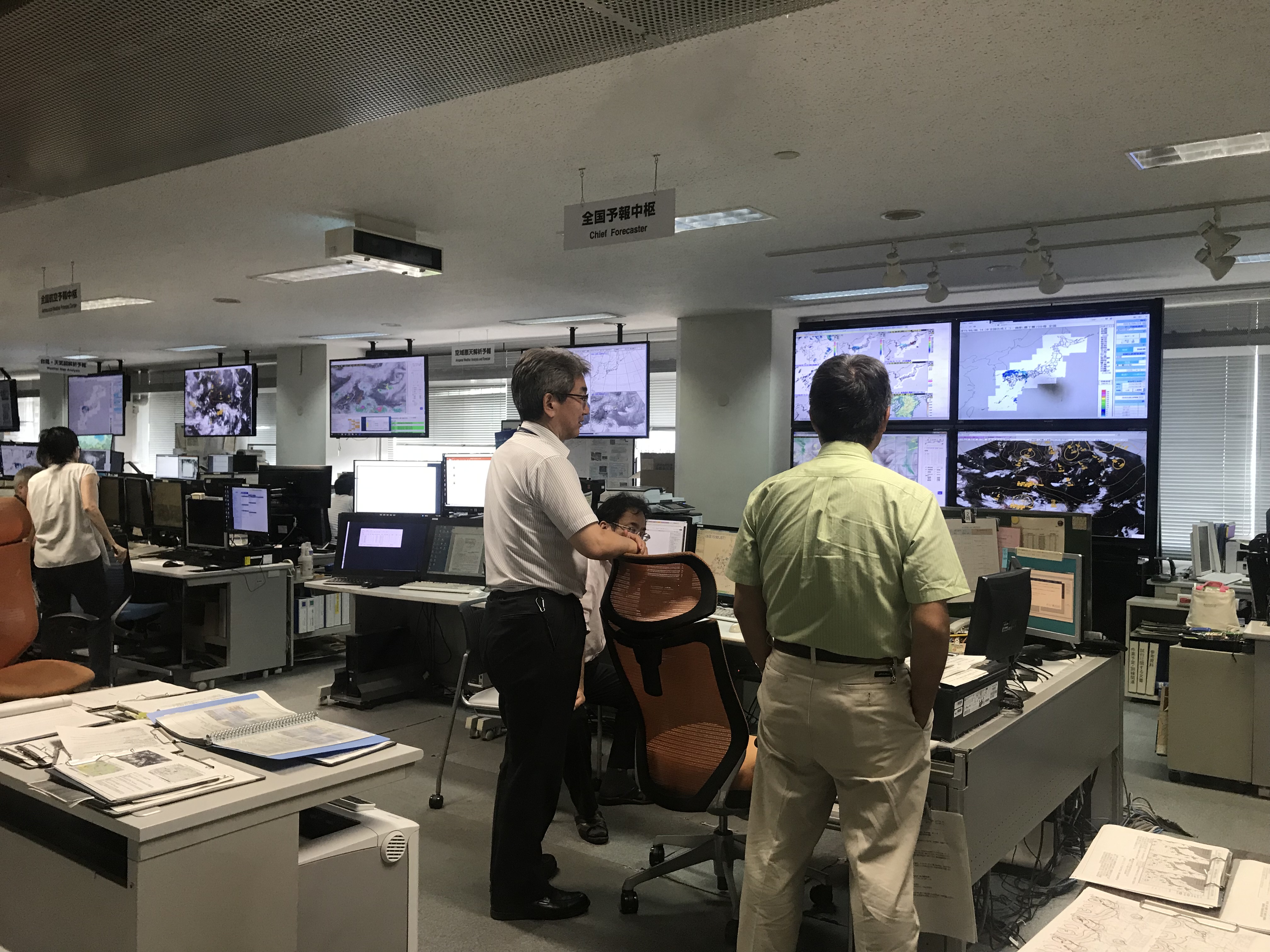
Japanese Met Agency and Tsunami Warning Centre during the GRA Forum participants visit on 6 August 2019
The post EuroGOOS chairing the Global Ocean Observing System Regional Alliances Forum appeared first on EuroGOOS.
New Model in Water Transports (Forecast)
Data from the Met Office high-resolution model (AMM15) were included in the water transport forecast. As part of that, the layout was changed as well. If you have any questions or problems with the application, please contact the BSH (inga.golbeck@bsh.de).
Breaking Waves, Breaking Barriers – celebrating women oceanographers at OceanObs’19
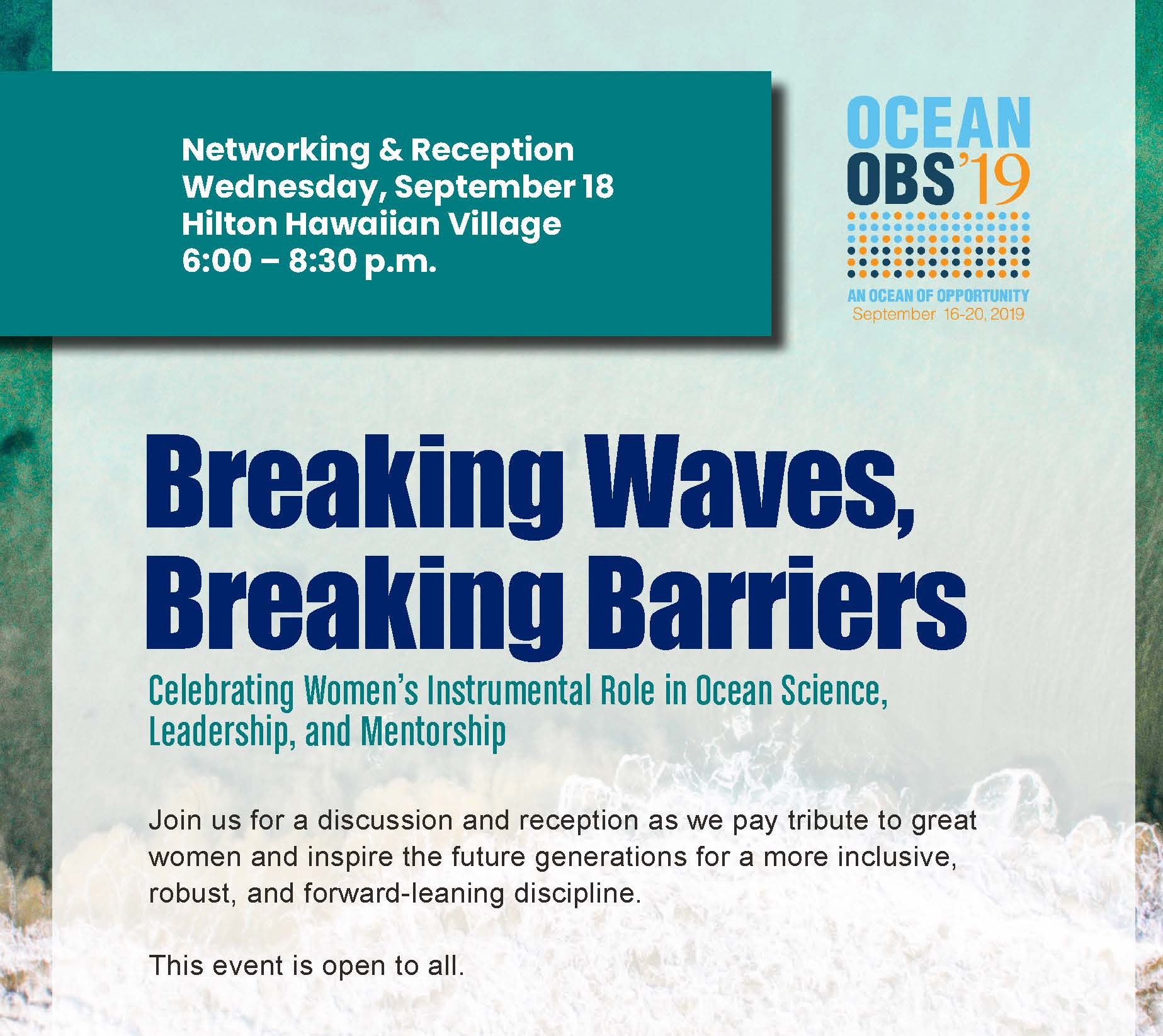 Registrations are open to the OceanObs’19 side event that will bring together ocean scientists from across the globe to discuss the important role women have served in shaping oceanography. As part of the OceanObs’19 conference week, this event will include a discussion and reception as we pay tribute to great women scientists and inspire the future generations for a more inclusive, robust, and forward-leaning discipline.
Registrations are open to the OceanObs’19 side event that will bring together ocean scientists from across the globe to discuss the important role women have served in shaping oceanography. As part of the OceanObs’19 conference week, this event will include a discussion and reception as we pay tribute to great women scientists and inspire the future generations for a more inclusive, robust, and forward-leaning discipline.
Confirmed speakers:
- Wendy Schmidt, Schmidt Ocean Institute, USA
- Barb Kirkpatrick, Gulf of Mexico Coastal Ocean Observing System of the Integrated Ocean Observation System, USA
- Karen Helen Wiltshire, Helmholtz Centre for Polar and Marine Research Alfred Wegener Institute, Germany
- Juliet Hermes, South African Environmental Observation Network, South Africa
- Rosie Alegado, University of Hawaii, USA – panel host
In addition to these prominent women sharing their vibrant stories of mentorship and leadership, this event will invite ambassadors to act as the reception hosts.
EuroGOOS is on the international programme committee of this event.
Registration deadline: 18 August.
Further information and registration here
The post Breaking Waves, Breaking Barriers – celebrating women oceanographers at OceanObs’19 appeared first on EuroGOOS.
EuroGOOS opens a job call for position of Secretary General
EuroGOOS has opened the position of the Secretary General, to take effect on or before 1 April 2020. This is a full-time position in the Secretariat of EuroGOOS in Brussels, Belgium.
Job description
Under the general authority of the EuroGOOS AISBL Executive Board of Directors the Secretary General will be responsible for the following:
- The day-to-day management and operation of the organisation, its office and personnel, including preparation of Members Meetings, Board Meetings, project contributions, conferences and workshops;
- Management of the EuroGOOS operating budget on behalf of the members and provide appropriate accounting and reports;
- Implementing policy and technical decisions taken by the Annual Meeting of Members and the EuroGOOS Board;
- Support EuroGOOS Working Groups, Task Teams and Regional Systems (ROOS);
- In conjunction with the EuroGOOS Executive board, improve the EuroGOOS position in the international political marine landscape;
- Representing EuroGOOS in matters relating to EuroGOOS strategy towards the EU, European organisations, GOOS and IOC, and serve as a contact point for these organisations to EuroGOOS;
- Supporting fund-raising efforts through preparation of proposals, arranging meetings, contacting potential donor organisations, etc;
- Oversee the promotion of EuroGOOS, operational oceanography and marine science via internet, brochures and publications;
- Maintaining communications among Members between meetings via regular progress reports, General Assembly, conferences and the EuroGOOS website.
Professional profile
- Proven experience with management in the field of operational oceanography and/or marine science;
- Demonstrated experience in operational oceanography and/or marine sciences (ideally both);
- Experience with international cooperation particularly within the EU landscape;
- Experience working with senior officials in governments, international organizations, and scientific institutions;
- Experience in developing and leading international projects, programmes or committees;
- Ability to maintain effective partnerships and working relations within a multi-cultural environment; ability to work collaboratively to achieve organizational goals;
- Strong communications skills;
- Fluent in spoken and written English;
- Demonstrated financial management skills;
- Demonstrated capability to work self-dependent with good analytical and problem solving ability;
- Good knowledge of the EuroGOOS organization.
Deadline for applications is 27 September 2019. Download the full job announcement:
 Announcement Secretary General EuroGOOS AISBL June2019 (161.6 KiB)
Announcement Secretary General EuroGOOS AISBL June2019 (161.6 KiB)
The post EuroGOOS opens a job call for position of Secretary General appeared first on EuroGOOS.
EuroGOOS Kostas Nittis Medal to a young marine scientist – call open!
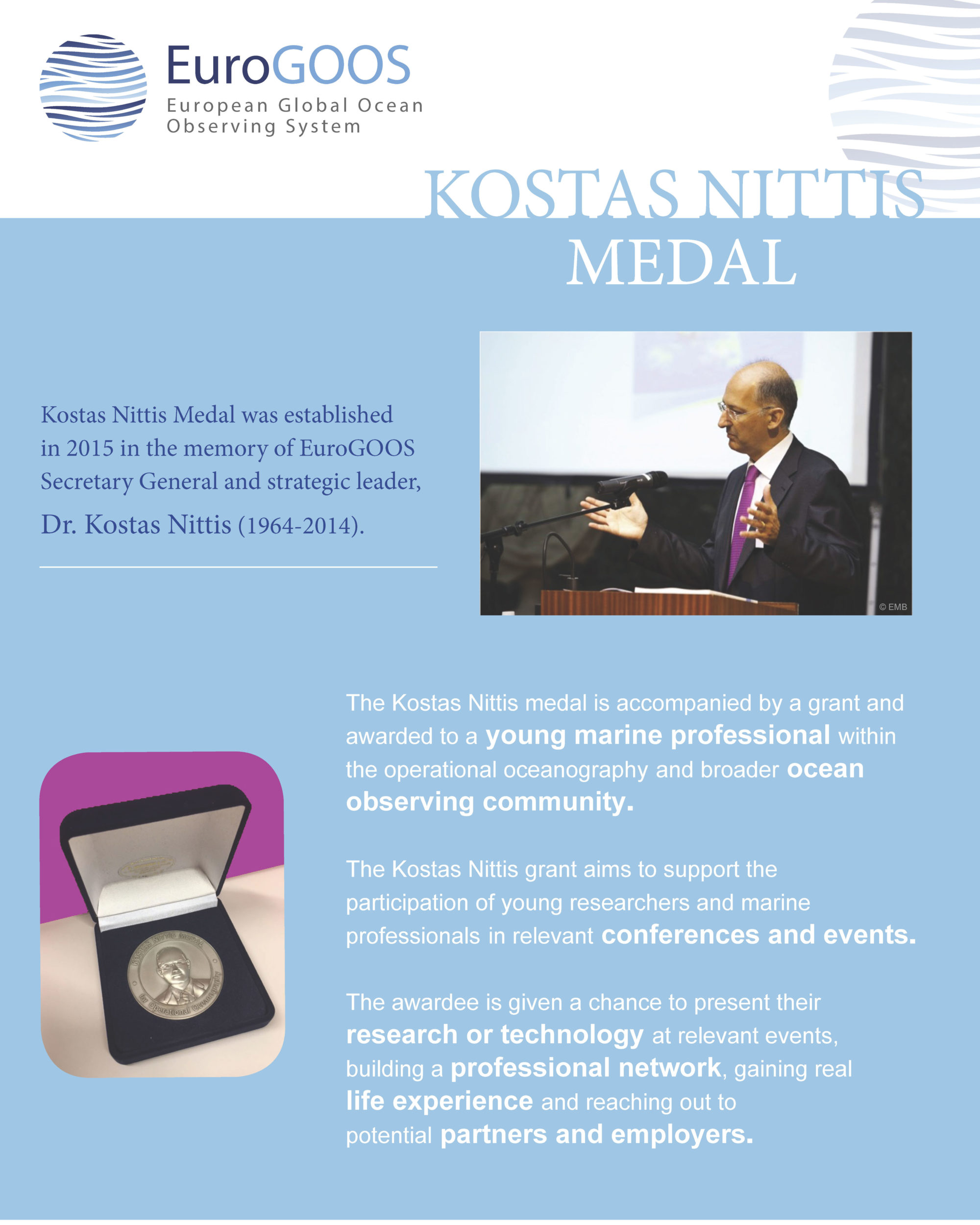 EuroGOOS Kostas Nittis Medal was established in memory of EuroGOOS Secretary General and strategic leader Dr. Kostas Nittis (1964-2014). The Kostas Nittis Medal is accompanied by a grant awarded to an early career marine scientist within the operational oceanography and broader ocean observing field.
EuroGOOS Kostas Nittis Medal was established in memory of EuroGOOS Secretary General and strategic leader Dr. Kostas Nittis (1964-2014). The Kostas Nittis Medal is accompanied by a grant awarded to an early career marine scientist within the operational oceanography and broader ocean observing field.
The Kostas Nittis Medal and the grant amounting to € 3,000 aim to support the participation of early career marine scientists in relevant conferences and events. The awardee is thus given a chance to present their research work at relevant events, building a professional network, gaining real life experience and reaching out to potential research and technological partners and/or future employers.
The call is open to marine students younger than 35 years old on the day of the nomination deadline. Candidate must be a student at a Master of Science or PhD level carrying out research or innovation projects in the broad domain of climate change, marine safety, ecosystem and ocean health, or operational oceanography (ocean observations, ocean data, numerical modelling, operational ocean services, etc). Nominations should come from a EuroGOOS member organization.
Deadline for nominations: 19 August 2019
Download the terms of reference:
 EuroGOOS YoungScientistMedal ToR 2019 (158.3 KiB)
EuroGOOS YoungScientistMedal ToR 2019 (158.3 KiB)
The post EuroGOOS Kostas Nittis Medal to a young marine scientist – call open! appeared first on EuroGOOS.
Localizing ocean literacy at the European Maritime Day
Being ocean literate means to know basic facts about the importance for the ocean for life on Earth and spread this knowledge around. In the last years, ocean literacy has gained the recognition is deserves – all funding and programming decisions about the ocean require exactly that – basic understanding of the importance of the ocean for life on Earth.
This is not surprising that at the European Maritime Day 2019, which took place in Lisbon from 16 to 17 May, ocean literacy was high on the agenda. European Commission informed the audience about its plans to build a European Ocean Alliance, a platform bringing together European groups and organisations active in ocean preservation and ocean literacy (open tender call ongoing). UNESCO’s Intergovernmental Oceanographic Commission (IOC) have updated the meeting on the outcomes of the 1st UN Ocean Decade Global Planning Meeting (13-15 May, Copenhagen) where ocean literacy was recognized among top priorities.
At EuroGOOS we have been working on ocean literacy for a few years now, with our first ocean literacy book launched at the Our Ocean 2017 conference in Malta. At the European Maritime Day 2019 we launched two translations of this book – in Italian and in Portuguese. Both translations were done in kind by EuroGOOS member organizations or peer associations – ISPRA in Italy and OMA and IPMA in Portugal.
“In the times of misinformation & fake news, ocean literacy becomes an imperative. Policies need a social license, so promoting #ocean awareness to our citizens is a must”, said MEP Ricardo Serrão Santos at the launch of Portuguese version of The Ocean Is My Home. The book is designed for children and their parents and touches upon the main ocean literacy themes in Europe, e.g. biodiversity, ecosystem valuation, ocean-climate nexus, pollution and ocean observing.
“When we launched the book at Our Ocean in Malta the success was immediate, shared Dina Eparkhina, the book’s co-author with artist Karri Lehtonen, “but the real impact is achieved locally, spreading the word to schools, governments and broad stakeholders”. At the European Maritime Day 2019, the Portuguese versions reached many of these targets. Among them, the youngest participants of the conference – ten school children from the Portuguese Blue Schools network who spoke to Commissioner Vella and the audience in the opening session, each received a signed copy of the book.
Next for EuroGOOS is go engage strongly with the vast diversity of the ocean literacy activities across 44 EuroGOOS members and through our peer ocean observing systems in global regions, within the Global Ocean Observing System (GOOS) of IOC-UNESCO.
In addition to ocean literacy, EuroGOOS stand at the European Maritime Day 2019 profiled the latest ocean observing strategies: GOOS 2030 Strategy (May 2019), EOOS 2018-2020 Strategy and Implementation Plan (November 2018), and the AtlantOS All-Atlantic Ocean Observing Strategy (March 2019). We also promoted the upcoming OceanObs’19 conference – a major decadal meeting place for the ocean community, from observations to information. OceanObs’19 is taking place on 16-20 September in Honolulu, USA.
Find out more about EMD 2019 here. EMD 2020 will be in Cork, Ireland.
You will find all versions for The Ocean Is My Home on the EuroGOOS publications page
The post Localizing ocean literacy at the European Maritime Day appeared first on EuroGOOS.
The UN Ocean Decade is the decade of people
From 13 to 15 May, EuroGOOS joined 200 experts, opinion leaders, champions and stakeholders across various sectors at the Global Planning Meeting in preparation of the UN Decade of Ocean Science for Sustainable Development, 2021-2030. The meeting included a mixture of high-level panels and brainstorming sessions to share ideas and tools that can foster partnerships in support of the Decade.
Participants exchanged views on cross-cutting links and capacities to underpin the Decade’s societal objectives put forward by the IOC and the Decade’s Executive Planning Group: a clean ocean, a healthy and resilient ocean, a predicted ocean, a safe ocean, a sustainably harvested and productive ocean, as well as a transparent and accessible ocean. For all those broad and interconnected areas, the paramount importance of public and policy awareness raising about the ocean’s role for all life on the planet was stressed. The sessions also highlighted that the Decade will only succeed through an engagement well beyond traditional ocean science disciplines. This is the decade of people, said IOC Chair Peter Haugan in the closing session, and it will need to be contextualized for the diversity of the world’s cultures, countries and needs. Communication was among the meeting’s foci; we joined the dedicated task group which brought together a range of experts to distill the meeting’s messages to tangible communications and engagement approaches.
Next in the planning phase of the Ocean Decade are a series of regional workshops starting with the Pacific Community Workshop on 23-25 July, Noumea, New Caledonia. It is foreseen to hold a global Decade’s kick-off meeting in Berlin in early 2021. The ocean observing community will have another chance to give tangible inputs to the planning at the upcoming OceanObs’19 conference (16-20 September, Honolulu, USA) for which both EuroGOOS and GOOS, the Global Ocean Observing System of IOC-UNESCO, are intellectual sponsors and active contributors.
All meeting documents for the Global Planning meeting and further information are available on http://oceandecade.org.
The post The UN Ocean Decade is the decade of people appeared first on EuroGOOS.
EuroGOOS General Assembly – new relevance, new strategy
On 8 and 9 May the EuroGOOS General Assembly met in Heraklion, hosted by the Hellenic Centre for Marine Research and George Petihakis, EuroGOOS Chair. EuroGOOS strategy and integration were the main themes on the agenda. The meeting was attended by EuroGOOS members, chairs of the EuroGOOS activities (working groups, infrastructure task teams, and the regional systems – ROOS).
The Assembly discussed the evolution of the organization and brainstormed on the next EuroGOOS strategy 2020-2030. The brainstorming was done through an interactive session in a world café around four major areas of the strategy: high-level priorities, challenges, partnerships, and national benefits and advocacy. The results of this brainstorming will be transformed into the strategy and a roadmap for it, with the first draft prepared in the summer. The upcoming OceanObs’19 conference will further feed into the strategy preparation.
The Assembly also discussed ways to achieve a better integration between the variety of EuroGOOS activities. EuroGOOS task teams (networks of ocean observing technologies) and working groups (on science, technology, data integration and coastal ocean) are delivering best practice and state of play analysis, while the EuroGOOS Regional Operational Oceanographic Systems (ROOS) deliver regional coordination for the community. At the end of 2019, EuroGOOS will host an integration workshop bringing all those activities together to brainstorm and agree steps to action the new EuroGOOS strategy and the support needed from the EuroGOOS office.
At the formal part of the meeting, the Assembly approved and warmly welcomed three new members to EuroGOOS: SHOM, France, PLOCAN, Spain, and NIVA, Norway. Representatives of these organizations showcased activities and future contributions to EuroGOOS, spanning technological development, observing integration, ocean monitoring, and ocean literacy. The Assembly also elected a new member to the Executive Directors Board – Holger Brix of the Helmholtz-Zentrum Geesthacht in Germany. Two Executive Board members stepped down upon the completion of their full mandates – the Assembly thanked Urmas Lips, Tallinn University of Technology, Estonia, and Bernd Brugge, Federal Maritime and Hydrographic Agency, BSH, Germany, for their contributions to the work of the Board over the past six years. At the Assembly, Chair George Petihakis signed the EuroGOOS office hosting agreement with the Royal Belgian Institute of Natural Sciences (RBINS), represented by Patrick Roose and Sebastien Legrand. RBINS will host the EuroGOOS secretariat in its Brussels offices (also housing the Belgian Museum of Natural Sciences) from the end of 2019.
The post EuroGOOS General Assembly – new relevance, new strategy appeared first on EuroGOOS.
Sixteenth session of the Group of Experts for the Global Sea Level Observing System
The sixteenth session of the Group of Experts for the Global Sea Level Observing System (GLOSS GE XVI) took place in Busan, Republic of Korea, on 11-13 April. The Global Sea Level Observing System (GLOSS), a component of the Global Ocean Observing System (GOOS), was established by the Intergovernmental Oceanographic Commission of UNESCO in 1985. GLOSS is an in situ sea level observing network coordinating high-quality data delivery to support a broad research and operational user base.
At the event, Begoña Pérez Gómez, Chair of EuroGOOS Tide Gauge Task Team, presented the main achievements and on-going activities of the task team. The EuroGOOS Tide Gauge Task Team works to recover available tide gauge data and feed into activities of the global GLOSS network and the European Copernicus programme, among many others.
Begoña Pérez Gómez explained at the meeting that the task team has analysed the status of the European tide gauge systems and found alarming sustainability gaps. In 2017, the task team issued a statement to policymakers demonstrating that at least 25% of the surveyed tide gauges are under threat of immediate funding cuts. The survey also showed that only 37% of the systems have an open and free data policy.
“This simple and reliable technology is being explored and improved since the 19th century”, says Begoña Pérez. “But still today it is key to measure sea level, helping to predict trends, prevent extreme events, such as tsunamis, floods and storm surges, and support harbour operations, among many other uses. We were in shock when the results of our survey showed significant sustainability threats to the tide gauge systems in Europe. At the level of political attention to the blue economy activities and environmental monitoring, ocean observing networks must not be decreased.”
Presentation by Begoña Pérez Gómez, Chair of EuroGOOS Tide Gauge Task Team is available here:
 EuroGOOSTGTT GLOSS Korea 2019 (2.1 MiB)
EuroGOOSTGTT GLOSS Korea 2019 (2.1 MiB)
The post Sixteenth session of the Group of Experts for the Global Sea Level Observing System appeared first on EuroGOOS.
EuroGOOS Tide Gauge Task Team delivers European status to GLOSS
The sixteenth session of the Group of Experts for the Global Sea Level Observing System (GLOSS GE XVI) took place in Busan, Republic of Korea, on 11-13 April. The Global Sea Level Observing System (GLOSS), a component of the Global Ocean Observing System (GOOS), was established by the Intergovernmental Oceanographic Commission of UNESCO in 1985. GLOSS is an in situ sea level observing network coordinating high-quality data delivery to support a broad research and operational user base.
At the event, Begoña Pérez Gómez, Chair of EuroGOOS Tide Gauge Task Team, presented the main achievements and on-going activities of the task team. The EuroGOOS Tide Gauge Task Team works to recover available tide gauge data and feed into activities of the global GLOSS network and the European Copernicus programme, among many others.
Begoña Pérez Gómez explained at the meeting that the task team has analysed the status of the European tide gauge systems and found alarming sustainability gaps. In 2017, the task team issued a statement to policymakers demonstrating that at least 25% of the surveyed tide gauges are under threat of immediate funding cuts. The survey also showed that only 37% of the systems have an open and free data policy.
“This simple and reliable technology is being explored and improved since the 19th century”, says Begoña Pérez. “But still today it is key to measure sea level, helping to predict trends, prevent extreme events, such as tsunamis, floods and storm surges, and support harbour operations, among many other uses. We were in shock when the results of our survey showed significant sustainability threats to the tide gauge systems in Europe. At the level of political attention to the blue economy activities and environmental monitoring, ocean observing networks must not be decreased.”
Presentation by Begoña Pérez Gómez, Chair of EuroGOOS Tide Gauge Task Team is available here:
 EuroGOOSTGTT GLOSS Korea 2019 (2.1 MiB)
EuroGOOSTGTT GLOSS Korea 2019 (2.1 MiB)
The post EuroGOOS Tide Gauge Task Team delivers European status to GLOSS appeared first on EuroGOOS.
OceanObs’19 programme development
OceanObs’19 programme and sponsors committees met for a joint meeting at UNESCO, hosted by the IOC on 29 and 30 March (directly following the AtlantOS Symposium). With a strong community’s inputs collected via the white papers (soon to be released in the Frontiers for Ocean Science), the committees advanced the programme of the main event and the surrounding activities. OceanObs’19 is expecting over a thousand participants across all areas of ocean observing, science and technology. This will be a milestone event dedicated to ocean observing trends and opportunities throughout the value chain, from observations to information and services. EuroGOOS is proud to be among the intellectual sponsors of the event and promote the European showcase.
Follow OceanObs’19 via the website, twitter, facebook and Instagram. Registration is ongoing on the event’s website.
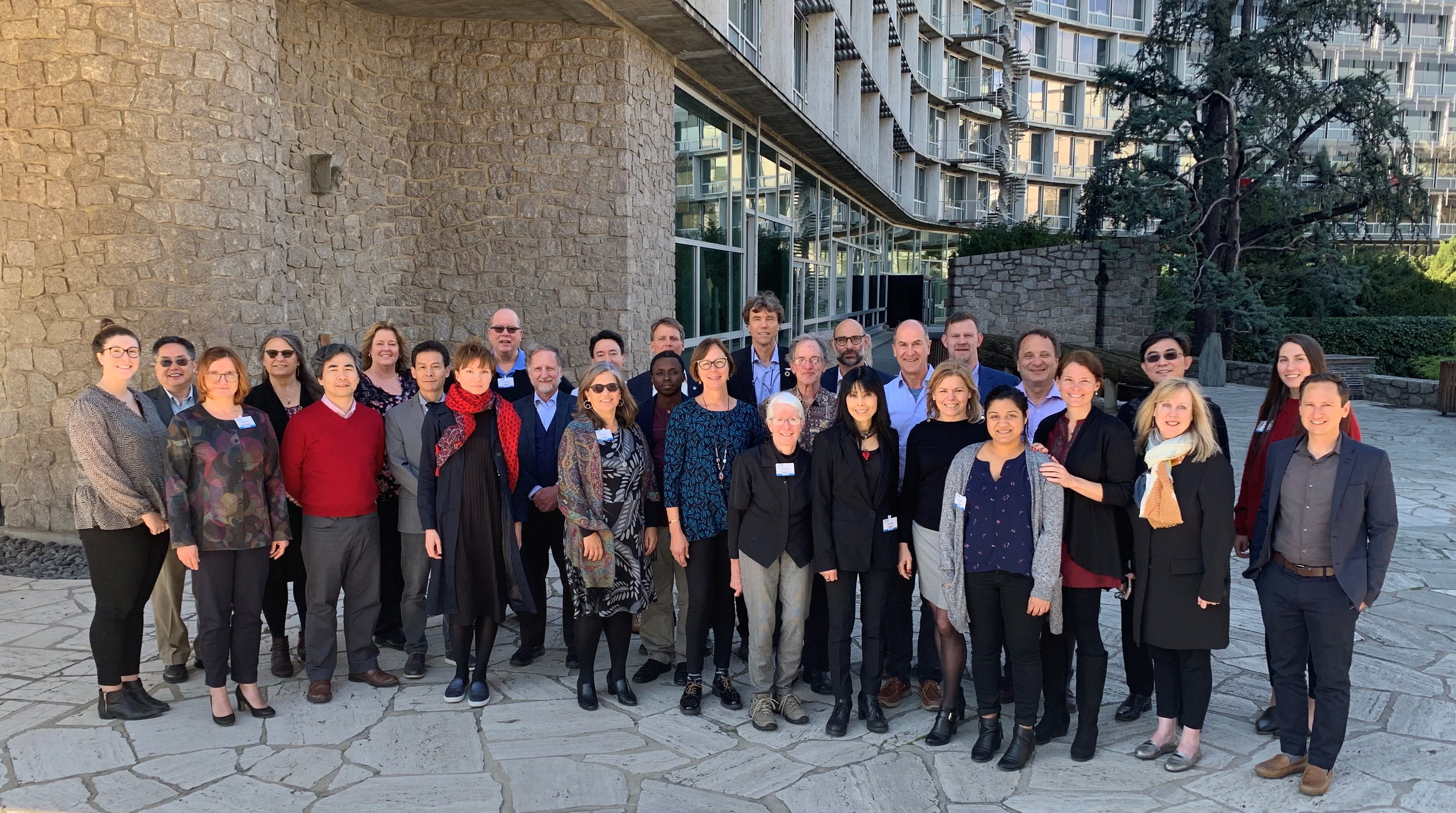
OceanObs’19 programme and sponsor committee members at the UNESCO headquarters, 30 March 2019, Paris
The post OceanObs’19 programme development appeared first on EuroGOOS.
All-Atlantic Ocean Observing Symposium at UNESCO
The First International AtlantOS Symposium took place at the UNESCO and IOC headquarters in Paris from 25 to 28 March. The event marked the transition from an EU-funded project to an international programme, the All-Atlantic Ocean Observing System.
170 participants from 29 countries and many pan-European initiatives expressed a joint will to further integration, data aggregation and societal awareness of the ocean in the Earth system. High-level speakers from the UNESCO and IOC, the European Parliament, the UN Environment, several heads of oceanographic institutes and funding agencies, national ministries across the Atlantic, dialogued with the AtlantOS science and oceanography community as well as ocean industries, tech developers and international NGOs on how to work ahead. The European Commission congratulated the community on generating a strong science and policy momentum around the All-Atlantic ocean observing and called for urgent actions to realize the objectives of the integrated system.
EuroGOOS was strongly involved in both the programme and the organization of the event. Glenn Nolan and Erik Buch delivered several talks, including on the European strategy for the All-Atlantic ocean observing, the European Ocean Observing System (EOOS), and the connectivity and partnerships across the GOOS regions (of which EuroGOOS represents Europe) and with broader communities. Dina Eparkhina was on the programme committee of the symposium’s stakeholder day, co-chaired by Zdenka Willis, President-Elect of the US Marine Technology Society, and Mathieu Belbeoch, Head of JCOMMSOPS (joint IOC-WMO commission on oceanography and meteorology).
The event presented the AtlantOS Paris Declaration and looked ahead to the international OceanObs ’19 conference on 16-20 September – the global decadal event which comes at a critical time to deliver consolidated ocean observing inputs to the UN Ocean Decade.
The AtlantOS programme website is under development. Further information about the AtlantOS project is here.
The post All-Atlantic Ocean Observing Symposium at UNESCO appeared first on EuroGOOS.
Rethinking Innovation for a Sustainable Ocean Economy – new OECD report
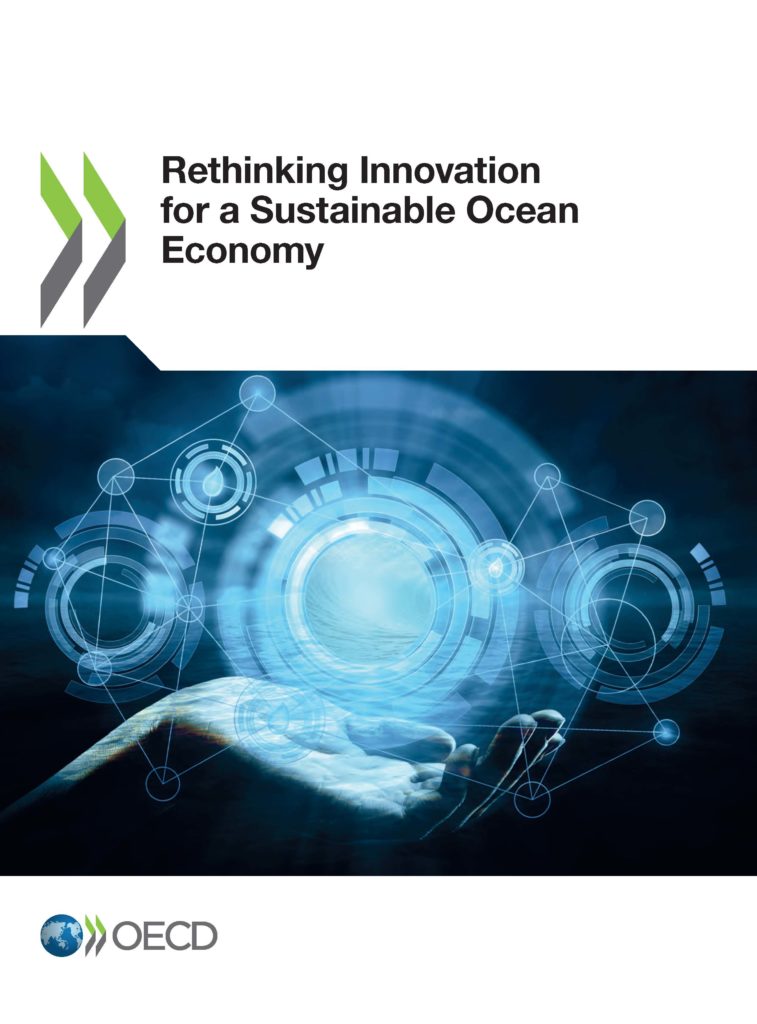 This new OECD report on the ocean economy emphasises the growing importance of science and technologies in improving the sustainable economic development. The report recognizes that marine ecosystems are at the heart of many of the world’s global challenges: food, medicines, new sources of clean energy, climate regulation, job creation and inclusive growth. Marine ecosystem health should be safeguarded to support the ever-growing use of marine resources. This report identifies three priority areas for action based on a number of in-depth case studies:
This new OECD report on the ocean economy emphasises the growing importance of science and technologies in improving the sustainable economic development. The report recognizes that marine ecosystems are at the heart of many of the world’s global challenges: food, medicines, new sources of clean energy, climate regulation, job creation and inclusive growth. Marine ecosystem health should be safeguarded to support the ever-growing use of marine resources. This report identifies three priority areas for action based on a number of in-depth case studies:
- Approaches that produce win-win outcomes for ocean business and the ocean environment across a range of marine and maritime applications;
- Creation of ocean-economy innovation networks; and
- New pioneering initiatives to improve measurement of the ocean economy.
The report stresses sustained ocean observations are an essential part of worldwide efforts to better understand the ocean and its functioning. The derived data are crucial for many different scientific communities and for a wide range of public and commercial users active in the ocean economy. They underpin a wide range of scientific research, and critically support the safe, effective and sustainable use of ocean resources and the ocean environment. Developing and sustaining them requires significant public investment, the justification for which calls for rigorous assessment of the associated costs and benefits and value to society.
The report proposes fresh approaches to close the gaps. Solutions include improved tracking of users (both scientific and operational), the mapping of value chains, and improvements to methodologies through the development of international standards or guidelines for the valuation of ocean observations. Further OECD work will be ongoing in 2019-20 as to provide more evidence on the development of a sustainable ocean economy.
The post Rethinking Innovation for a Sustainable Ocean Economy – new OECD report appeared first on EuroGOOS.
BOOS Annual Meeting
Wednesday 12 June
08:30 – 09:00 Registration
09:00 – 17:00 Scientific Workshop
19:00 Dinner
Thursday 13 June
08:30 – 09:00 Registration
09:00 – 12:30 BOOS project and member reports
13:30 – 17:00 BOOS AM business session
A detailed invitation for abstract submission and registration as well as practical information will be published soon.
EuroGOOS in the coming decade – Executive Board and Chairs of all activities set out objectives of the new EuroGOOS Strategy
On 30 January, the EuroGOOS Executive Directors Board met with the Chairs of EuroGOOS Task Teams, Working Groups and Regions (ROOS), to set out the main objectives of the new EuroGOOS strategy. The strategy will cover the period 2020 to 2030, which aligns both with the UN Ocean Decade and the UNESCO-IOC’s Global Ocean Observing System strategy, covering the same period. EuroGOOS is the European component of the IOC GOOS and will follow the main strategic lines of the GOOS strategy, spanning the Operational Services, Ocean Health and Climate. The new EuroGOOS strategy will be implemented through the five EuroGOOS Regions, the Arctic, Baltic, Mediterranean as well as the North-West-Shelf and Iberia-Biscay-Ireland areas of the Atlantic.
The key to success will be partnerships within and across these regions between the long-established and emerging operational oceanography, environmental monitoring, and blue economy initiatives and networks, along the EOOS framework objectives. EuroGOOS working groups and technology task teams will help enabling such interfaces through open collaborative projects. EuroGOOS will move towards an Earth system approach to ocean observing engaging closely with the Earth Observation communities worldwide. Capacity development will also remain a key strategic area, both through knowledge transfer via best practices and technical and expert capacity building in less well resourced communities.
The strategy will drafted this spring through a series of consultations with the EuroGOOS members, working groups, task teams and ROOS, and further discussed at the EuroGOOS General Assembly in May 2019. The finalization of this new and ambitious strategy will coincide with the celebration of the 25th anniversary of the organization. EuroGOOS was established in 1994 through a foresight report by a dedicated European Committee on Ocean and Polar Sciences, ECOPS, task force, a few years after the establishment of IOC GOOS to ensure the European contribution to the Global Ocean Observing System while also strengthening the pan-European integration.
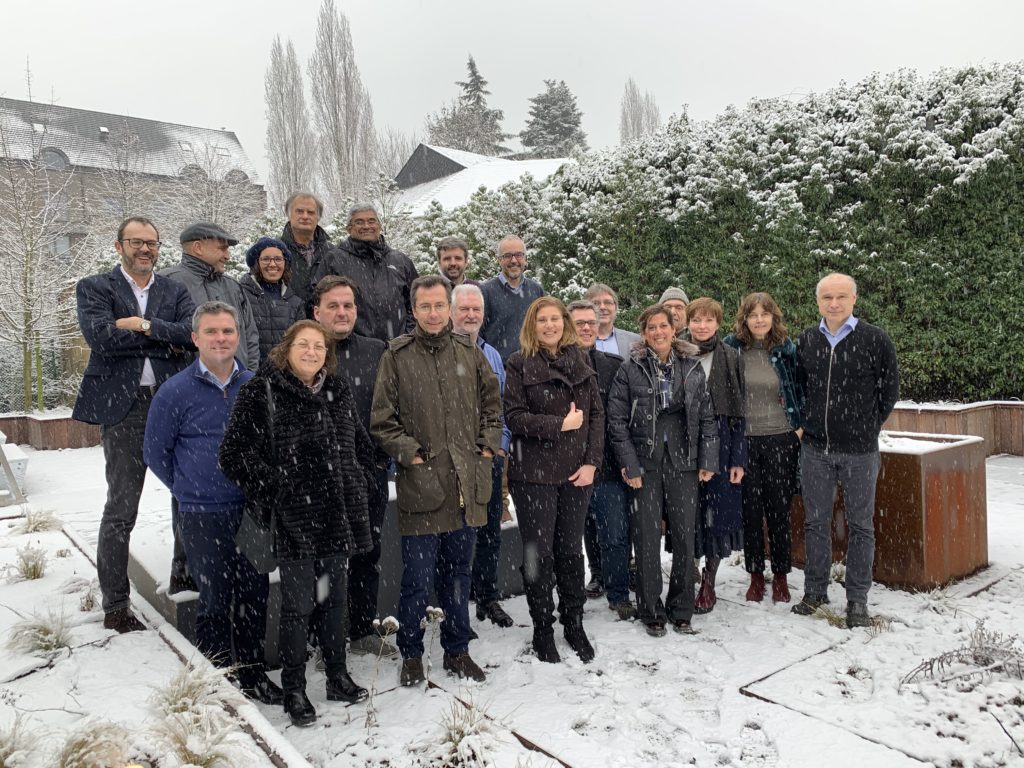
EuroGOOS Executive Board, Office and Chairs of Working Groups, Task Teams and Regional Systems, ROOS, 31 January 2019, EuroGOOS Headquarters, Brussels
The post EuroGOOS in the coming decade – Executive Board and Chairs of all activities set out objectives of the new EuroGOOS Strategy appeared first on EuroGOOS.
Looking back at 2018 with a big smile – Happy 2019!
With our warm wishes to the EuroGOOS community in the coming year, we are looking back at 2018 with a big smile. In 2018, EuroGOOS started its chairmanship of the UNESCO IOC’s Global Ocean Observing System Regional Alliances Forum, while at the same time reaffirming its central role in advancing integration and openness in the European operational oceanography landscape. The EOOS framework, developed in the past few years, has advanced significantly in 2018, with a strategy and a concrete short-term implementation plan. This was possible thanks to a strong community buy-in demonstrated through an open stakeholder consultation and two successful EOOS events – a forum and a conference.
EuroGOOS membership grew reaching 42 members, spanning oceanographic institutes, met offices, and companies. The five EuroGOOS regional systems, ROOS, have revamped their strategies and started new collaborative projects. Seven EuroGOOS task teams on ocean observing technologies have continued to engage with international networks and held several workshops on data integration. A new EuroGOOS coastal working group was launched and has advanced the European modelling capacity survey. EuroGOOS showcased those efforts at events and exhibitions and looks ahead to have a strong community presence at the OceanObs ’19 conference.
EuroGOOS continues to work closely with key European initiatives and programmes, e.g. the Copernicus programme, through cooperation with the Copernicus Marine Service and the European Environment Agency, as well as SeaDataNet and EMODnet. Close collaboration is ongoing with the environmental research infrastructures through the ENVRIplus project as well as through bilateral agreements with Euro-Argo and EMSO ERICs, both providing EuroGOOS task teams on Argo and fixed platforms respectively. In the Horizon 2020 projects, among them AtlantOS, Jerico-Next and INTAROS, EuroGOOS contributed to common strategies for fit-for-purpose ocean observing information and services to answer societal questions.
In 2019, EuroGOOS will celebrate its 25th anniversary. We look ahead to this coming year with a wish to bring our community and networks even closer together. Global oceanography has been moving at a fast pace becoming today a critical science and technology support to society. We will continue to showcase and add value to these efforts, while also promoting a better ocean literacy with policymakers at both European and national levels.
Happy 2019!
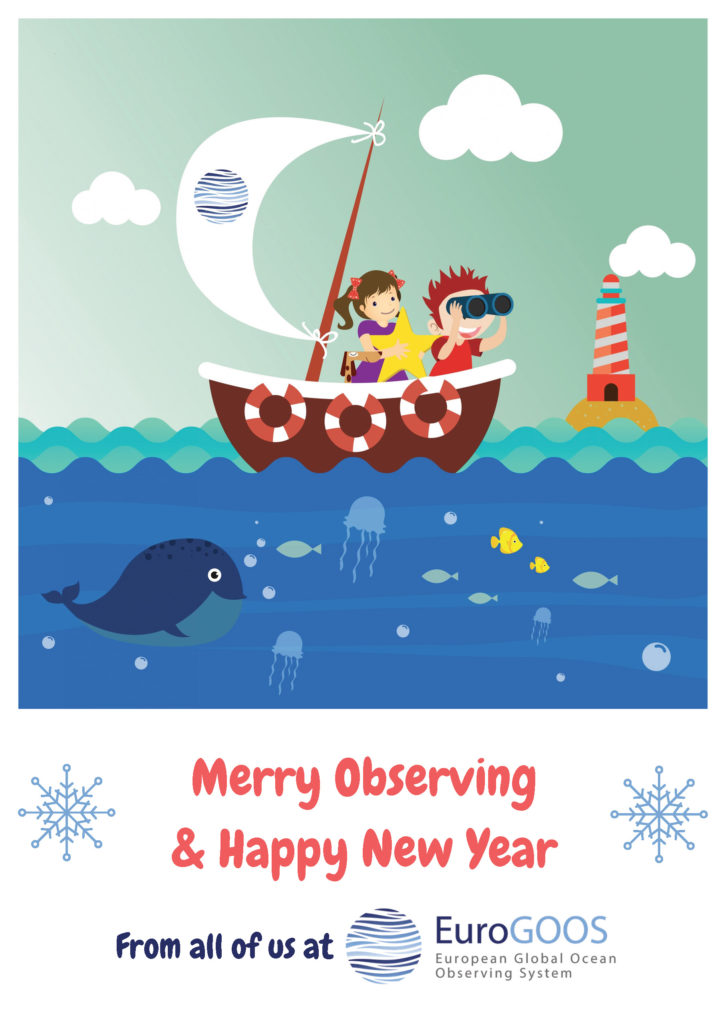
The post Looking back at 2018 with a big smile – Happy 2019! appeared first on EuroGOOS.
Why should Brussels care about ocean observing?
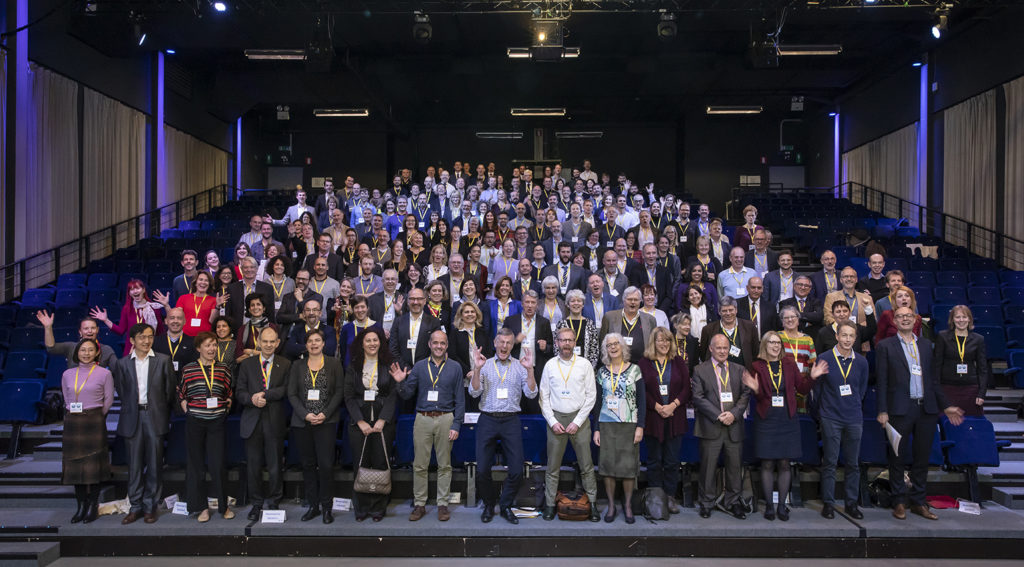
We know more about Mars than we know about the ocean. Yet, ocean observations deliver critical information for a long list of societal benefits, not least the UN Sustainable Development Goals. Ocean observation’s national funders, pan-European research coordination projects, scientists and politicians spent three days in Brussels unwinding the complexities of the ocean information needs.
From 21 to 23 November, 300 stakeholders debated end-to-end solutions to meeting the societal and policy demands for ocean data. “Ocean observations and information underpin a great variety of services from commercial uses of the ocean space and resources, to human health and security, to climate change mitigation strategies”, explained Dr. Glenn Nolan, oceanographer and secretary general of the European Global Ocean Observing System, EuroGOOS. “Only by coordinating national ocean observing efforts at pan-European and global levels, can we achieve the ambitious European and global ocean strategies.”
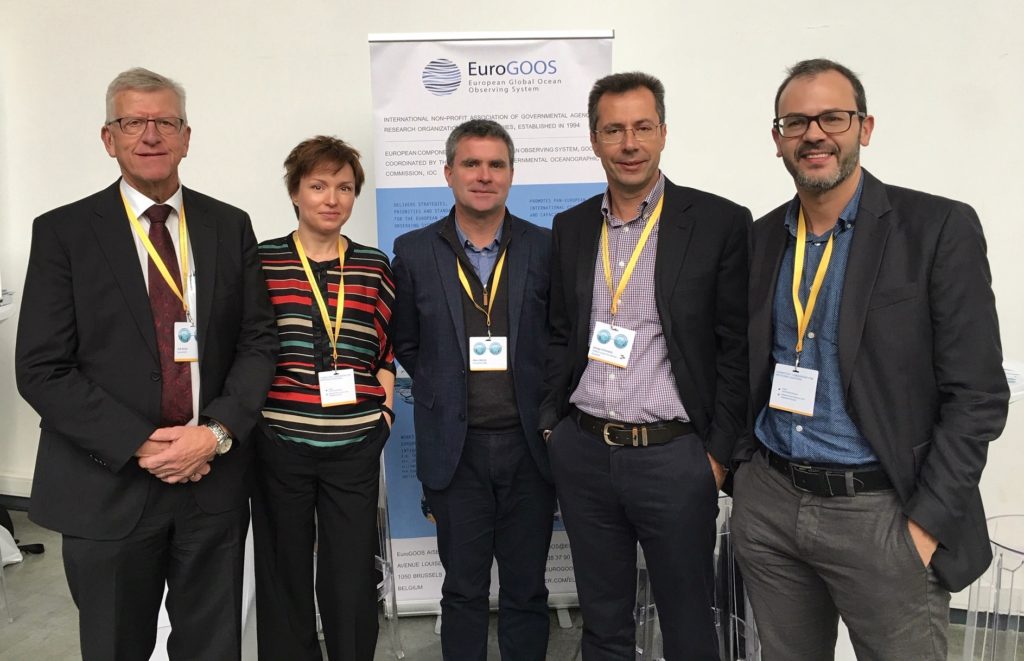
EOOS as a coordinating framework for European ocean observing has been fostered by science and oceanographic communities. The EOOS framework has been promoted by community declarations (EuroOCEAN conferences 2010 and 2014) and several research and innovation agendas and strategic documents. In 2015, the European Global Ocean Observing System, EuroGOOS, and the European Marine Board, EMB, joined forces in designing tangible mechanisms to make EOOS a reality. Through active participation of the EOOS steering group, several stakeholder events (including in the European Parliament) and open on-line consultations, the EOOS strategy and implementation plan have now been finalized. These documents have benefited from inputs by a broad range of national, regional and pan-European actors, including, among many others, the OSPAR convention, ICES, and the International Hydrographic Organization.
“This unique action plan is open for and inclusive of the many disciplines and technologies underpinning the ocean observing efforts”, said Prof. Sheila Heymans, ecosystem modeler and executive director of the European Marine Board, EMB. “Many tangible actions are already underway, and many more are needed, but the EOOS process has shown that the European ocean observing communities are ready to step-up cooperation”.
The EOOS conference call for action (PDF) has been adopted by the participants and handed to European national research representatives, the Joint Programming Initiative on Healthy and Productive Seas and Oceans, and the European Commissioner for Environment, Maritime Affairs and Fisheries, Karmenu Vella.
The conference report will be finalized by January 2019. The conference twitter feed tagged #EOOSConference18 gives a glimpse of the rich and engaged discussions at the event.
Image captions:
- Top: EOOS Conference 2018 Participants, 22 November 2018, Brussels (Image author: Dirk Leemans for EMODnet)
- Bottom: EuroGOOS office team and chair at the EuroGOOS stand, EOOS Conference 2018, 22 November 2018, Brussels. From left: Erik Buch, Dina Eparkhina, Glenn Nolan (all – EuroGOOS Office), George Petihakis (EuroGOOS Chair), Vicente Fernández (EuroGOOS Office)
The post Why should Brussels care about ocean observing? appeared first on EuroGOOS.
EMSO and EuroGOOS cement their partnership in promoting ocean observing
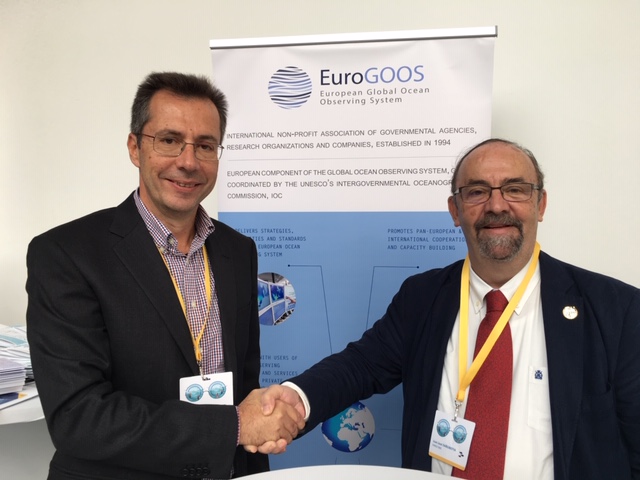
George Petihakis, EuroGOOS Chair, and Juanjo Dañobeitia, EMSO ERIC Director General, signing the MoU at the EOOS Conference, 22 November 2018, Brussels
Today, at the EOOS conference in Brussels, the EuroGOOS chair George Petihakis, and the EMSO director-general Juanjo Dañobeitia signed a memorandum of understanding between the two organizations to strengthen partnership in promoting the European ocean observing efforts.
Cementing the already ongoing collaboration, EuroGOOS and EMSO agree to jointly coordinate the EuroGOOS Task Team on ocean observing fixed platforms, strengthening the oceanographic research cooperation within the EOOS framework. The organizations will also jointly promote and contribute to a sustained in situ component of the Copernicus Marine Service and support the development of common operational data procedures and services, including data quality control and management.
“We look forward to strengthening our cooperation with EMSO in promoting ocean observations in general and the EOOS framework in particular, and to deliver tangible joint actions fostering Europe’s leadership in ocean observing and services”, shared George Petihakis, EuroGOOS Chair.
EuroGOOS, the European Global Ocean Observing System, is an oceanographic association of national agencies, research organizations, and private companies, working within the intergovernmental Global Ocean Observing System (GOOS). EuroGOOS is one of the UNESCO-IOC Global Ocean Observing System regions and is currently Chair of the GOOS Regional Alliances Forum. EuroGOOS is also playing a central role in fostering and supporting the development of a common framework for European ocean observing, EOOS.
EMSO, the European Multidisciplinary Seafloor and water-column Observatory is a European Research Infrastructure Consortium (ERIC) supporting a system of fixed-point observatories owned and managed by European organizations that provide data for monitoring of marine environments, spanning the Arctic, the Atlantic, the Mediterranean and the Black Sea. EMSO offers data and services to a large and diverse group of users, going from scientists and industries to institutions and policy makers.
“We have been working with EuroGOOS for some time in an open and cooperative way. This MoU will build on our successful partnership to deliver a strong and resourced EuroGOOS task team on fixed platforms and support the community in provision of data and services for sustainable blue economy”, said Juanjo Dañobeitia, EMSO ERIC Director General.
The MoU was symbolically signed at the stakeholder conference dedicated to building an integrated and fit-for-purpose framework of European ocean observing capacity, EOOS.
The post EMSO and EuroGOOS cement their partnership in promoting ocean observing appeared first on EuroGOOS.
European Research Infrastructures share best practice and look ahead
The 7th ENVRI week took place in Riga, Latvia, from 5 to 9 November 2018. ENVRI, the European Environmental Research Infrastructures community, brought together in the Horizon 2020 ENVRIplus project, deliver valuable resources for environmental scientists. ENVRIplus gathers all domains of Earth system science (atmospheric, marine, biosphere and solid Earth) to capitalize on the progress made in various disciplines and strengthen data exchange across domains.
At the 7th ENVRI week EuroGOOS shared the ocean observing community best practices and progress, among others towards building a framework for an integrated and fit-for-purpose European Ocean Observing System, EOOS. Glenn Nolan and Dina Eparkhina of the EuroGOOS office, updated the meeting on the policy, strategy and communications activities in the marine domain, represented through the EuroGOOS family of the regional systems (ROOS), task teams and working groups. These activities are set in the context of the international developments and strategies, like the UN Ocean Decade and the G7 initiatives, for example.
The ENVRI community had a fruitful discussion on the next steps building on the achievements of the successful ENVRIplus project. Glenn Nolan participated in the ENVRI Board of Environmental Research Infrastructures workshop brainstorming on the pathway to meet user needs sustainably.
The ENVRI week also had a special focus on environmental literacy for young generation, with the ENVRI science challenge game awards presented to four European schools. The ENVRI science games for secondary schools were designed within the ENVRIplus project and had been able to attract dozens of schools. The winning schools were invited to come to Riga to present their projects to the ENVRI community, and teachers explained the added value of this competition for their lessons.
The post European Research Infrastructures share best practice and look ahead appeared first on EuroGOOS.
EOOS Strategy and Implementation Plan 2018-2022 released
The EOOS strategy and implementation plan have been finalized by the EOOS steering group with significant community input. The documents build on the EOOS Consultation Document 2016 (pdf) and a series of events and open consultations.
Further to the successful EOOS forum on 8 March 2018 and subsequent open consultation on the draft strategy and implementation plan, these documents are now finalized for an official launch at the EOOS conference on 21-23 November 2018.
- EOOS Strategy 2018-2022: EOOS Strategy 2018-2022 October 2018 (588.3 KiB)
- EOOS Implementation Plan 2018-2022: EOOS Implementaion Plan 2018-2022 October 2018 (154.6 KiB)
Learn more about the EOOS framework and subscribe to the newsletter on the EOOS website
The post EOOS Strategy and Implementation Plan 2018-2022 released appeared first on EuroGOOS.
Registration open to OceanObs’19
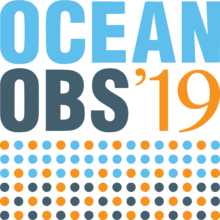 The OceanObs’19 conference is a community-driven conference that brings people from all over the planet together to communicate the decadal progress of ocean observing networks and to chart innovative solutions to society’s growing needs for ocean information in the coming decade.
The OceanObs’19 conference is a community-driven conference that brings people from all over the planet together to communicate the decadal progress of ocean observing networks and to chart innovative solutions to society’s growing needs for ocean information in the coming decade.
OceanObs’19 will strive to improve the governance of a global ocean observing system, including advocacy, funding, and alignment with best practices and to designate responsibility for product definition, including production and timely delivery at the appropriate scales (global, basin, regional, national) to serve user needs. The conference program will be built focusing on a single objective each day to provide adequate time to answer to the proposed questions.
Registration to OceanObs’19 is now open on the conference website.
The post Registration open to OceanObs’19 appeared first on EuroGOOS.
Ocean Observing showcases at the EuroGEOSS workshop
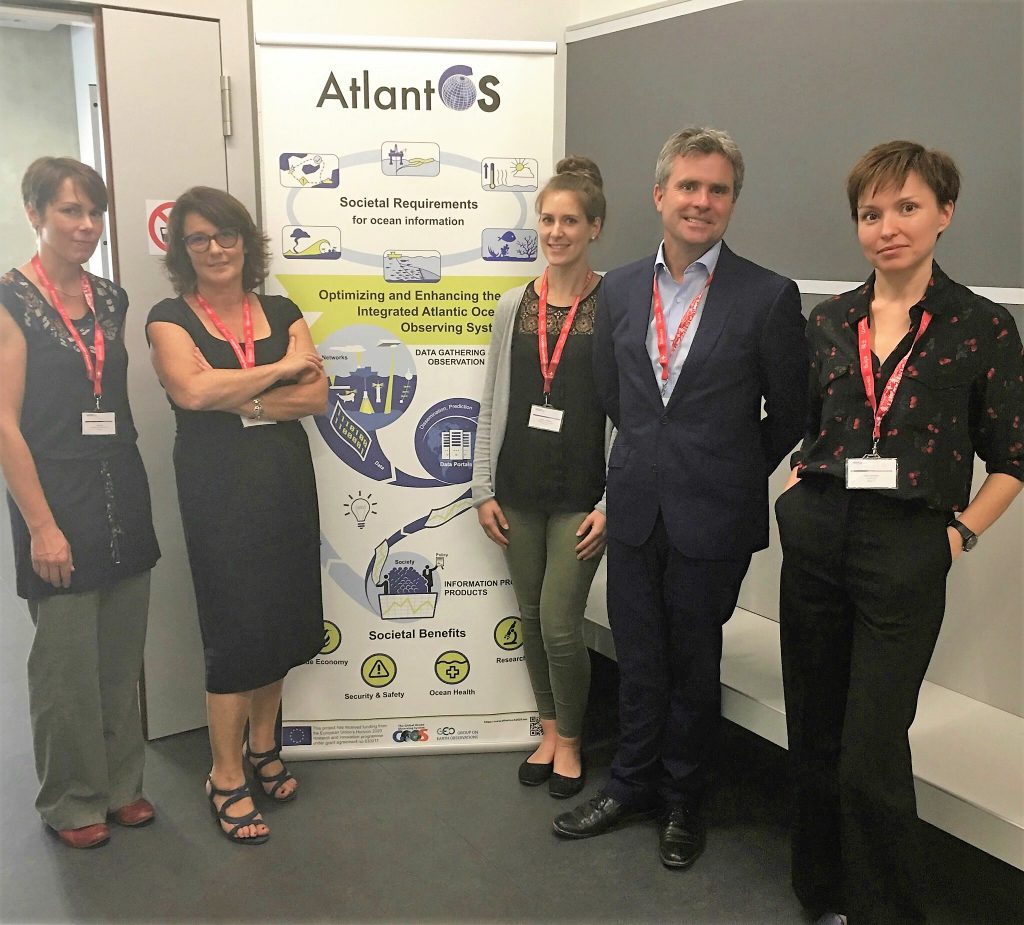
SDG14 breakout participants and co-chairs at the EuroGEOSS workshop, from left: Anja Reitz, GEOMAR, Michèle Barbier, Institute for Science and Ethics, Sandra Ketelhake, GEOMAR, Glenn Nolan and Dina Eparkhina, EuroGOOS
The EuroGEOSS workshop took place in Geneva from 12 to 14 September. At the workshop, the H2020 AtlantOS project and EuroGOOS co-organized and co-chaired a breakout session “Monitoring for FAIR data principles – how could European expertise foster the implementation of SDG 14 objectives?” on 13 September 2018.
The breakout session discussed how ocean observing experts can link their knowledge, data, and best practices with the Sustainable Development Goals (SDGs), particularly with the SDG 14 targets and indicators. With support from UN Environment, an international team of semantic technology experts has developed a FAIR-compliant knowledge representation resource (an ontology) for the SDG process. Ontologies express, integrate, harmonise, and expose human knowledge on the web, allowing computers a means to ‘understand’ what in situ and remote data and information holdings are about. Furthermore, the session discussed how the European initiatives and projects as well as GEO link with the SDG targets and how the work carried out is implementing ethics in marine research and data management.
The session’s conclusions and recommendations to EuroGEOSS included:
- Recognize achieving SDGs requires sustained and comprehensive Earth observation systems incl. both in situ and remote sensing systems;
- Policy users will use the EO-generated knowledge only if it considers multidisciplinary stakeholder perspectives;
- User-centric approach is welcome;
- Promote multidisciplinary methodologies;
- Help integrate open data, promote standards and interoperability;
- Help transparency, communication and common terminology;
- Leverage best practices;
- Apply ethics values in data acquisition and management;
- Help ensuring SDG interface ontology and FAIR principles are shaped and applied to European data systems;
- Help make the connection between European policies and larger initiatives including the essential climate and ocean variables and the SDGs.
Both EuroGOOS and AtlantOS were involved in other sessions of the workshop. AtlantOS organised a hands-on session on 13 September to illustrate how ocean observing applications produced within the project have fostered the optimisation and enhancement of the Atlantic Ocean Observing System.
EuroGOOS presented the EOOS poster and explained the EOOS progress in a lightning talk.
All presentations will be made available on the EuroGEOSS website. The AtlantOS newspiece about the breakout and the hands-on sessions is available here.
The post Ocean Observing showcases at the EuroGEOSS workshop appeared first on EuroGOOS.
EurOCEAN Conference – save the date
EurOCEAN conferences have become important fora for the marine and maritime research community and wider stakeholders. Started in 2004, the series provides an interface with European and national policymakers and strategic planners, to consider, discuss and respond to new marine science and technology developments, challenges and opportunities.
EurOCEAN 2019 date and place have been announced by the European Marine Board who support the organization of this conference series. The event will be hosted by UNESCO IOC in Paris on 11 and 12 June. At the event, EMB plan to also launch their next report of the Navigating the Future foresight series, Navigating the Future V.
Further information is available on the event’s website
The post EurOCEAN Conference – save the date appeared first on EuroGOOS.
2018 Kostas Nittis Medal awarded to Florent Gasparin
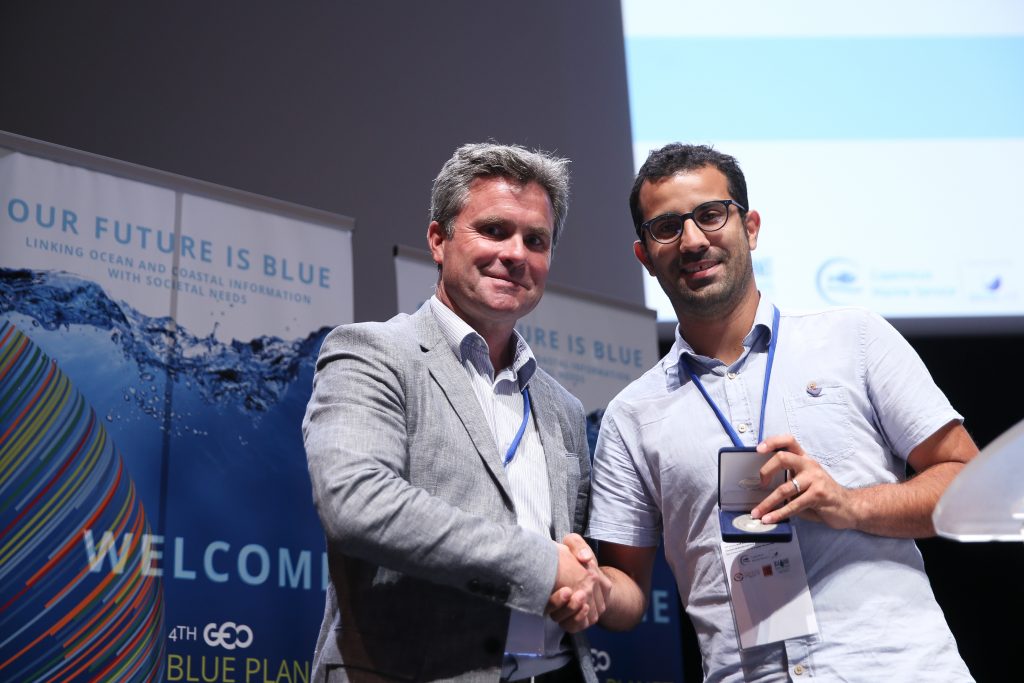 At the end of the GEO Blue Planet Symposium plenary on 4 July, Glenn Nolan, EuroGOOS Secretary General, awarded the 2018 Kostas Nittis Medal to Florent Gasparin. The Medal is awarded yearly by the EuroGOOS Executive Directors Board to a young scientist who has made a significant contribution to operational oceanography.
At the end of the GEO Blue Planet Symposium plenary on 4 July, Glenn Nolan, EuroGOOS Secretary General, awarded the 2018 Kostas Nittis Medal to Florent Gasparin. The Medal is awarded yearly by the EuroGOOS Executive Directors Board to a young scientist who has made a significant contribution to operational oceanography.
“The EuroGOOS Kostas Nittis Medal honours Dr. Kostas Nittis, EuroGOOS Secretary General and strategic leader, and we hope it will help young talented researchers expand their scientific networks and horizons”, said Glenn Nolan. The Medal comes with a grant to attend and give presentations at relevant scientific conferences.
Florent Gasparin, researcher at Mercator Ocean International, specializes in in-situ observations with an outlook towards an integrated Global Ocean Observing System. He is involved in the EU AtlantOS project, in which he works on a physical Observing System Simulation Experiment (OSSE) conducted by European forecasting centers. This effort provides quantitative information of how further evolution of the in-situ networks would impact on global ocean monitoring and forecast.
Photo credit: Mercator Ocean International
The post 2018 Kostas Nittis Medal awarded to Florent Gasparin appeared first on EuroGOOS.
EOOS conference programme released
 EOOS conference, Evolving the European Ocean Observing System: Connecting communities for end-to-end solutions, will take place in Brussels on 21-23 November 2018. The draft programme is now available.
EOOS conference, Evolving the European Ocean Observing System: Connecting communities for end-to-end solutions, will take place in Brussels on 21-23 November 2018. The draft programme is now available.
The conference aims to further connect European ocean observing communities, building on the success of the EOOS Forum on 8 March 2018. At the conference, the EOOS strategy and implementation plan will be discussed – drafts currently in review after an open stakeholder consultation (25 April – 25 June 2018).
Conference registration is free of charge and ongoing. The event will take place from 14:00 hours on Wednesday 21 November and run until 14:00 hours on Friday 23 November. Location: The Egg, 175 Rue Bara, 1070 Brussels.
There is an opportunity to submit applications for posters, exhibition space, and meeting room facilities at the EOOS conference. Applications deadline has been extended to 13 August.
The post EOOS conference programme released appeared first on EuroGOOS.
EuroGOOS Kostas Nittis Medal Call
 EuroGOOS Kostas Nittis Medal was established in the memory of EuroGOOS Secretary General and strategic leader Dr. Kostas Nittis. The Kostas Nittis Medal is accompanied by a grant and awarded to a young marine professional within the operational oceanography and broader ocean observing community.
EuroGOOS Kostas Nittis Medal was established in the memory of EuroGOOS Secretary General and strategic leader Dr. Kostas Nittis. The Kostas Nittis Medal is accompanied by a grant and awarded to a young marine professional within the operational oceanography and broader ocean observing community.
The Kostas Nittis Medal and the grant amounting to € 3,000 aim to support the participation of young researchers and marine professionals in relevant conferences and events. The awardee is given a chance to present their research or technology at relevant events, building a professional network, gaining real life experience and reaching out to potential partners and/or employers.
The call is open to marine researchers or professionals according to the following criteria:
- Candidate must be younger than 35 years old;
- Candidate will have made a significant contribution to operational oceanography (technology, research, software, product/service) which is described and documented;
- Candidate nominations must come from the current EuroGOOS members.
Deadline for nominations: 24 June 2018
Nomination call:
 EuroGOOS-KNMedal-Call 2018 (155.4 KiB)
EuroGOOS-KNMedal-Call 2018 (155.4 KiB)
Kostas Nittis Medal flyer: Download
The award ceremony for the 2018 medal will take place at the international GEO Blue Planet Symposium (4-6 July, Toulouse, France).
Previous winners of the Kostas Nittis Medal are:
- Pablo Lorente Jimenez, Puertos del Estado, Spain
- Angelique Melet, Mercator Ocean, France
- Robert King, Met Office, UK
The post EuroGOOS Kostas Nittis Medal Call appeared first on EuroGOOS.
First EMSO ERIC call for transnational access to its facilities
The European Multidisciplinary Seafloor and Water Column Observatory, EMSO ERIC, have launched its first call for a transnational access to its facilities. The call will offer a free access to three EMSO ERIC facilities, EMSO PYLOS, EMSO SmartBay, and EMSO NICE.
Through the call, external measuring systems can be installed at those facilities, e.g. instruments, systems, new technologies; and new procedures can be tested. This call offers a unique opportunity for scientists and engineers to avail of high-quality interlinked instrumented infrastructures operating in open ocean observatories for carrying out research and/or testing activities.
Application submission deadline is 31 July 2018. Further information is available on the EMSO website.
EMSO ERIC is affiliated with EuroGOOS as a EuroGOOS Task Team.
The post First EMSO ERIC call for transnational access to its facilities appeared first on EuroGOOS.
INTAROS survey of the Arctic in situ observations
The INTAROS project is conducting an open survey of Arctic in situ observations of the ocean, atmosphere, terrestrial sphere and cryosphere, retrieved through established networks/observing systems as well as individual large projects. The survey will help assess the existing Arctic in situ observing systems in terms of data delivery chain, accessibility, and spatial-temporal coverage. The answers will enhance the visibility of the assessed data, and will facilitate data discovery for stakeholders and data users.
Take the survey and read background information here
The post INTAROS survey of the Arctic in situ observations appeared first on EuroGOOS.
Boosting European sensor technologies market – best practice guide released
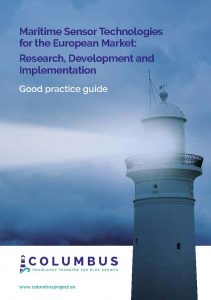 The Horizon 2020 COLUMBUS project has delivered a new guide sharing best practices, highlighting bottlenecks, and giving recommendations for a successful knowledge transfer in maritime sensor technologies.
The Horizon 2020 COLUMBUS project has delivered a new guide sharing best practices, highlighting bottlenecks, and giving recommendations for a successful knowledge transfer in maritime sensor technologies.
Over the course of successive EU Framework Programmes, the European Commission has made a significant investment in research and innovation projects designed to advance ocean observing and monitoring capacities through the development of marine environmental sensing technologies. However, the Commission’s vision to deliver a suite of new sensors which would be a commercial and operational success and support key policy and management objectives has not yet been fully realised. Ex-post assessment suggests that there is a disconnect between the ambitious goals set out in the original call texts, and what is actually achievable within the confines of a 3-4 year collaborative research project. Some of the EU projects have been successful in commercialising products, demonstrating prototypes, and transferring innovative software to industry. Yet, the development of many promising technology leads has now stalled and may not be advanced any further because the project funding cycle has ended.
The guide gives recommendations in the following areas:
- Designing the funding call and the project with knowledge management and expected impact in mind;
- Advancing marine technology intellectual property through a virtual market place;
- Boosting the market through policy and regulation.
The guide emphasizes future calls in the area of marine sensor development should set out very clear and achievable expectations. They should allow for realistic proposals and discourage the kind of over-reach on behalf of the proposers which is common and increasingly necessary in a highly competitive R&D environment. Equally important is to ensure that the ‘need’ or ‘demand’ according to which the call was launched is real and has been identified in collaboration with the proposed end-users/implementers of the new technology.
The guide may be of interest to a wide audience but is particularly targeted at funding agencies commissioning marine technology research and at technology developers (private and academic) engaged in such research. Technology implementers and intermediaries will equally be interested in some of the recommendations and findings.
The Horizon 2020 COLUMBUS project, which ended in February 2018, worked to identify and transfer unexploited knowledge generated by EU-funded science and technology research to actors with the potential to capitalise on it for a measurable value creation.
This COLUMBUS guide was developed as a result of discussions with COLUMBUS and AtlantOS project partners, speakers and participants at the COLUMBUS Brokerage Events ‘Knowledge Transfer in Maritime Sensing Technologies’ on 23 November 2017 (AtlantOS General Assembly 2017, Gran Canaria) and on 23 January 2018 (EuroGOOS Headquarters, Brussels).
Download the publication
The post Boosting European sensor technologies market – best practice guide released appeared first on EuroGOOS.
8th EuroGOOS Conference Proceedings released
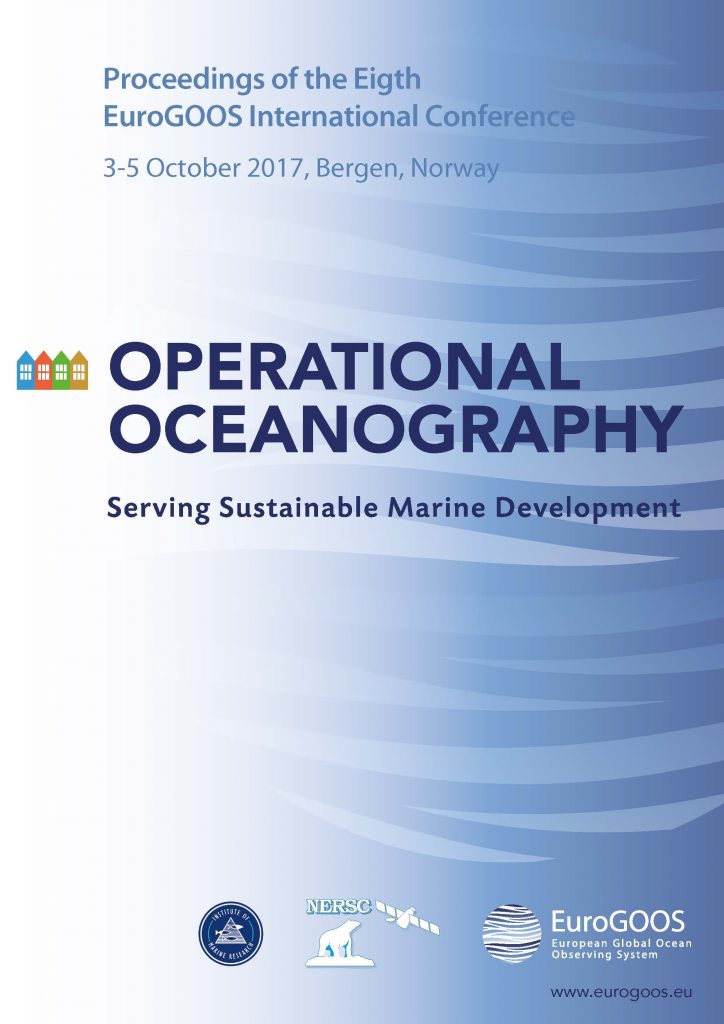 The 8th EuroGOOS Conference Proceedings, Operational Oceanography Serving Sustainable Marine Development, have been released today. The EuroGOOS international conferences are tri-annual milestone events for operational oceanographic sciences. The conferences reflect the state of play and set future priorities for European oceanography across the full value chain, from observations to data processing and modelling, and to delivering fit-for-purpose services and products for users.
The 8th EuroGOOS Conference Proceedings, Operational Oceanography Serving Sustainable Marine Development, have been released today. The EuroGOOS international conferences are tri-annual milestone events for operational oceanographic sciences. The conferences reflect the state of play and set future priorities for European oceanography across the full value chain, from observations to data processing and modelling, and to delivering fit-for-purpose services and products for users.
The 8th EuroGOOS international conference, titled Operational Oceanography in Service of Sustainable Marine Development, took place in Bergen, Norway, on 3-5 October 2017. The event was co-hosted by the Institute of Marine Research, IMR, and the Nansen Environmental Remote Sensing Centre, NERSC, and co-organized with the EuroGOOS office. Delegates from 24 countries and many international, European and regional networks attended. The programme included two plenary sessions running on the first and last days of the conference, a poster session, and a day-long splinters session featuring 54 talks across the marine observation and data value chain.
Download the 8th EuroGOOS Conference Proceedings
The post 8th EuroGOOS Conference Proceedings released appeared first on EuroGOOS.
EOOS Forum was a critical step to move forward – an overview
A full-day EOOS forum on 8 March brought together 80 ocean science managers, researchers, policymakers and private companies on the topic of ocean observations.
The information required to do business, research or ensure security at sea is based on an array of ocean observing infrastructures. We rely heavily on ocean information, but its sources are disparate, with measurements taken for various purposes, over disrupted time scales, and to different standards. Europe, trying to capitalize on the shared benefits of cooperation in ocean research and the blue economy, needs an end-to-end and sustained European Ocean Observing System (EOOS), allowing all users and implementers of ocean observations find information and help they need.
The EOOS framework is being developed by EuroGOOS and European Marine Board with experts and advisors from many regional, national and pan-European organizations. While there’s a broad agreement that such a framework is urgently needed for Europe, it is still unclear how exactly to fulfill this ambitious task. At the EOOS forum on 8 March, delegates brainstormed on the critical EOOS questions, including system design tools, funding, governance, technologies and innovation, as well as communications.
‘Without ocean observations we are living in the dark’ was stated at one of the group discussions, but ‘a cultural step change is needed to break the silos between multiple stakeholders’. EOOS will gather information on monitoring plans, discuss funding priorities, and engage with new partners. EOOS will also help make a business case for ocean observations and allow the community to reach out to governments, engage more systematically with regional efforts and inform pan-European research programming. EOOS forum delegates strongly emphasized the need to listen to the needs of various ocean observing users, to ensure EOOS is genuinely fit-for-purpose.
An EOOS strategy and implementation plan will take on board the valuable intellectual inputs from the EOOS forum. These documents will present an EOOS vision and concrete steps over the coming five years and be open for stakeholder consultation in the spring. The finalized drafts will be presented for adoption at the EOOS conference on 21-23 November.
The post EOOS Forum was a critical step to move forward – an overview appeared first on EuroGOOS.
EOOS Forum on 8 March ‘Integrated and Sustained Ocean Observing: A European Strategy’ – Registration Open!
Registration is open for the EOOS Forum taking place in Brussels on 8 March 2018. The Forum will bring together main ocean observing stakeholders in Europe and beyond to examine the extent to which the current ocean observing systems are sustainable today, and what opportunities and threats there are.
The EOOS Forum will discuss the EOOS strategy, developed further to the stakeholder consultation Dec. 2016- Jan. 2017, and seek feedback from the funders, implementers and users of ocean observations on the way forward.
Further information and registration are available on the dedicated Forum webpage on the EOOS website.
The post EOOS Forum on 8 March ‘Integrated and Sustained Ocean Observing: A European Strategy’ – Registration Open! appeared first on EuroGOOS.
Building a European Ocean Observing System (EOOS): Save the date for two events in 2018
Save the date for two milestone EOOS events in 2018:
- EOOS Forum, 8 March 2018, Brussels, and
- EOOS Conference, 21-23 November 2018, Brussels.
Developed in synergy these events will address how to:
- Align and connect existing initiatives to ensure efficiency and value for money;
- Identify gaps in the European observing capacity and foster initiatives to fill those gaps;
- Promote observing capacities which can benefit multiple sectors including research, policy, management, and industry;
- Ensure that European ocean observing is integrated into the global observation systems.
EuroGOOS and EMB have joined efforts to help promote and set up a comprehensive framework for the European ocean observations, the European Ocean Observing System (EOOS). The EOOS process started back in 2007 during the development of the European Integrated Maritime Policy – the ocean science and observations communities made a clear call on the policymakers that for an integrated maritime policy an integrated European ocean observing is critical. The current system in Europe is predominantly based on the observations done by individual states, and for their specific purposes. The European Union have established a strong policy framework to promote sustainable observations, and have set up important and effective marine data integration initiatives. However, without the critical national European efforts, those pan-European initiatives and frameworks are not sustained.
EOOS vision is to develop a truly integrated and sustained European ocean observing capacity, where decisions and focus areas can be jointly made and prioritized, helping to achieve fit-for-purpose services for a wide range of ocean users, from industry, to science, to policy and society.
In 2016, EuroGOOS and EMB brought together an EOOS steering group composed of several ocean observing experts and European Commission representatives, to advance the EOOS vision and drive forward the first integration steps. The EOOS steering group developed a consultation document on EOOS which was open for public stakeholder consultation in late 2016-early 2017. Based on the results, the EOOS strategy will be developed and finalized at the EOOS Forum on 8 March 2018. Major national and international stakeholders responsible for ocean observing funding will get together for the EOOS Forum to discuss the way forward for the EOOS strategy. Eight months later, on 21-23 November, an EOOS Conference, organized with the EMODnet secretariat, will take place to discuss the implementation steps with a broad EOOS community and related initiatives in Europe and beyond.
All information about the events will be made available on the EOOS website
The post Building a European Ocean Observing System (EOOS): Save the date for two events in 2018 appeared first on EuroGOOS.
Our Ocean 2017: Overview of its unprecedented success and EuroGOOS exhibition presence
Scroll down for the event’s photogallery
On 5 and 6 October 2017, the European Union hosted the 4th edition of the international Our Ocean conference in Malta. Our Ocean 2017 brought together world leaders, generated commitments, and showcased ocean initiatives around the globe. The conference resulted in an unprecedented engagement across policymakers, NGOs, foundations, research organizations and businesses. In total, Our Ocean 2017 generated:
• 437 tangible and measurable commitments;
• EUR 7.2 billion in financial pledges;
• 2.5 million square kilometres of additional Marine Protected Areas.
EuroGOOS had a strong presence at the conference exhibition, with a dedicated ocean observing showcase displayed on an interactive white board and an Ocean Talk on the exhibition pitch stage. A picture gallery can be found at the bottom of this article. In the EuroGOOS Ocean Talk, Erik Buch, EuroGOOS Chair, explained what constitutes the ocean observing and why it is a critical research and technology area underpinning any decision making in the ocean domain. The EuroGOOS Ocean Talk featured the end-to-end marine observations and data value chain and explained the drivers for observations for maritime and policy users. In partnership with the global community and in particular the Global Ocean Observing System coordinated by the Intergovernmental Oceanographic Commission of UNESCO, EuroGOOS continues to strive towards sustained European ocean observing capacity and services.
Moreover, EuroGOOS launched, as part of its Ocean Talk, its first ocean literacy publication. The EuroGOOS child book, The Ocean Is My Home, was presented by Dina Eparkhina, EuroGOOS Policy and Communications Officer. Subtitled, For Children, Parents and Our Ocean, this book, published on the occasion of the conference, explains the ocean’s ecosystem and economic role and the need to collect knowledge about it. Readers will have a glimpse of ocean observing technologies and find out what each of us can do for the ocean regardless whether we live close to it or far away. The book was very well received, disseminated during the EuroGOOS Ocean Talk, and also handed to several high-level conference presenters, among others Vladimir Ryabinin, IOC Executive Secretary, and Peter Thomson, the UN Special Envoy for the Ocean.
The Our Ocean 2017 website will remain active. It features all the speeches, presentations, and commitments made during the conference. The EuroGOOS Ocean Talk can be viewed at this link.
Next Our Ocean conferences will take place in Bali, Indonesia, in 2018, followed by Norway in 2019, and Palau in 2020.
Link to the Our Ocean plenary video recording
Link to the exhibition hall Ocean Talks video recording
Download the EuroGOOS press release for the launch of the ocean literacy child book
Download the EuroGOOS ocean literacy child book, The Ocean is my Home
Download the new EuroGOOS general brochure
The post Our Ocean 2017: Overview of its unprecedented success and EuroGOOS exhibition presence appeared first on EuroGOOS.
The 8th EuroGOOS International Conference: Main outcomes
 The 8th EuroGOOS international conference, titled Operational Oceanography in Service of Sustainable Marine Development, took place in Bergen, Norway, on 3-5 October 2017. The event was co-hosted by the Institute of Marine Research, IMR, and the Nansen Environmental and Remote Sensing Centre, NERSC, and co-organized with the EuroGOOS office.
The 8th EuroGOOS international conference, titled Operational Oceanography in Service of Sustainable Marine Development, took place in Bergen, Norway, on 3-5 October 2017. The event was co-hosted by the Institute of Marine Research, IMR, and the Nansen Environmental and Remote Sensing Centre, NERSC, and co-organized with the EuroGOOS office.
Delegates from 24 countries and many international, European and regional networks attended. The programme included two plenary sessions running on the first and last days of the conference, a poster session, and a day-long splinters session featuring 54 talks across the marine observation and data value chain.
On the opening day of the conference, the 2017 Kostas Nittis Medal and grant to a young researcher were awarded to Robert King from Met Office, UK. Robert presented an impressive amount of work done for improving operational forecasting systems and in situ data assimilation in oceanographic models, in his plenary flash talk.
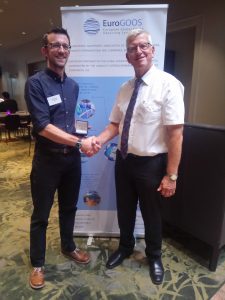
Robert King, the winner of the 2017 Kostas Nittis Medal, with Erik Buch, EuroGOOS Chair, at the EuroGOOS 2017 Conference
The conference resumed with a forward-looking address from Peter Haugan, chair of the UNESCO Intergovernmental Oceanographic Commission, IOC, calling the EuroGOOS community to join the IOC efforts towards an impactful global Ocean Science Decade.
The EuroGOOS conference discussed major developments in operational oceanography in recent years. Cooperation among ocean observing and data aggregation initiatives have progressed strongly since the previous conference in 2014, noted Erik Buch, EuroGOOS chair. Furthermore, several marine research infrastructure networks have transitioned to full legal entities towards a robust and timely data delivery for a wide range of users. Biogeochemistry observations have also progressed considerably, as did the awareness of the critical importance of those measurements.
EuroGOOS has played an important role facilitating dialogue and synergy across actors and promoting the value of ocean observing services to science, policy and blue economy. The conference demonstrated the importance of an end-to-end and fit-for-purpose oceanographic system. In this respect, the EuroGOOS work facilitating an integrated European Ocean Observing System, undertaken with the European Marine Board, is very important to achieve reliable and sustained oceanographic services.
Europe remains well positioned to take a global lead in operational oceanography. Presentations at the EuroGOOS conference demonstrated a community delivering high-quality assessments of past, current and future ocean state for a wide range of users.
Looking ahead, EuroGOOS will continue to advocate for sustained ocean observations in Europe and globally, in partnership with the Global Ocean Observing System, GOOS, and its regional alliances, as well as further building capacity worldwide. Promoting ocean literacy, to both policy and society, will also be a part of the EuroGOOS efforts. Furthermore, EuroGOOS will continue to promote open exchange of oceanographic data.
Further information about the 8th EuroGOOS Conference is available on the conference website. The proceedings will be released by the end of 2017.
The post The 8th EuroGOOS International Conference: Main outcomes appeared first on EuroGOOS.
SDG 14: EuroGOOS commitment towards sustained and integrated ocean observing and open data sharing
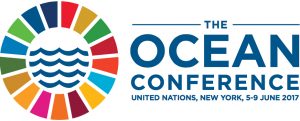 Today on World Oceans Day, EuroGOOS submitted its commitment to the UN Sustainable Development Goal 14 towards Sustained and Integrated Ocean Observing and Open Data Sharing (view on the UN Ocean Conference website).
Today on World Oceans Day, EuroGOOS submitted its commitment to the UN Sustainable Development Goal 14 towards Sustained and Integrated Ocean Observing and Open Data Sharing (view on the UN Ocean Conference website).
In the statement, EuroGOOS commits to further its efforts to coordinate European ocean observing supporting networks of Regional Operational Oceanographic Systems (ROOSes) and ensuring their integration in the Global Ocean Observing System. EuroGOOS ROOSes and networks of observing platforms (Task Teams) play an important role in unlocking marine data collected by individual European nations and enhancing open data exchange as well as data standardization and harmonization. EuroGOOS commits to further the integration of the existing marine data towards interoperability, promoting open data and engaging with a wide range of stakeholders holding or collecting data. Furthermore, EuroGOOS will increase its communication and outreach efforts to inform policy and decision makers as well as wider stakeholders, towards ocean literacy and responsible long-term vision for sustainable ocean management.
Read the EuroGOOS commitment towards ‘Sustained and Integrated Ocean Observing and Open Data Sharing’ on the UN Ocean Conference website
The post SDG 14: EuroGOOS commitment towards sustained and integrated ocean observing and open data sharing appeared first on EuroGOOS.
EuroGOOS General Assembly 2017: Main highlights
EuroGOOS General Assembly took place in Brussels from 31 May to 2 June 2017. 56 delegates attended the special open session dedicated to ocean observing and derived marine data and services. EuroGOOS and European Marine Board presented the progress in the development of an integrated and sustained European Ocean Observing System, EOOS. Coordinated by those two networks, EOOS is being built as an open and inclusive framework. The recent stakeholder consultation delivered valuable recommendations to the EOOS steering group co-chaired by EuroGOOS and EMB. Furthermore, global efforts of GOOS and the G7 ministers’ ocean observation initiative were presented.
Copernicus vision and ongoing integration and optimization efforts were showcased by speakers from three Copernicus services: Marine, Climate, and Security. Furthermore, the European Environment Agency shared their work in support of the in-situ component across the services. The European Space Agency updated the meeting on the Copernicus evolution and sentinel expansion.
European marine data aggregation initiatives, SeaDataNet and EMODnet, presented their work programmes. Both initiatives have entered a new phase, EMODnet having entered its third and last phase, and SeaDataNet having started a new Horizon 2020 project, SeaDataCloud.
Following the informative and fruitful special session, the meeting proceeded to discuss the EuroGOOS core activities, namely the developments in the EuroGOOS regional systems, ROOSes, infrastructure networks, Task Teams, and cross-cutting Working Groups. EuroGOOS chair and the office introduced an advancement of the EuroGOOS 2014-2020 strategy, with a set of five priorities to be implemented across all activities. The strategy will continue to be supported with a targeted communication. EuroGOOS also presented the communication efforts promoting EOOS, including a dedicated website, publications and presentations at stakeholder events.
On the last day of the Assembly, the formal session approved new EuroGOOS membership application from the Coastal Observing and Forecasting System, SOCIB, Spain, presented by director Dr. Joaquín Tintoré. The members also approved a new EuroGOOS working group on coastal oceanography aiming to integrate the in-situ observation needs, modelling and planning for the European coasts working closely with EuroGOOS regional systems, ROOSes. Finally, George Petihakis, HCMR, Greece, was nominated as chair-elect to be appointed as chair in the 2018 elections. Dr. Petihakis will start working with chair Dr. Erik Buch who will step down in 2018.
Photo below features EuroGOOS Members and Chairs of EuroGOOS Regional Operational Oceanographic Systems, ROOSes, Task Teams and Working Group, as well as members of the EuroGOOS Office, on Day 2 of the General Assembly, 1 June 2017
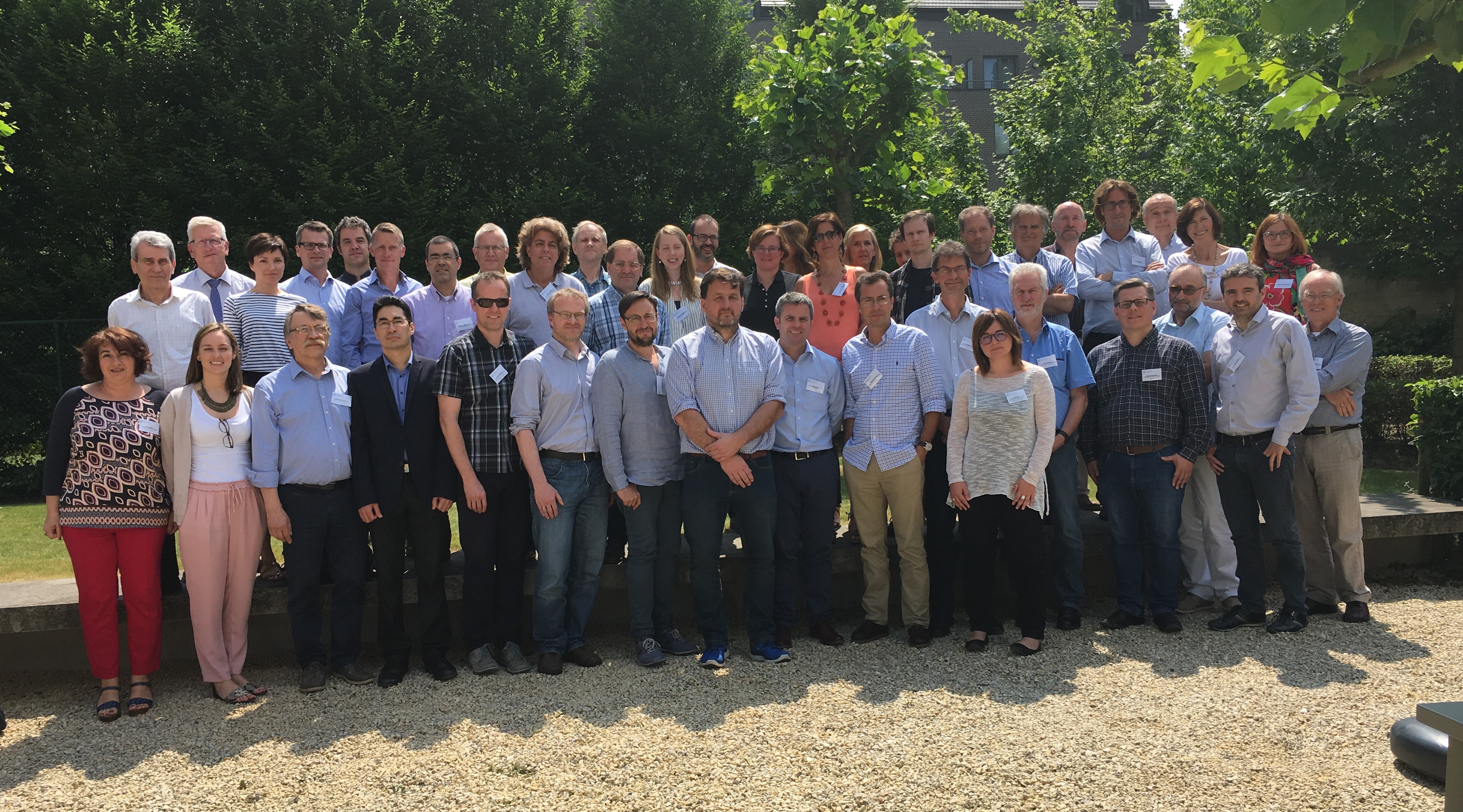
The post EuroGOOS General Assembly 2017: Main highlights appeared first on EuroGOOS.
Sea-level measurements: EuroGOOS note for policymakers released at EMD 2017
EuroGOOS Tide Gauge Task Team has delivered a statement to policymakers and public authorities. In the statement, the task team calls on national ocean observing funders to address sustainability of tide gauge networks. This note, titled “Sea level observation networks in and around Europe: Challenges in monitoring increasing sea level hazards”, has been released at the European Maritime Day 2017 taking place in Poole, UK, on 18 and 19 May.
Sea-level is an indicator of climate change and strongly affects coastal populations. It has been recognised as an Essential Ocean Variable by the Global Ocean Observing System (GOOS). Tide gauge measurements have been taken for centuries and today remain a key method to observe trends in mean sea level. Tide gauge data help assess extreme events, make tidal predictions and geodetic applications, support harbour operations and navigation. Furthermore, tide gauge measurements play an increasingly important role in warning systems for tsunamis and storm surges.
In 2016, the EuroGOOS Tide Gauge Task Team conducted a study of tide gauge operations in Europe and neighbouring coastal countries. As a result, the study revealed that more than half of the institutions and nearly 25% of the tide gauge stations surveyed may be facing funding problems. Should a national tide gauge network be shut down for financial reasons, a blind spot would appear on the map affecting policymakers and public authorities’ decision making in assessing storm surges, tsunamis, and sea-level elevation. The study concluded there is an urgent need to ensure the sustainability of tide gauge stations in Europe and the Mediterranean region.
Download the EuroGOOS Tide Gauge Task Team note to policymakers
More about the EuroGOOS Tide Gauge Task Team
The post Sea-level measurements: EuroGOOS note for policymakers released at EMD 2017 appeared first on EuroGOOS.
EuroGOOS Kostas Nittis Medal and travel grant to young researchers: Call open!
In 2015, EuroGOOS established the Kostas Nittis Medal in the memory of EuroGOOS Secretary General and strategic leader Dr. Kostas Nittis (1964-2014). The Kostas Nittis Medal is accompanied by a grant and awarded to a young marine professional within the operational oceanography and broader ocean observing community.
The Kostas Nittis Medal and the grant amounting to € 3,000 aim to support the participation of young researchers and marine professionals in relevant conferences and events. The awardee is given a chance to present their research or technology at relevant events, building a professional network, gaining real life experience and reaching out to potential partners and/or employers.
The call is open to marine researchers or professionals according to the following criteria:
- Candidate must be younger than 35 years old;
- Candidate will have made a significant contribution to operational oceanography (technology, research, software, product/service) which is described and documented;
- Candidate nominations must come from the current EuroGOOS members.
Deadline for nominations: 20 August 2017
Download the full nominations call  EuroGOOS KNMedal Call (92.1 KiB)
EuroGOOS KNMedal Call (92.1 KiB)
Download the Kostas Nittis Medal flyer  EuroGOOS Kostas Nittis Medal Flyer (305.4 KiB)
EuroGOOS Kostas Nittis Medal Flyer (305.4 KiB)
The award ceremony for the 2017 medal will take place at the 8th EuroGOOS International Conference in Bergen on 3-5 October 2017.
The first Kostas Nittis Medal 2015 was awarded to Pablo Lorente Jimenez by European Commissioner for Environment, Maritime Affairs and Fisheries Karmenu Vella at the European Maritime Day 2015 in Athens, see our news item here. The second medal 2016 was received by Angelique Melet at a dedicated event of the EuroGOOS Annual Assembly Stakeholders Day, see our news item here.
The post EuroGOOS Kostas Nittis Medal and travel grant to young researchers: Call open! appeared first on EuroGOOS.
Call for abstracts open for 8th EuroGOOS Conference (3-5/10/2017)
 EuroGOOS 2017 Conference Priorities (124.6 KiB)
EuroGOOS 2017 Conference Priorities (124.6 KiB)
Abstract submission is now open for the 8th EuroGOOS International Conference, Operational Oceanography Serving Sustainable Marine Development, to take place in Bergen, Norway, from 3 to 5 October 2017.
Key priorities of the 2017 EuroGOOS conference are:
- Highlight the progress in linking and aligning European ocean observing stakeholders and initiatives towards building an integrated and sustained European Ocean Observing System (AtlantOS, INTAROS, and others);
- Highlight the progress made in integrating and aggregating European marine data to enhance its societal and economic potential (Copernicus Marine Service, EMODnet, SeaDataNet, and others);
- Identify community priorities regarding the evolution of the Copernicus Marine Environment Monitoring Service;
- Evaluate the role of marine research infrastructures in the operational oceanographic system;
- Emphasise new initiatives under way for polar seas (observation and predictive capabilities);
- Explore some of the new technologies for coastal operational oceanography;
- Elaborate the role of acoustic technologies in the ocean observing system;
- Evaluate the ongoing efforts to integrate ocean observing and data initiatives at a global level, meeting the societal, policy and economic needs.
Abstract submission, registration and further information on the conference website
 EuroGOOS 2017 Conference Priorities (124.6 KiB)
EuroGOOS 2017 Conference Priorities (124.6 KiB)
The post Call for abstracts open for 8th EuroGOOS Conference (3-5/10/2017) appeared first on EuroGOOS.
Engaging industry in use and sharing European marine data: New guide released
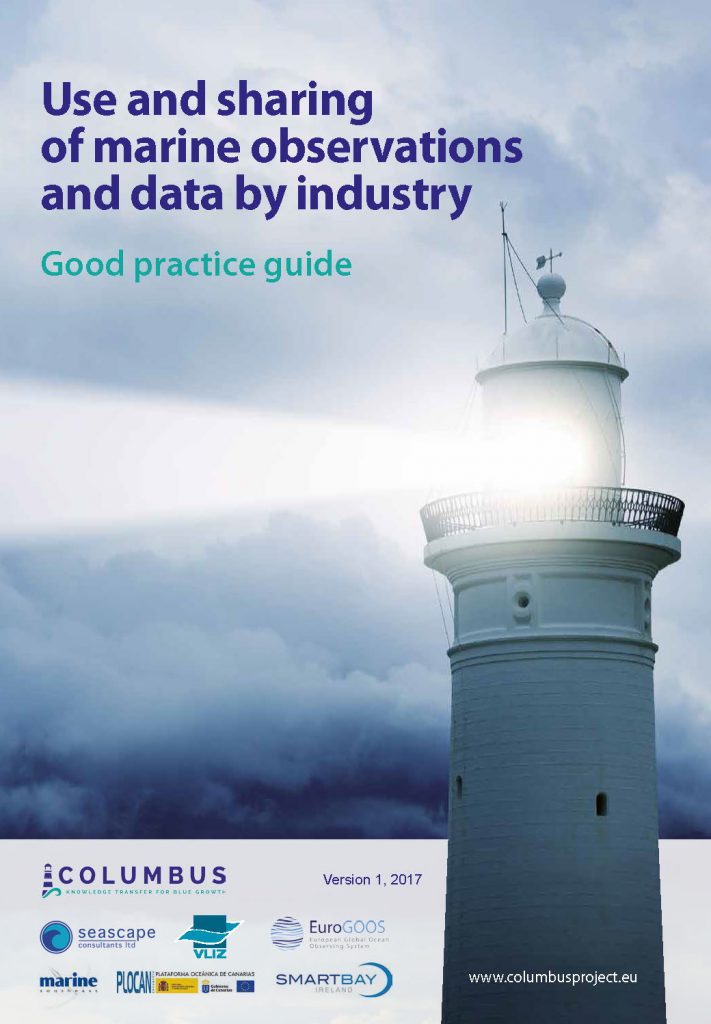 The capacity of marine data and information to deliver sustainable economic benefits has been recognized. However, coastal and ocean observatories and public data-sharing initiatives face common challenges in demonstrating uptake and application of open marine data and information for economic development and innovation. This is critical for those initiatives aiming to deliver growth in the blue economy, particularly in terms of justifying the continued investment of public funds. The COLUMBUS project has released a guide to help public ocean observing and data initiatives engage with Blue Growth industries.
The capacity of marine data and information to deliver sustainable economic benefits has been recognized. However, coastal and ocean observatories and public data-sharing initiatives face common challenges in demonstrating uptake and application of open marine data and information for economic development and innovation. This is critical for those initiatives aiming to deliver growth in the blue economy, particularly in terms of justifying the continued investment of public funds. The COLUMBUS project has released a guide to help public ocean observing and data initiatives engage with Blue Growth industries.
Currently, the European Union provides a considerable investment in marine monitoring and observation, data sharing and assembly, as well as downstream services. As a result, significant progress has been made to collect, aggregate and make publicly available the data and information derived from monitoring and observing our European seas and oceans. So, what is hindering effective engagement of industry with marine observatories and related data-sharing initiatives?
This guide explores these issues and makes concrete recommendations on how to stimulate a dialogue between public data collectors, providers and portals, and data users or providers from the private sector.
The primary target audience for this document are the European marine observatories and public data-sharing initiatives that cite industry as a target user group for their resources. However, this information could also be valuable to companies and other stakeholders operating in the blue economy who are collecting, processing and/or using marine data as part of their activities.
Download the guide on use and sharing of marine observations and data by industry (April 2017)
The guide is presented for the first time at the Ocean Business brokerage event organized within the Jerico-Next project, on 4 April 2017.
The post Engaging industry in use and sharing European marine data: New guide released appeared first on EuroGOOS.
Marine/Maritime Spatial Planning Conference, 15-17 March: Key points and EuroGOOS showcase
Scroll down for the event’s photogallery
The 2nd International Conference on Marine/Maritime Spatial Planning (MSP) took place at UNESCO, Paris, on 15-17 March. The conference brought together 300 MSP practitioners, consultants, environmental managers, policymakers, and social-economists. The participants discussed the lessons learnt in the MSP process, and looked ahead, re-confirming the critical role of MSP for a broad range of ocean-related issues, from environment to economy (international ocean governance, Agenda 2030, blue economy, climate).
EuroGOOS showcased the importance of ocean knowledge and information for informed decision-making in the MSP process. At our exhibition stand, the conference participants were learning about the ongoing European efforts across the whole marine data value chain, from data collection, to data aggregation and processing, to data services and products for various types of users. Copernicus Marine Service, CMEMS, activities were showcased, delivering a comprehensive set of marine data products based on the information from both satellite and in-water observations. Other initiatives profiled included the European Marine Observation and Data Network, EMODnet, the European Atlantic Ocean Observing project, AtlantOS, and an integrated European ocean observing framework, EOOS, facilitated by EuroGOOS jointly with the European Marine Board.
‘MSP is a data-hungry process’, shared Laura Whitford during her conference talk about the Coral Triangle Initiative. The initiative has developed an atlas providing a database of spatial and non-spatial information relevant to MSP, including, marine data and environmental and policy documents.
Complexity and integration were the key words of the conference, as regards the diversity of data requirements and the governance bottlenecks in the MSP process. This applies to both sub-national governance (involving a better coherence among various national bodies with the authority over the coastal ocean), as well as regional and international governance. Charles Ehler, UNESCO’s MSP consultant and a renowned world expert, explained that even with an optimistic projection that 80 countries will have MSP in their Exclusive Economic Zones (EEZ) by 2030, 60% of the ocean space is beyond national jurisdiction.
UNESCO pioneered international discussions on the requirements for MSP with the 1st International Workshop on MSP in 2006, contributing to an integrated approach to MSP both in Europe and worldwide. In 2009, UNESCO published a set of MSP guidelines which has served as a reference document ever since. With its 2008 Integrated Maritime Strategy, the European Union identified MSP as a cross-cutting policy tool enabling public authorities and stakeholders to apply a coordinated, integrated and trans-boundary approach. In 2014, the EU adopted an MSP Directive, and further emphasised the need for MSP in its Ocean Governance Communication 2016.
MSP is critical for an effective management of marine activities and sustainable use of ocean resources, creating a framework for consistent, transparent, sustainable and evidence-based decision-making. Therefore, MSP requires a wide range of baseline marine information and data which should be up-to-date, objective, reliable, relevant and comparable. ‘This is a unique moment in oceanography’ concluded Vladimir Ryabinin, Executive Secretary of the UNESCO’s Intergovernmental Oceanographic Commission in his conference speech.
The conference was organized jointly by the European Commission’s Directorate General for Maritime Affairs and Fisheries (DG MARE) and UNESCO’s Intergovernmental Oceanographic Commission (IOC).
Visit the conference website
The post Marine/Maritime Spatial Planning Conference, 15-17 March: Key points and EuroGOOS showcase appeared first on EuroGOOS.
Shipping in the Arctic – applications open for a student course at UNIS, Svalbard
UNIS, the University Centre in Svalbard, Norway, has opened applications for a student course on Shipping in the Arctic. The course will take place in Svalbard from 31 July to 11 August 2017.
The course is interdisciplinary, providing lectures on climate, sea ice, weather, environment, navigation, technology, infrastructure, economy, regulations, and geopolitics related to shipping in the Arctic. The lectures will address how the human factors combined with the natural environment have impact on shipping activities. The lectures will give an historic summary, a present state-of-the-art and future perspectives of Arctic shipping.
The reduction of the Arctic sea ice gives new opportunities for exploitation of energy and other resources and opens new sea transport routes between Europe, Asia and North America. Simultaneously, the presence of sea ice, darkness, limitations of bathymetric charts, infrastructure and communication services put severe constraints on how ships can operate. Furthermore, shipping is bound by environmental risks, regulations, as well as economic risks and geopolitics.
Application deadline is 15 April 2017. For further information and application procedure please visit the UNIS website.
The post Shipping in the Arctic – applications open for a student course at UNIS, Svalbard appeared first on EuroGOOS.
Future Observation System for the Arctic – new European project kicks off in Bergen
The Arctic and the 4 million people who work and live there are feeling the effect of climate change much sharper than anywhere else in the world. The Arctic environment is changing due to increased temperature. The thinning of the sea ice, melting of the Greenland Ice Sheet, and thawing permafrost bring about alarming changes. Such changes have both global and local implications, including e.g. natural hazards, extreme weather, sea level change, coastal erosion and changes in the ecosystem. Furthermore, exploitation of the Arctic resources, marine transportation and other human activities are expected to increase, putting additional pressure on this vulnerable environment.
However, we do not have enough marine data and knowledge about the state of the Arctic and ways to address those changes in a sustainable way. This is why the European Commission funded a project to build an Arctic Observation System – INTAROS. The project started last December and held its kick-off meeting in Bergen earlier this month.
The INTAROS project is coordinated by the Nansen Environmental and Remote Sensing Center (NERSC) in Bergen, Norway, with professor Stein Sandven (chair of the EuroGOOS Arctic ROOS and a long-standing EuroGOOS member) leading the work. INTAROS is one of four EU projects focusing on the Arctic and will contribute to the implementation of EU Arctic Strategy. INTAROS brings together expertise from 49 partner organisations in 20 different countries in Europe, North America and Asia with the long-term goal to implement an integrated sustainable Arctic Observation System for future generations. EuroGOOS is partner in the project, responsible for delivering recommendations on the system requirements, developing a business case and an economic benefits analysis, and contributing to the international OceanObs conference 2019.
INTAROS will develop an integrated Arctic Observation System by extending, improving and unifying existing and evolving efforts in the different parts of the Arctic. The project will capitalise on the existing systems and databases of atmosphere, ocean, cryosphere and terrestrial data. INTAROS will combine existing distributed data repositories with the new ocean measurements and provide tools for data discovery, aggregation, analysis and visualisation. A seemless information platform will be developed for an easy access to this information, critical for understanding of the environmental changes in the Arctic. INTAROS will also install new instrumentation to measure physical, chemical, biological and ecological parameters for the atmosphere, ocean, cryosphere, and terrestrial environment. These measurements will fill information gaps, compliment remotely sensed data, and improve model predictions for the Arctic. International cooperation within and beyond Europe will be essential for the outcome of the project. A pan-Arctic forum will be set up to support formulation of agreements and collaboration across the EU member states, non-EU countries and transnational organisations.
This text is based on the article by EurOcean published on the CORDIS website on 16 January 2017 (permalink : http://cordis.europa.eu/news/rcn/137515_en.html)
The post Future Observation System for the Arctic – new European project kicks off in Bergen appeared first on EuroGOOS.
End-of-year Newsletter: EuroGOOS Highlights 2016
2016 was an incredibly productive year for EuroGOOS and we would like to thank all our members, regional systems (ROOSes), task teams, working groups and multiple partners for their contributions to this work!
The 1st EuroGOOS policy brief published in May and launched at the European Maritime Day in Turku set out our priorities for the coming years. The publication was prepared based on a peer reviewed article by our Science Advisory Working Group chaired by Jun She. Other articles from the EuroGOOS community were released in the Ocean Science Journal Special Issue covering our 2014 International Conference. The proceedings of the conference are available on our website.
EuroGOOS has been driving the EOOS process, working hand in hand with the European Marine Board and the EOOS Steering Group. A steering group was set up in April and met twice this year, preparing an EOOS Consultation Document and a stakeholder consultation survey, currently ongoing until 20 January. EuroGOOS launched an EOOS visual identity, website and several dissemination materials, and explained the need for EOOS at many meetings and events. We also organized a successful science-policy event on EOOS at the European Parliament.
Ocean observing has been recognized as a priority at the highest political level (UN, COP, G7, among others) and we have continued working with our global partners, IOC, GOOS, IMOS, IOOS, WMO, JCOMM, and GEO.
Two new EuroGOOS task teams have started operation this year joining the other five existing groups already actively working towards infrastructure collaboration and sustained in-situ observations in Europe. The new task teams focus on Animal-Borne Instruments and Fixed Platforms.
At the EuroGOOS General Assembly, a young researcher from France received the second EuroGOOS Kostas Nittis Medal. After the first medal was launched in 2015 in Athens by Commissioner Karmenu Vella, the Kostas Nittis Medal and associated grant have been offering a tangible support to young researchers to promote their work and explore opportunities at international events.
EuroGOOS has become a trusted partner in a number of strategic EU projects on ocean observing, cross-disciplinary collaboration and research infrastructures. Contracts with both the European Environment Agency (EEA) and Mercator Ocean were signed to enhance our understanding of the requirements and gaps in the observing system towards more efficient European Earth observation Copernicus services. Links between the Copernicus Marine Environment Monitoring Service, CMEMS, and downstream service providers at national level will also be explored and improved. EuroGOOS is actively involved in the recently started INTAROS project focussing on designing an Arctic Observing System, supplementing our work in AtlantOS.
2017 is promising to be no less exciting and productive: the 8th EuroGOOS International Conference will take place in Bergen on 3-5 October, the EOOS consultation results will inform the EOOS roadmap, the EuroGOOS office will deliver several studies on the in-situ state of play and analyse requirements and gaps, and we are planning several communication campaigns and exhibitions to promote our work. Stay tuned via our website and twitter.
We wish you a joyful holiday period and look forward to 2017!
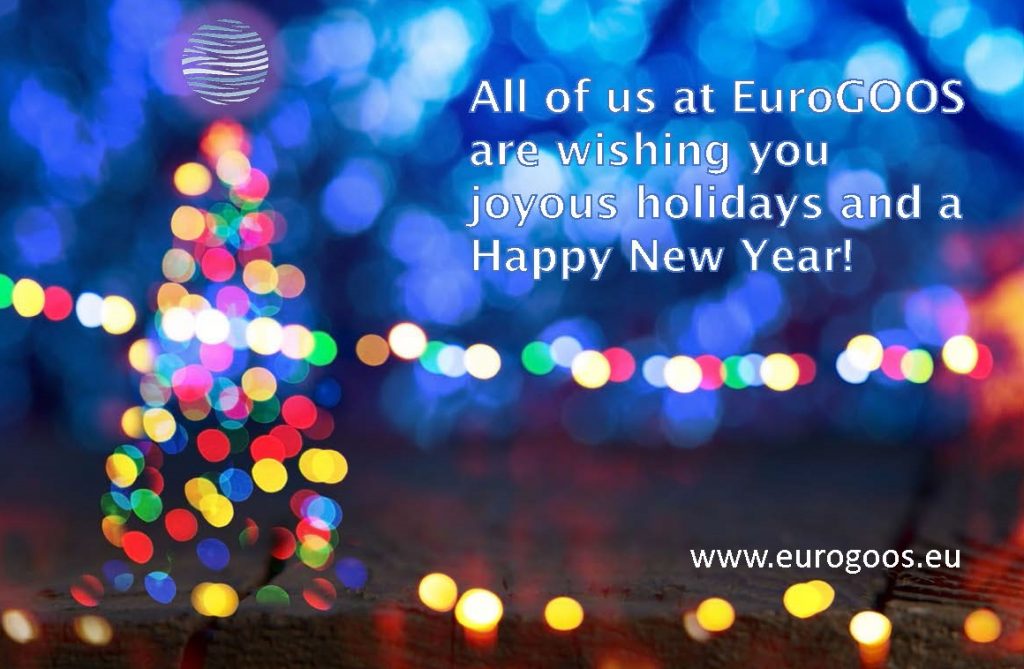
The post End-of-year Newsletter: EuroGOOS Highlights 2016 appeared first on EuroGOOS.
An open stakeholder consultation on the European Ocean Observing System is now open!
From 12 December until 20 January 2017, an open stakeholder consultation is launched to help design an integrated and sustained European Ocean Observing System, EOOS. The consultation targets a wide European community of ocean data providers, infrastructure managers, technology developers, data users, and broader ocean observing stakeholders.
This survey is critical to collect views from the European ocean observing community and wider stakeholders and to inform any decision-making about a future EOOS.
The need for an end-to-end integrated and sustained European Ocean Observing System, EOOS, has been expressed by the oceanographic and scientific community during the development of the European Integrated Maritime Policy in 2007. Since then, EOOS has featured in a number of scientific and science-policy documents. However, to design an efficient and sustained EOOS concrete stakeholder recommendations are needed, as well as a policy buy-in.
The consultation survey was designed by the EOOS Steering Group brought together by EuroGOOS and the European Marine Board, in their consolidated actions to make EOOS a reality.
Have your say on the future EOOS!
The post An open stakeholder consultation on the European Ocean Observing System is now open! appeared first on EuroGOOS.
EuroGOOS at GEO-XIII Plenary – Promoting ocean observing for societal benefits
Scroll down for the photogallery
EuroGOOS annimation GEOSS for Europe here
From 8 to 10 November, EuroGOOS attended the plenary meeting of the global Group on Earth Observations, GEO. Since its establishment in 2005, GEO has brought together 102 nations, the European Commission representing the EU member states, and 108 Participating Organizations. GEO aims to deliver open information on Earth observations for the benefit of humankind. At the plenary a new Global Earth Observation System of Systems, GEOSS, portal was presented.
EuroGOOS attended the GEO-XIII plenary as a GOOS representative (together with GOOS Director Albert Fischer) and as an invited participant of the European Commission’s exhibition ‘Europe for GEOSS’ showcasing the EU efforts in Earth observations.
Robert Jan Smits, Director-General for Research and Innovation at the European Commission, and GEO co-chair, attended the EuroGOOS stand and received a copy of the EOOS Consultation document, developed by the EOOS Steering Group. The EOOS framework is being promoted by EuroGOOS and the European Marine Board to build an integrated and sustained ocean observing capacity in Europe, a European Ocean Observing System (EOOS). Presenting the EOOS framework, Dina Eparkhina, EuroGOOS Policy and Communications Officer, explained the importance of sustained ocean measurements, both in-situ and remote sensing, and ongoing European efforts to develop the observing system requirements along the UNESCO’s IOC Framework for Ocean Observing. The Framework states that ‘we cannot measure everything nor do we need to’ and sets out the concept of Essential Ocean Variables to guide the development of the observing system requirements, elements and products. EOOS will not only provide a unique forum for the scientific community to discuss synergies among the ongoing efforts, but will also form a focal point for the European policymakers. Ocean observing underpins EU policies and initiatives led by several Directorates General, namely for Research and Innovation, Environment, Maritime Affairs and Fisheries, as well as Internal Market, Industry, Entrepreneurship and SMEs. The EOOS concept and the consultation document were presented at a recent European Parliament event, 8 September 2016, Brussels.
In addition to the GEO-XIII plenary and exhibition, several side-events took place during the GEO week. Over 400 participants attended the week, taking place in St Petersburg struck by an unusually cold weather with day temperatures falling to minus 10 and the city covered in thick snow. GEO launched five new initiatives, including among others, Earth Observations for Ecosystem Accounting and GEO for Sustainable Development Goals. A dedicated session was organized to collect industry views on the GEOSS requirements. It was noted that GEO should engage in collecting user feedback and possibly co-design information services with users. Open data promotion was stressed as critical for achieving the GEO objectives. However, opening the data was not enough for an efficient GEOSS, the data must be fit for purpose and of known quality. Finally, a new GEO programme was discussed in the framework of the UN Sustainable Development Goals. EuroGOOS Chair, Erik Buch, represented the ocean component on the GEO Programme Board in 2016.
Further information on the GEO-XIII plenary, including the meeting documents, is available on the GEO website
On Twitter, EuroGOOS and other posts can be viewed with the official hashtag: #GEOweek2016
The GEO-XIV plenary is planned in Washington DC on 23-27 October 2017; GEO-XV will take place in Japan.
The post EuroGOOS at GEO-XIII Plenary – Promoting ocean observing for societal benefits appeared first on EuroGOOS.
Oceans Day at COP 22: Action time
On 12 November, an Oceans Day was organized at COP 22 by the Government of Morocco and several international organizations and platforms, among others, the Prince Albert II of Monaco Foundation, the UN Food and Agriculture Organization, the Global Ocean Forum, the Ocean and Climate Platform, the IOC-UNESCO, and the World Bank. The event discussed the requirements for the implementation of the Paris Agreement (which came into force on 4 November), including political and policy support in the context of the UN Sustainable Development Goals (SDGs). The meeting stressed the need to build mechanisms connecting the oceans, coasts, and climate initiatives with national actions and plans. The Roadmap for Global Climate Action championed by France and Morocco was presented, promoting a common approach between the Nationally Determined Contributions (NDCs) and the SDGs, and the need for transparency. Financial support and capacity development are required to enable nations to fulfil their NDCs, this concerns notably Small Island Developing States (SIDS) and African states.
European Commissioner for Environment, Maritime Affairs and Fisheries Karmenu Vella reminded the meeting in his opening speech that ‘oceans are the unsung heroes of our planet’s climate’. Commissioner Vella stressed the European Union’s commitment to achieving the objectives of the UN Agenda 2030 and the Paris Agreement. Commissioner also presented the newly released EU Communication on International Ocean Governance, and announced that the European Union will be holding the international Our Ocean conference (launched by John Kerry in 2014) in Malta on 5-6 October 2017.
Oceans Days at COP are bringing together high-level decision and policy-makers with eminent scientists to discuss the importance of the ocean – both regulating the Earth’s climate and suffering strongly from the effects of climate change. EuroGOOS participation in the Oceans Days at COP21 in Paris is outlined here.
The post Oceans Day at COP 22: Action time appeared first on EuroGOOS.
EuroGOOS visits the Australian GOOS Regional Alliance, Integrated Marine Observing System, IMOS
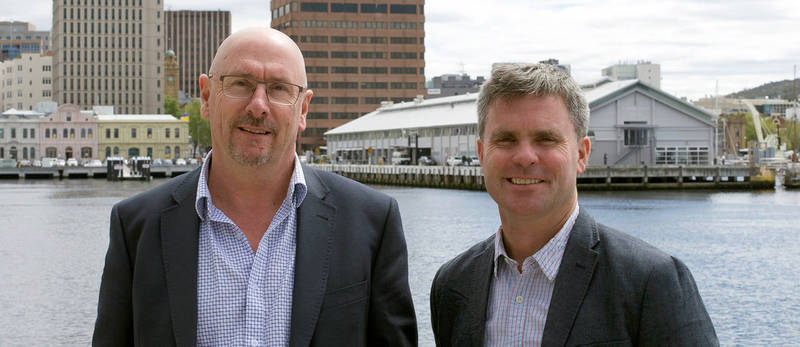
Tim Moltmann, IMOS Director (left), and Glenn Nolan, EuroGOOS Secretary General (right), during Glenn Nolan’s visit to Australia, October 2016. Credit: IMOS
EuroGOOS and IMOS, the Australian Integrated Marine Observing System, are two of the thirteen GOOS Regional Alliances (GRAs), working towards a global ocean observing system through national and regional programmes. Glenn Nolan was invited by Tim Moltmann, Director of IMOS, to present a European observing and forecasting perspective at the Australian Coastal and Oceans Modelling and Observations conference (ACOMO 2016) and a separate seminar at the Commonwealth Scientific and Industrial Research Organisation, CSIRO, in Hobart.
The ACOMO conference was held at the Australian Academy of Sciences, Canberra, on 11-12 October. The conference brought together the diverse ocean modelling and observations community. 46 papers and 35 posters in five topic areas were presented spanning all areas of coastal and open ocean oceanography, biogeochemistry and ecosystem observation challenges, as well as user applications. Glenn Nolan presented in the final session on EuroGOOS member services to operational oceanography end-users in Europe.
At the CSIRO seminar on 14 October, Glenn Nolan delivered a talk on EuroGOOS activities on capacity development within the GOOS Regional Alliances. During that week, Glenn Nolan also visited the Australian Antarctic Division and met with colleagues from the Global Ocean Observing System in the Indian Ocean, IO-GOOS, and Bureau of Meteorology.
The Council of GOOS Regional Alliances comes together at a biennial forum, with the next one scheduled for 2017. IMOS is currently chairing the Council, with EuroGOOS holding Vice Chair role.
A news piece on the visit of Glenn Nolan was released on the IMOS website.
The post EuroGOOS visits the Australian GOOS Regional Alliance, Integrated Marine Observing System, IMOS appeared first on EuroGOOS.
Open-access marine data: An untapped resource – Summary of SeaTech-COLUMBUS workshop for SMEs
Scroll down for the event’s photogallery
On 11 and 12 October, EuroGOOS, EMODnet and three partners of the EU COLUMBUS project, SmartBay Ireland, Marine South East, UK, and PLOCAN, Spain, had a successful marine data brokerage event for Small and Medium-sized Enterprises (SMEs). The workshop titled ‘Power of open marine data for the blue economy’ took place as part of A Connected Ocean Conference and SeaTech Week 2016 in Brest, France.
Publicly available marine data resources offer a great potential for SMEs to create value-added products and services for their customers. The workshop aimed at linking with some of those SMEs as well as other users working on the public-private interface, and collecting their feedback on experiences, needs, bottlenecks, and suggestions for improvements.
The workshop was organized within the framework of the EU Horizon 2020 COLUMBUS project. COLUMBUS works to bridge the gap between the knowledge and information collected through EU projects and concrete applications for Blue Growth sectors. The engagement of the industrial users of marine data has been identified as a priority by the COLUMBUS Marine Observation Competence Node, bringing together EuroGOOS, NOC, UK, VLIZ, Belgium, and Marine South East, UK, with the node coordination by Seascape Consultants, UK.
It has been recognized that making public marine data available to private sector will drive forward innovation and competition. The EU Member States and European institutions fund a large number of ocean observing research and infrastructure activities to derive marine data for various science, policy, and society needs. It has been estimated that making high-quality marine data held by public bodies in the EU widely available would improve productivity by over €1 billion a year (EC Roadmap for Marine Knowledge 2020).
The workshop included a mixture of open-floor discussions and presentations involving both EU marine data community, EuroGOOS, EMODnet, Copernicus Marine Service (CMEMS), private sector, Open Ocean, France, dotOcean, Belgium, as well as the EU AtlantOS project, French maritime cluster Mer Bretagne Atlantique, and St. Lawrence Global Observatory, Canada.
A number of European initiatives have been harvesting marine data collected by publicly-funded national and pan-European initiatives. Commonly called data aggregators, these initiatives include, among others, CMEMS, EMODnet, and SeaDataNet. Much progress has been made over the last years in helping users to become informed about the data available, visualize these data, download them in required geographical location and format, and acquire the metadata for the required dataset. However, a number of bottlenecks still exist, spanning data availability, quality, user-friendly format and web services.
In addition, to the abovementioned issues, the workshop further demonstrated that the role of SMEs is critical as intermediaries in the marine data value chain – acting on the interface between the public marine data resources and industrial end-users. SMEs know their clients much better than the public data initiatives, and can orient them to look for required information, or create bespoke value-added products for their users’ specific needs. This is why SMEs are very well placed to advise public marine data initiatives, like EMODnet and CMEMS, on ways to improve their service.
The issue of confidentiality was also discussed at the workshop. While competition will automatically entail restrictions on opening data, progress may be achieved through sharing a very broad range of data and making a distinction between ‘strategic’ and ‘non-strategic’ data (for example, sea temperature data). Promotion and recognition of open data are also critical to attract more data from private companies into the open repositories, this can be achieved through the recognition of the companies’ corporate responsibility, for instance. Another idea which arose from the workshop is for public and private initiatives to co-write papers together. This would allow them both gain from having a publication while the data would be made available with a Digital Object Identifier (DOI).
It was re-emphasized that brokerage is important for gaining trust and understanding among public and private partners, and promoting a data sharing philosophy. This should also take into account the development of business models and openness to speak the same language. The role of maritime clusters was stressed in this respect. Finally, data discovery should be made attractive with user-friendly and efficient interface.
The workshop report will be shortly available on our website.
For further information on the workshop, please visit the workshop webpage
The post Open-access marine data: An untapped resource – Summary of SeaTech-COLUMBUS workshop for SMEs appeared first on EuroGOOS.
Helping Member States address marine pollution by harmful and noxious sustances
The HNS-MS project, Harmful and Noxious Sustances pollution of the Marine System, is funded by the European Commission’s DG ECHO and is ending on 31 December 2016. In Brussels on 13-14 December, the project is holding its final stakeholder meeting to present the project’s results including, among others, a decision-support tool for national maritime authorities and coastguard stations to forecast the drift, fate and behaviour of acute marine pollution by Harmful Noxious Substances (HNS) accidentally released in the marine system.
The meeting is designed to allow open discussions among participants and foster possible future collaborations and actions (e.g. long-term maintenance of the HNS-MS DSS, capacity-building in other regions, regional risk assessments, etc).
Further information is available on the project’s website
The post Helping Member States address marine pollution by harmful and noxious sustances appeared first on EuroGOOS.
EuroGOOS partnered with Mercator Ocean: towards fit-for-purpose in situ observations
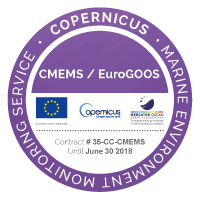 EuroGOOS signed a contract with Mercator Ocean to promote sustained ocean observations and a strong connection with users of marine data products. The contract particularly addresses seaborne, in situ, observations and the uptake of Copernicus Marine Service (CMEMS). Mercator Ocean is an EU Entrusted Entity with responsibility to deliver the CMEMS service within the current EU multi-annual financial framework 2014-2020.
EuroGOOS signed a contract with Mercator Ocean to promote sustained ocean observations and a strong connection with users of marine data products. The contract particularly addresses seaborne, in situ, observations and the uptake of Copernicus Marine Service (CMEMS). Mercator Ocean is an EU Entrusted Entity with responsibility to deliver the CMEMS service within the current EU multi-annual financial framework 2014-2020.
The EuroGOOS – Mercator Ocean contract will help build closer links with national ocean observing programmes towards a fit-for-purpose CMEMS. EuroGOOS will collect and assess information about the current in-situ systems in Europe and determine priority actions towards a long-term integration. Furthermore, EuroGOOS will develop a communication strategy to improve the awareness of the European policy and decision-makers of the importance of the in-situ marine observations, and complementarities between the leading European marine data initiatives and services, namely CMEMS, EMODnet and SeaDataNet.
Press release is available on the Copernicus Marine Service website
The post EuroGOOS partnered with Mercator Ocean: towards fit-for-purpose in situ observations appeared first on EuroGOOS.
Job opportunity at EuroGOOS Office
The EuroGOOS Office seeks an Administrator whose mission is to deliver financial and administrative tasks in support of the EuroGOOS team. The job is based in central Brussels at the EuroGOOS Office hosted by the Belgian Science Policy Office, BELSPO.
EuroGOOS offers to the successful candidate a 3.5-year fixed contract and the opportunity to work in an international and multicultural environment with a high degree of professionalism.
Deadline for applications: 30 October 2016
Job starting date: 1 January 2017 (latest)
Download the full description and application procedure  Administrator Job Profile (101.7 KiB)
Administrator Job Profile (101.7 KiB)
The post Job opportunity at EuroGOOS Office appeared first on EuroGOOS.
Building a European Ocean Observing System, EOOS – summary of the European Parliament event
Download in PDF
 EOOS EP Event Main Outputs (563.3 KiB)
EOOS EP Event Main Outputs (563.3 KiB)
On 8 September, the first EOOS conference took place at the European Parliament hosted by Member of the European Parliament Ricardo Serrão Santos. The event, entitled ‘Building a European Ocean Observing System’ attracted over 70 participants from across Europe, as well as many representatives of the European Commission’s Directorate General for Research and Innovation, Maritime Affairs and Fisheries, Environment, and Internal Market, Industry, Entrepreneurship and SMEs. All those Commission directorates general have taken action towards achieving sustainable management of the ocean, with the help of funding programmes and legislative instruments and strategies related to ocean observing and data collection. Several Members of the European Parliament joined MEP Ricardo Serrão Santos and contributed to the event, including Gesine Meissner, Marco Affronte, and Stefan Eck.
Eminent speakers and panellists of the event explained why an integrated ocean observing system is required for Europe, and demonstrated the risks and losses linked with insufficient and not sustained ocean observing and data collection. The EOOS vision was explained in the context of the global environmental policies, including the recent G7 Leaders Statement (May 2016), the COP21 Paris Agreement (December 2015) and the development of a report on the ocean’s role in climate by IPCC agreed in April 2016 (IPCC Special Report on ‘Climate Change, the Oceans and Cryosphere’, to be released as part of the IPCC 6th Assessment Report cycle), as well as the UN’s Sustainable Development Goals (September 2015) a number of which require ocean observing knowledge and information (especially the dedicated SDG14 to ‘Conserve and sustainably use the oceans, seas and marine resources’).
The critical state of the ocean health on the one hand, and the significant economic value of the ocean economy on the other, have put a strong emphasis on ocean observing to deliver knowledge, information and services to a wide range of science, technology and innovation users. Those policies and statements clearly demonstrate that this has been recognized at the highest political level.
MEP Ricardo Serrão Santos, the host and chair of the event, stressed that ocean provides a crucial life support service, and to understand and predict the ocean system as a whole it is mandatory to observe it. However, observations at sea are much more challenging compared by those at land and cooperation in science and technology, data sharing and capacity building are critical. Furthermore, partners across all spheres must learn to speak the same language, and the EOOS focal point can play an important role this achieving this.
EuroGOOS Secretary General Glenn Nolan presented the complexity of the current European ocean observing landscape. European ocean observing is predominantly funded at the countries’ level, with much coordination taking place at the pan-European level (e.g. through European Commission contracts). On top of that, regional collaboration efforts also play a very important role. Those disparate components of the ocean observing system aren’t linked by an overarching strategy, often lack sustained funding required for continuous data collection, as well as aren’t represented with a single voice to the policy and decision makers. The vision for EOOS is to fill those gaps, both by creating synergy among the existing efforts, and generating new projects in a strategic way, while avoiding overlaps and duplication.
IOC Executive Secretary Vladimir Ryabinin expressed his support to the EOOS concept underpinning the global requirement for marine knowledge and sustained data collection. Many of the world’s most populated and fastest growing cities are at the coast, he explained, stressing the requirement for a connected observing system, from coast to open ocean. He called on Europe to use the enormous potential of its infrastructure capacities, knowledge and resources to take a leading role in the development of the world’s ocean observing.
DG MARE Director for Atlantic, Outermost Regions and Arctic Bernhard Friess said that with the fast growing world population, the oceans have to take on a role that the land cannot provide in the future. More data and of a higher quality are required for our informed decisions and effective forecasts. On the need for sustained observations, Bernhard Friess quoted an article in Nature explaining that ‘There is only one Earth, with only one history, and we get only one chance to record it. Ideas not followed through can be taken up again later. A record not made is gone for good’. Furthermore, Director Friess stressed that the value of ocean cannot be measured in economic terms only. This point was seconded by Jan-Stefan Fritz, who presented the current efforts to assess the value of the ocean. He also pointed out that marine scientists will take a new role in the world, working across many disciplines, and being more active in communicating results outside of their communities.
Martin Visbeck, GEOMAR, Germany and Coordinator of EU H2020 AtlantOS project, emphasised that marine data are needed for a wide range of uses, and their quality and interoperability are critical. Moreover, progress towards achieving Sustainable Development, targets will build on reliable and open access to ocean information. Technological and infrastructure collaborations are required to advance EOOS, as well as partnerships with industrial users of the ocean space, e.g. ship builders, certifiers and ship operators can provide in-situ observing on ships.
Joaquin Tintoré, SOCIB, Spain, elaborated on the link between science, technology and society. Information on the ocean state and variability at different temporal and spatial scales is important, and that cannot be oversimplified, e.g. for different purposes data over different time scales is required, from time series [long period of time] to synoptic data [simultaneous data from one or many observing platforms]. Communities need to work together across all uses of the ocean space and ocean information. Technological innovations are opening new exciting opportunities and EOOS can help science and technology stakeholders work together.
These are exciting times, further shared Amanda Bates, University of Southampton, UK, stressing both the technological developments and new scientific discoveries in marine sciences. In biology scientists are only discovering some interlinks in the marine world, from genes to species to global ecosystem levels. Those complex links are very much scale dependent. Baseline data on marine biology are critical, she stressed, to gain our understanding of the complex marine environment and provide evidence for management actions and commercial exploitation.
Niall McDonough, Executive Secretary of the European Marine Board, summarized that EOOS will strive to support systematic and sustained ocean observations and create a focal point for European ocean observing. He introduced the EOOS consultation document prepared by the EOOS steering group convened by EuroGOOS and EMB. An open consultation will be launched in mid-autumn to collect views and ideas from European ocean observing stakeholders.
During the panel discussion moderated by Jacky Wood, JPI Oceans, MEP Marco Affronte shared a word of caution regarding the expansion of the ocean’s economic potential, while some basic knowledge is still missing. MEP Gesine Meissner stressed the importance of marine protected areas to replenish the ocean’s resources. Sigi Gruber, Head of Marine Resources Unit at DG R&I, emphasised the need to inform society of the importance of the ocean as life support system. The need for ocean literacy and outreach was further highlighted by the panel. Scientists have a role to play in educating society about the ocean, but also in being more pro-active in taking part in policy making.
Ricardo Serrão Santos concluded the event with a call for EOOS to engage with a wide range of ocean observing stakeholders, science, industry, civil society, policy. The ocean is changing and marine data should be collected continuously and made openly available for the benefit of all users. He closed the meeting with an inspiring quote by Sylvia Earle ‘With every drop of water you drink, every breath you take, you’re connected to the sea. No matter where on Earth you live’.
Event’s agenda, presentations and photos are available here
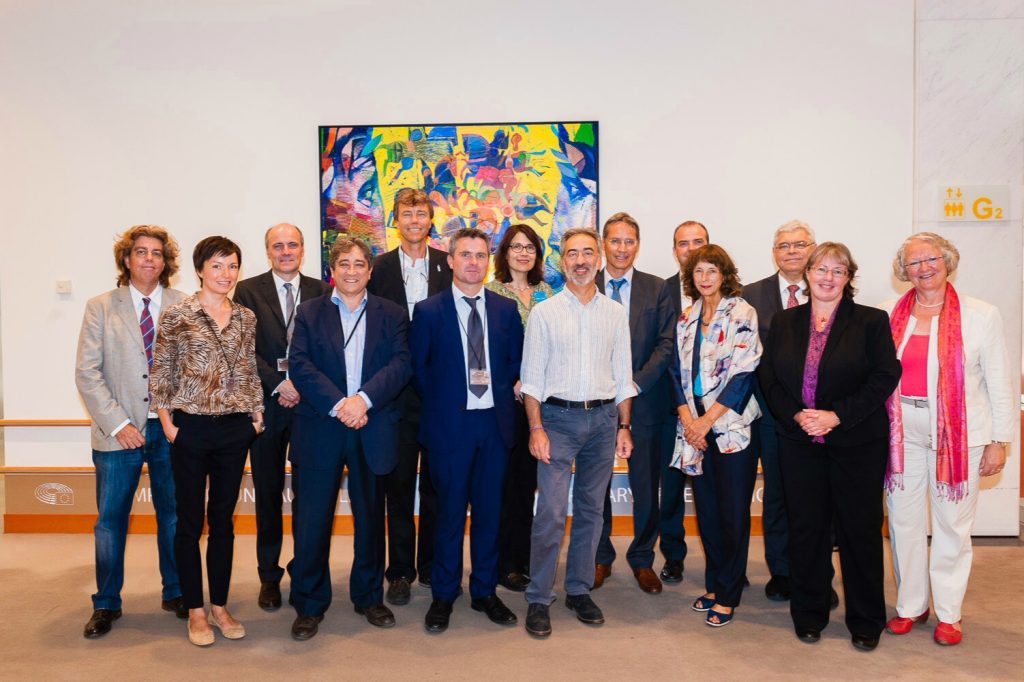
Building a European Ocean Observing System, European Parliament event, 8 September 2016, Brussels From left: Joaquin Tintore (SOCIB, Spain), Dina Eparkhina (EuroGOOS), Jan-Stefan Fritz (KDM, Germany), Ricardo Serrão Santos (MEP), Martin Visbeck (GEOMAR, Germany), Glenn Nolan (EuroGOOS), Amanda Bates (University of Southampton, UK), Marco Affronte (MEP), Bernhard Friess (EC EG MARE), Niall McDonough (EMB), Sigi Gruber (EC DG R&I), Vladimir Ryabinin (UNESCO IOC), Jacky Wood (JPI Oceans), Gesine Meissner (MEP)
The post Building a European Ocean Observing System, EOOS – summary of the European Parliament event appeared first on EuroGOOS.
The power of open-access interoperable marine data for the Blue Economy
- The power of open-access interoperable marine data for the maritime sector: An untapped resource?
- Access to marine data and information: The role of European marine data portals in knowledge transfer
- How can publicly funded marine information sharing initiatives develop to meet industry user needs? What are the specific needs of SMEs?
- What are the bottlenecks to more efficient exploitation of marine observation and data resources by the private sector?
- What are the next steps to improve collaborations between public data initiatives and the private sector catalysing the conversion of information to innovation?
On 11 and 12 October 2016 during SeaTech 2016, we are inviting industrial partners to a dedicated Marine Information Workshop: From publicly available resources to innovation in the blue economy. The workshop is designed for Small and Medium-Sized Enterprises developing innovative applications with the use of marine data. Those include, among others: risk forecast and prevention, information services and products for coastal tourism, offshore siting and operations, design and optimization of infrastructure for the off-shore sector, as well as services required for the European Union directives such as the Marine Strategy Framework Directive and the Marine Spatial Planning Directive.
Small and Medium-Sized Enterprises can take advantage of the public marine data resources and generate value delivering specific services for their customers. The European Commission recognises the Blue Growth opportunities offered by the wealth of publicly-funded marine observation and data initiatives. To this end, the European Union have supported the establishment of several valuable marine data portals, freely providing marine data on a wide range of parameters as well as a range of data products (e.g. maps) covering all European maritime regions. However, a gap exists between what is available in those open marine data portals and what maritime users need in terms of types of data and data products.
The SeaTech Marine Information Workshop for Industry will facilitate a dialogue between two communities that do not traditionally come together, the European marine data and observation community – working to generate, aggregate and disseminate marine data – and the companies who can capitalize on these efforts to create value-added products and services. The workshop is co-organized by EuroGOOS and EMODnet, in collaboration with Plocan, SmartBay Ireland, and Marine South East, within the activities of the European Union H2020 COLUMBUS project, and will be held as part of ‘A Connected Ocean‘ conference.
In addition to the Marine Information Workshop for Industry, the SeaTech week will provide a range of potential business opportunities for maritime industry and Small and Medium-Sized Enterprises. The SeaTech week 2016 will bring together about 1,500 maritime innovation stakeholders, from research institutes and academia to companies and maritime clusters. The business opportunities of SeaTech 2016 include B2B meetings, Techno-Market and Brokerage events, as well as a professional exhibition. The exhibition participants will include over 20 companies (CADDEN, CLS, MARITECH, and others), leading public institutions and clusters (IFREMER, EUROPOLE MER, IEEE-OES, and others), as well as members of the French association of virtual reality. Participants of the Marine Information Workshop for Industry will be offered display space at the Workshop exhibition stand.
The workshop dates: 11-12 October 2016. The interactive workshop will take place on the morning of 12 October, the opening plenary is on the afternoon of 11 October.
Location: Le Quartz, SeaTech Week, Brest, France
Programme, registration and further information: available on the workshop webpage
Registration fee is 75€ and includes attendance to the workshop, as well as the entire ‘A Connected Ocean’ conference, social events, and access to SeaTech exhibition.
The post The power of open-access interoperable marine data for the Blue Economy appeared first on EuroGOOS.
European Parliament to host the first event on the European Ocean Observing System, EOOS
On 8 September 2016, MEP Ricardo Serrão Santos is hosting an EOOS event at the European Parliament entitled ‘Building a European Ocean Observing System’. This event will be the first dedicated conference on EOOS and will help laying its foundation.
The EOOS event at the European Parliament will bring European policy and decision makers together with the ocean observing community, to engage in a direct dialogue and discussions on needs and ambitions for a strong, integrated and sustained European ocean observing capacity.
The need for an end-to-end European Ocean Observing System has been expressed by the oceanographic and scientific community during the development of the European Union’s Integrated Maritime Policy in 2007. In 2008, EuroGOOS and European Marine Board released a joint vision document to outline the concept of this framework. Since then, EOOS has featured in a number of scientific and science-policy documents, among others, EuroOCEAN conference declarations 2010 and 2014, European Marine Board’s Navigating the Future IV 2013, European Commission expert report on marine research infrastructures 2013, EuroGOOS Strategy 2014, ESFRI Roadmap 2016, as well as a number of strategic research agendas.
Programme and registration available on the event’s webpage
The post European Parliament to host the first event on the European Ocean Observing System, EOOS appeared first on EuroGOOS.
High Frequency Radars – European survey
High Frequency Radar (HFR) technology offers a unique insight to coastal ocean variability by providing high-resolution data at the interface between ocean and atmosphere. HFR data measure currents with a relatively wide spatial coverage and high spatio-temporal resolution in near real time making them valuable operational oceanographic tools. In Europe, the use of HFR systems is growing with over 60 HF radars currently deployed and a number in the planning stage. The EuroGOOS HFR Task Team is working towards the coordination of existing HFR systems to increase their efficiency, enhance data sharing and applications, as well as better plan the system evolution.
To this end, the EuroGOOS HFR Task Team in close collaboration with the JERICO-Next and the INCREASE CMEMS Service Evolution projects, has launched a European survey to diagnose the present status of different HFR systems available in Europe. The survey takes less than 15 minutes to fill and is tailored for HFR and other observing networks.
The post High Frequency Radars – European survey appeared first on EuroGOOS.
EuroGOOS 2016 General Assembly: main outcomes
EuroGOOS 2016 General Assembly meeting took place from 25 to 27 May. Organized at the EuroGOOS headquarters in Brussels, the meeting brought together over 50 delegates from 40 organizations in 19 European states, as well as the European Commission, Regional Sea Conventions, and European networks. The Assembly opened with a special session on oceanographic products under development in Europe for various policy, security, and scientific needs.
The meeting welcomed the progress towards the European Ocean Observing System, EOOS, the concept and framework developed jointly by EuroGOOS and European Marine Board. The issue of sustained funding of the ocean observing in European member states has been raised at several points of the meeting. A number of recent studies (e.g. within the EuroGOOS tasks in the EU H2020 AtlantOS project) have demonstrated a striking reduction of number and activities of the European observing platforms. The new study by the EuroGOOS Tide Gauge Task Team has clearly demonstrated that about half of the European tide gauge systems are either lacking funding or have been stopped. At the time of the EuroGOOS Assembly, the G7 Leaders released a high-level statement expressing a need for enhanced global ocean observing. With the largest EEZ (continental shelf) area in the world and global leadership in ocean technologies, Europe is well placed to set an example of a true integration and strategic alignment through the European Ocean Observing System, EOOS.
The EuroGOOS Assembly approved two new activities, Animal-Borne Instruments Task Team (chaired by Lars Boehme of St. Andrews University and MASTS network) and Fixed Platforms Task Team (chaired by Richard Lampitt of National Oceanography Centre, UK). The new task teams will help improving synergies and promoting sustained operations for these oceanographic platforms capable of collecting data on a wide range of physical and biogeochemical parameters.
Important governance matters were approved at the meeting. The Assembly welcomed a new EuroGOOS member, the Slovenian Environment Agency. Erik Buch was re-elected as EuroGOOS chair for the second term together with two Executive Board members, Urmas Lips (Marine Systems Institute of the Tallinn University of Technology, Estonia) and Bernd Brugge (German Federal Maritime and Hydrographic Agency). Two new Executive Board members were elected: Patrick Farcy (French Research Institute for Exploitation of the Sea, Ifremer), and Henning Wehde (Institute of Marine Research, IMR, Norway). The meeting thanked the Executive Board members who stepped down after the completion of their two full terms, Pierre-Yves Le Traon (Ifremer, France) and Johnny Johannessen (NERSC, Norway).
The Kostas Nittis Medal to Young Researcher was awarded at a dedicated session during the Assembly. The Medal and associated grant went to Angelique Melet, researcher at Mercator Ocean, France. The 2015 Kostas Nittis Medal winner Pablo Lorente of Puertos del Estado, Spain, give an enthusiastic account of the award’s positive impact on his research and professional network.
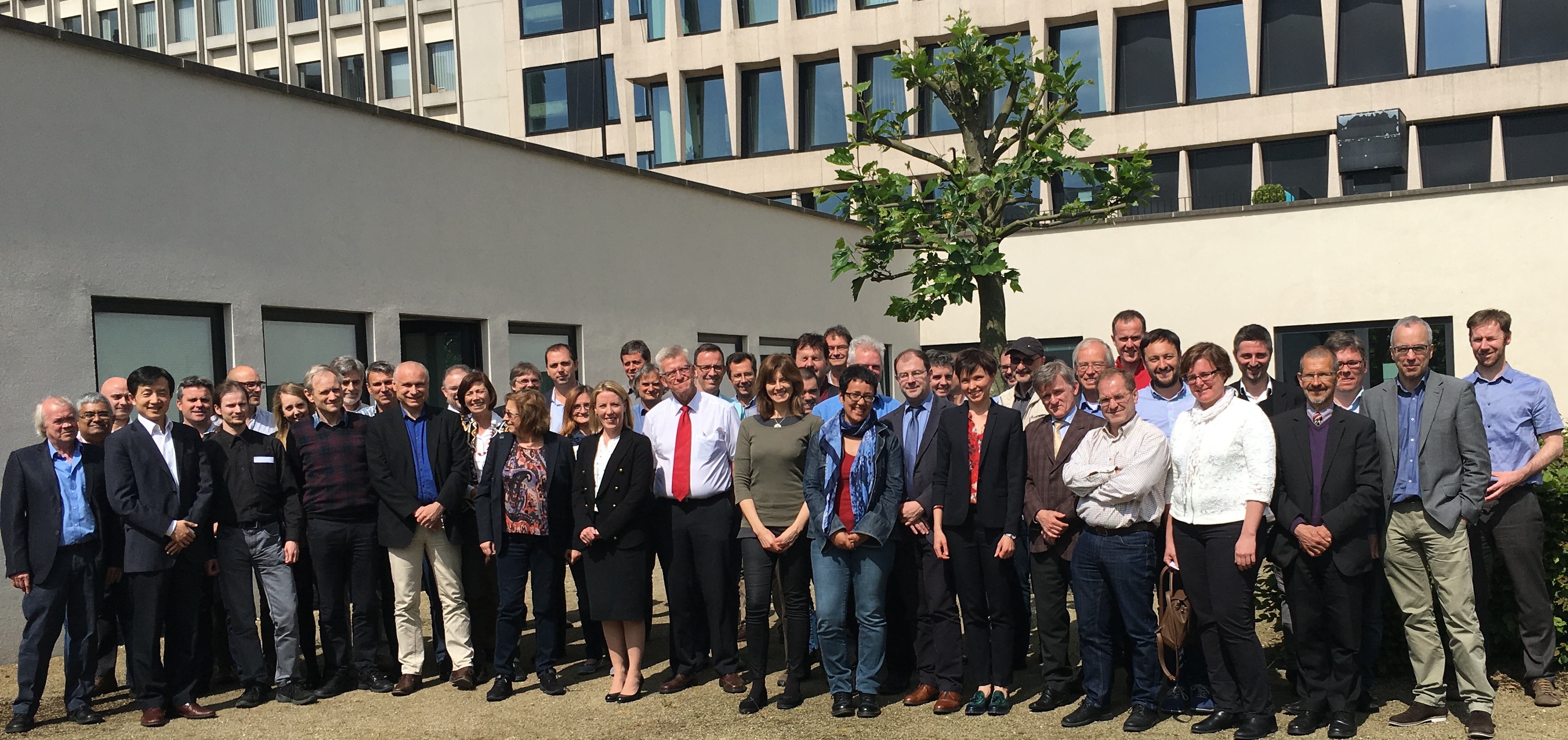
The post EuroGOOS 2016 General Assembly: main outcomes appeared first on EuroGOOS.
Kostas Nittis Medal awarded to young researcher from France

Angelique Melet, Kostas Nittis Medal winner 2016 and Erik Buch, EuroGOOS Chair, 25 May 2016, Brussels
Angelique Melet, a young researcher from Mercator Ocean, France, was awarded the 2016 Kostas Nittis Medal and associated grant yesterday. Angelique’s application went through a competitive evaluation process earlier in the year. The award ceremony took place yesterday in Brussels, at a special session of the EuroGOOS General Assembly 2016, bringing together over 50 representatives of 39 European ocean observing organizations from 19 countries.
The Kostas Nittis Medal scheme was launched at the European Maritime Day 2015 by the European Commissioner for Environment, Maritime Affairs and Fisheries Karmenu Vella. The Kostas Nittis Medal applications are open to young marine professionals within the operational oceanography and broader ocean observing. The Medal is accompanied by a grant of € 3,000 to support the winner’s participation in international conferences and events. The awardee is thus given a chance to present their research or technology at relevant events, building a professional network, gaining real life experience, and reaching out to potential partners and/or employers.
“It is an honour to be awarded the Kostas Nittis Medal, said Angelique Melet. The grant will give me a chance to present my research and activities at high-profile international conferences, and is an incentive to be more proactive in the oceanography community.”
Last year’s winner, Pablo Lorente of Puertos del Estado, Spain, presented an impact report on his activities supported to the grant. He’s been able to attend six conferences and deliver seven scientific papers, which helped to significantly advance his PhD. “The Kostas Nittis award has been a strong motivator for me, and a great opportunity”, shared Pablo in this presentation.
The post Kostas Nittis Medal awarded to young researcher from France appeared first on EuroGOOS.
EuroGOOS welcomed the science and technology ministers communiqué to G7 Summit
EuroGOOS welcomed the communiqué by the G7 science and technology ministers agreed at their meeting in Tsukuba, Japan, on 15-17 May. The ministers’ communiqué to the G7 Leaders’ Summit in Ise-Shima on 26-27 May, includes a strong emphasis on sustained and enhanced global ocean observing, data sharing and capacity building, critically required for the ocean future.
“We strongly welcome the G7 ministers’ focus on ocean observations, said the EuroGOOS Chair Erik Buch, and hope it will reach the Leaders’ Summit. For many years, EuroGOOS has been developing the ocean observing capacities in the European regions and promoting synergy and cooperation across the numerous actors involved both in Europe and globally. However, a high-level political commitment for sustained observations and free and open data sharing is a cornerstone to fully unlock the substantial economic value of ocean knowledge, and help protect the ocean health”.
In its new policy brief, launched at the European Maritime Day 2016, EuroGOOS stressed that today ocean observing has an unprecedented potential to help meet the pressing societal challenges. The critical state of the ocean health on the one hand, and the significant economic value of the ocean economy on the other, have put a strong emphasis on ocean observing to deliver knowledge, information and services to a wide range of science, technology and innovation users.
The G7 science and technology ministers’ communiqué to the G7 Leaders is an output of the ministers’ meeting on 15-17 May. It is part of a series of ministerial meetings of the G7 countries involving France, Germany, UK, Italy, Japan, Canada, USA, and the European Union, in the lead up to the G7 Summit on 26 and 27 May in Ise-Shima, Japan. The communiqué was prepared based on the scientific expert group report which stressed ocean observing as a cross-cutting priority.
Tsukuba Communiqué from the G7 Science and Technology Ministers’ Meeting in Tsukuba, Ibaraki, 15‐17 May 2016 Download
EuroGOOS policy brief, Delivering services for Blue Growth and ecosystem-based management Download
G7 Summit website Visit
The post EuroGOOS welcomed the science and technology ministers communiqué to G7 Summit appeared first on EuroGOOS.
EuroGOOS policy brief launched at European Maritime Day
At the European Maritime Day today, EuroGOOS has released its new policy brief, European operational oceanography: Delivering services for Blue Growth and ecosystem-based management. The publication was officially launched at the EuroGOOS exhibition stand in the presence of Gesine Meissner, Member of European Parliament, Sigi Gruber, European Commission DG Research and Innovation, Douglas Cripe, Group on Earth Observations, Vittorio Barale, European Commission Joint Research Centre, and Martin Visbeck, EU AtlantOS project.
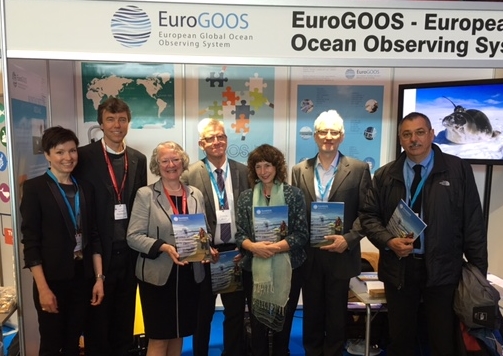
Launch of the EuroGOOS Policy Brief at the European Maritime Day 2016, 28 May, Turku, from left: Dina Eparkhina, EuroGOOS, Martin Visbeck, AtlantOS, Gesine Meissner, Member of European Parliament, Erik Buch, EuroGOOS Chair, Sigi Gruber, Head of Marine Resources Unit, European Commission DG R&I, Douglas Cripe, Group on Earth Observations, and Vittorio Barale, EC Joint Research Centre
The EuroGOOS policy brief highlights the paramount role of ocean observing and marine data, underpinning the Blue Growth sectors. Continuous ocean observing and data collection is a critical research area and a prerequisite for exploring new opportunities for blue economy. The ocean observing data and information are required to meet a large number of societal challenges, from food security, to climate change, ecosystem health, or water management. All GEO societal benefit areas require oceanographic services and products to reach the GEOSS objectives. As do most of the UN’s Sustainable Development Goals (SDGs). In particular SDG14, designed to help conserve and sustainably use the ocean.
The publication highlights three specific areas requiring more development and integration as well as funding support to coordinate activities in the coming years: operational ecology service for ecosystem-based management, coastal oceanography integration, and advanced modelling and forecasting. The paper also stresses the need for an overarching end-to-end integrated ocean observing framework for Europe. The European Ocean Observing System (EOOS) will help define the landscape of the current European ocean observing capacity and reinforce synergy to fill the existing gaps. The EOOS process will encompass the three priorities mentioned in the policy brief.
The EuroGOOS booth at the European Maritime Day (18-19 May 2016, Turku, Finland) has become a real ocean observing hub of the exhibition. It profiles a wide range of strategic and coordination activities with the involvement of EuroGOOS and its partners, among others, AtlantOS, COLUMBUS, Euro-Argo and FixO3. The newly launched UK National Partnership for Ocean Prediction, a joint initiative by EuroGOOS members MetOffice, Cefas, and NOC, as well as Plymouth Marine Lab (PML) is also presented. Furthermore, the recent Ocean Enterprise Industry Study is presented delivered by the US IOOS, the EuroGOOS counterpart in the Global Ocean Observing System, GOOS, Regional Alliances. The Finnish Meteorological Institute, FMI, EuroGOOS member, has provided their state-of-the-art ocean glider, an autonomous underwater vehicle, capable of collecting a wide range of physical, chemical and biological marine data, to illustrate the ocean observing technologies.
The post EuroGOOS policy brief launched at European Maritime Day appeared first on EuroGOOS.
Science report to G7 ministers stresses ocean observing as cross-cutting priority
An ocean report has been submitted to the G7 science ministers for their upcoming meeting (15-17 May), in advance of the G7 summit (26-27 May, Ise-Shima, Japan).
The report identifies seven thematic priorities: plastic pollution, deep-sea mining, acidification, de-oxygenation/hypoxia, ocean warming, biodiversity, and ecosystem degradation. Ocean observing is emphasised as a cross-cutting priority for all those areas.
It is explained that the world-leading oceanographic capabilities of the G7 countries (Japan, Canada, France, Germany, Italy, UK, USA, and EU) contribute to a wide range of socio-economic benefits. To achieve those, “there is need for strengthened effort in the scientific observation of the status of the global ocean and its seas. Such monitoring needs to improve and integrate the worldwide gathering of information on the on-going changes in ocean physics, chemistry and biology – to determine trends and variability, and assess their causes in a multi-stressor context”. The report further mentions the important role of new observing technologies and improved data management. Science-policy collaboration and transdisciplinary approach are required to support those priorities.
The unprecedented potential of ocean observing to help meet societal challenges is also stressed in the new EuroGOOS policy brief to be launched at the European Maritime Day in Turku, Finland, on 18 May. The publication calls for urgent action from both:
- Policy – in recognizing this potential and supporting actions for sustained ocean observing and technology development, and
- Ocean community – in ensuring synergy and collaboration to strengthen the individual states and regional efforts for the common global benefit.
Download report, Future of the Ocean and its Seas here
Download the EuroGOOS policy brief here
The EuroGOOS Policy Brief, European operational oceanography: Delivering services for Blue Growth and ecosystem-based management, will be launched at the European Maritime Day 2016.
The report, Future of the Ocean and its Seas: a non-governmental scientific perspective on seven marine research issues of G7 interest, was led by the International Association for the Physical Sciences of the Ocean (IAPSO), the Scientific Committee on Oceanic Research (SCOR), the International Council for Science (ICSU), and the International Union of Geodesy and Geophysics (IUGG), with contributions by 14 international experts.
The post Science report to G7 ministers stresses ocean observing as cross-cutting priority appeared first on EuroGOOS.
UK launch National Partnership for Ocean Prediction
 The UK’s National Partnership for Ocean Prediction was launched at the inaugural workshop in Bristol on 26 April 2016 and will be presented at the EuroGOOS booth at the European Maritime Day in Turku.
The UK’s National Partnership for Ocean Prediction was launched at the inaugural workshop in Bristol on 26 April 2016 and will be presented at the EuroGOOS booth at the European Maritime Day in Turku.
This collaboration initiative brings together the leading UK marine science and oceanographic organizations, Met Office, Centre for Environment, Fisheries and Aquaculture (Cefas), National Oceanography Centre (NOC), and Plymouth Marine Laboratory (PML).
The National Partnership for Ocean Prediction aims at improving our understanding of the marine environment and how it affects us. Top researchers will work together to help boost our knowledge and prediction of in the areas of fisheries, safety at sea, maritime operations, marine renewable energy, and coastal flood warning, contributing to achieving Good Environmental Status. Based on this world-leading marine products and services will be developed and promoted, in partnership with stakeholders to understand their requirements. The National Partnership for Ocean Prediction is “creating a hub for integrating ocean observations and models to provide high-quality information about the marine environment”, said Prof. Stephen de Mora, Chair of the Partnership’s Governing Board and Chief Executive of Plymouth Marine Laboratory (PML).
“This partnership is a demonstration of the fundamental role that oceans play in the weather and climate system from local to global scales. It is critically important that the Met Office models, which we use to predict weather and climate risk, represent the fundamental role that the ocean places across time and space scales” said Prof. Dame Julia Slingo OBE FRS, the Met Office Chief Scientist.
Prof. Stuart Rogers, Chief Scientist at Cefas, welcomed the Partnership as a timely initiative that “brings together the UK marine observing, modelling and forecasting communities.”
“I am very pleased that the National Oceanography Centre is contributing to the National Partnership for Ocean Prediction”, said Prof. Ed Hill OBE, the Executive Director of the National Oceanography Centre (NOC). “Ocean predictions are one of the central means by which the understanding of ocean processes is translated into practical scientific benefit for society”.
The post UK launch National Partnership for Ocean Prediction appeared first on EuroGOOS.
Commission release Integrated European Union Policy for the Arctic
Today, the European Commission has released an Integrated European Union Policy for the Arctic in its joint communication to the European Parliament and the Council. Building on previous initiatives, the policy focuses on advancing international cooperation in responding to the impacts of climate change on the Arctic’s fragile environment, and on promoting and contributing to sustainable development, particularly in the European part of the Arctic.
As part of its strategic commitment to the Arctic, the policy recommends that EU should engage with the region on these three priority areas:
- Climate change and safeguarding the Arctic environment;
- Promoting sustainable development in the region;
- Supporting international cooperation on Arctic issues.
The EU’s Arctic policy will be an important element in implementing the COP21 agreement, setting out a global action plan to limit global warming to well below 2 °C. The policy also stresses the importance of advancing research, science and innovation, as well as the ocean governance in the region. Furthermore, the policy will contribute to the implementation of the UN Agenda 2030 and its Sustainable Development Goals.
EU has an important role in facilitating international scientific cooperation through transnational access to research infrastructure and open data. The Commission is developing a multi-resolution map of the entire seabed and overlying water column. The European Marine Observation and Data Network (EMODnet) is working with over 100 organisations, including from Iceland, Norway and Russia, to make their marine data more accessible, interoperable and useful to end-users. Data will be available through a single web portal.
EU research on climate change in the Arctic will also be supported by EU space programmes. The operational infrastructure and services of Copernicus will provide input to Arctic research activities, including weather monitoring, monitoring of climate variables and ice thickness, and improved ocean modelling. Furthermore, EUR 40 million have been committed under the EC 2016-2017 work programme to Arctic-related research. The European Structural and Investment Funds (ESIF) also provide funding for research and innovation activities in the fields of climate change and environment in the Arctic.
An Integrated European Union Policy for the Arctic – European Commission’s Joint Communication to the European Parliament and the Council, 27 April 2016 Read here
The post Commission release Integrated European Union Policy for the Arctic appeared first on EuroGOOS.
‘The Ocean Economy in 2030’ released by OECD
Today, the OECD released ‘The Ocean Economy in 2030’. The report explores the growth prospects for the ocean economy, its capacity for future employment and innovation, and its role in addressing global challenges. Special attention is devoted to the emerging ocean-based industries.
The report stresses that unsustainable use of the ocean resources threatens the welfare and prosperity of humankind. The great economic potential of the ocean economy can only be achieved through responsible and sustainable economic development. The global ocean economy, measured in terms of the ocean-based industry output and employment, is estimated at approximately 2.5% of world gross value added (GVA), with a full direct employment amounting to 31 million jobs in 2010. Looking to 2030, many ocean-based industries have the potential to outperform this. Projections show that in 2030 ocean industries can be supporting 40 million full-time jobs in the business-as-usual scenario. Such rapid growth will require strong governance and regulations.
The report recommends:
- Fostering international cooperation in maritime science and technology, stimulating innovation and strengthening sustainable economic development;
- Strengthening integrated ocean management;
- Improving statistics and methodology base, at both national and international levels, for measuring the scale and performance of ocean-based industries;
- Building capacity for ocean industry foresight.
The report is based on a three-year project and included an extensive horizon-scanning and scoping exercise.
View the report and its individual chapters here
The post ‘The Ocean Economy in 2030’ released by OECD appeared first on EuroGOOS.
EuroGOOS response to the EC consultation on the Horizon 2020 Societal Challenge 5 work programme
EuroGOOS submitted its response to the European Commission consultation on the 2018-2020 work programme for the Horizon 2020 Societal Challenge 5 ‘Climate action, environment, resource efficiency and raw materials’. The Commission is planning to allocate €1 billion in this societal challenge for projects which should help achieving a resource-efficient and climate-change-resilient economy and society, as well as sustainable ecosystem management and supply of raw materials.
In its response to the consultation, EuroGOOS stressed the importance of an integrated approach across the Horizon 2020 Societal Challenges. In the new programme the environmental protection should be further addressed supported by comprehensive and sustained global environmental observation and information systems.
Investing in ocean observation and forecasting allows one of the key parts of the Earth system to be observed and trends, predictions and projections to be produced for ocean and climate. The real-time operational measurements of today augment and enhance the long-term time series that are used in the climate context. Sustained observations of all Essential Ocean Variables remain a high priority for policy makers, scientists and society.
The substantial EU investment in ocean data and forecasting to date should be able to generate tailored products and services for many Blue Growth sectors. This will create additional employment and enhance the sustainable use of European seas. The private sector can build on this investment alongside research institutes to develop new products and services e.g. bespoke ocean forecasts for a variety of Blue Growth sectors. Such sectors include shipping, tourism and leisure as well as maritime safety (e.g. search and rescue, pollution/oil spill events). Furthermore, those efforts will aid in managing and protecting the marine environment and ecosystem. There is also scope for advanced sensor and platform development by European companies building upon previous EU research projects. The market for such sensors is global.
EuroGOOS highlighted that ecosystem services require high-quality ocean observations and forecasts. Making biogeochemical measurements in the coastal and open ocean is challenging. Furthermore, major observational gaps still exist in all European regional seas i.e North and South West shelf seas, Baltic, Mediterranean and Black Sea, as well as the Arctic Sea where sea ice complicates remote and routine measurements. Finally, biofouling and longevity of instruments due to power consumption remain major impediments to measuring physical, chemical and biological parameters.
International collaboration is critical to fill those gaps. At European level several regional operational oceanographic systems have been established under EuroGOOS (EuroGOOS ROOS). The Global Ocean Observing System (GOOS) of IOC/UNESCO has called for more cooperation between adjacent GOOS regional alliances. There is considerable scope to enhance cooperation between Europe and GOOS systems in the Mediterranean, Black Sea, Africa and the Arctic by enabling basic capacity to be built and technologies to be transferred to adjacent regions.
EuroGOOS highlighted that the recent evolution of the socio-economic and policy context represents emerging priorities for Societal Challenge 5. The ongoing migration crisis highlights the need for high-quality ocean information to support decision making related to the crisis. Much of the migration activity occurs in the maritime domain and requires many actors including national navies and civil protection authorities. Enhanced ocean observation and forecasting will assist such authorities in planning marine operations including ship routing and search and rescue/recovery operations.
Operational oceanography is an excellent example of the open approach described by Commissioner Moedas. The ocean observing community has a history of involving the third countries, public institutes and private sector in developing solutions in a collaborative way. The data and information collected in the community is becoming well integrated and interoperable. However, more needs to be done to develop specific tools to exploit this information and to engage more researchers and the public in open science. Enhanced telepresence in research activities and a higher involvement of citizens in oceanography and marine research is a priority.
The post EuroGOOS response to the EC consultation on the Horizon 2020 Societal Challenge 5 work programme appeared first on EuroGOOS.
Towards an Arctic GOOS Regional Alliance
Today starts the Arctic Science Summit Week during which an unprecedented series of events will take place nurturing understanding and dialogue among scientists, policymakers, journalists, and general public.
On the occasion of the Arctic Science Summit Week and the Arctic Observing Summit, EuroGOOS, GOOS and IOC-UNESCO have released a policy brief calling for an Arctic regional alliance within the GOOS system, the Arctic GOOS Regional Alliance.
Ocean observing efforts in the Arctic have historically been hindered by its remote location, harsh climate and the multi-year sea ice rendering access difficult. However, Arctic is undergoing rapid changes. A warming climate transforms the environment while at the same time allowing increased human presence in the area. These changes are increasing pressures on populations (human and ecosystems), environment, and industries, and drive the need for improved oceanographic operational and climate services.
The international scientific community has stressed the need for sustained ocean observing in the Arctic as a critical base for marine spatial planning and managing of maritime activities and governance, as well as building a science base to anticipate the system change and make informed decisions into the future.
The Global Ocean Observing System, GOOS, provides a platform for international and intergovernmental coordination of sustained ocean observations, provision of oceanographic products and services and a forum for stakeholders and end-users. An Arctic GOOS Regional Alliance will integrate pre-existing observing efforts, including the EuroGOOS Arctic Regional Operational Oceanographic System.
- EuroGOOS-GOOS-IOC policy brief, Towards an Arctic GOOS Regional Alliance Download
- Arctic Science Summit Week and Arctic Observing Summit (12-18 March 2016) Programme
 20160309 ASSWprogram (4.2 MiB)
20160309 ASSWprogram (4.2 MiB)
The post Towards an Arctic GOOS Regional Alliance appeared first on EuroGOOS.
2016 ESFRI Roadmap launched
The ESFRI Roadmap 2016 was launched today. The roadmap identifies pan-European research infrastructures supporting long-term needs of the European research communities in all scientific areas. The launch event was organized under the Dutch Presidency by the Royal Netherlands Academy of Arts and Sciences (KNAW) in close cooperation with ESFRI, the European Commission and the Dutch Ministry of Education, Culture and Science.
The ESFRI Roadmap 2016 was released in a strategic report. The 210-page document contains three parts:
- Part 1 gives an overview of the 2016 roadmap and a full list of projects (21 in total, with six new projects) and landmarks (29 successfully implemented ESFRI projects);
- Part 2 presents descriptions of each individual ESFRI project and landmark; and
- Part 3 proposes an analysis of the current landscape.
EuroGOOS office has identified 15 ESFRI projects and landmarks, across all ESFRI domains, with a marine element relevant in the context of the development of the European Ocean Observing System, EOOS. This analysis will be furthered within the work of the EOOS steering group.
Part 3 on the landscape analysis gives a strategic overview of the state of play, challenges and opportunities for the European research infrastructures. Ocean observing infrastructures underpin research efforts across all the domains mentioned in the report, i.e. energy, environment, health and food, physical sciences and engineering, social and cultural innovation, and e-infrastructures. EuroGOOS is mentioned in the chapter on environmental infrastructures, as are a number of initiatives where EuroGOOS is playing a strong role, among others, EMODnet, SeaDataNet, Copernicus Marine Service, JERICO-Next, AtlantOS, etc. Furthermore, EuroGOOS is reflected in relation to the European Ocean Observing System, EOOS. The report makes a strong case for EOOS, highlighting that “economic constrains impose a flexible and multi-use approach, innovation towards cost-effective observing strategies, and prioritization among possibly conflicting needs”. The report states that Europe “urgently needs” an integrated and sustained EOOS to bring together “marine observations from coast to the open ocean and from surface to deep sea; promote multi-stakeholder partnerships for funding observing systems and sharing of data and align with global excellence, stakeholder needs and technological innovation, to fill the real need for cross-disciplinary research and multi-stakeholder engagement”.
View the full ESFRI 2016 Roadmap report online
Download the report here  2016 03 08 ROADMAP Single Page LIGHT (14.8 MiB)
2016 03 08 ROADMAP Single Page LIGHT (14.8 MiB)
The post 2016 ESFRI Roadmap launched appeared first on EuroGOOS.
1st COLUMBUS Conference discusses knowledge transfer from research to application
COLUMBUS, a flagship Horizon 2020 project, held its first conference in Brussels on 2 March. About 60 participants attended, including the 26-member-strong consortium, the COLUMBUS External Advisory Board, as well as MEP Ricardo Serrão Santos and Head of Marine Resources Unit at DG R&I Sigi Gruber and the COLUMBUS project officer Marco Weydert. COLUMBUS is tasked to propose concrete solutions to transfer valuable EU marine research project results into applicable contributions to the Blue Growth. Knowledge transfer is critical to capitalize on the European research efforts, towards sustainable use of marine resources. MEP Serrão Santos stressed that open and shared research data is a prerequisite for a European RTDI leadership. Sigi Gruber stated that dissemination and exploitation of research project results must be an important part of any Horizon 2020 project.
EuroGOOS delivered a presentation on the European Ocean Observing System, EOOS. Developed as an end-to-end framework for the European ocean observing, EOOS will be built on an open data principle. EOOS will deliver a common vision for the dispersed ocean observing community and play a key role in transferring marine data and information to a broad range of end-users.
EuroGOOS partner initiatives, AtlantOS and EMODnet, further highlighted the societal and economic potential of the European ocean observing as well as its critical role in informing policy.
- COLUMBUS conference programme
- EOOS flyer
- EOOS pilot website
- European Parliament resolution of 8 September 2015 on untapping the potential of research and innovation in the blue economy to create jobs and growth (2014/2240(INI))
The post 1st COLUMBUS Conference discusses knowledge transfer from research to application appeared first on EuroGOOS.
EuroGOOS Chair represents oceans on GEO
EuroGOOS Chair, Erik Buch, has been appointed as member of the Programme Board and observer to the Executive Board of GEO (the global Group on Earth Observations), as the GOOS representative.
The GEO Programme Board is tasked to advise on the GEO implementation plan for the new period of 2016-2025. The GEO 2016 Work Programme bridges the first and the second GEO decades. During 2016, the Programme Board will help GEO ensure continuation of current activities and define new priority actions identified in the Strategic Plan.
The GEO Programme Board has been established for the first time and held its first meeting on 2-3 February at the WMO headquarters in Geneva. The GEO Executive Board has now opened an observer status to participating organizations (in the past, only participating countries could take part).
Both EuroGOOS and GOOS look forward to strengthening the voice of the oceans on the GEO boards with the nomination of Erik Buch.
The post EuroGOOS Chair represents oceans on GEO appeared first on EuroGOOS.
The Kostas Nittis Medal: 2016 nominations call open
In 2015, EuroGOOS established the Kostas Nittis Medal in the memory of EuroGOOS Secretary General and strategic leader Dr. Kostas Nittis (1964-2014). The Kostas Nittis Medal is accompanied by a grant and awarded to a young marine professional within the operational oceanography and broader ocean observing community.
The Kostas Nittis Medal and the grant amounting to € 3,000 aim to support the participation of young researchers and marine professionals in relevant conferences and events. The awardee is thus given a chance to present their research or technology at relevant events, building a professional network, gaining real life experience and reaching out to potential partners and/or employers.
The call is open to marine researchers or professionals according to the following criteria:
- Candidate must be younger than 35 years old;
- Candidate will have made a significant contribution to operational oceanography (technology, research, software, product/service) which is described and documented;
- Candidate nominations must come from the current EuroGOOS members.
Deadline for nominations: 20 March 2016
Download the full nominations call  EuroGOOS KNMedal Call (92.1 KiB)
EuroGOOS KNMedal Call (92.1 KiB)
The first Kostas Nittis Medal was awarded to Pablo Lorente Jimenez by European Commissioner for Environment, Maritime Affairs and Fisheries Karmenu Vella at the European Maritime Day 2015 in Athens. See our news item here
The post The Kostas Nittis Medal: 2016 nominations call open appeared first on EuroGOOS.
Ocean observing brings billions to the economy and provides 30,000 jobs says new US IOOS report
The Ocean Enterprise – a study of US for-profit and not-for-profit activity in the oceans has been released this month. It shows that ocean measurement, observation, and forecasting accounts for billions of dollars of the U.S. economy annually and provides up to 30,000 jobs. This is the first national-level assessment of the scale and scope of the ‘ocean enterprise’.
The report demonstrates that for-profit and not-for-profit American businesses supporting ocean measurement, observation and forecasting are a critical component of maritime commerce and the blue economy. These businesses develop the infrastructure necessary to generate new data and to work with publicly available data to deliver value-added products and services. From the instruments that make strides in ocean observing every day to the app that tells a tourist whale-watching expedition if today is a safe day to go out, the ocean observing and data represent a significant industry cluster.
Download the full report here US-IOOS Ocean Enterprise 2016 (2.1 MiB)
US-IOOS Ocean Enterprise 2016 (2.1 MiB)
The post Ocean observing brings billions to the economy and provides 30,000 jobs says new US IOOS report appeared first on EuroGOOS.
EuroGOOS-EMODnet Data Workshop in Germany: main outcomes
Directors, Presidents and Data Managers from 14 leading German marine institutes as well as the German Marine Research Consortium attended the last week’s EuroGOOS-EMODnet Data Workshop in Hamburg. The workshop, hosted by BSH, discussed the current state of data availability and coordination in Germany and Europe in general. Patrick Gorringe, EuroGOOS, presented the current European data landscape and its main actors. EuroGOOS plays a critical coordinating role building links and synergies among the data providers, aggregators and users, at both national, regional and pan-European scales.
Jan-Bart Calewaert and Antonio Novellino updated the participants on the EMODnet achievements in unlocking the dispersed data repositories and making data available in a one-stop shop. The workshop helped identifying several new national datasets which will now be made available through the EMODnet physics portal.
Furthermore, EuroGOOS activities in the Arctic and North-West-Shelf were presented by Henning Wehde (NOOS Chair) and Susanne Tamm (NOOS portal Data Manager). The EuroGOOS FerryBox Task Team, co-chaired by Franciscus Colijn and Wilhelm Peterson of HZG, showcased their activities and discussed how to improve the collaboration with shipping companies.
The participants welcomed the EuroGOOS and EMODnet initiative to hold such workshop for national institutes, as helping not only to get up to speed with the European developments but also discuss the national challenges. Moreover, the workshop participants tackled the question of how to improve interface with end-users, including stakeholder identification, engagement and collaboration, and to reach out to the users outside of the marine community.
The post EuroGOOS-EMODnet Data Workshop in Germany: main outcomes appeared first on EuroGOOS.
EMODnet ready to attract new users
EMODnet physics data portal is constantly adding new features. The new wind product will interest a wide range of users, from shipping companies, fisheries and wind power industry to scientists and modellers. Features available include:
- A wind rose showing wind direction for last 60 days;
- Hourly strength of the wind speed for the past 24 hours; and
- Graphs showing hourly, maximum and avarage wind speed.
Each graph is available for printing as well as download in picture formats (JPEG, PDF, PNG and SVG).
EuroGOOS, through its ROOSes and Task Teams, contributes strongly to unlocking the data flows from national and regional repositories. The new wind product is available thanks to a large number of European fixed platforms.
The post EMODnet ready to attract new users appeared first on EuroGOOS.
Ocean Governance: Results of the 2015 EC consultation
The European Commission released a summary document on the results of the 2015 EC consultation on ocean governance. The responses received clearly stressed that the current framework for ocean governance is not effective enough but it is not necessarily because of the framework’s flaws, but rather because of inefficient implementation and insufficient coordination. The system is fragmented and existing instruments are not implemented or enforced uniformly. Respondents called for good application of existing agreements within the maritime fora, sanction mechanisms and capacity-building.
Prevalence of a sectoral approach over an integrated approach was highlighted, notably, in marine space management and biodiversity. All respondents were asking for better coordination not only at the global level but also at the regional level. To be more efficient, this coordination has to be both horizontal, i.e. between UN agencies and programmes and between regional organisations, and vertical, i.e. between the global, regional and national levels.
The participants pointed out the legal gaps in the areas beyond national jurisdiction and in the regulatory framework applicable to new activities. Regarding the biological diversity in areas beyond national jurisdiction (BBNJ) a suggestion is put forward for an international legal instrument under UNCLOS. The future agreement is also regarded as a good opportunity for strengthening the coordination and cooperation between existing international and regional organisations as well as across sectors.
The consultation results stressed legal gaps concerning emerging activities such as offshore renewable energy, deep water hydrocarbon exploitation and seabed mining and the need to ensure that these activities are properly regulated. The phase of exploitation must be anticipated before it starts.
The lack of knowledge about oceans weakens a proper functioning of international ocean governance and evidence-based policies. The major difficulties identified are linked to data collection and sharing as well as secure research funding. The consultation demonstrated the critical need to make existing data available. In this respect, EMODnet was pointed out as a good example and an idea of a global EMODnet was put forward. This includes the setting of common standards and the contribution of all data providers, including the private sector.
The EuroGOOS activities have been strongly contributing to strengthening coordination between regional, pan-European and global actors for a better ocean governance. This regards, among others, the data coordination activities. In late 2015, EuroGOOS launched a pilot tool demonstrating the global ocean modelling capacity, built on the IOC GOOS Regional Alliances framework. On the pan-European level, EuroGOOS has been strongly contributing to an increased cooperation between its regional systems (ROOSes), EMODnet, SeaDataNet and Copernicus Marine Service, resulting in more data and new products available (e.g. through the EMODnet physics portal). In addition, the EuroGOOS Task Teams set up in early 2015 have had a tremendous contribution towards unlocking national repositories. Furthermore, EuroGOOS has been informing national networks of the potential of the existing pan-European structures. As an example, in February 2016 EuroGOOS and EMODnet are organizing a showcase for the German marine community and national agencies. Finally, EuroGOOS is proactively working with the Black Sea community towards a stronger cooperation in the region.
The post Ocean Governance: Results of the 2015 EC consultation appeared first on EuroGOOS.
EuroGOOS Executive Board meeting: main outcomes
The EuroGOOS Executive Directors Board met at the EuroGOOS office in Brussels on 27 and 28 January. The meeting addressed the implementation of the EuroGOOS strategy in the EuroGOOS regional systems (ROOSes), as well as the working groups and operational task teams. The Board welcomed the ongoing work with the global networks GEO and JCOMM and the recent appointment of EuroGOOS Chair Erik Buch as member of the GEO Programme Board. A special emphasis was made on the development of the integrated European Ocean Observing System (EOOS). The Board agreed on the need to establish an expert panel to steer the development of the EOOS roadmap. EuroGOOS has taken the lead in promoting the EOOS concept and will launch a dedicated EOOS website.
EuroGOOS is working with regional conventions on the intermediate assessments for MSFD due in spring 2016. To this end, the Executive Board approved the organization of a special session on MSFD at the EuroGOOS General Assembly (25-27 May 2016, Brussels). The session will discuss oceanographic products with an emphasis on supporting regional assessments and other applications including storm surge forecasting and products for fisheries and ecosystems. Speakers and invitees to the session will include EC DG Environment, JRC (including their storm surge initiative), regional conventions and EuroGOOS ROOSes. To enhance the work on the requirements for the oceanographic products, a closer collaboration with the ICES Working Group on Operational Oceanographic Products for Fisheries and Environment (WGOOFE) was welcomed.
The image features, from left: Glenn Nolan (EuroGOOS Secretary General), Dina Eparkhina (EuroGOOS office), Bernd Brügge (EuroGOOS Board/BSH, Germany), Rosalia Santoleri (EuroGOOS Board/CNR, Italy), Urmas Lips (EuroGOOS Board/MSI, Estonia/BOOS Chair), Erik Buch (EuroGOOS Chair), Pierre-Yves Le Traon (EuroGOOS Board/Ifremer, France), Antonio Martinho (EuroGOOS Board/HI, Portugal), George Petihakis (EuroGOOS vice-Chair/HCMR, Greece), Patrick Gorringe and Vicente Fernandez (both EuroGOOS office)
The post EuroGOOS Executive Board meeting: main outcomes appeared first on EuroGOOS.
Copernicus call for interest survey
The European Environment Agency (EEA) have launched a stakeholder survey on the Copernicus programme. This survey aims at gathering information on user needs which will help defining the high level requirements for the next generation of Copernicus Space Component. Both existing and potential new users are asked to participate.
The questionnaire can be filled in directly on the web. The personal data of the users will be protected under Regulation 45/2001 regulating the processing of personal data by the EU Institutions.
Go to the survey webpage
The post Copernicus call for interest survey appeared first on EuroGOOS.
UN’s First Global Integrated Marine Assessment released
The full text of the UN’s First Global Integrated Marine Assessment (The World Ocean Assessment) was released online today. It had been welcomed by the General Assembly in December. It was the first time that the General Assembly was provided with a comprehensive scientific and socioeconomic assessment to guide its decisions on oceans.
The report clearly states that delays in addressing the problems that have already been identified threaten to degrade the world’s oceans and incur great environmental, social and economic costs. Sustainable use of the oceans cannot be achieved without a coherent management of all sectors of human activities. The experts warn about the cumulative impacts, stressing the oceans’ carrying capacity is near or at its limit.
The World Ocean Assessment is intended to reinforce the science-policy interface by providing a scientific basis for informed decisions on ocean issues by governments and other policy makers. The General Assembly encouraged States to consider the assessment in various processes, such as the United Nations Open-ended Informal Consultative Process on Oceans and the Law of the Sea, and recognized the supporting role of the Assessment in the implementation of the 2030 Agenda for Sustainable Development.
The report is available here
The post UN’s First Global Integrated Marine Assessment released appeared first on EuroGOOS.
EuroGOOS Tide Gauges Task Team launch a survey on status and needs of the existing stations in Europe
The EuroGOOS Tide Gauges Task Team has launched a survey to collect information on the status and needs of the existing tide gauge stations in the European regions. The results of this survey will help explaining to policy and decision-makers the importance of sustained European tide gauge collaboration in view of an increasing risks of sea level hazards.
Sea level is a critical variable of our environment and clearly has a high impact on coastal populations. Tide gauges are an important tool to determine trends in mean sea level, extremes (and their relation to climate change), tidal computation, geodetic applications, harbour operations and navigation and, more recently, integration in new sea level hazards warning systems (tsunamis and storm surges).
Recognizing this critical and increasing need of tide gauge data, EuroGOOS has formed a Tide Gauges Task Team (EuroGOOS TGTT, please find below), bringing together the tide gauge communities in the European and adjacent seas. The EuroGOOS TGTT compiles information on existing sea level networks, advises operators and scientists, and supports national and regional sea level initiatives towards maintaining a sustained system.
The survey is available on the TG TT webpage. It takes about five minutes to complete.
The post EuroGOOS Tide Gauges Task Team launch a survey on status and needs of the existing stations in Europe appeared first on EuroGOOS.
Season’s greetings from EuroGOOS
The post Season’s greetings from EuroGOOS appeared first on EuroGOOS.
Ocean observing: critical role to support societal and policy response to climate change
Scroll down for the picture gallery
EuroGOOS attended the Ocean Days at the UNFCCC’s 21st Conference of the Parties, COP21, in Paris. The COP21 Ocean Days aimed at raising awareness among the general public, policymakers and economic actors of the major role of the ocean in climate change.
The marine science and oceanography community is united around an obvious fact – the ocean is key in the Earth’s climate regulation. Ocean observing, forecasting and modelling are prerequisites to obtain the data and information needed for the societal and policy response to climate change. However, the ocean was absent at the COP political agenda.
EuroGOOS was represented at two high-level events of the Ocean Days with the ambition to:
- Raise visibility of ocean in support of other EU and international initiatives, think tanks and NGOs.
- Raise visibility of ocean observing and in particular EuroGOOS as playing a key coordination role in Europe.
On this occassion, EuroGOOS office published a flyer which was disseminated at the exhibition areas and handed to European Commissioner on Environment, Maritime Affairs and Fisheries Karmenu Vella.
Ocean and Climate Forum on 3 December brought together politicians, scientists, as well as representatives of the youth and business sector around the topic of the importance of the ocean in the climate negotiations. The event programme is available here. IOC coverage of the event is available here.
Oceans Day at COP on 4 December emphasized the political leadership and global action to address ocean and climate science, notably by developing a five-year strategic plan. Conference programme is available here. Summary report is available here.
Both events delivered concrete recommendations which were presented in the COP21 political negotiations zone on 7 December.
The post Ocean observing: critical role to support societal and policy response to climate change appeared first on EuroGOOS.
EuroGOOS welcomes new staff member
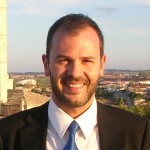 We are happy to welcome Vicente Fernández who has joined the EuroGOOS Office team in Brussels. Vicente holds a PhD in physical oceanography and a Master in environmental engineering and management. He has an extensive experience with focus on ocean modelling, metocean data analysis and coastal ocean observing systems. He has worked in several research and operational centers as well as an environmental consultant in projects related to industrial offshore activities. His main interest is the use of model and data based services to end-users of marine information.
We are happy to welcome Vicente Fernández who has joined the EuroGOOS Office team in Brussels. Vicente holds a PhD in physical oceanography and a Master in environmental engineering and management. He has an extensive experience with focus on ocean modelling, metocean data analysis and coastal ocean observing systems. He has worked in several research and operational centers as well as an environmental consultant in projects related to industrial offshore activities. His main interest is the use of model and data based services to end-users of marine information.
Email: vicente.fernandez@eurogoos.eu
EuroGOOS Office staff page here
The post EuroGOOS welcomes new staff member appeared first on EuroGOOS.
EMODnet Open Conference: Consolidating the foundations, building the future
The EMODnet 1st Open Conference took place in Ostend on 20 October. The event was followed by a series of partner meetings for the seven EMODnet lots, on 21 and 22 October.
Over 350 participants got together in the Ostend cultural centre De Grote Poste for the open conference. The conference presented an impressive progress of EMODnet in a series of flash talks on the seven thematic lots and regional EMODnet checkpoints. High-level speakers and guests congratulated the community and the EMODnet secretariat on their achievements. In the afternoon, the participants were split in small groups to brainstorm on the next stages of EMODnet and European ocean data management. The quality-controlled interoperable data is critical for each end-user of EMODnet, stressed the participants. Other priorities set out during the brainstorming included an increased promotion of the open data policy and dialogue with end-users. The partner meetings afterwards joined efforts to find solutions for common challenges such as measuring the quality of the service, engaging the private sector, helping EU countries report the state of their marine environment or reducing the formalities involved in downloading data whilst tracking usage in order to improve the service.
The EuroGOOS Secretary General, Glenn Nolan, moderated a cross-cutting session on 21 October dedicated to marine data and information systems. The wide range of marine data services in Europe may show a scattered picture to an external observer. However, the session agreed that most actors operate in synergy and work towards enhancing the added value to the European system, trying to avoid duplication. Communication, on the other hand, needs to be improved, to represent a joint voice of the community to decision and policymakers.
Further information:
The post EMODnet Open Conference: Consolidating the foundations, building the future appeared first on EuroGOOS.
EuroGOOS Chairs and Executive Board Meetings, 14-15 October
EuroGOOS Chairs of working groups, task teams and Regional Operational Oceanographic Systems met jointly with the Executive Board, on 14 October. The meeting discussed the requirements for the European Ocean Observing System (EOOS), the process led by EuroGOOS together with the European Marine Board and other strategic actors. EOOS will underpin the full value chain, from observation priorities and infrastructures to data management and to end-users, spanning maritime operations, research, policy and society. In this respect, the EuroGOOS board called for an open EOOS forum to be convened in 2016. Identified as priority in the EuroGOOS strategic plan, EOOS process guides the development of all EuroGOOS activities.
The meeting also considered proposals for two new Task Teams, on marine mammal-borne observations and on fixed platforms. Both task team proposals were approved in principle by the Executive Board on 15 October.
Furthermore, the meeting delegates brainstormed on the EuroGOOS communication plan, developed as a strategic imperative for impact and growth. The EuroGOOS office presented the newly published brochure on the benefits of the EuroGOOS membership, to be disseminated both to the current and potential new members.
The post EuroGOOS Chairs and Executive Board Meetings, 14-15 October appeared first on EuroGOOS.
EuroGOOS at the GOOS Regional Forum
The 7th GOOS Regional Alliances Forum took place in Heraklion, on 22-24 September. The forum provided an opprotunity for the 13 GOOS Regional Alliances (GRA) from around the globe to share best practice and measure progress towards overall GOOS objectives. EuroGOOS presented the global modelling inventory work underatken by Patrick Gorringe (EuroGOOS) and Laura Greisbauer (NOAA) as well as a pilot global data portal for real-time oceanographic data. Erik Buch, EuroGOOS chair, was elected vice-chair of the forum. Tim Moltmann of IMOS, Australia, replaces Zdenka Willis (NOAA) as forum chair. There is significant scope to build oceanographic capacity in the Black Sea and Southern Mediterranean Sea through the GRA process. EuroGOOS will work closely with IOC and JCOMM in the coming months to initiate activities on capacity building.
Back to back with the forum, EuroGOOS held a meeting of its HF Radar Task Team. Through this network EuroGOOS coordinates the European HFR operators and ensures that data delivered feeds into EMODnet and CMEMS. EuroGOOS Task Teams operate in the context of the European Ocean Observing System, EOOS.
The post EuroGOOS at the GOOS Regional Forum appeared first on EuroGOOS.
JERICO-NEXT kick-off week: towards European synergies
JERICO-NEXT held its kick-off meeting and associated side-events in Mallorca this week. JERICO-NEXT is the coastal component of the European marine observing system, funded by the H2020 program – a follow-up from the FP7 project JERICO.
JERICO-NEXT aims at extending the EU network of coastal observations developed in JERICO by adding new innovative infrastructures and integrating biogeochemical and biological observations. JERICO-NEXT will provide researchers with continuous and more valuable coastal data coupling physical and biological information by further developing, harmonizing and integrating nationally-funded marine observing systems, collecting physical, chemical and biological parameters from different platforms (ferryboxes, fixed platforms, gliders, HF radars, benthic systems …).
EuroGOOS is a partner in the JERICO-NEXT project focusing on data management issues. For the kick-off week the coordinator asked EuroGOOS to facilitate a discussion on links between JERICO-NEXT, H2020 AtlantOS and the European Ocean Observing System, EOOS. Furthermore, emphasis was made on how EuroGOOS Task Teams can contribute to these initiatives. Proposal for a EuroGOOS task team on fixed platform was progressed and will be further discussed during the EuroGOOS executive board meeting and FixO3 general assembly, both taking place in Brussels in two weeks.
Glenn Nolan, EuroGOOS Secretary General, stressed the JERICO-NEXT opportunity to explore synergies with other programmes. EuroGOOS urged the project partners to ensure a strong link with similar AtlantOS activities on strategy, requirements and OSSEs (Ocean Observing System Simulation Experiment system).
Further information on the JERICO-NEXT kick-off week is available on the project website.
The post JERICO-NEXT kick-off week: towards European synergies appeared first on EuroGOOS.
Year of Polar Prediction: Summit report available
WMO Headquarters, Geneva, Switzerland – the YOPP Summit was a high-level event and is a key element in the planning for the Year of Polar Prediction (YOPP). The mission of the YOPP is to enable a significant improvement in environmental prediction capabilities for the polar regions and beyond, by coordinating a period of intensive observing, modelling, verification, user-engagement and education activities. YOPP is one of the key elements of the Polar Prediction Project. YOPP is scheduled to take place from mid-2017 to mid-2019.
A major milestone for the preparation of YOPP was the YOPP-Summit, held at Geneva, 13-15 July 2015. The purpose of the Summit was to:
- Give an overview about the present level of planning;
- Identify stakeholder expectations and requirements; Develop priorities; Define intensive observing periods; Agree on the YOPP data legacy;
- Coordinate planned activities, and
- Gather formal committments from parties interested in YOPP.
The results of the Summit will be used to finalize Version 2.0 of the YOPP Implementation Plan. The YOPP Summit was attended by 120 scientists, stakeholders as well as representatives from weather and climate prediction centres, international bodies and funding agencies. EuroGOOS was represented at the meeting by Chair Erik Buch, who gave a presentation on the ocean observations.
The Summit report is now available here
The post Year of Polar Prediction: Summit report available appeared first on EuroGOOS.
ENVRIplus launch new website
ENVRIplus is a Horizon 2020 project bringing together Environmental and Earth System Research Infrastructures, projects and networks together with technical specialist partners to create a more coherent, interdisciplinary and interoperable cluster of Environmental Research Infrastructures across Europe.
ENVRIplus is driven by three overarching goals: 1) favouring cross-fertilization between Research Infrastructures, 2) implementing innovative concepts and devices across Infrastructures, and 3) facilitating research and innovation in the field of environment to an increasing number of users outside the Research Infrastructures.
Visit the project website: http://www.envriplus.eu/
The post ENVRIplus launch new website appeared first on EuroGOOS.
“MYGEOSS” – Call for smart mobile or web-based applications
The European Commission is launching a second call for the development of innovative applications (mobile or web-based) using openly available or crowd-generated data in different domains addressing citizens’ needs.
The pool of open data for use includes but is not limited to the Data Collection of Open Resources for Everyone (GEOSS Data-CORE) made available by the Group on Earth observation (GEO) through the Global Earth Observation System of Systems (GEOSS), as well as open data from EU-funded projects.
The focus of this call will be on developing applications of European relevance that will provide users with quantitative or qualitative information on the changing environment, e.g. change detection in climate, biodiversity, water bodies, coastal areas, built environment, green areas, forestry, agricultural land and crops, and atmospheric composition. Other areas of application will be considered providing they address broad environmental or social themes across geographic scales.
The 15 best applicants will be awarded contracts by the Joint Research Centre of the European Commission for a maximum of € 13 500 to develop the applications further, and take them to the stage of first public release within 3 months of signing the contracts. The winners will also be invited to present their applications to a dedicated international event co-organised by the European Commission.
Launch of the call: 7 September
Deadline for submitting application concept, prototype, or user story: 30 September
More details about the call and conditions for entry available on the website
The post “MYGEOSS” – Call for smart mobile or web-based applications appeared first on EuroGOOS.
IOC Assembly, June 2015, Paris
EuroGOOS was well represented at the 28th Session of the IOC Assembly in Paris last June. Erik Buch, EuroGOOS chair, gave an insightful talk on the challenges in the Arctic, promoting the establishment of an Arctic GOOS. EuroGOOS Glider Task Team chair Pierre Testor delivered a presentation on gliders and 4D oceanic measurements.
Glenn Nolan, EuroGOOS secretary general, was elected as GOOS Steering Committee expert for a two-year term. In addition to their technical expertise, the five elected experts will bring their policy advice and guidance to the GOOS Steering Committee.
Other assembly updates include the election of Peter Haugan (UiB, Norway) as new IOC chairman. Stephen Hall (NOC, UK and EuroGOOS delegate) was elected vice-chair in Group I.
The post IOC Assembly, June 2015, Paris appeared first on EuroGOOS.
EuroGOOS welcomes Dina Eparkhina
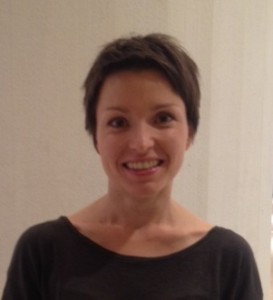 Dina Eparkhina has joined the EuroGOOS Secretariat as Coordination and Communication Officer. Previously Dina worked at the European Marine Board, at the interface between marine science and policy. At EuroGOOS, Dina will develop the Communication Strategy and support EuroGOOS communication tasks in Horizon 2020 projects, notably Columbus and AtlantOS. Dina will also take over the duties of Yota Antoniou who will leave the Secretariat at the end of June.
Dina Eparkhina has joined the EuroGOOS Secretariat as Coordination and Communication Officer. Previously Dina worked at the European Marine Board, at the interface between marine science and policy. At EuroGOOS, Dina will develop the Communication Strategy and support EuroGOOS communication tasks in Horizon 2020 projects, notably Columbus and AtlantOS. Dina will also take over the duties of Yota Antoniou who will leave the Secretariat at the end of June.
Email: dina.eparkhina@eurogoos.eu
The post EuroGOOS welcomes Dina Eparkhina appeared first on EuroGOOS.
The importance of sea and coastal observations and data: new EMODnet video
EMODnet published a new video, highlighting the importance of sea and coastal observations and data for a range of applications and users. The video illustrates the process of collecting, processing, storing and making available marine data, and the need to do embed this process in an interoperable pan-European sharing framework.
View the video here: https://www.youtube.com/watch?v=_X_rMDr0p48
The European Marine Observation and Data Network (EMODnet) is a long term marine data initiative from the European Commission Directorate-General for Maritime Affairs and Fisheries (DG MARE) underpinning its Marine Knowledge 2020 strategy. EMODnet is a consortium of organisations assembling European marine data, data products and metadata from diverse sources in a uniform way. The main purpose of EMODnet is to unlock fragmented and hidden marine data resources and to make these available to individuals and organisations (public and private), and to facilitate investment in sustainable coastal and offshore activities through improved access to quality-assured, standardised and harmonised marine data which are interoperable and free of restrictions on use.
The post The importance of sea and coastal observations and data: new EMODnet video appeared first on EuroGOOS.
Kostas Nittis Medal awarded by Commissioner Vella
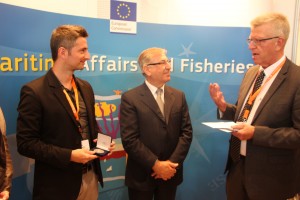
Award ceremony of the ‘Kostas Nittis Medal’, EMD 2015, 28 May. From left: Pablo Lorente, Commissioner Karmenu Vella and Erik Buch (EuroGOOS Chair)
European Commissioner for Environment, Maritime Affairs and Fisheries, Karmenu Vella, awarded the first Kostas Nittis Medal to Mr. Pablo Lorente during the celebration of European Maritime Day in Athens on 28 May 2015. The Kostas Nittis medal was established in 2015 in the honour of Dr. Kostas Nittis (1964-2014), distinguished oceanographer, EuroGOOS Secretary General and strategic leader.
Pablo Lorente, a young scientist from EuroGOOS member organisation Puertos del Estado (Spain), has been awarded the medal this year, complemented by a grant of 3,000 EUR to allow him present his research at relevant international meetings, expanding his network of research partners and potential employers.
The post Kostas Nittis Medal awarded by Commissioner Vella appeared first on EuroGOOS.
EuroGOOS 2015 Annual Meeting (20-22 May 2015)
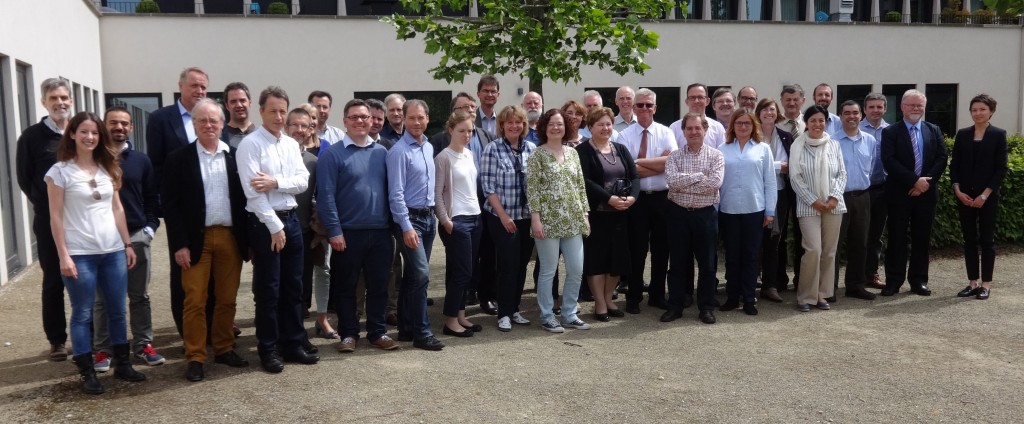 The EuroGOOS 2015 Annual Meeting took place in Brussels on 20-22 May attended by 45 delegates. Presentations were given from chairs of ROOSes and EuroGOOS working groups and task teams. The meeting also discussed the EuroGOOS involvement in pan-European initiatives, such as EMODnet, JERICO Next, AtlantOS, etc. The Secretariat presented the structure of the EuroGOOS Communication Strategy to be launched during the summer, with the aim of strengthening the EuroGOOS role in the marine landscape in Europe and globally.
The EuroGOOS 2015 Annual Meeting took place in Brussels on 20-22 May attended by 45 delegates. Presentations were given from chairs of ROOSes and EuroGOOS working groups and task teams. The meeting also discussed the EuroGOOS involvement in pan-European initiatives, such as EMODnet, JERICO Next, AtlantOS, etc. The Secretariat presented the structure of the EuroGOOS Communication Strategy to be launched during the summer, with the aim of strengthening the EuroGOOS role in the marine landscape in Europe and globally.
The meeting welcomed three new EuroGOOS members: Croatian Meteorological and Hydrological Institute, Croatian Institute of Oceanography and Fisheries, and The Liguria Cluster of Marine Technology, Italy. Now, EuroGOOS represents 40 members from 19 countries (full membership list is available here). During the Executive Board elections, the EuroGOOS delegates thanked Alessandro Crise, outgoing vice-chair, and Harm Oterdoom, outgoing Board member, for their strong contributions to the EuroGOOS operations. Three new Board members were elected: George Petihakis (HCMR, Greece) – also elected as vice-chair, Antonio Santos Martinho (Hydrographic Institute, Portugal) and Rosalia Santoleri (CNR, Italy). The meeting also thanked Yota Antoniou, who will leave EuroGOOS at the end of June, for her dedication and unstinting support to the office over the last two years.
The post EuroGOOS 2015 Annual Meeting (20-22 May 2015) appeared first on EuroGOOS.
Copernicus Marine Environment Monitoring Service now open on an operational mode
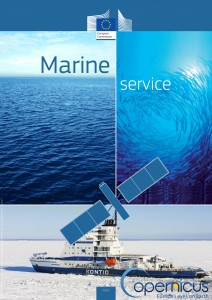 After the MyOcean pilot scheme developped from April 2009 to April 2015, coordinated by Mercator Ocean, the Copernicus Marine Environment Monitoring Service is now open on an operational mode.
After the MyOcean pilot scheme developped from April 2009 to April 2015, coordinated by Mercator Ocean, the Copernicus Marine Environment Monitoring Service is now open on an operational mode.
It yet serves close to 5000 registered users around the World.
Under the Delegation Agreement signed on November 11th, 2014, Mercator Ocean undertakes to successfully implement and develop the Copernicus Marine Environment Monitoring Service (CMEMS).
The CMEMS is a user-driven core service expected to contribute to European innovation and competitiveness. It helps build the Blue Economy, providing generic, reliable, timely and up-to-date information related to the Global Ocean and the European Seas that will be:
• open and freely available through a single access point (a web portal);
• a state-of-the-art and constantly evolving source of information, through a permanent dialogue with the scientific and technical community involved in operational oceanography;
• a European Service, with no overlap or duplications with the scope and responsibilities of the institutional marine services of Member States.
The Horizon2020 funded project “MyOcean follow-On let the floor to the Copernicus Marine Environment Monitoring Service (CMEMS) without any service disruption.
For more information: http://marine.copernicus.eu/
Source: http://marine.copernicus.eu
The post Copernicus Marine Environment Monitoring Service now open on an operational mode appeared first on EuroGOOS.
European Maritime Day 2015 workshop: Marine data and information powering Blue Growth
EuroGOOS together with EMODnet, Mercator Ocean, the Euro-Mediterranean Center on Climate Change, the European Network of Maritime Clusters, INGV and Links S.p.A organises a workshop titled “marine data and information powering Blue Growth” on 28 May, 11:00-12:30, during the celebration of the European Maritime Day 2015 in Athens.
The workshop will focus on key elements of the marine knowledge value chain: from observation and collection of marine and coastal data to information, products and services for intermediate and end-users. The aim is to attract and demonstrate to the audience, in particular stakeholders from maritime industries, the importance of marine and coastal observation and data management as well as the following development of marine core and downstream services for end-users, as critical components to promote and implement the Marine Knowledge 2020 strategy.
The workshop will consist of two parts jointly addressing the four main components of the Marine Knowledge value chain covering (1) Marine Observation and Data -> (2) Marine Core Services -> (3) Marine Downstream Services -> (4) End-users.
Moderator: Mr Phil Weaver, Chair of EMODnet Steering Committee
Part 1 Introduction and illustration of the core concepts and actors involved in the first three components of the marine knowledge value chain.
Speakers:
Mr Alvise Bragadin, COGEA, Coordinator of EMODnet Human Activities : The relevance of free access to interoperable data on human activities in the European marine and coastal environment.
Mr Gaël Morvan, Head of the Bathymetry Department,, French Hydrographic Office (SHOM): Coastal Mapping: Towards a prototype digital map of Europe’s coastal zone for inclusion in EMODnet
Mr Pierre Bahurel, Director General Mercator Ocean, entrusted entity for implementing the Copernicus Marine Service : The Copernicus Marine Environment Monitoring Service
Mr Erik BUCH, Chairman of EuroGOOS AIBSL : Downstream activities of EuroGOOS Association members
Mr Antonio Guarnieri (INGV) and Ms Palmalisa Marra (Links S.p.A.) : Marine services in the Mediterranean Sea: TESSA and EMODnet MedSea Checkpoint projects
Part 2 Guided panel discussion focusing on perspectives from end-users (with testimonies from representatives from key user communities and interventions from the audience)
Introduction by Mr Paul Marceul, Secretary General, European Network of Maritime Clusters (ENMC): Expectations and needs of end-users in terms of quality and service
User testimonies: John Campbell (Technical Director of the International Association of Oil and Gas Producers (IOGP) on data use and sharing by the ocean industry, TESSA project and EMODnet MEDSEA Checpoint users, representative from industrial company LuxSpace, Luxembourg, …)
The workshop takes place at the Athens Concert Hall (Megaron) on 28 May at 11 am, room Trianti. More information on EMD workshops: http://ec.europa.eu/maritimeaffairs/maritimeday/en/content/conference
The post European Maritime Day 2015 workshop: Marine data and information powering Blue Growth appeared first on EuroGOOS.
ISPRA’s marine activities now supported by the Italian Navy
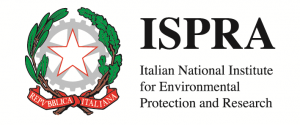 Last month ISPRA (Italian National Institute for Environmental Protection and Research) and the Italian Navy signed a three-year Framework Agreement to start a stable co-operation on several fields, including marine environmental monitoring, anti-pollution activities and operational oceanography.
Last month ISPRA (Italian National Institute for Environmental Protection and Research) and the Italian Navy signed a three-year Framework Agreement to start a stable co-operation on several fields, including marine environmental monitoring, anti-pollution activities and operational oceanography.
By signing this agreement both public institutions, according to their respective institutional activities, are willing to enhance and further develop their capacities, maximizing the possible combination of their resources. In particular, the Italian navy will support ISPRA’s marine research and monitoring activities with specific regard to ocean and the deep sea. Means of integration of the existing marine monitoring networks and infrastructures (wavemeter, coastal radars, etc.) will be explored also considering the new EU Copernicus programme developemnt.
ISPRA manages the Italian national data buoy network (RON – Rete Ondametrica Nazionale) which includes 15 directional wave buoys and the corresponding land based receiving stations, collecting real time series of wave and meteorological parameters every 30 minutes. The network is located at the very heart of the Mediterranean Sea, providing data to define the state of the sea useful for several sea basins. To improve the RON marine monitoring capability for different purposes (environmental protection, safety, surveillance and forecasting, maritime planning) next foreseen steps are directed towards the integration of different infrastructures and instruments. The cooperation with the Italian Navy will contribute to this overall objective.
Source: ISPRA
The post ISPRA’s marine activities now supported by the Italian Navy appeared first on EuroGOOS.
Kostas Nittis medal to be awarded during European Maritime Day in Athens
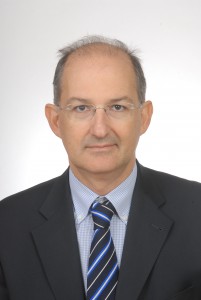 It is with great honour and emotion we announce that the first “Kostas Nittis medal for Operational Oceanography” will be awarded during the celebration of the European Maritime Day 2015, which will take place in Athens on 28 May.
It is with great honour and emotion we announce that the first “Kostas Nittis medal for Operational Oceanography” will be awarded during the celebration of the European Maritime Day 2015, which will take place in Athens on 28 May.
Following the unexpected passing of our Secretary General Kostas Nittis in July 2014, we have established a medal to honour his memory and efforts to promote European cooperation in marine science and his vision for a sustained and coordinated European ocean observation system. The medal will be awarded each year to a young scientist with exceptional contribution to operational oceanography, nominated by EuroGOOS members, and it will be accompanied by a prize to support the scientist’s participation in international symposia.
This year the medal will be awarded by the DG MARE Commissioner Karmenu Vella before the official opening of the European Maritime Day, on 28 May in Athens. More information on EMD can be found here.
The post Kostas Nittis medal to be awarded during European Maritime Day in Athens appeared first on EuroGOOS.
News from the Baltic
Read the latest news from the Baltic Regional Operational Oceanography System (BOOS). In this issue: operational remote sensing of ice and application of profiling floats and seafloor climate stations in the Baltic.
The post News from the Baltic appeared first on EuroGOOS.
Kostas Nittis Scientific and Strategic Workshop, Athens 26-27 May 2015
The Hellenic Center for Marine Research (HCMR) and the PERSEUS FP7 project organize a two day Scientific and Strategic Workshop in memory of Kostas Nittis that will focus on state of the art contribution of operational oceanography (modelling and observations) and its applications in the present and future needs of science and society.
The meeting is titled “Kostas Nittis Scientific and Strategic Workshop: on a coordinated European observing systems strategy – Honouring the forward thinking of a visionary oceanographer” and it shall take place at the Divani Acropolis Hotel in Athens, between 26 and 27 April. The 2-day workshop will focus on:
- the challenges for operational oceanography and its applications in view of present and future needs of science and society: key issues that a coordinated European observing systems strategy should address
- the present and future of a sustained observing system in the Mediterranean and Black Sea: gaps and needs; and its sustainability, evolution and coordination.
EuroGOOS has been invited to contribute. We will be there to honour the memory of our late Secretary General, who dedicated much of his efforts to making a coordinated and sustained European Ocean Observing System a reality.
More information can be found here. To register, click here.
The post Kostas Nittis Scientific and Strategic Workshop, Athens 26-27 May 2015 appeared first on EuroGOOS.
FixO3 Workshop: An Introduction and practical use of European marine data infrastructures
Source: FixO3 website
15-16 April 2015, Atlantic Hotel, Bremen, Germany
A two-day workshop “An introduction and practical use of European marine data infrastructures” will be held in April 2015 in Bremen.
The agenda will be built around the following topics:
- Obtaining data from existing European marina data infrastructures (e.g. EMODNet, MyOcean, PANGAEA, EurOBIS, ICES, SeaDataNet)
- Importance of metadata and property rights
- Use of available tools to aggregate, harmonise, and transform data (e.g. WoRMS, ODV, Matlab, …)
For more information please click here.
The post FixO3 Workshop: An Introduction and practical use of European marine data infrastructures appeared first on EuroGOOS.
Seminar: Cooperation in Marine Science around the Baltic Sea
The Estonian Liaison Office (ELO) for EU Research and Innovation, representing the Estonian Research Council in Brussels, is organizing a seminar on “Cooperation in Marine Science around the Baltic Sea and beyond: a contribution to Europe’s Societal Challenges”. The event will take place on April 22nd from 9:00 to 14:00 at Square de Meeûs 1, 1000 Brussels (1st floor, room Luxembourg).
The event will focus on presentations on European (Horizon 2020) and regional (BONUS) marine research activities, and on the competences of two renowed Estonian marine research institutes – the Estonian Marine Institute of University of Tartu, and the Marine Systems Institute of Tallinn University of Technology. The presentations will be followed by a panel discussion looking into how research initiatives BONUS, PRIMA and JPI Oceans can cooperate and contribute to the Horizon 2020 research priorities in the areas of Blue Economy and Climate Efficiency.
Please click here for more information.
The post Seminar: Cooperation in Marine Science around the Baltic Sea appeared first on EuroGOOS.
First joint meeting of EuroGOOS ROOS, Working Groups and Task Teams
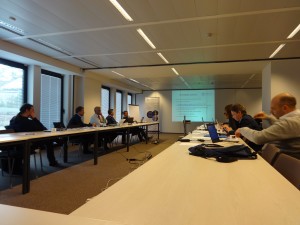 The first joint meeting between EuroGOOS ROOS‘s, Working Groups and the newly established Task Teams took place last week in Brussels (4 March).
The first joint meeting between EuroGOOS ROOS‘s, Working Groups and the newly established Task Teams took place last week in Brussels (4 March).
The main purpose of the meeting was to get everyone informed/updated on the activities in the different groups, seek synergies and enhance the cooperation.
The meeting had a very positive atmosphere and was appreciated by the participants. Many potential links between the different groups were identified and many valuable discussions between the presentations.
Most of the bodies were represented but of course it would be desirable to have 100% participation at the next meeting. The following meetings shall have a more focused format, paying attention to specific needs/requests/issues. It was decided to meet twice per year including one meeting coinciding with the Annual Meeting.
The possibility to expand the Task Team so to cover other operational aspects such as drifters, research vessels, and moorings (with FixO3) was also discussed.
Participants:
Ole Krarup Leth, DMI – COSMO WG co-chair
Jun She, DMI – SAWG chair
Begoña Perez, Puertos del Estado – Tide Gauge
Stein Sandven, NERSC – Arctic ROOS chair
Paolo Oddo, COSMO WG co-chair
Pierre Testor, CNRS – Gliders
Patrick Gorringe, EuroGOOS Office
Glenn Nolan, Marine Institute – IBI-ROOS co-chair & TPWG chair
Julien Mader, AZTI – HFR
Erik Buch, EuroGOOS Chair
Pierre-Yves le Traon, IFREMER – Euro-Argo
The post First joint meeting of EuroGOOS ROOS, Working Groups and Task Teams appeared first on EuroGOOS.
Celebrating the 10th anniversary of the opening of IODE in Oostende
Source: IODE
 The 10th Anniversary of the Opening of the IOC Project Office for IODE in Oostende, Belgium, will be celebrated on 16 March in Brugge (Provincial Court).
The 10th Anniversary of the Opening of the IOC Project Office for IODE in Oostende, Belgium, will be celebrated on 16 March in Brugge (Provincial Court).
The celebration session will be followed by a scientific conference. The programme of the event can be found here.
The event precedes the 23rd Session of IODE which takes place between 16 and 20 March.
More information here.
The post Celebrating the 10th anniversary of the opening of IODE in Oostende appeared first on EuroGOOS.
EuroGOOS welcomes new Secretary General
We are pleased to announce that the Members of EuroGOOS AISBL during their Extraordinary Meeting on 5 March in Brussels have endorsed Dr. Glenn Nolan of the Irish Marine Institute (MI) as the new EuroGOOS Secretary General.
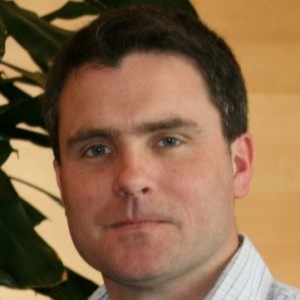 Glenn is well known to EuroGOOS Members and the operational oceanography community. He is the co-chair of IBI-ROOS and Chair of the Technology Plan Working Group. He is a Physical Oceanographer at the Irish Marine Institute in Galway, where he has held the position of Section Manager for Oceanographic Services since 2003. He has long sea-going experience and also project management experience. He is responsible for a team of 10 oceanographers and technicians engaged in both provision of oceanographic infrastructure and conducting coastal and deepwater oceanographic research at his home institute.
Glenn is well known to EuroGOOS Members and the operational oceanography community. He is the co-chair of IBI-ROOS and Chair of the Technology Plan Working Group. He is a Physical Oceanographer at the Irish Marine Institute in Galway, where he has held the position of Section Manager for Oceanographic Services since 2003. He has long sea-going experience and also project management experience. He is responsible for a team of 10 oceanographers and technicians engaged in both provision of oceanographic infrastructure and conducting coastal and deepwater oceanographic research at his home institute.
Glenn shall take office in Brussels on 1 May 2015.
The post EuroGOOS welcomes new Secretary General appeared first on EuroGOOS.
7th EuroGOOS Conference: Europe to take the global lead in operational oceanography
Nearly 200 enthusiastic participants gathered last week in Lisbon, at the Calouste Gulbenkian Foundation, for our 7th Conference, titled “Operational Oceanography for sustainable Blue Growth”, which was co-organized with the Portuguese Hydrographic Institute. During the 3-day Conference (28-30 October), participants had the opportunity to learn about recent developments in operational oceanography and have interesting discussions with colleagues.
The evening before the conference, the 20-year anniversary of EuroGOOS was celebrated during a reception at the premises of the Portuguese Hydrographic Institute, with views to River Tagus. One of our former Chairs Dik Tromp as well as two of our past directors Nic Flemming and Hans Dahlin attended this event.
Presentations at the 7th EuroGOOS Conference have demonstrated an impressive high performance level within marine science and service provision by the EuroGOOS members, showing Europe to be extremely well positioned to take a global lead in the field of operational oceanography. The 7th EuroGOOS Conference Statements can be found here.
The Conference full programme can be found here.
The Conference abstracts can be found here.
The post 7th EuroGOOS Conference: Europe to take the global lead in operational oceanography appeared first on EuroGOOS.
EuroGOOS Strategy Implementation Plan
EuroGOOS has developed a five-year Implementation Plan which outlines its contribution to realising the .
Whereas the EuroGOOS Strategy 2014-2020 outlines the priorities of EuroGOOS as agreed and approved by the EuroGOOS Board and EuroGOOS members; the present document shall transfer the EuroGOOS Strategy into concrete goals, actions and deadlines.
The post EuroGOOS Strategy Implementation Plan appeared first on EuroGOOS.
Making the European Ocean Observing System a reality: messages from EurOCEAN 2014
A successful EurOCEAN 2014 Conference took place last week in Rome (7-9 October) where marine scientists from all over Europe gathered to talk about Blue Growth and how better and greater knowledge and understanding of marine ecosystems can support its sustainability.
EuroGOOS was represented by its Chair, Dr Erik Buch, who spoke about the concept of European Ocean Observing System (EOOS) during a session dedicated to our beloved late Secretary General Kostas Nittis who very much promoted the idea of EOOS and the concept of an integrated, long-term and sustained system. European Marine Board Chair Jan Mees and Erik announced the launch of shared and coordinated efforts and actions towards realising EOOS in the very near future.
The EurOCEAN 2014 Conference delivered a declaration on achieving an ecosystem approach to the management of Europe’s marine resources as a fundamental requirement for sustainable Blue Growth, known as the Rome Declaration. More information can be found here.
The post Making the European Ocean Observing System a reality: messages from EurOCEAN 2014 appeared first on EuroGOOS.
EuroGOOS Strategy 2014-2020 now available
A strategy document driving EuroGOOS activities for 2014-2020 has just been published; it is a joint effort of EuroGOOS Members, the Executive Directors Board and the Secretariat. To view/download, please click here.
The post EuroGOOS Strategy 2014-2020 now available appeared first on EuroGOOS.
The importance of an integrated end-to-end European Ocean Observing System: key message of EMD 2014
Source: EMD & EMODnet Secretariat
Report from the joint EuroGOOS/EMODnet/EMB/JRC workshop at the European Maritime Day in Bremen, 19 May 2014: “From marine observations and data to information, knowledge and blue growth: towards an integrated end-to-end European Ocean Observing System (EOOS)”
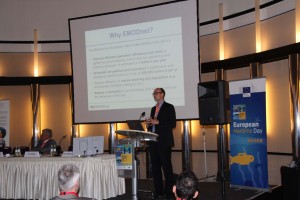
EuroGOOS Chair Dr. Erik Buch (left) and Head of EMODnet Secretariat Jan-Bart Calewaert (right) speaking about the need for integrated sustained ocean observations and data (credit: EMODnet Secretariat)
- Ocean observations are essential for marine science, operational services and systematic assessment of the marine environmental status. All types of activities in the marine environment require reliable data and information on the present and future conditions in which they operate. Many maritime economic sectors (e.g. oil and gas exploration, maritime transport, fisheries and aquaculture, maritime renewable energy) directly benefit from easily accessible marine data and information in several ways: improved planning of operations, risk minimization though increased safety, improved performance and overall reduced cost. Other activities, such as deep sea mining and marine biotechnology, also benefit from specialized deep-sea observations that were not feasible until recently.
- The complexity and high density of human activities in European seas and oceans result in a high demand for marine knowledge in the form of data, products and services to support marine and maritime activities in Europe, stressing the need for an integrated European approach to ocean observation and marine data management (Navigating the Future IV, European Marine Board 2013). While Europe already has a relatively mature ocean observing and data management infrastructure capability, this is largely fragmented and currently not addressing the needs of multiple stakeholders. Mechanisms for coordinating existing and planned ocean observations using a system approach are needed for more integrated, efficient and sustained observations under the framework of a “European Ocean Observing System” (EOOS) following international practice (systems developed by USA, Australia and Canada) and the call of the EurOCEAN 2010 Conference Declaration .
- The integration of different national and local marine data systems into a coherent interconnected whole which provides free access to observations and data, as pursued by the European Marine Observation and Data Network (EMODnet) is of key importance for maritime sectors like fisheries, the environment, transport, research, enterprise and industry. However, much work still needs to be done in close collaboration with end-users, in particular industry, to further develop EMODnet into a fully functional, fit for purpose gateway to European marine data and data products taking into account requirements of multiple users.
- There is a need for science-industry partnerships to stimulate innovation and develop a successful EOOS that will further enhance the contribution of marine observations to economic activities relevant for Blue Growth in Europe. Innovative technologies, developed in collaboration between research scientists and the industry, have given several solutions during the past years for more robust, multi-parametric and systematic observations. This, in turn, is leading to new and more reliable operational services that support a wide range of maritime economic activities: fisheries and aquaculture, offshore oil and gas, marine renewable energy, maritime transport, tourism etc. Other services address the sectors of marine safety, climate and weather applications, as well as marine environmental assessment.
- At the end of the marine observations, data to knowledge cycle, activities and tools are needed to create added value products for specific stakeholders, including the wider public, such as the European Atlas of the Seas which allows professionals, students and anyone interested to explore Europe’s seas and coasts, their environment, related human activities and European policies. At the same time, it is critical to evaluate whether we are monitoring/observing what we actually need. Regional assessments such as performed by the newly established EMODnet sea-basin “checkpoints” could provide relevant information, among others to advise Member States about requirements for essential and optimal observation capability.
The post The importance of an integrated end-to-end European Ocean Observing System: key message of EMD 2014 appeared first on EuroGOOS.
Quality Assurance of Real Time Ocean Data: IOOS releases fifth manual
Source: U.S. IOOS
As part of the U.S. IOOS Data Management and Communication (DMAC) core services, the U.S. IOOS Program Office has released the fifth QARTOD manual; Real-Time Quality Control of Water Level Data. This document represents significant progress towards more effective collection and processing of real-time water level observations using best-practices for quality control tests with codeable instructions.
In February 2012, the US IOOS Program Office formally established the Quality Assurance for Real Time Oceanographic Data (QARTOD) project to ensure a systematic process for establishing standard procedures for the quality assurance/quality control of key ocean observation data. The project is conducted in partnership with NOAA’s National Data Buoy Center. Each manual provides a check list of QC tests for data collected in real-time and includes control steps for the sensors, in addition to those for collected data, which are critical to guaranteeing quality of the data. Each test contains codeable instructions for implementation and assumes the involvement of knowledgeable scientists, engineers, programmers, and technicians. Suggestions for QA best practices are provided in the appendix as a courtesy to the manual user.
These publications represent a major step forward for US IOOS in documenting best practices for QA/QC for the ocean observing community. This manual is the fifth in a series of similar quality control manuals that IOOS will publish, each focused on a different oceanographic variable.
For more information, please click here.
The post Quality Assurance of Real Time Ocean Data: IOOS releases fifth manual appeared first on EuroGOOS.
Sonar spots invisible Arctic oil spills
Source: Scientific American, May 2014
The article speaks about how Arctic Ocean drilling may cause dangerous leaks under ice which are not visible by the eye but may be traced by sonars.
Click here to read the full article.
The post Sonar spots invisible Arctic oil spills appeared first on EuroGOOS.
Commission’s plans to overcome hurdles in blue economy include improvements in the quality and availability of marine data
Source: EC, DG MARE Marine Knowledge 2020 – 15 May 2014
In its recent Communication to the European Parliament, the Council of Europe, the EU Economic and Social Committee and the Committee of the Regions titled “Innovation in the Blue Economy”, the EC sets out its strategy to address issues specific to the blue economy.
Special attention is put on marine knowledge and seabed mapping: EC says “innovation in the blue economy is held back by a lack of information about the sea, the seabed and the life it supports”, clearly pointing towards the need for improved and more readily available marine data. The Commission now sets out an objective of replacing the present fragmented, inaccessible and inhomogeneous repositories of marine data in the EU, by a sustainable process whereby data is easily accessible, interoperable and free of restrictions on its use.
A Commission Staff Working Document, accompanying the Communication, details the roadmap as requested by Council and Parliament, with a timetable and milestones for implementing the actions on marine knowledge set out in the Communication, and achieving the 2020 objective imposed by the “Marine Knowledge 2020” Green Paper: “to prepare a seamless multi-resolution digital seabed map of European waters by 2020.”
Key improvements will include:
- strengthening EMODnet: at present 114 organisations are participating in EMODnet, some in more than one thematic group. These groups were selected through open calls for tender and their contracts run until 2016. After this time it is intended that a further round of open tenders will take place, which will allow the continuation of EMODnet till 2020. EMODnet will continue to play a significant role in the evolution of the marine knowledge process by ensuring enhanced quality marine data which are more accessible, interoperable and useful to end-users. EuroGOOS participates in the physical component of EMODnet, through its ROOSs which organise the data and make them available in near real time.
- setting up the Copernicus Marine Service: the main improvements will be further integration with EMODnet through common sign-in and user identification procedure and common repository of data from in-sea instruments; and extension of scope to provide historical records useful for environmental assessments and climate studies as well as near-real-time operational oceanography.
- sustaining in-sea observations: the Commission will give priority to Euro-Argo ERIC. The Commission intends to provide a grant to the Euro-Argo consortium in 2015 from the European Maritime and Fisheries Fund that will contribute towards the procurement and deployment of the approximately 100 floats that will be launched that year to replace those that are lost through wear and tear.
- improving availability of fisheries data: both scientific and economic data whose collection is partially funded by the EU should be included in EMODnet in the future. The Commission services will examine the feasibility of doing this in the imminent revision of the Data Collection Framework.
- improving access to data from environmental reporting: EMODnet can facilitate the process by building on INSPIRE and SEIS (Shared Environmental Information System) principles and putting data collected for regulatory purposes under the same umbrella as EMODnet with data collected for other purposes. Work has already started on alignment for data related to the Marine Strategy Framework Directive, especially through the thematic groups for chemistry and biology. Close collaboration between EMODnet groups, the European Environment Agency, the Regional Sea Conventions and public authorities will continue.
-
facilitating the ingestion into EMODnet of non-confidential data collected by private companies, particularly data arising from licensing requirements and environmental impact assessments.
-
optimising observation networks: developing a mechanism for strategic coordination of observation systems, sampling programmes and surveying priorities for European sea-basins, through funding from the European Maritime and Fisheries Fund.
The Working Document concludes: “The evolution of the marine knowledge process, and of EMODnet in particular, is therefore well-mapped until 2017. At this point the Commission services will review the state of play on implementation and, if necessary, consider what further steps need to be taken to ensure the continuing success of the process, and what further steps towards integrating fisheries and other data in EMODnet would need to be taken.”
Read more about Marine Knowledge 2020 here.
The post Commission’s plans to overcome hurdles in blue economy include improvements in the quality and availability of marine data appeared first on EuroGOOS.
ICES launches call for Operational Oceanographic Products and Services
ICES seeks data providers for regional overviews
Source: ICES news archive
This call for expressions of interest in providing Operational Oceanographic Products and Services (OOPS) to the ICES advice process is aimed at the expert groups in ICES, as well as the MyOcean community and the satellite earth observation community, who produce, or are planning to produce, OOPS. ICES wants to establish working arrangements with these actors that are prepared to regularly supply such information into the advice process.
This call will close on 4 July 2014, with the intention to start delivery of OOPS by the beginning of 2015.
More detail can be found here and in the Call announcement below:
 Call for expressions of interest (534.3 KiB)
Call for expressions of interest (534.3 KiB)
.
The post ICES launches call for Operational Oceanographic Products and Services appeared first on EuroGOOS.
Euro-Argo receives recognition as ERIC
Euro-Argo – Global ocean observing infrastructure gets EU legal status
Source: EC DG Research & Innovation & Euro-Argo
European Commission recently granted the ERIC legal status to Euro-Argo, the European contribution to Argo – a global array of autonomous instruments deployed over the world ocean and reporting near-real time subsurface ocean properties to a wide range of users via satellite. This is the first marine infrastructure to be so recognised.
Euro-Argo ERIC is now a key player in the international global Earth observing systems. The consolidation of ocean observations by Euro-Argo will enable a sustainable exploration, exploitation and protection of the oceans, in line with the blue growth strategy, and will enhance the European COPERNICUS Earth observing programme.
Euro-Argo has received a total of six million euros of EU funding under FP7. France, Germany, Greece, Italy, Netherlands, Finland, and United-Kingdom are members of Euro-Argo, hosted in Brest, France. Spain, Ireland, and Bulgaria will join it in the near future.
Read the press release from Euro-Argo ERIC here.
The post Euro-Argo receives recognition as ERIC appeared first on EuroGOOS.
Commission Action Plan for Innovation in the ‘Blue Economy’
EC presents plan to help use ocean resources sustainably and drive growth and jobs in Europe
Source: EUROPA, Press release database
The Commission action plan proposes to:
- Deliver a digital map of the entire seabed of European waters by 2020.
- Create an online information platform, to be operational before the end of 2015, on marine research projects across the Horizon 2020 programme as well as nationally funded marine research, and to share results from completed projects.
- Set up a Blue Economy Business and Science Forum, which will involve the private sector, scientists and NGOs to help shape the blue economy of the future and share ideas and results. A first meeting will take place in the margins of the 2015 Maritime Day event in Piraeus, Greece.
- Encourage research, business and education actors to map out the needs and skills for tomorrow’s workforce in the maritime sector by 2016.
- Examine the possibility of major players from the research, business and education community to form a Knowledge and Innovation Community (or KIC) for the blue economy after 2020. KICs, part of the European Institute of Innovation and Technology (EIT) can stimulate innovation in multiple ways, for example by running training and education programmes, reinforcing the path from research to the market and setting up innovation projects and business incubators.
Background
The EU’s maritime or “blue” economy is vast, with over 5 million employees in sectors as diverse as fisheries, transport, marine biotech and offshore renewables.
Between 2007 and 2013, the European Commission contributed an average of €350 million a year towards marine and maritime research through its seventh Framework Programme. A substantial amount of marine research is also carried out through Member States’ programmes (around €300 million per year in France and Germany for example). Blue growth is a “focus area” in the new Horizon 2020 programme, with a specific €145 million budget for 2014-2015 alone, and further opportunities across the programme.
Around 30% of the seafloor surrounding Europe has not yet been surveyed. This varies from 5% of the Bay of Biscay and the Iberian Coast to more than 40% of the North Sea and the Ionian and central Mediterranean. A better understanding of what is happening below sea level will provide a better knowledge of ocean resources and a better understanding of how these can be used sustainably.
Skill gaps are already apparent in the wind energy sector. In 2012, this offshore sector represented 10% of the annual wind capacity installed, and employed 58,000 people directly and indirectly across Europe. It is projected that by 2020, the proportion of wind power offshore will reach 30% of the annual wind installed capacity. That means 191,000 jobs by 2020, growing to 318,000 by 2030. But the sector could also see a skill shortage growing from 7,000 now to 14,000 full-time equivalents if the future workforce is not equipped with skills in maintenance and manufacturing for example.
For additional information please click here.
The post Commission Action Plan for Innovation in the ‘Blue Economy’ appeared first on EuroGOOS.
EurOCEAN 2014 conference
Save the date of October 7-9 in your diaries for the EurOCEAN 2014 conference, which is taking place in Rome. The EurOCEAN 2014 conference will focus on the grand challenges of marine and maritime research and policy. Bringing together marine scientists from a broad range of disciplines with policymakers, industry and NGOs, a key output of EurOCEAN 2014 will be the development of a common vision on achieving an ecosystem approach to the management of Europe’s marine resources as a fundamental requirement for sustainable Blue Growth. EurOCEAN 2014 is an official event of the Italian EU Presidency. Location: CNR Headquarters, Piazzale Aldo Moro 7, 00185 Rome.
For further information on EurOCEAN 2014 and registration (opening soon) please have a look at the EurOCEAN 2014 Flyer and visit the conference website www.eurocean2014.eu.
The post EurOCEAN 2014 conference appeared first on EuroGOOS.
European Marine Board publication: Navigating the Future IV
In its new position paper, Navigating the Future IV, the European Marine Board scans the horizon to anticipate emerging societal challenges and corresponding future research priorities concerning the seas and oceans. Navigating the Future IV can be downloaded at:
http://www.marineboard.eu/publications
The post European Marine Board publication: Navigating the Future IV appeared first on EuroGOOS.
A new start for EuroGOOS
The meeting said goodbye to Hans Dahlin who has been the EuroGOOS Director for the past 11 years and who will now retire. Kostas Nittis shall take over as the EuroGOOS AISBL Secretary General.
The post A new start for EuroGOOS appeared first on EuroGOOS.
See more in our News Archive
